
P StateCo 12004-200 / Catalog ! . I
Greetings from the President
Dear P eru Stater,
Ben E. Johnson , Ph.D.
If yo u are reading this, chances are you have decided to pursue your higher edu cation at Nebraska's first and fin est higher e ducation institution: Peru Stat e College. Congratulations! You have ma de the right choice!
H ere at Peru State College, it is our miss ion to serve students of all backgrounds, abiliti es and goals from throughout the state, nation and world. Whether in the c lassroom or over the Internet, we promise easy access to cha ll enging coursework, experiences to last a li fetime and a degree that will light the way to the caree r and future you seek.
More a nd m ore s tudents are enjoyin g the fruits of our seaso n of growt h here; this is ev id ent by their u se of om new, technolog ica ll yadvanced library and our unique Academic Resource Center.
This catalog is more than jus t a 1isting of classes; it is also a va lu able look at the serv ices, faculty, staff, a nd rich history of this institution. I inv ite you to read through it and learn about t h e exc it ing, innovative and positive offeri ngs of your P eru St ate Co ll ege .
Again, congratulations on making the right choice for your higher education, and we look forward to your participation in our season of growth.

Information about student retention and completion as required by the Higher Education Amendments of 1976 is available through the Office for Vice PresidentforAcademic and StudentAffairs.
No person attending Peru State College shall, on the grounds of race, color, nationalorigin,handicap, orgender,beexcludedfromparticipationin,bedenied of, orbesubjectedtodiscriminationunderanyprogramor activityreceivingfederal financial assistance. Inquiries regarding these matters should be directed to theVicePresident forAdministration andFinance.
Thiscatalogcontainsofficialinformationforthe2004-2006academicyears.The College reserves the right to repeal, change, or amend rules, regulations, tuition and fees, and may withdraw, add to, or modify courses and programs.
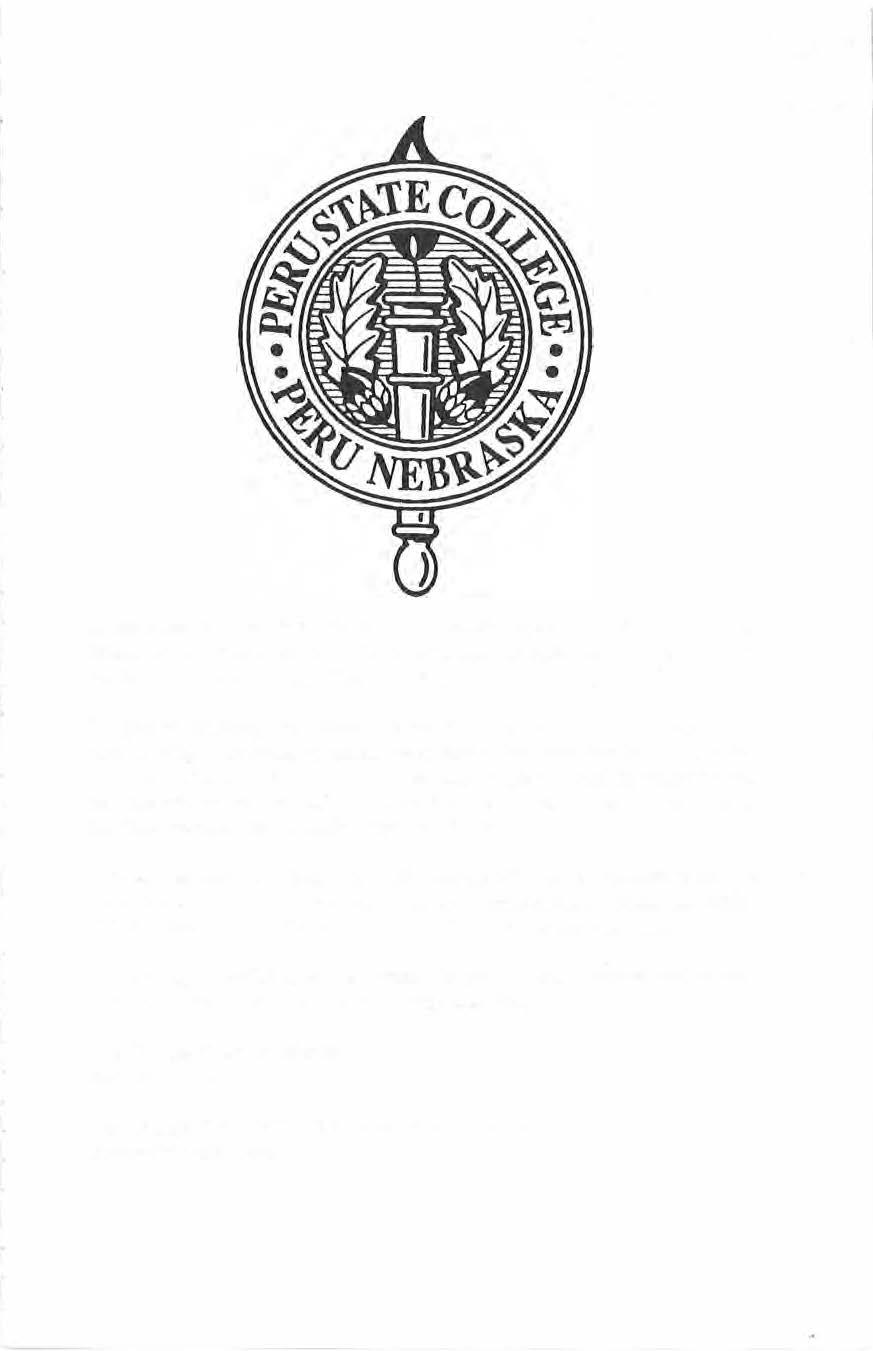
The catalog is published by Peru State College at Peru, Nebraska and entered under Bulk PermitNumber4 at Peru, Nebraska68421.
The College phone number is: (402)872-3815
The CollegeWorldWideWeb HomePage address is: http://www.peru.edu/

I
College Calendar ..... ............... . .. .. .... .... . ..... ...... . . . .3 lntrodnction to the College, Hi s tory, Mission and Map ......... . ... . .....5 General Admission Information ...... . ... .... . . . ...... . .... .... .....9 Expenses and Financ ial Aid .18 Student Services ...... .... . ....... . . ........ .... . .......... .... .41 Student Ri ghts, Freedoms, and Respon s ibilities ......... . ..... • ...... SI Non-Academic Poli cies 56 College and Public Services 60 Undergraduat e Degree and Program Information 61 Special Academic Programs . ... ....... . .. .. . ...................... 66 Academic Policies, Regulations & Procedures ... .. . ............. . . ... 70 General Studies .. ... ................... ... . .... ..... . ...........84 Personal Curriculum Gu.ide .... ... ...... ................. ....... ..86 Degree Programs 87 Honors Program ............ ........ .. . .......... .... ...... .....89 Academic Programs School of Arts and Sciences ... . .. ........ ...... ........... . ....90 Schoo.I of Education and Graduate Studies ............ ........... .128 School of Professional Studies 146 Course Descriptions . . .. .. ... . . .... .. , , ....... ...... . . .. . ... . ... 158 College Personnel Faculty • 235 Admini s trat ive Officers ..... . .................................236 Index 238
TABLE OF CONTENTS
2004-2006 ACADEMIC C ALENDAR
FALL SEMESTER 2004
Fee Payment (late f0<.'S after U1is da te)
Faculty Orientation
Freshman Welcome and Orienllllion
Registration (late registration after this date) Day and evening classes begin
Onli.tic a nd Offu tt Term 1 8-weck tourscs begin
Last day 10 drop/add regular semester and Term r courses
AP]llications for Non-Resident Scholar due Labor Day Holid~y (no classes - office.~ olosed)
Cht$Se~ resume
Student teacher appLicatio ns d ue for Spnug 2005

Last day 10 Wi thdi'llw Term 1 8-week courses with a "W''
Applications for May Graduation due Homecomin g
Mid-Torm, Onl ine and Offutt Tcnu I end
Mid -Tenn Break (n<> cla~scs - offices open - classes djs m1i;.sed followi.ug the fin!ll class rncctlng on October IS)
a a~e~ reswnc
Last day to withdraw from regular semester cou(scs with o "W"
Online and Offutt Term II 8-weck cour1;es begin
um dRy to drop/add Term IT cOurscs
Prer<,glsirntlon for Spring Semester
Foll Break (no classes - offices closed • Tburs and Pri only)
Clai;ses resume
L:tst day to wilhdri1w Torm a 8-weck courses wit h a "W"
Last day of regulnr semester c lasses
L;ist Academic/Instructional Day
Pinal Exam Week
Regular scmc.~tcr and Term [I course,; end
flee Paytnelll ( late fees after lhi~ date)
1i1e.,day, Friday, Sa111rday-Stt11day, MQ11day, Monday, M onday, Frida)', Mo11tla}', Mcmday, 1l1cMlay, Friday, Frillay, Fritlny, Samrday, Friday, Mo11duy•Tttsstlay, Wednesday, Priday. Momllly, Frida11 1l1e£day-Th11rsday, Wedne,·da)•P'rlday, Monday, Mo11day, Friday Mo11dt1)\ 11,esday-fridto• Friday,
SPRlNG SEMESTER 2005
Registration (l~te registration after this dale)
Day & evening classes ~gin
On-line and Offun Tc.nu I 8 -week courses begin wt d&y to drop/add ceguluc semester Term I courses
M nni n Luther Kin g. J r. Day (no classes - office., closed)
Student teacbc.r applications due for Fall 2005
Last day 10 Withdraw Tonn I 8-week courses with a ''W"
Summer Session pretl!glstration
Applic11tions for Decembe r grnd11ation due
Mid-Tem. Online 11nd Offutt Term I eu.d
Mid-Term Break (no classes · offices open - c lasses diBmissed following lh<t final doss meeting March 4)
Classe.1 resume
Ou-li ne a nd Offutt Term II 8-week courses begin
Last day 10 w)U1draw from rcgnlar semester course.s with~ "W''
Last day to drop/add Tonn n co urses
Class preregistratioa/room draw for Fall semeste( Spring Break (no c la.o,ses - offices closed)
Classes re.sume
Applications for Aug\Jst graduation due
Last day to withdraw Term ll 8 -week coutses wi th a " W"
Last day of regular ~e:mester c lasses
Lnst Academic/lnscruction al Day
Final !lxam Week
Regular semest~r and Term 11 course,, e.rtd Commencement
SUMMER TERM 2005
Fl'iday, Mo11day. Monday. Monday, Friday, Mo11tlay, Friday, Friday, Mo11day-Friday, TueJday, Friday, Mo11duy -Fritlny, Monday, Monday, F'ridny, Fritlny, Tiie.«lay-11111r.rday, Monday, 7l<e£tfay. Fridny, FricJoy, F,-/i/ay, Monday, 1i1csday-Friday, Friday, Saturday.
August J6
August '20
Angus l 21-22
August 23
Augus( 23
August 23
Augu,t 27
August 30
Scptembcr6
Soplember7
September 10
Scp tcmb<-r 24
October I
October 9
October 15
October 18-19
Odoher20
October22
Oc1obey 2 5
Octoher29
Novembe r 9- 11
Noven1ber 24-26
Novembe r 29
Nove mber29
December 10
December 13
December 14 -17
December 17
Jan uory 7
Jauuary LO
January 10
January lO
January 14
January 17
January 28
February 11
February 21-25
March I
March4
March 7-1 1
March 14
March 14
March 18
March 18
Mar h 22-24
Maroh28
March 29
April I
April lS
April 29
May 2
MayJ-6
May6
M11y7
Classes begin
L>1st day to drop/l1dJ u111111er session classes
Lasl day to wjtbdraw from SUmmcr Session with a "W" lndependence Day Boliday (no classes· office.< c losed)
Summer Sc.~sio11 ends
Mo11day , Fl'id,;,y, Fridny, Mo111/ay, Fri day,
May 16
Muy20
Juue 17
July 4
July 8
FALL SEMESTli:R 2005
fee Payrucnt (lute foes alter tl1is da re)
Fuc11hy Orlen1a1ion
Prcsh11'1nn Welconi~ & Orienlation
Rcgistrnlion (late registrntion after IJ1i• dale)
Day and flvcn iug ,lassos beg111
O n- line mid Offuu Term I 8-wcek courses begin
L11st day to drophldcf regul ar semester and Tonn I class.es
Applica1ions ror No11-Rcsidc111 Scholar due

Labor O,,y Holiday (no classes - offices clo£cdl
aasses re,,ume
Student lc~cher app licn1io11s due for Spring 2006
Last duy ,to withdrnw Term I 8 •week course with u ·•w••
A11plicati\ln~ for May Graduation due
Homecoming
Mid-Torn,, On-l ine and Offuu Tenn I end
Mid-Tenn 13renk ( no c lasses - of1ices open - classes dismissed follow i,ig tlu, fiJrn l ch1ss meeting ou Oclobcr 14)
Classes resume
Li!SI day 10 wi1hdr:1w from regular semester cvurscs with u " W"
On-line and Offolt Tonn II 8-weck courses begin
L~st d,1y 10 drop/add Term II courses
Preregimalion for Spring Semester
Fall Break (no classes • ollic<!S closeil • Thurs and Fri only)
Classes resume
L:1s1 day 10 withdraw Tenn U 8-wcck cour<c< witl, a ''W"
L.1s1 day o f regular semester classes
Last Academic/lns1mctiomll Day
Final Exam Week
Regular Senle.stcr and Te.rm U courses end
SPRING SEMESTER 2 006
Fee Payment Qate fee,; after 1his date)
Regi6 lru1,ou (lale regiilration after this date)
Day ~nd ,wcning classes begin
On-line and Ol'futt Tcmt I 8-weck courses begin
Last day 10 drop/add regular sen,c,ste.( and Tern, J courses
Manin Luther King. Jr. Day (no classes - offices closed)
Student le:tchcr applica1ions due fo r Fa ll 1006
Lust day to withdraw Term I 8 -wetk COUI~<:i; wilh a " W"
Summer Session prercgi,.ln11ion
Applications for Dec,embct gradua1ion due Mid, 'ferm, On-line and Offutt Term I end
Mid-Term Break (nu cl~cs - offices open - classes dismissed following the final c lass meeting March 3)
Classes resume
On-line and Offutt Term Tl 8-wcek courses begin
Last day to withdraw from regular semcsier courses wid1 a "W"
Last day to drop/add Tc.rm LI courses
Clasi prc regislrnlion/room draw for Pall semester
Applicalions (or August gradua11on due
L1SL day to withdraw Term 11 8--week courses- with a "\V'*
Spring Break (no classes - otlices closed)
Classes rc..c;Ume
Last day of regular .semester classes
La~l Academic/l ns1nictlonal Day
Final Exam Weck-
Regular Scrucslcr nd Term fl cou rse:, end
Commencement
Classe.\ begin
SUtvrMER TERM 2006
Last day to drop/udd summer sessio n classes
Last day 10 withdraw from Su01mcr Session with ""w·· lnclependence Day Holiday (no classes offices o losed)
Summer Session ends
w,,,1,ie.<tla)' Ftida)\ S11rt1!'tla;--S1111day. Mouday, Monday, Mondayi Frfrh',:y, Mo11dl1)', Mmt<lay, Tue.~da..y1 FridtJy, Friday, Sm11rdoy, Snt1mlay, Friday, Mo11day-1i1e>'day, Wetl11c.,dny, Friday, i\llonday, Frfr/ay, Tuesday-Th11t.1"day , Wed11esday - Fritloy, i'vJ011day, Mo11do y, Frida11 Moll(ia)', 1iiesclay-Friday, Friday,
Friday. Mo11day. Monday, ,Wondnyi Friday, Monrlll)\
Friday, Friday, Mouda)°Friday. \Ved11e ,day, l·l·iday1
Monday-Friday, Monday, Mo11d11); Friday, Friday, 1iu•.wlay -Thur$dtt)'; Somrd11y, Frid"Y· Monday, T_ne&vlay~ Frld11y, Monday, lltesday-Frid/JJ', Friday, Satt,rdo,v.
Monrlcu• Frida)', Friday, T11~.tday, Fri/lay,
A ugust 17
A ugusl 19
August 2ll-2 L
August22
August 22
August 22
A ugnsl 26
Augusl 29
Sept~rnber 5
September 6
Sep1embcr9
September 23
Ocrobe~ I
Oo1ober I
October 14
October 17-18
October 19
October 21
October1A
Octol>cs 28
November 8- I0
November 23-25
Novembcr28
November 28
.December 9
December 12
Doccmb~r 13-16
December 16
January 5
January 9
January 9
J&nuary 9
Jnn11ory 13
Janu ary l6
January 27
F~bru~ry JO
Feb. 27-Ml<rch 3
Maleh I M>JJ"Ch3
March 6-IO
M"rch 13
March 13
Mnrc b l7
March 17
March 21-23
April I
April 14
April 17
April 18
April 28
Muy I
May 2-5
May 5
Muy6
Moy 15
May 19
June 16
July 4
July 7
AN INTRODUCTION TO PERU STATE COLLEGE
Peru State College was founded in 1867 as Nebraska's first college and was the thi:rd teacher education institution established west of the Missouri Rjyer. For more than a century, thousands of young people hav e crossed the Campus of a Thousand Oaks to become teachers and leaders in Nebraska and throughout the nation.
The people of Nebraska have made the facilities of the College available to students at a minimum personal cost. The taxpayers of the state bear the major p ortion of the cost of educating the College 's student s.
Peru State College admits all graduates of accredited Nebraska high schools and qualified out-of-state and international s tudents. The philosophy of the College is that each person is entitled to the opportunity Lo succeed at the collegiate level. All who have the ability and the willingness to work will have an excellent chance to succeed at Peru State College.
The College believes in academic excellence, in opportu111t1es for personal growth, and in student self-determination consistent with tl1e principles of a democratic society. Adminislrative intent is to involve students in decisions that affect them. The College's educational experience is designed to enable students to learn , to equip themselves for meaningful careers, and to be productive members of society. Peru State College students have the opportunity to know their instructors well and to be working partners with the s taff and other students. Living and wOJking with others offer many opportunities for friendsh ip , growth , and personal development.

The College's facuhy and staff are here to serve you. We welcome t he opportunity to ass ist you in realizing your personal, educational, and career objectives.
Ristory
In 1867 , the same year that Nebraska became a state, the new state's legislattn-e establ ished a training school for teachers at Pern The school actually began on December 2, 1865, when its predecessor, Mount Vernon College, was organized by a group of early settlers who resolved to place the school under the "care and management of the Metboclist Episcopal Church .''
Colonel T.J. Maj ors, a leader during the Civil War and a state legislator, proposed that the school be made i nto a state university. Although the offer was rejected, the state legislature, on June 20, 1867. djd accept the school as a "normal school" several months before the s tate university was estab lished. For the next 38 years, the P eru school was the only teacher educaGon institution in the state.
As Nebraska's populabon increased, Lhe legis lature extended the normal school s from two-year to four-year institutions and authorized them to gnmt the degrees of B achelor of Arts in Education , Bachelor of Science in Education, and Bachelor of Fine Arts in Education. At t he same time, the name of the school was
changed from State Normal School to State Teachers College. When tbe United States entered World War IT, the College trnined officers for the armed forces. The first of a n even tual 500 men in the Navy's V-12 program arrived on campus July I, 1943. The College operated an accelerated program for both civilian students and naval trainees. In 1949, the leg islature authorized the Nebraska State ColJeges to confer the B achelor of Arts degree. In 1963, Peru 's name was changed to Peru State College The Bachelor of Science degree was authorized in 1965. Emerging from its role as a single-purpose teachers college, the College is n ow a regionally accredited state college offering a wide variety of programs to meet the changing needs of southeast Nebraska and beyond.
Philosophy
Peru State CoUege is committed to the belief that a ll persons are endowed w ith potential, if developed, that will benefit both the inilividual and society Each person who is e.xposecl to the influences of the College is encouraged to develop hi s or her potential as well as to undei-stand and appreciate the contribut ions of o thers. fndividual development can be accomplished through formal study and exposure to a variety of experiences both o n and off campus . This growth is t he result of the reasonable mastery of knowledge, acqu isition of certain ski lls and techniques, appreciation and understanding of areas beyond narrow personal interests, and meaningful religious and social experiences.
Mission
Pern State College serves the community through education, research, and public service programs. Our mission is to excel as a comprehensive liberal a r t~ college that encourages student l ea rnin g with educational priorities in baccalaureate and graduate teacher education, as well as undergradua~e programs in business, the humanities, and the sc iences. We value free-inq ui ry, professional development , research enhancing our educational role, and public service rel ated to and su pportive of instruction. Peru S t ate College serves students from throughout the state, nation , and world bnt retains a special commitment to ser ve the residents and needs of Southeast Nebraska.
Purposes
The PUJposes of Peru State College support the accomplishment of the missio n and are derived from the s pecific responsibilities assigned to the in stitut ion by the Nebraska S t ate College System Board of Trustees and the Nebraska Coordinating Co mmission for Postsecondary Education. These Purposes are to:

Provide an affordab le and accessible q uality education through high-q uality teaching and emphasis on student learning to the c iti zens in the assigned service region.
Provide its graduates with a solid foundation for contin ued life-long learning through a strong general ed ucation program.
• Provide quality baccalameate degrees in selected academic fields with emphasis on teacher education, business, and selected disciplines in the a1ts and scien ces.
• Pro vide a quality graduate program leading to a master's degree in education.
• Contribute to the development of the fields of knowledge and teaching in the disciplines represented in the College programs.
• Contribute to the economic and social/cultu ral development of the service region.
Goals
The Goals of Peru State College are to instill in our s tudents:
• • •
effective communication skills; computer and information literacy; independent cri tical thought a nd intellectual capacity for change; preparation to assume social and civic leadership roles; the ability to pursue i ntel lectually, ethically, aesthetically, and physically rewardin g lives.
Memberships and Accteditations
Peru State College is accredited by the Hi gher Leaming Commission of the North Central Association of Colleges and Schools. The Commission 's web site address is www.ncahigherlearningcommiss ion. o rg, and the telephone number is (800) 621-7440.
Peril State College bas co ntinuin g accreditation by th e National Counci l for Accre ditatj ou of Teac her Education Full membership is maintained in the American Association of Coll eges fo r Teacher Education a nd the American Council on Education. The College a lso is a charter member of the Nebraska Council on Teacher Education.
Peru State College is a member of the Nebraska State College System.
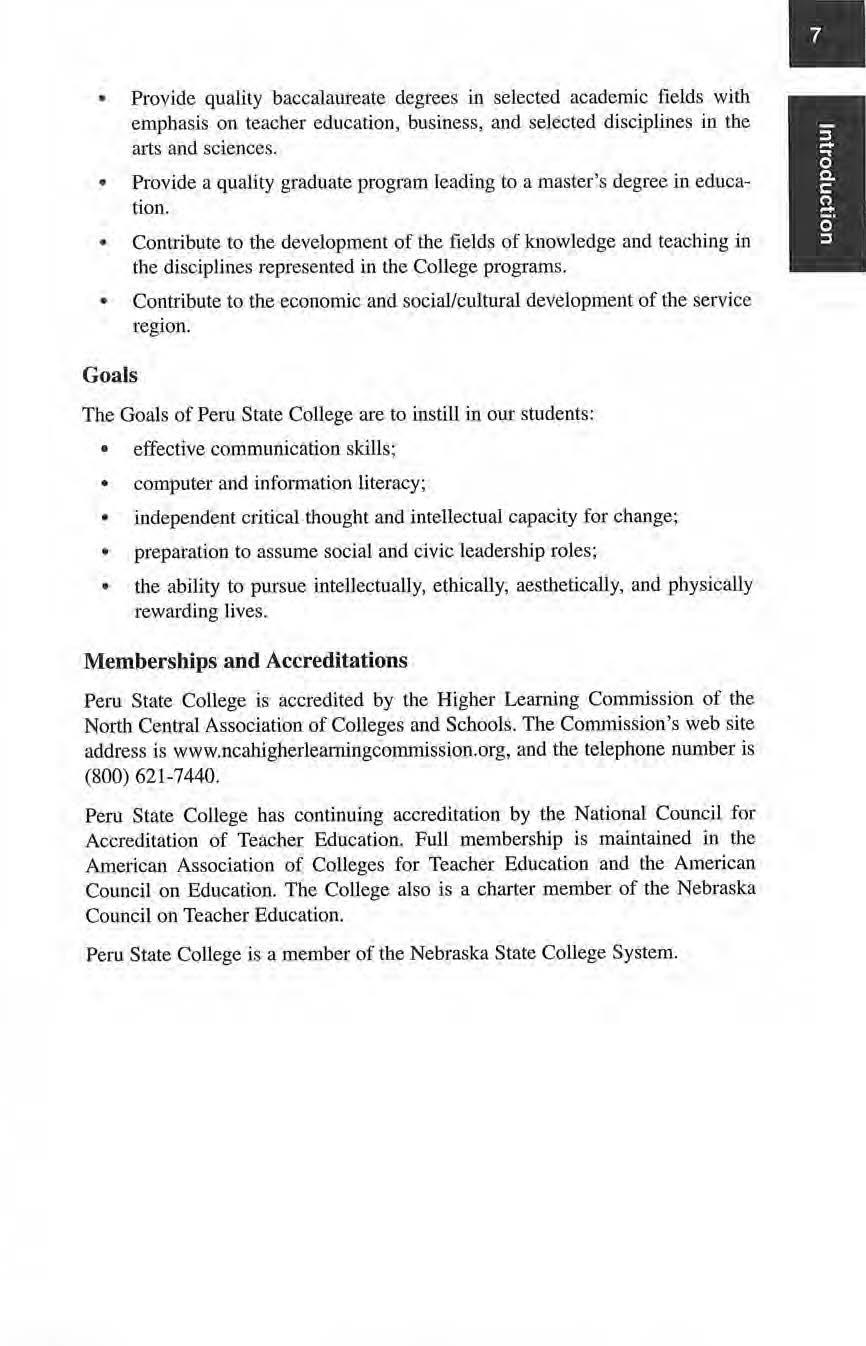
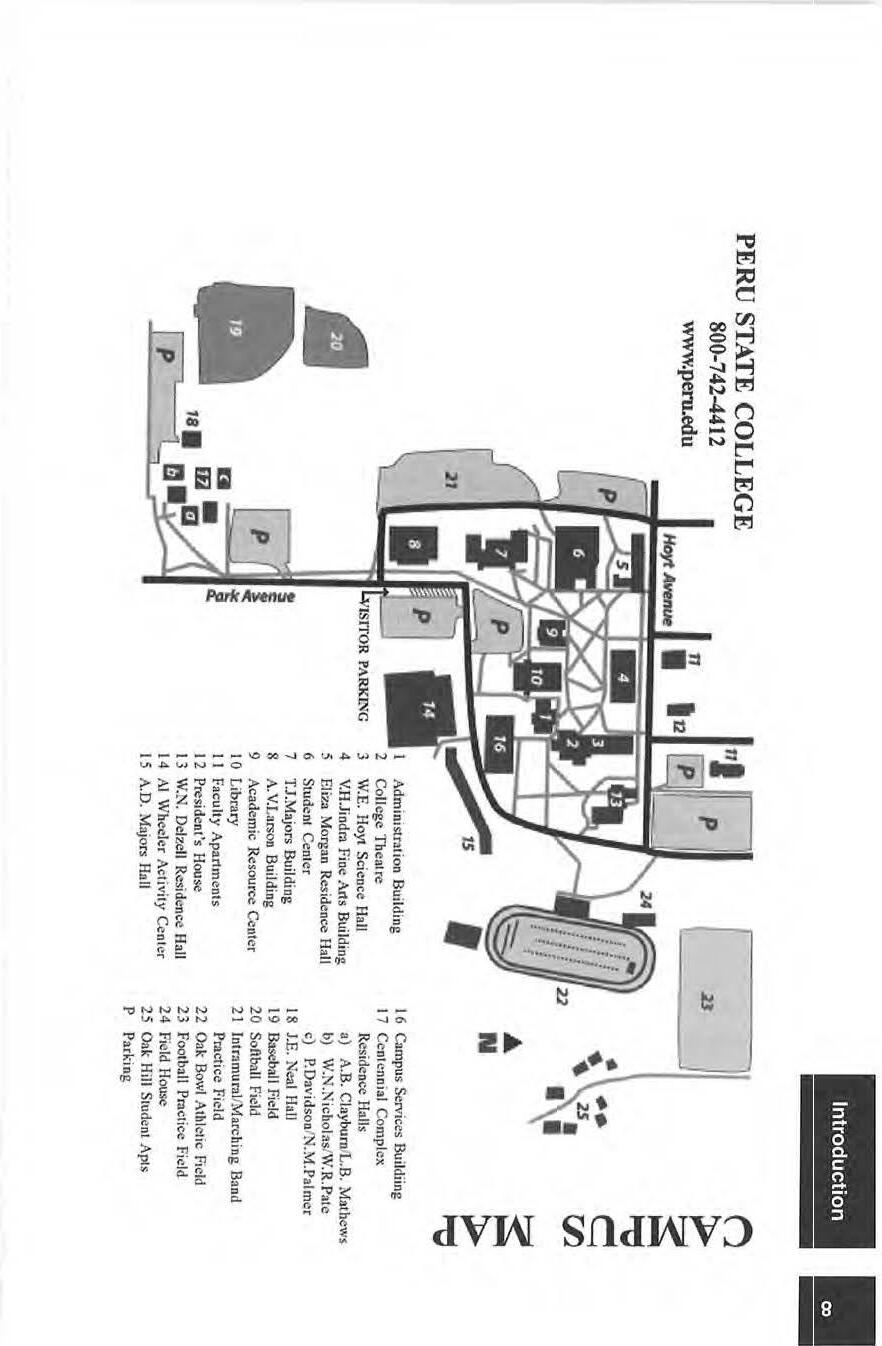
PER U STATE COLLEG E 800-742-4412 www.peru.edu • p 2 1 Introduction n J p D n > Adminisu,uion 8 ujldins Co ll ege Tbca 1 re 3 W.E. Hoyt Science Hall 4 V.H.Jiodra Fine Ar1s Bui l ding 5 Eliz.1 Morgan Residencil Hall 6 Studeol Cen l er 7 T.J Majors Bu i lding 8 A. V . Larson Building 9 Academic Resource Center IO Libra r y 11 Facully Apartments I 2 Presiden1 's House 13 W.N. Delze ll Residence R al l 14 Al Wheeler Aclivity Center 15 A. D. Majo r s Rall ... N I 6 Campus Services Buildiins 17 Ccotcnoial Comp l ex Residence Halls d rJj a) A.B. Clayburn/L.B. Mathews b) W.N . Kicbolas ! W.R.Patc c) P.DavidsoofN.M.Palmer 1 8 J.E. Neal Hall l 9 &seball Field 20 Sollball Field 21 Intr.imural/Marching Band Practice Ficld 22 Oak Bowl Athletic Field 23 Foo1ball Pmc1icc Fidd 2 4 Field House 2.5 Oak Hill Srud~nt Apls P Parking
GENERAL ADMISSION INFORMATION
Applying for U nder graduate Admission
The Office of Admissions at Peru State College welcomes inquiries and appl ications from all individuals who wish to pursue their educational and vocational goals.
Peru State College is committed to the po licy and practice that all persons have equal opportunity and access to programs without discrimination on the basis of race, color, national origin, marital status, gender, age, religion, or disability.
The Office of Admissions provides the following tips for students cousidering enrollment at Peru State College:
Students are encouraged to apply on-l ine at www.per u.edu.
• The College recommends that entering freshmen have co mpleted the following units of course work during their high sc ho o l program of study: four (4) units of English; three (3) units of mathematics; two (2) units of laborato ry science; three (3) units of social studies; additional courses in fore ign language, fine and performing arts, and computer literacy.
• AU students seeking admission must compl e te the Applicalion for Admission. After applyin g for admission, students are encouraged to complete an appl ication for financial aid. Students planning to live on-campus should complete a n application for housing.
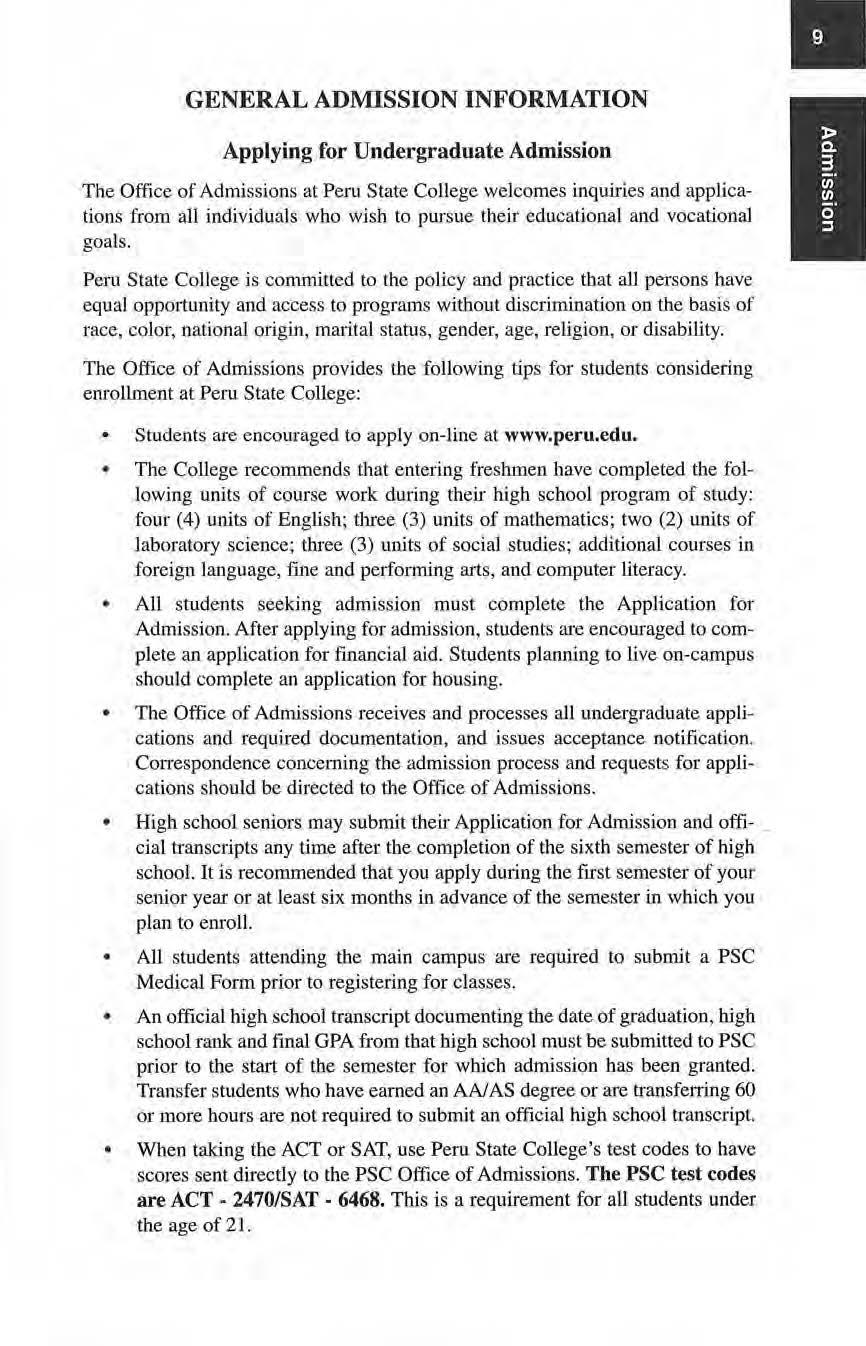
• The Office of Admissions receive s and processes aJI undergraduate applications a ud required documentation , and issues acceptauce notification Con-espondence concerning the admiss ion process and reques ts for applications should be directed to the Office of Admissions.
• High school seniors may submit their Applicatiou for Admi ss ion and official transcripts any time after the completion of the sixth semester of hi gh schoo l. I t is recommended that you apply during the first semester of you r se11ior year or at least six months in advance of tbe semester in which you plan to enroll.
• AU students attending tbe main campus are required to submit a PSC MedicaJ Form prior to registering for classes.
• An official high school transcript documenting the date of graduation, high school rank and final GPA from that rugh school must be submitted to PSC prior to the start of the semester for which admission has been granted. Trans fer s tudents who h ave earned an AN AS deg ree or are transferring 60 or more hours are not required to s ubmit an official hi gh school transcript.
• When ta}cing the ACT or SAT, use P eru State College's test codes to have scores sent directly to the PSC Office of Admissions. The PSC test codes are ACT - 2470/SAT - 6468. This is a requirement for all students under the age of 21.
• A1I materials submitted as a part of tbe applicution process become t11e prope1ty of P eru State Co ll ege.
• Phone the Of6ce of Admissions al (800) 742-44 12 iJ you have questions about the application process.
Admission may be invalidated if granted on the basis of false information willfully submitted, or if facts required in the application process are intentionally concealed or omitted.
Notice of Admission
Applicants will receive a le tter notifying them of tbeir ad.mission status when all documentation necessary for an admiss ion decision has been submitted to the Office of Admissions.
Mid-Year Admissions
Students who complete high school at mid-year may enter Peru State College at the beginning of the spring semester. Transfer st11dents will find the transition to Peru State College at mid-year minimally disruptive to their educational plans.
Admission to A dvanced Standing
Advanced standing is a status beyond the minimum for admission to the College. It is attained by presenting work completed at anot11er college 0 1· by demonstrating proficiency in a field that removes certain prerequisites. The removal of prerequisites may be with or without credit.
l'l'ansfer of Credi t
After the studen t ha s been admitted , the Office of Student R ecords completes an official eva luation ( Progress Sheet) to identify the app li cability of previous work to the s tudent 's expressed major and degree program. Transfer students who already have a significant number of credit hours toward their major will also have their transcripts reviewed by the appropriate Academic Dean.
A maximum of 95 semester credit hours from a regionally accredited four-year college or university and extra-institutional souJces may be applied toward tbe minimum 125 semester hours required for a Bachelor's degree. Of these 95 semester hours, a m.ax.imum of 66 semester credit hours may be from a communi t y/vocational/technical college or oilier extra-institutional sources. To be consi dered for possible transfer, courses must have been completed with a grade of "C" or hig her.
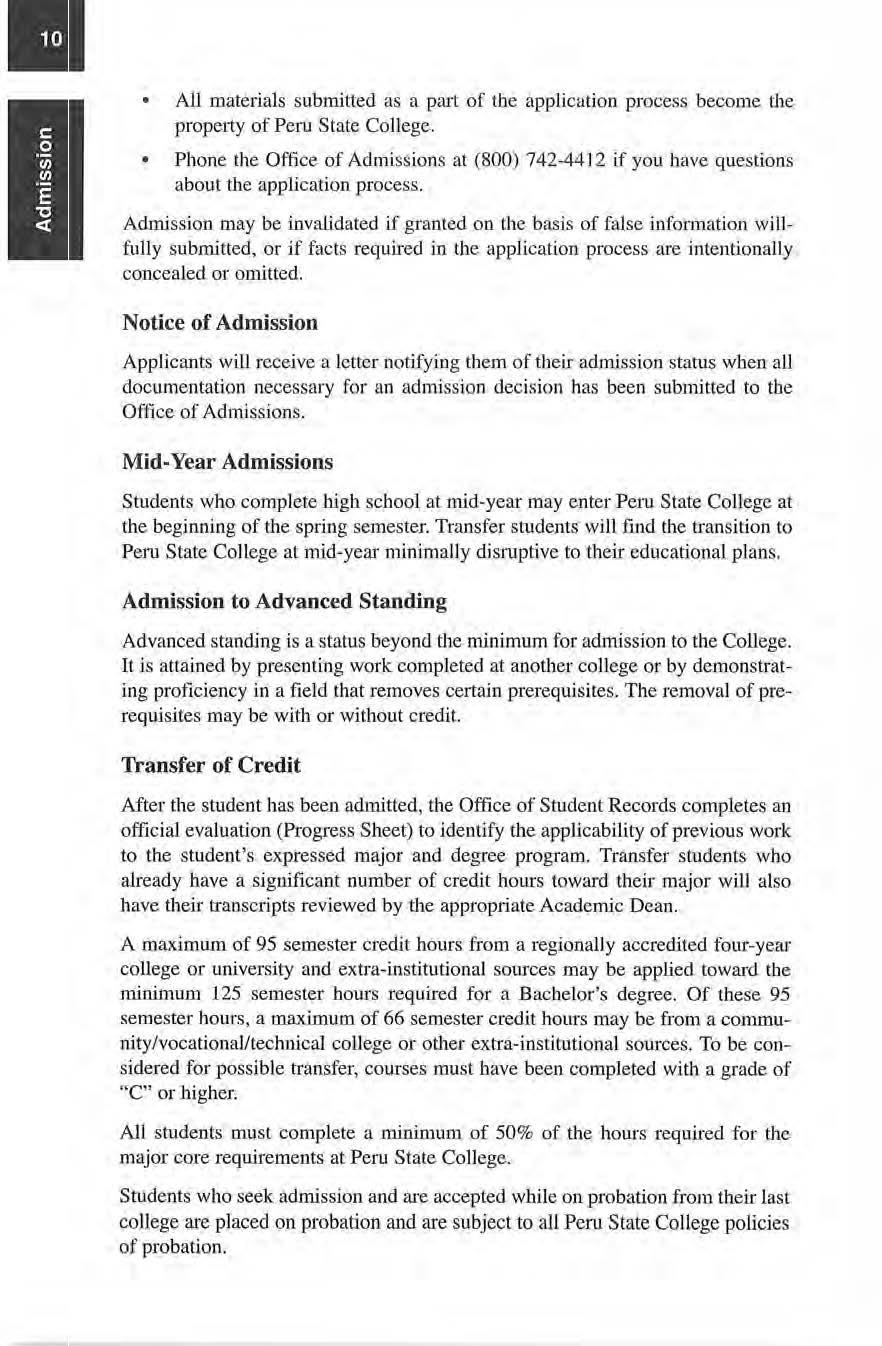
All students must comp lete a minimum of 50% of the hours required for the majOI core requirements at Peru State College.
Students who seek admission and are accepted while on probation from their last college are placed on probation and are subject to all Peru State College policies of probation.
Students who have been suspended from another co llege will not be considere<l for admission until the p eriod of suspension at their previous institution has expired and the facts of the dismissal are provided.
Students who discohlihue their attendance at Peru State College and then attend another college or university before seeking readmission are classified as transfer sn1dents.
Seamless Transfer
Transfer students who have earned an Associate of Arts (AA) or an Associate of Science (AS) degree from an accredited institution meet a ll PSC general education requirements and enter PSC with junior cla ss stand in g (or if less than 60 hours, with all hours transferred). Certain majors may have additional general education course requirements that will need to bo completed.
Transfer students from au accredited institution who have completed courses equivalent to Peru State College's General S t udies courses meet the College 's general education rnquirements in that area. Remedial or developmental courses are excluded.

Admission Requirements and Processes
Freshmen
Freshmen are students who h ave not previously attended college. Freshmen applicants who have graduated from an accredited high school in Nebraska wiJl be admitted to Peru State College. Freshman applicants who are under the age of 21 a.re required to take the ACT or the SAT prior to attending.
Freshmen applicants who have graduated from an accredited high schoo l outside Nebraska must have achieved a 2.0 cumulative GPA (on a 4.0 sca le) in high school and have a minimum score of 14 on tbe ACT or 560 on the SAT to be admitted.
The Hi gh School Equivalency Certificate, also known as the General Education Development dip loma, will be accepted in lieu of a high school diploma.
Application Process:
1. Submit a completed Application for Admission to the Office of Admissions.
2. Request to have your hi gh school records office ma.ii an official transcript to the Office of Admissions. Upon graduation from your high schooJ, we require a final high school transcript that includes your date of graduation, cumulative GPA, and class rank.
3. Have the results of your American College Te st (ACT) or Scholastic Aptitude Test (SAT) sent to the PSC Office of Admissions. This ca n be done by indicating P e ru State College when you take the test or by contact-
ing the appropriate testing agency. Peru State College ' s testing codes are ACT - 2470 and SAT - 6468. First time freshmen who have reached the age of 21 prior to the first day of classes are exempt from this requirement, but may be required to complete a college placement exam that will be used in the advisi ng process.
4. Submit the Peru State College Medical F orm . This fonn will be malled to the student after he/she submits an Application for Admission. The joformation from th is form is used to provide the Health Center with history, which can be used , should medical treatment become necessary. Proof of immun ization is requi1·ed piior to registration for classes at PSC.
Non-High School Graduates (freshmen)
Peru Sta te College requires verification of high schoo l graduation pri01· to enroll ing a student as a degree--see.king student. For students with a non-traditional o r home school education, the College accepts the successfu l completion of the General Education Development (GED) test , or a score of 18 011 the ACT or 870 on the SAT in lieu of a formal high school diploma.
Application Process:
l. Submit a completed App lication for Admission to the Office of Admissions.
2. Request to have an official copy of GED scores (proof of high schoo l graduation) sent directly from the testing ce nter to the Office of Admiss ions In o rder for the GED score to be officia l, students must either be 18 years of age or their high school class must have graduated.

3. H ave the results of your American College Test (ACT) or Scholastic Aptitude Test (SAT) sent to the PSC Office of Admissions This can be done by indicating Peru State College when you take the test or by contacting the appropriate testing age ncy. P eru State ColJege's testing codes are ACT - 2470 and SAT - 6468. First time freshmen who have reached the age of 21 prior to the first day of classes are exempt from this requirement but may be required to complete a college p lacement exam that wi II be used in the advising pro cess.
4. Subm it the Pern State College Medical Form. Thi s form will be mailed to the s t ude nt after he/she submits a n Application for Adtnissi011. The information from this form is used to provide the Health Center with history, which can be used, should mectical ti-eatment become necessary. Proof of immunization is required pri or to registration for classes at P SC.
Transfer Students
Transfer studen ts not on cwTent academic suspension from their previous instittJtion are el igible for admission to Peru State College. Transfer students interest -
-OR-
ed in a ttendi ng PSC should submit their completed applicat ion materials to the Office of Admiss ion s s ix months prior to their desired date of enrollment.
When deemed appropriate, the Director of Admissions may admit a transfer student witJ1 less than a 2.0 cumul ative GPA. Students witb less than a 2.0 will be admi tted on a probationary basis. In addition to the Application for Admission, applicants for probationary admission must:
• submit a letter describing their plan of action for academic suocess at PS C; if requested, schedule a personal interview with thl;l Viel;) President for Acadentic and Student Affairs;
• take no more that 12 semester hours in the first term of attendance;
• be ass igned to an undeclared academic advisor for at least the first semester.
Transfer student applicants with less than a 2.0 transfer GPA who do n ot agree to these conditions will be denied admission.
If admitted, the student must compl ete at least six hours and earn a semester GPA of 2.0 or better to continue attendance a nd to be el igible to declare a major. Transfer students admitted on probation will be suspended if, during the first semester at Peru State College, thefr GPA is less t han a 2.0.
Application Process:
l. Submit a completed Application for Admission to the Office of Admissions.
2. Request to have official transc1ipts from all post-secondary institutions attended sent to the Offi ce of Admissions (transcripts submitted by th e student are not official and will not be used fo r final admission or for evaluation of transfer credit). The transcript should show work attempted and completed for all terms attended up to that point. The student must also tequest that the iustitutio11 send an official copy of the final transcript after the current term is completed.
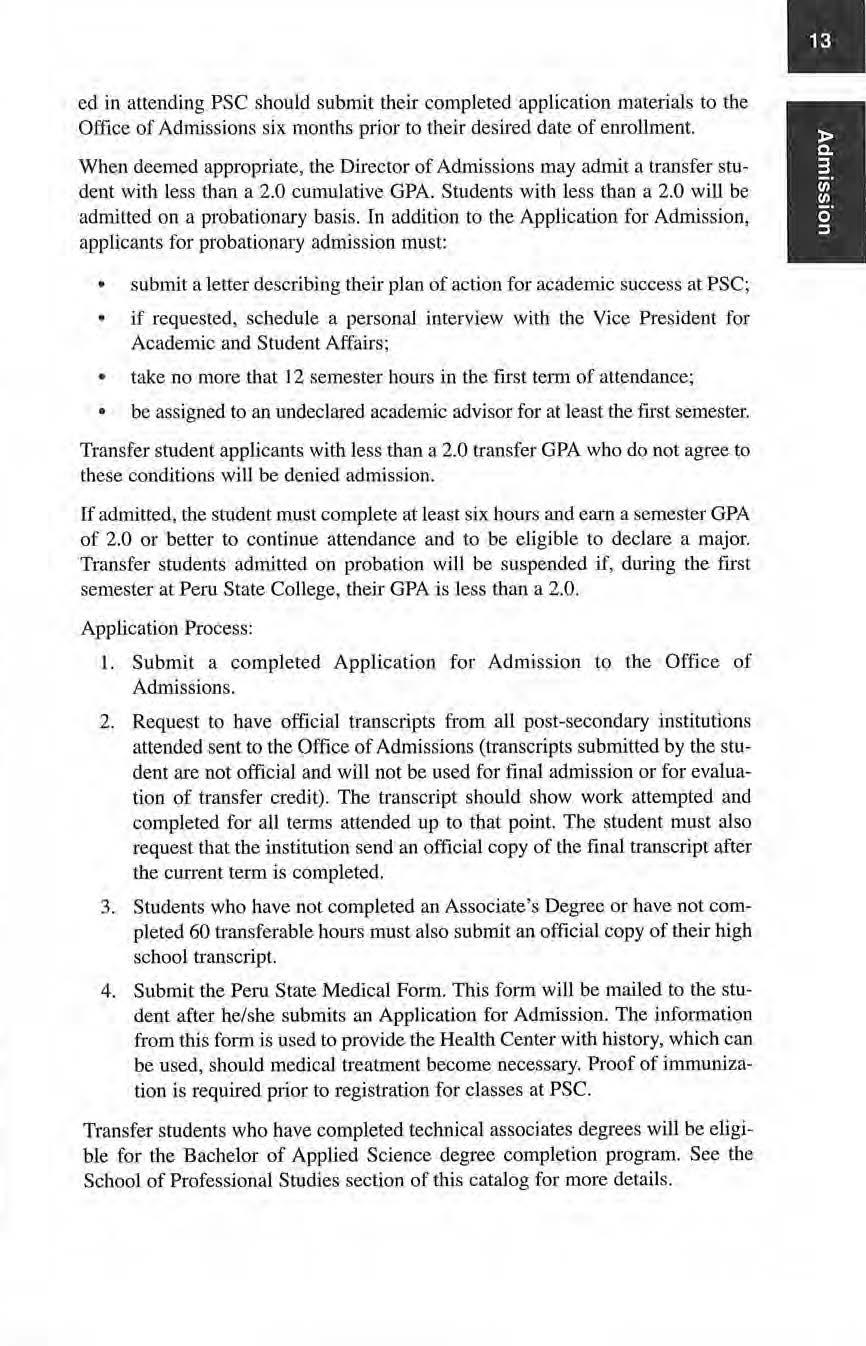
3. Stude nts who have not completed an Associate's Degree or have not completed 60 transferable hours must also submit an offic i al copy of tlleir high schoo l transcript.
4. Submit the Peru State Medical Form. This fonn will be mailed to the student after he/she s ubmits an Application for Admission. The in.formation from this form is used to provide the Health Center with history, which can be used, should medical treatment become necessary. Proof of immunization is required prior to registration for classes at PSC.
Transfer students who have completed technical associates degrees will be eligible for the B achelor of Applied Science degree completion program. See the School of Professional Studies section of this catalog for more deta il s.
Readmission
Readmission is for students who have previou s ly attended PSC b\.lt have interrupted their enrollment. All undergraduate students who prev iou s ly attended Peru State College and withdrew or discontinued their s tudies for a semes t e r or more (s ummer session exc luded) and a.fl' post-gradu a te students seeking an additioua.l academic program must apply to the Office of Admi ss ions for readmiss ion. Students suspended for academic or disc iplinary reasons mus t also reapply.
Students who discontinue arteudance at Peru State C o llege and attend anotber college or w1iversity are conside red transfer st udents and must satisfy lhe tran sfer student requ,irements for readmission .
Students are readmitted for th e se mester or s ummeJ term they wish, provided they le(t the College in good standing. Studen ts who inter,:upted their studies and who were on academic probation wiU be r eadmitted on probation provided they are in good standing with the College .
Students who are academicall y s uspended will not be considered for readmis sion for two semesters Previously suspended students who are readmitted will be permanent ly dismissed if s uspended a second time.

Readmitted students may grad uate under the sa me c atalog in e ffect at the ti.me of their first admission, provided tbey graduate within seven (7) years of their initial emollrneot to Peru State College. If the student took classes from a n other institution prior to being readmitted, the s tudent is considered a transfer student and Will be guided by the current College catalog
Application Process:
I. Submit a completed Application for Admiss ion.
2. If you have attended any post-secondary institutions since leaving PSC , request to have official tran scripts sent to the Office of Admissions. F or a transcript to be considered official, it mus t beat a scbool seal and be sent directly to the Office of Admissions.
Personal Enrichment or Recertification
Students not pursuing a degree program may take classes at PS C after completion of an application. Previous academic transcripts and standardized test scores are not req uired. Students taking classes as a non-degree-seeking student cannot receive financial aid.
Application Proce ss :
L Submit a completed Application for Adm.ission to the Office o f Admissions.
Transient Students
Transient student s are taking credits at PSC to co mplet e a degree a t a pre viou s
institution. T ransient students may take classes at PSC after completion of an application and proof of good standing at the previous institution.

Application Process:
l. Submit a completed Application for Admission to the Office of Admissions.
2. Subm"it proof of good standing at the previous institution in the form of a transcript or letter from the registrar at that instin,tion.
3 . Submit the Peru State College Medical Form. The info1mation from this form is used to provide U1e Health Center with h:istory, which can be used, should medical treatment become necessary. Proof of immunization is required prior to registration for classes at PSC.
Students Seeking an Endorsement or Certification
l. Submit a completed Application for Admission to the Office of Admissions.
2. Request to h ave official transcripts from all post-secondary institutions a ttended sent to the Office of Admissions (transcripts submitted by the student are not official and will not be used for final admi ssion or for eva lu ation of transfer credit). Th e transcript should s how work attempted and completed fo r all terms attended up to that point. The student must also request that the institution send an offic i al copy of the final transcript after the Cllrrent term is completed.
3. Studen ts who have not completed an Assoc iate's Degree or have not completed 60 transferable hours must al so submit a n official copy of their high school transc1ipt.
4. Submit the Peru State Medical Form. Th.is form will be mailed to the student after he/she s ubmits an Application for Admission. The information from this for m i s used to provide the Health Center with history, which can be used, should medical treatment become necessary. Proof of immunization is required prior to reg istration for classes at PSC.
International Students
International students at Peru State College make an importa nt contribution to the campus environment by bringing a global perspective to the classroom and cultural diversity to the social and cultural life of the College. International students are s t rongly encouraged to apply before the deadlines ( li sted below) to allow time to comple te application requirements. Receipt of application materials after listed deadlines may result in a delayed enrollment date.
Fall semester - July I
Spring semester - November 1
Application Process:
1. Submi t a completed Application for Admission.
2. D eclare your intended major on the Application for Admi ss ion
3 . Subm it official transcripts of all academic work. These include:
a. Secondary schoo l record s. Send a complete, year-by-year, official record of all schooling beyond the ninth year of education, including any certificates or diplomas earned An Eng li sh translation is required in addition to the originals.

b. College or university records (if applicable). Send a complete, year-byyear, offici a l .record of academic performance for all post-seconda1 y schooling including any certificates o r diplomas earned. An English tran slat ion is requhed in addition to th e origi n als.
Note that for admission to P SC, average marks during schooling and on final examinations must be a minimum 2.0 grade point average in tl1e PSC grading sys tem . In the P SC grading system, A is 4.0, B is 3.0, C is 2 .0. D is L.0, and F is 0.0.
International students may need to send their transcripts to a n international crede ntials evaluation service for evaluation. Students will be notified by the Office of Admi ss ion s if this is necessary and will be sent a list of agencies that perform this service. Th e cost will depend upon tb e type and complexjty of the evaluation and is the respo nsibi lity of the s tudent.
4. P rovide evidence of English language proficiency. Students must provide proof of English language proficiency in one of the following ways:
a. OfficiaJ TOEFL (Test of English as a Foreign Language) score report s howing a mini.mum score of 550 paper, 230 computer.
b. Students wl10 have graduated from an accredited high school in the U S. may satisfy thi s requirement by providing an official high school transcript a long with two letters of recommendation from hjgh school faculty/administrators regarding proficiency in English language skills.
c. Students transfen"ing to Peru State College after one (or more) years of full -time enrol lment at a college/ university in the United States may satisfy this requirement by providing official transcripts verifying a c umulative grade point average equ ivalent to 2.0 on a 4.0 sca le.
d. Citizens of Canada, Australia, England, Ireland, New Zealand, Scotland, or Wales are exempt from th is requirement.
5. International students are strongly encouraged to submit a Scholastic Aptihtde Test (SAT) score or an American College Test ( ACT) sc ore to the Office of Admissions. The test scores will not be used in dete1mining admi ss ion to the College, but will be used for awarding scholarships and advising pmposes.
6. Complete the Peru State College Med ical Form. Th is form is available from the webs ite at www peru.edu. This inform ati on is not used to evaluate an applicant for admission to the College. The completed fo rm is part of your confidentia l medical history which is used should medical treatment become necessary. Proof of medical immunizations is required for admission.

7 Complete th e Peru State College Statement of F inancial S upp ort. This form is available from the website at www.peru.edu. Students must s ubmit a completed form along with doc umentation from a financial institution showing the ava il ability of fina nci al s upport for the dolllu amount indicated on the form for the firs t year at PSC
Upon admission to Peru State College, the student will be sent a Form 1-20. The prospective student then takes the I -20 and other supporting academic and financial documents to the nearest United States embassy or con su late to ap ply for an F -1 (stu dent) visa.
EXPENSES & FINANCIAL AID
The expenses for attending Peru State College are set by the Board of Trustees of the Nebraska State Colleges and Pern State College. The College reserves the right to change its tuition, fees, and other charges at any time. Add i tional expenses for books and supplies, travel, and personal items will vary for individual students. P lease refer to the Schedule of C lasses available from tbe Student Records Office o r on the Peru Sta te Col lege website at www peru,edu.
Nebr a s ka R es iden cy Regulations for Tuiti on Nebraska residency for tuition purposes is dete 1mi ned in accordance with Nebraska statutes and the policies of the Board of Trustees. Residency status is based upon evidence provided in a student's Application for Admission and related documents. The Office of Admissions classifies all new students.
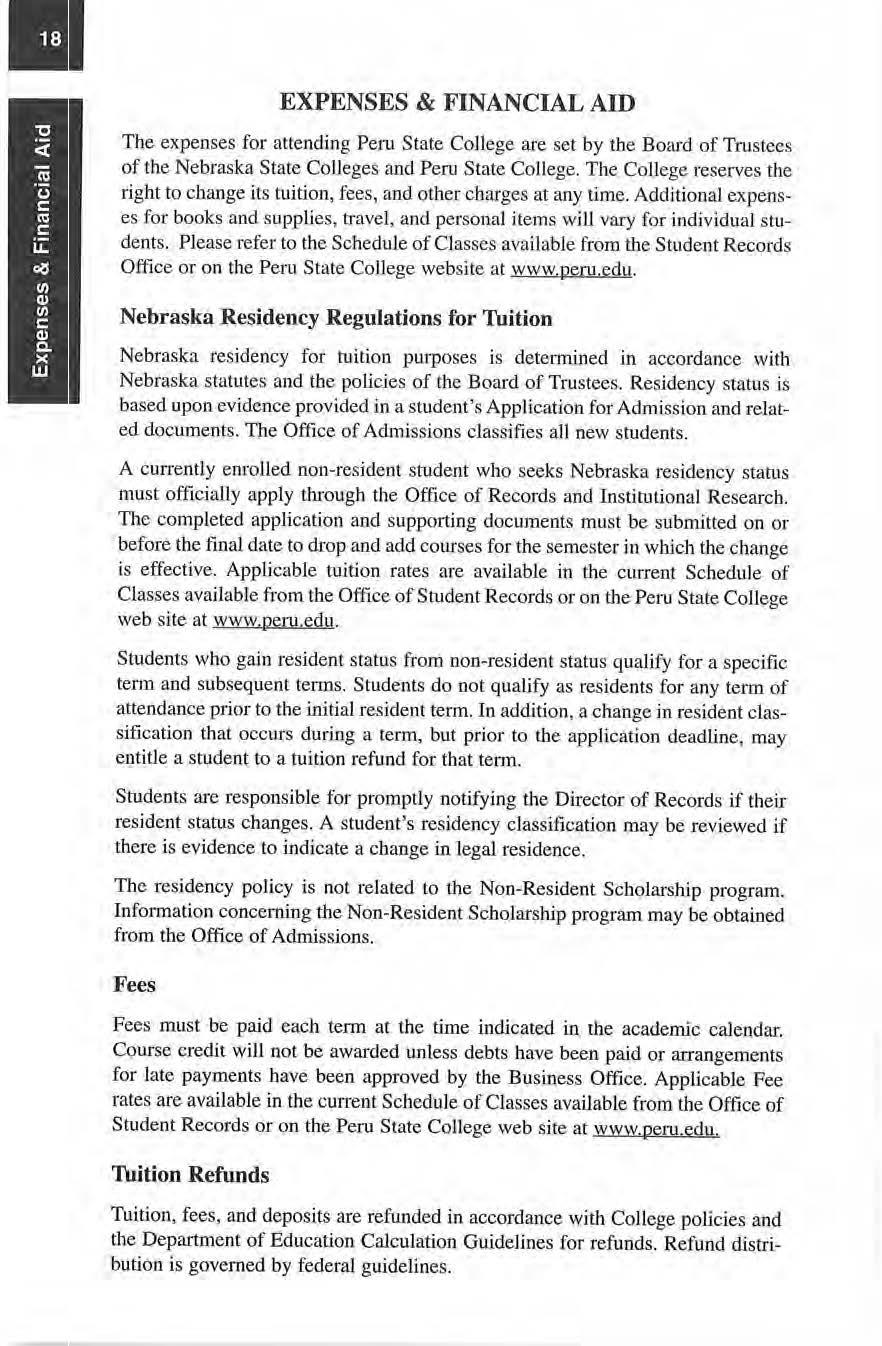
A currently enrolled non-resident student who seeks Nebraska residency stan1s must officially apply through the Office of Records and Ins titutional Research. The comp leted ap plicati on and supporting documents must be submitted on or before the final date to drop and add courses for the semester iu which the change is effective. Appli cable tuition rates are available in the current Schedule of Classes avai lable from t he Office of Student Records or on the Peru State College web site at www.peru edu.
Students w ho gain resident status from non-resi dent status qualify for a specific term and subseq uent terms. Students do not qualify as residents for any term of attendance prior to the initial resident term. I n addition, a change in resident classification that occurs during a term, but pri or to the app l ication deadline , may entitle a student to a tuition refun d for that te rm.
Students are respons i ble for p romptl y notifying the D irector of Records if their resident status changes. A student's res iden cy classification may be reviewed if there is evidence to in d icate a change in legal residence.
The rel;idency pol i cy is not rel ated to t he Non-R esident Sch olars hip program. Informa tion concernin g the Non- Res ident Scholarship program may be obtained from the O ffice of Admissions.
Fees
F ees must be paid each term at the ti.me in dicated in the academic calen dar. Course credit will not be awarded unless de b ts have been paid or arrangements fo r late paymen ts have been approved by the B usin ess Office. Applicable Pee rates are available in the current Sc hedu le of C lasses availab le from the Office of Student Records or o n t he Peru State College web s ite at www.pem .edu,
Tuition Refunds
Tuition, fees, and depos its are refunded in accordance wit h Co llege policies and the D epartme nt of Education Calculation Guidel i nes for refu nds . Refund distribution is governed by federal guidelines.
Withdrawal from Cl ass
Tuition and fee refunds are granted for a reduction in semester credit hours through the final date to drop/add regular semester courses as indicated in the catalog. Th e final date to withdraw from class during tl1e s ummer sess ion is a proportional period of time.
Withdrawal from College
Students who h ave registered and then wish to drop all courses after the semester start date must officially withdraw to zero c red its. A student may do so in the Office of the Director of the Academic Resource Cen ter Failure to initiate the w ithdrawal process in a timely manner will result in "F" grades.
FEDERAL AID - Withdrawal from College can reduce your Federa l Aid EJigibiUty. Within 30 days of your withdrawal, a Return to Title IV Funds (R2T4) Calculation will be completed, and you will be notified of the change in tlie amount of Federal Financial Aid applied to your account.
INSTITUTIONAL AID & C HARGES - Institutional Aid, Tuition Charges, Fees, and Housing Charges will be reduced based on the sche dule li s ted below. (This includes al l schol ars hips, waivers, and supplemen tal grants not i ncluded in the R2T4 Calculation. ) Board Charges will be adjusted according to the official date of withdrawal.

OUTSIDE SCHOLARSHJPS - Ou tside schol arships will be adjusted according to th e sc hed ule be low un less donor in structio ns indicat e otherwise.
PLEASE NOTE: Th e combination of these calcu lations may result in a balauce due to the College, an o utside donor. and/or the federal government.
Withdrawal Schedule
Regula1· Semester
First Week
Secon d Week
Third and Fourth Week
Fifth thru Eighth Weeks
After the Eighth Week
Maymester/Summer Session
First Week
Second Week
T hird Week
After tbe Third Week
Workshops and Other Non-Standa rd Academic Terms
R efunds for workshops and other JlOn-standard terms wi ll be proportional based on th e time period of the workshop and in compliance with the Deprutme nt of Education Calculation Guide lines for refunds. The re will be no refunds after 50 percent of the workshop 's o r non -standard term 's con tact how·s R efund specifics for non-standard workshops and ex.ceptioos a re determined by the Business Office Manager.
100% 90% 50% 25% No Adjustments 90% 50% 25% No
Adjustments
Room and Board Contracts

Room and Board contracls are for one full academic year beginning in the FaU and ending at the conclusion of the Spti.ng semester. Room reservations require a deposit of $100 and must accompany the room and board contract. Completion of a room and board contrnct is required pJior to occupying a room The depo sit is refundable if the student has graduated , left to student teach, fulfilled thefr entire contract period , or have an approved contract cancellation for a severe medical or health problem (less any room damages and cleaning charges). Students may appea l to be released from a m ea l plan by fonnaUy appeal ing to the Director of Campus Hous ing and Security. Room a nd boa.rd rates are available in the current Schedule of Classes, the Office of Admissions, the Housing Office, Business Office or on tbe Peru State College web site at www.peru.edu.
Room and Board Refunds
Students who withdraw from College or whose housing contrac t is c ru1celed may receive prorated refuuds of their roo11J a nd board fees. Refunds for room and board fees follow tbe sa me refund schedule estabhshed for tuition a nd fees . Contract cancellation for violations of the student code of conduct wrn not receive refunds for room and board.
Room deposit will be refunded if:
l. All terms of the contract are completed.
2. There is no damage or Lmusual wear-and-tear to the facility.
3. The student checks out of his/her room properly and returns all keys.
4. The facility is left cJean.
Applying for Financial Aid
Fin ancial aid is available to most st11dents planning to attend Peru State College. Financial aid consists of scholarsh ips, grants, fede ral work study, and loans At Pero State College, aid is awarded to students based on qualifications and/or financial need. In orde r to be awarded need- based Title IV Federal Financial Aid, a st11dent must comp lete a Free Applica(jon for Federal Student Aid (FAFSA) form. The FAFSA form measures a family's ability to p ay, not the willingness to pay. for a postsecon dary education. For priority consideration, the preferred filing date for the Free Application for Federal Student Aid (FAFSA) is March l. The priority deadline for institutional scholarships is February 1. Questions regarcling applications or eligibility should be directed to the Office of Financial Aid.
New fres hmen and s tudents transfeni.ng to Peru State College who wish to apply for finan c ial aid should :
I. Comple te the application process through the Office of Admissions.
PLEASE NOTE: A student roust be ad.mittcd as a degree-seeking student to Peru State College in order to receive federal financial aid. (See requirements under Atlmissious.)
1n addition, all students who wish to apply for federal financi al aid should:
1. Complete the Free App li cation for Federal Student Aid (FAFSA). Peru 's Title lV code is 002559. This application must be tiled annually. Fin ancial aid is based upon financial nee d and is reviewed annu ally.
2. Complete an In s titutional Application for Financial Aid.
Requirements for F inancial Aid
F in ancial aid awards are determined based on an academic year. Amounts are c redited equally per tem1 of enro llment to the s tudent's bill. At the e nd of each term of enrollmen t, the Financial Aid Office will review the records of students to determin e if they are maintaining necessary e li g ibility requirements for aid awarded to them. Athletic and divi si o nal scholars hips will be reviewed by departments. Satisfactory Academic Progress will be reviewed by t he Vice President for Academic and Student Affai rs and the Offtce of F in ancial A id Peru State College is not required to replace scho larships lost with other types of financial aid.
Institutional Sch o larships
Further information about, or an app li cation for, all scholarships may be obtained by contacting the Peru State College Office of Admissions fm stu dent awards , o r the Office of Financial Aid for returning student award s.
Board of Trustees Scholarship

The Board of Trustees of the Nebraska State Colleges provides full tuition scholarships for cw-rent graduates of Nebraska hig h schools who have demonstrated outstanding academic achievem ent. The recipient must b e a Nebraska resident, have a minimum ACT com p os ite of25 or SAT of 1130, and graduate from a Nebr aska high sc hool. One letter of recommendation is required. Th e scholarships are renewable to cover eight acade mic semesters. The student must maintain a 3 25 G PA to retain the sc ho larship, Th e application deadline is January l5.
Davidson Scholarship
The Davidson Scholarship is avai lable to out-of-state graduatin g high school sen iors. The recipient must be a first-time fres hm an , live out of the state of Nebraska, and h ave a minimum ACT compos ite of 20. This is a $400 sc holarship fo r one academic year.
Leadersh ip Scho larship
The L eadership Sc holarship is available to graduating high sc hool seniors wh o have held a leadership role in high school clubs and o rganizations and plan to continue that leadership at Peru State College There are t hroe l evels of this award, Gold ($ 1000 fo r 2 years), Silver ($750 for 2 years), and
Bronze ($500 for 2 years). This scholars hip is ren ewab le for the second year pi-ovided students maintain a minimum cumulative GPA and participate in at lease one campus organization.
Transfer Leadership
This is a two- year scho larship awarded to a transfer stude nt w ith at leas t 30 hours o f college credit with a cumul ative GPA of 2 .5. T his schoJarship is renewable for the second ye ar provided the s L11dent maintains a minimum of 2 .5 cumulative GPA and participates in at least one campus organization.
Pres iden t Service Schola.i·ship
The President's Service Schola rs hip i s awarded to incoming freshmen planning to attend Peru State College. Students receiving this award are requirnd to comp lete 100 hours of community service during their first year a t Pe ru State College The commu11ity serv ice may be on-campus, in their home community, or in a surrounding community. It is a one-half tuitio n award for the first year at Peru State College.
Phi Th e ta Kappa
This schol arship is available to community co ll ege graduates who have a c umulative GPA of 3 .5 and are members of th e Phi Theta Kappa Society. H pays fu ll in -state tuition for up to 64 hours. These scholars hips are limited in number.
Special Activity Tuition Scholarship
Specia l Activity Tuition Scholarships are awarded to students enrolled full time who possess speciaJ abil ities in a r t, music, a nd cheerleading based upon a rev iew of their portfolio , performance, or audition. These schol ars hips are awarded in the form of waivers. R ecipients ,u-e expected to participa te in the program for which the award is given Applicants s hould contact the appropriate department head to indiq1te interes t in a scholarship. Amount s vary and may be renewable based upon the program comdinator's recommendation.
Athletic Scholarship

Students who possess athletic abi l ities within a ny of P SC's ni ne varsity spo1is may be offered an Athletic Scholarship. The head coach of the student's athletic interest must be contacted to ari-ange appropri ate tryouts and interviews. Amounts vary and may be renewable base d upon the coach's recommendation.
Cooperating Schools Scholarship
Cooperating School s Scholatships are available to designate d graduating se niors of sch ool sys tems who assist Peru State College with the teacher education program. Scholarships cover one-h alf of the .in- s tate costs each semester for a total of e i ght semes ters. Pote ntial applicants should contact their h igh school gllidance counselor fo r more information.
Midwest Student Exchange Program
The Midwest Student Exchange Program enables stude nts from Ka nsas, Michigan, Minnesota, Missouri, an d Nebraska to enroll in designated institutions at reduced tuition levels outside of their hom e state. The studen t pays 150 perce nt of resident tuition rate opposed to 200 percent for a normal out-of-state rate. Apply through the Office of Admissjons.

Student Opportunity Scholarship Program
The Student Opportunity Scho larship Program is a waiver program allowing non-resident scho lars to attend Peru State College and pay in-state tuition . Thls three (3) year, pilot program expands the opportunities previously identified in the Nonresident Scholars Program. Students meeting the following criteria s hould apply for the waiver:
• For entering freshmen, the ACT/SAT requirement is 22/1030; or
• For entering freshmen, the class rank requirement i s th e upper half of the ir high school grad uating class; or
• For entering freshman, the cumulative high school GPA is 3 25 or higher 011 a 4.0 scale.
• Transfer students are requ ired to have a 3.0 c umulative GPA for prev ious college work.
• To continue in the program, all stt1dents are required to maintain a cumulative 3.0 GPA.
Nonresident Working F ull-Time in Nebraska Program
The Nonresident Workin g FuU-Time in Nebraska l>rogram allows employees working full time in Nebraska, who reside out of state but within states contiguous to Nebraska and file Nebraska nonresiden t income taxes, to qualify to be charged in°~tate tuition rates. The l egal dependen ts of these employees are also eligible for this program. Studen ts reques ting resident student tuition status u nder U1is policy need to provide the Office of Admissions wi th evidence of cmTent full-time employment in the State of Nebraska and ev id ence of fili ng Nebraska income tax fonns for the most recent tax year. Eligibility for the resident tuition under th.is program i s s ubject to review each term a nd will con tinue only as long as the required critelia are sati sfied.
Fede1·al Financial Aid
A student must compl ete the Ftee Application for Federal Student Aj d (FAFSA) in order to be considered for federal financial aid. The priori t y fili ng dead l ine i s March 1.
Federal Pell Grants
The results of information submitted to the Department of Education ( re s ults of the Free App lication for Federal Student Ajd - FAFSA) determine Pell Grant el igibility.
Federal Supplemental Educational Opportunity Grant (FSEOG)
These grants are awarded to students with exceptional financial need. The student must be a recipient of a Federal Pell Grant.
Federal Work Study (FWS)
Federal work study is a need-based program. The intent of work study is to allow a student an opportunity to pay for a portion of his/her' e ducation by working. A student can work a maximum of 20 hours per week.
Federal FamjJy E ducation Loan Programs

Loans included in this program consist of Fe deral Subsidized and Unsubs idized Stafford Loans and Federal PLUS Loans. These are longterm l oans made available to stude nts and/or their parents. Loan amounts vary dependjng on grade level.
State Grant Programs
Nebraska State Grant (NSG)
The recipient must demonstrate substantial need and be a Nebraska resident enrolled at an e l igible N e braska institution of higher education.
Satisfactory Academic Progress Standards for Fin ancial Aid
According to federa1 regulations, Peru State College is required to monitor standards of satisfactory academic progress for students receiving Federal Titl e IV funrung. Federal aid includes: Federal Pell Grant, Federa.l SEOG Grant , Federal Perkins L oan, Federal Stafford Loan , Federal Parent Loan, and F ederal Work Study.
Students who are receiving federal aid , as well as campus-based rud, are required to maintain satisfactory academic progress i Dorde r to co ntinue to be e]jgible to receive aid.
l. PROCEDURES - At the end of each term, the academic records of all financial aid recipients are reviewed to detennine if each s tudent met the sa tisfac tory academic progress requirements.
2. SATI SFACTORY ACADEMIC PROGRESS All fi.nancial1aid recipients must maintain a cumulative grade point average of 2.0 or highe1· to contiJ1ue to be eligible for aid.
Student enrollment levels are determined accordjng to the following guidelines.
Full-time 12+ hours
Tbree-fourths time 9-11 hours
hours
< One- half time < 6 hours
One-half t.ime ........ . .... . .............. . . .6-8
All financial aid recipients must complete a minimum number of credit hours eac h term as follows:
Full-time 12 hours
Three-fourths time .............................9 hours
One-half Lime 6 hours
<One-halftime ....................... . . . ... a ll hours
Only hours that are passed (grades of A, B, C , D, CR) will be coun ted as hours completed. Grades of I, W, F and NCR will not be cons ide red as hours completed.
3. MAXIMUM TIME FRAME - A studen t pursuing an undergraduate dcgrne at Peru State College may receive 1'itJe IV aid for up to a maximum of 188 attempted credit hours or until obtaining a bachelor's degree, whichever comes first.
4. PROBATI.ON - Any student who does not meet the satisfactory academic progress requirements as outlined in #2 wi ll be placed on "financial aid probation" for the fol1owing term. The st udent will be e l ig ibl e to receive aid duri ng the probationary term. Howeve r, the student must meet a ll of the satisfactory academic progress requirements at the end of th e probationary term to conti nue to be eligible for financial aid.
5. SUSPENS ION - If the student does not meet a!J ,the satisfactory academic progress requirements at the end o f the probationary term, the student will be placed on ·'financial aid s uspension." Students who are o n s uspension are not eli gib le to receive any financial aid. This includes grants, 1,oans, work s tudy, a nd institutional scholarships.
6. REINSTATEMENT - A student can regain el igibility for financial a id by enrolling for at least six PSC credit bours at his/her own expense and achievi_ng a cumulative grade point average of at least 2.0 and completing the minimum number of hours outlined in #2. To be reinstated, a s tudent must submit a written request for reinstatement and a copy of his/ her grade report t o the Office of Financia l Aid to demonstrate comp Uance with the sati sfactory academi c progress requirements.
7. APPEALS - l f a s tudent whose financial aid h as been suspended feels he/s he ex perien ced significant extenuating circ umstances which affected his/her ability to meet the satisfactory academic progress requirements, he/s he should submi t a written appeal to the Office of Fi nan cial Aid within two weeks of the d ate of the suspens ion letter. Documentation of any extenuating circ umsta nces s hould be attach ed to the appeal. The Appea ls Committee will review the appe.tl and determine w hether the student' s financial aid e li gibil i ty should be reinstated.
8. PRIOR ATIENDANCE - Th e Office of Financial Aid is required to consider all a ttendance at Peru State College w hen determining whether or not a student is making sat isfactory academic progre ss, even if no financial aid was received during the previous pe riod of enrollment. The Office of
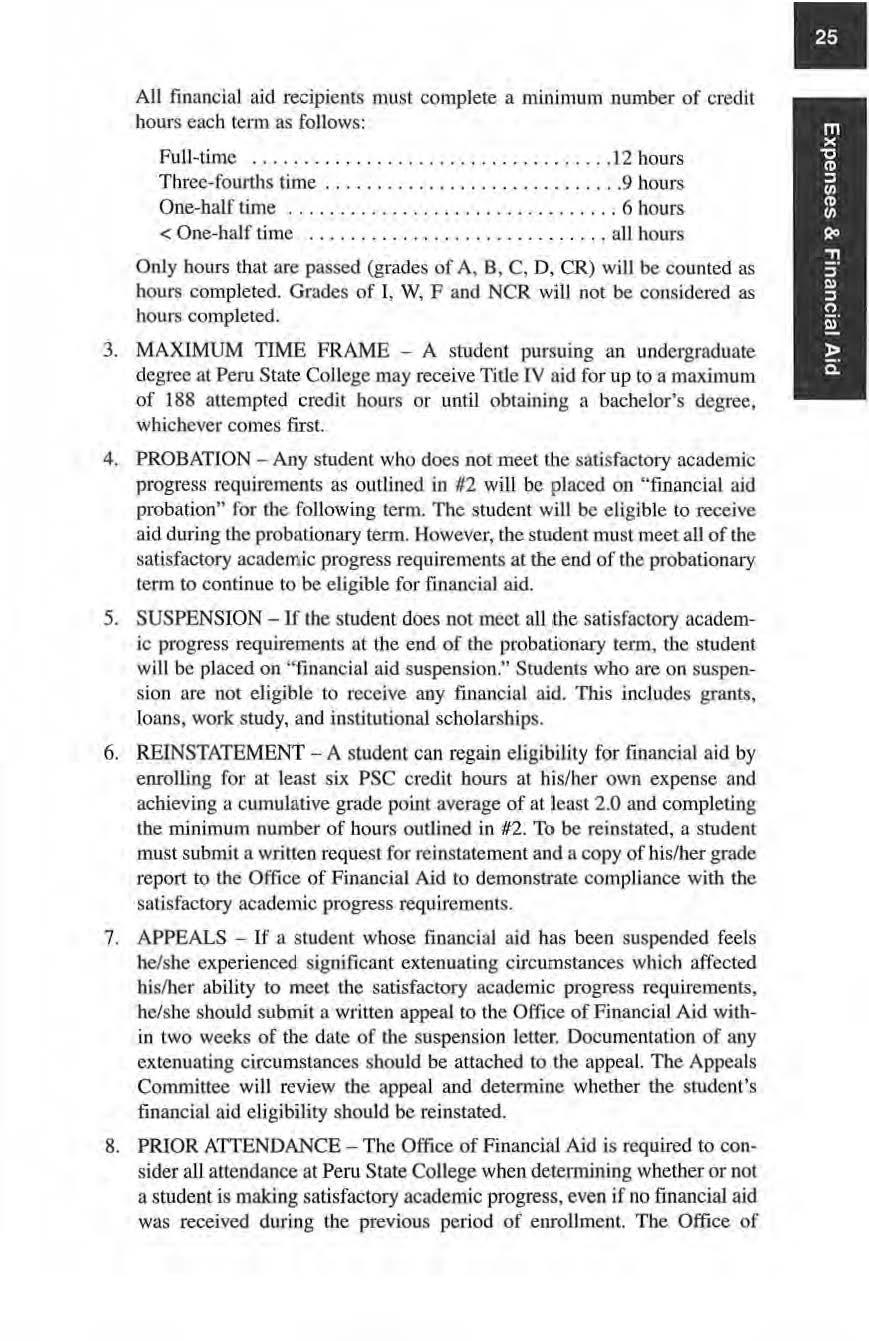
Financial Aid will review the student's academic transcript to determine if the satisfactory academic progress requirements have been met. Any sn1dent who does not meet these requirements wiJI be placed on "probatioll" or "suspensioD" as 8JJpropriate.
Scholarships
The Peru State College Foundation admin isters various scholarship funds. Scholarships are awarded on the basis of academic achievement, financia l need and/or a combination of both. One-balf of the amount of the scholarship is awarded each semester. Scholarships and oth er financial aid are ava il able to deserving full-lime students because of the generous contributions of a lumni , friends, corporat ions, and f01.mdations.
The Peru State CoJJege Foundation was organized in June, 1955 and incorporated as a non-profit corporation fo r educational and charitable purposes in May, J 962. Furtl1er informatio n about, or an application for, all scho l ars hips may be obtained by contacting the P eru State College Office of A dmi ss io ns for student awards, or the Office of Financial Aid for returning student. awards.
L aurine Anderso.n Tri Beta Scholarship
The recipient of this sc hol a rship is selected by the School of Arts and Sciences and must be a Biology major and member of Tri B eta. The scholarship was estab li s hed by Laurine Anderson, class of 1928, who was a chruter member of llie Peru Chapter of Tri B eta.
Marian Andersoi1 Scholarship
Thi s scholars h ip is awarded lo a n incoming female freshman Africa nAmerican studen t.
Charles Andrews Memorial Scholarship
Thi s fund was established as a memorial to C harles Andrews, a I 9 14 graduate of the College. The scholars hip is award ed to an incoming freshman who shows academi c promise a nd may be renewed depending on the student's grade point average.
Aquila Scholarship
This scho l arship is funded by Aquila, In c. to students who are ser ved by Aquila. Th e stud ent must apply for the scholarship an d provide proof tha t they or their paren ts are provided n atural ga.s throug h Aquila.
William L. Armstrong Scholarship

Thi s sc holarship was established by i-he Armstrong Family Foundation in memory of their fat her, a 1930 graduate of P eru S ta te College. The recipient must be from rurnl Southeast Nebraska, a fuJJ-tirne s tudent, and have a C grade po i nt average.
Auburn State Bank and Carson National Bank Scholarship
T hi s schol arsh ip i s available to stude nts from Auburn/Peru, Johnson-Brock
or Southeast Consolidated High Schools The scholarship is for a student participating in football and is selected by the footbaJI coach and Athletic Department.
Bath Family Memorial Scholarship
Tbis scholarship was established in 1967 by Mrs. Minnie Bath in memory of her husband John and her two sons, Edward J. and Robett L. Bath. It is awarded for academic achievement.
Merle "Hoot" Bauer Memorial Schol a1·ship
This scholarship is awarded to an incoming freshman, with preference to Tecnmseb, Holdrege, North Platte, or B ertrand graduates, who will be on the basketball team. Mr. Bauer. a 1950 graduate, was an outstanding varsity basketball player. The recipient will be selected by the Athletic Department.
E.C. and Mae Miller Beck Scholarship
This sc holarship was established by Dr. and Mrs. Beck in 1967 for an English major with athletic abi li ty.
Blue Devil/Whi te ~ngel Forever Scholarship
Sid Brown, a 1959 grad of PSC , contacted former Blue Devil and White Angel members to establish this schol arship . This scholarship is awarded to a male or female athlete.
A lbert Brady Scholarship
Established by the Peru State College Letterman's Club and the friends of Albert Brady, the scholarship is awarded to a Biology major with athletic abiJity. The recipjent will be selected by the Athletic Department/School of Arts and Sciences.
George V. and Iva Seid Brown Scholarship
This scho larship was provided by Sid Brown, a 1959 gradu ate of Peru State College, in memory of his parents. The scholarship is available to Nebraska residents with a 3.0 or higher GPA.
Esther Delzell Brownell Memorial Schola rship
Mrs. Brownell's fam il y established this scholarship in her memory. It is awarded to a deserving student. Ao interest in dramatic act ivities is e ncow-aged.
Ann Buman Scholarship

This scholarship was established by Mrs. Buman and is ava il able to Pawnee County students who meet certa in cr iteria.
Pearl Morgan Butler Memorial Scholarship
Tbe scholarship provides for tuition as the fund allows. It was established by Joy Elmer Morgan in memory of bis sister who attel}ded the College in 1905.
Campus of a T housand Oaks Schola rship
This schol arship is awarded for academic excellence and/or potential. Funds in this pooled account have been provided by the Alma Ashley Estate, Ullian Barnes, Alice Warnock Scholarsbip, Class of 1939, Jess A. H an-is Scholarship Fnnd , Harold and Alice Grush Johnson, and the E.A. Larson Scbolarsbjp Fund
Roy Chamber lain Scholarship

The Roy Chamberlain Scholarship was provided by Mrs. Chamberlain in memory of her husband Roy, a 1927 alumnus of Peru State College. Any fuJJ-time male student· is eligible to apply.
RaJ 1>h and Maxine Chatelain Scholarship
This scholarship was established by the sous of Ralph and Maxfoe Chatelain who were gi-aduates o-f Peru State College and long-time educators in Nemaha County. The scholarship will be awarded to juniors or seniors in teacher education with a preference for residents in Nemaha County NE.
C.C. and Erma Wil son Choyce Sc holarshi p
This scholarship was established by Mr. and Mrs. C.C. Choyce to recognize academic achievement. Mr. Choyce attended the College in J919 , and Mrs. Choyce graduated i.n 1920.
A.B. Clay burn Memorial Awa rd
Thjs award is granted each year to a junior in teacher education majoring in t he Social Sciences who has displayed the qualities of outstanding citizenship, progress, and potential. T he recipient wiJJ be selected by t he Schoo l of Arts and Sciences.
Cle men ts Band Scholars hi p
Family and friends have established the Clements Band Scholarship in appreciation of Mr. Clements' effot1s to establish a band at Peru Prep. The award is fo r au 1ncomin g fres h man who wil l participate in band activi ties. The selection, will be made through the audition process conducted by the School of Arts and Sciences . Mr. Clemen ts was a member of the College facu lty from 1926 to 1953.
Cr abtree Memo ri al Schola rs hip
Dr Eunice Crabtree established this scholarship in 1982 in memory of her father, Dr. James Crabtree, and her brother, James Wilson Crabtree, who died in infancy. Dr Crabtree served as President of Peru State College from 1904- l 9 LO and was the founder of the National Educational Association. The scholarship is awarded for academic achievement.
Ada Crooker Memori al Sc holarship
This schol arship was established in the memory of Ada Crooker who taught bus i nes s at Auburn H igh School. The recipient must be a female graduate of Auburn High School majoring in Business at the College. The recipient will be selected by Aubum H igh S<.;hool.
Hobart Davidson Scholarship
The brother of long-time women 's Physical Education instruct or Phyllis Davidson, funded several s chohu·ships to be awarded to both traditional aud non-trad itional s tudents, including some scholarships s pecified fOJ· out-of-st ate s tudents. Phyllis Davidson se rved Peru State College from 1929 unti 1 1957. Hobart Dav id son was an attorney in Oklahoma.
Phyllis Davidson Memorial Scholarship

Th.is scholarship was established by D r. Lois Ch ristensen , a 1948 aJunuia, in the memory of Ph yllis Davidson who sened Pe ru State from 1929 to 1957 as a professor of women' s Phys ical Educati on. Jt is awarded to a female majoring in Physical Educatio n. The recipient will be se lect ed by the Ath letic Department.
Elizabet h Aldricl1 Dougherty Sc holarship
El izabet h Dougherty was a l921 grad uate of PSC. Thi,s scho lars hip was establi shed by her children and is designated for a junior or se ni or majoring ill Education. Students living in Nemaha, Richardso n, Johnson . Pawnee, or Otoe counties in Nebraska are eligible for this scholars hip . Selection will be made by the School of Education and Graduate Studies.
He len Naeve Douglas Music Scholarship
Thi s sc ho larship is provided annually by Ju dson Do'tlglas in memory of his mother. The award is given to a freshma n who is a talented musician majoring in Music Education. Preference will be g iven to Johnson, Otoe, or Nemaha County res id ents. The recipien t will be selected by the School of Arts and Sciences.
Mac Dunning Industrial Arts Awa rd
Thi s jg an annual cash grant given to an outstanding student in Indu stri al Technology and Education The rec ipient will be selecte d by the School of Professiona l S tudies.
Lura Hendrichs Eichler Scholarship
This award i s presented annually to a student who bas demonstrated ability, aptitude, and in terest in .kindergarten education . The School of Education and Graduate Studies selec ts the recipient.
Lou.re Sal tzman Firoved Scholarship
Mrs Firoved, a 19 J 6 graduate of the College, served many years as secretary to the college president. This scho larship, establ ished by her children, is designed for a studen t majorin g in Business
E ls ie I. Fisher Memoria l Scholarship
Thi s scholarsh ip was es tab li s hed in memory of Elsie T. Fisher, a graduate, who taught for 39 years in the Omaha school system. lt ls awarded to students in Art Education
Dr. Richard Fly nn and Senator F loyd Vrtiska Academic Scholarship
This sc holarship was established by friends of Dr. Richard Fl yn n and Senator Floyd Y1tiska and is available to incoming freshman st ude nts who res-ide in the first legislative district and graduate in {he upper one-fourth of their class.
Foreign Student Scholarship
This sc holars hip is funded by Wei Chong, a 1992 graduate, and is available to foreign students attending Peru State College.
Esther Cole Franklin Memorial Scholarship
Dr. Franklin was a 1920 graduate oft.he College w ho was recognized as a distinguished alumna in [977. This scholarship was established in her memory and is awarded to an outstanding student.
Glen and Verda Frary Scholarship
Glen and Verda Ha uptman Frary were both 1927 grad uates of Peru State College who devoted their careers to educat ing youth. This scholarship is to be awarded to a sophomore or junior Educat ion major.
Emma Anne Hart FulJer Scholarship
H elen Hart Fuller, who graduated from P eru State in 1919, left a sizeable bequest to assist no ntraditional s tude nt s who have been out of high sc ho ol at least ten yeats.
Lov isa Albert Glaze Memorial Schol arship
This award is provided by the family of Lovi sa Glaze, a 1934 graduate of Peru State College. The award is available to Education majors with a pref. erence to elementary education. A sophomore, junior, o r senior is eligible for this scholars hip.
Amiie V. Grass Memorial Scholarship
This scholarshi p was established by the fami ly of Amzie V. Grass , al 929 graduate of PSC , and is awarded to juniors or seniors enroll ed in the School of Education and Graduate Studies or the School of Professional Studies.
Ch ri s Haddad Memorial Scholarship
Established by friends and family, this scholarship is awarded to a Busi ness student, with preference to someone from Seward Co unty. C hr is H addad was a 1989 graduate and was an admiss ions counselor at Peru State College.
Helen Parker Hanika Scholarship
Helen Parker Hanilca was a 1917 PSC graduate. Thi s scholarship is for an incoming freshman who has graduated from a Richardson County (NE) high school.
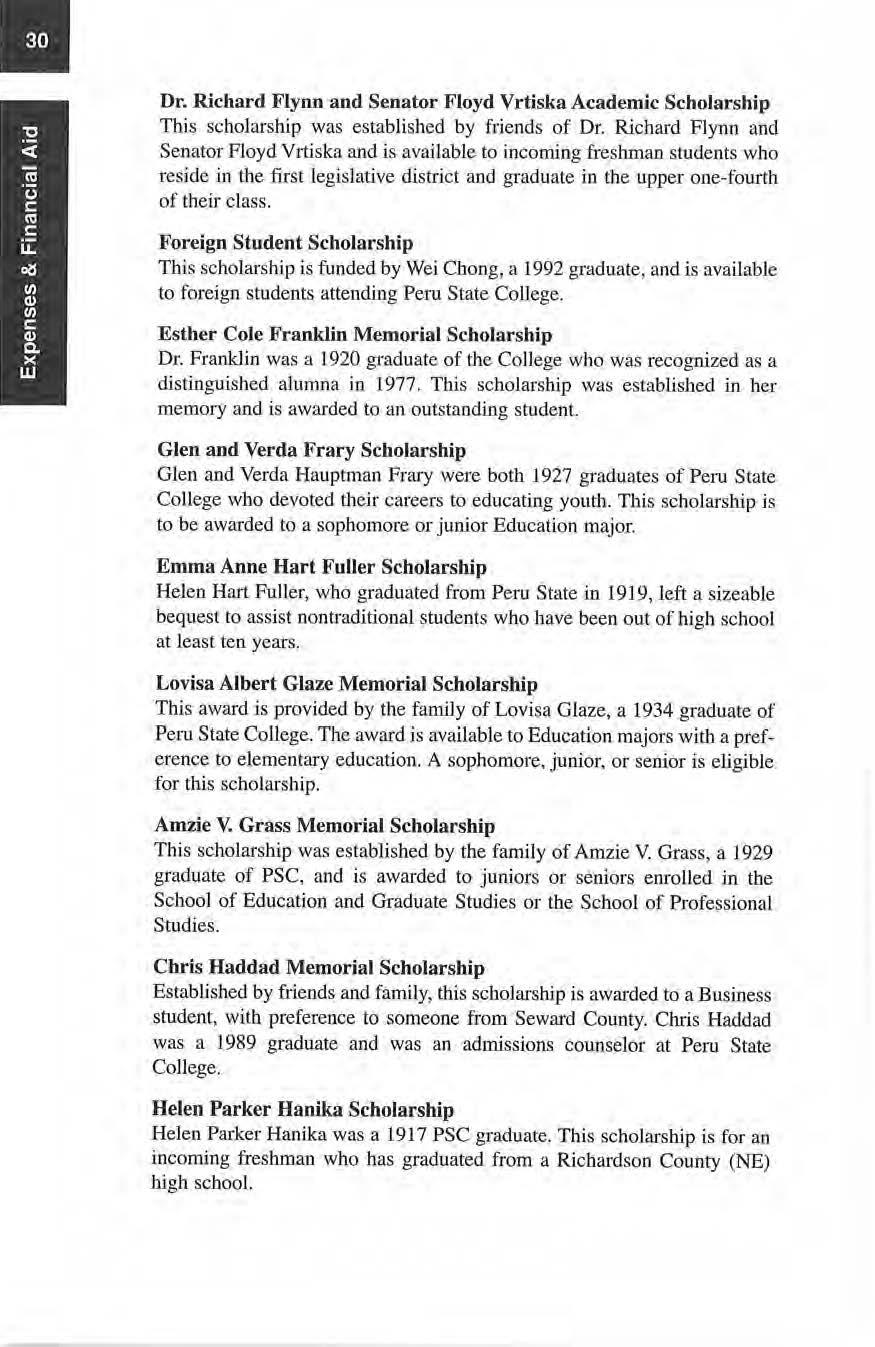
C lifford Harding Social Science Scholarship
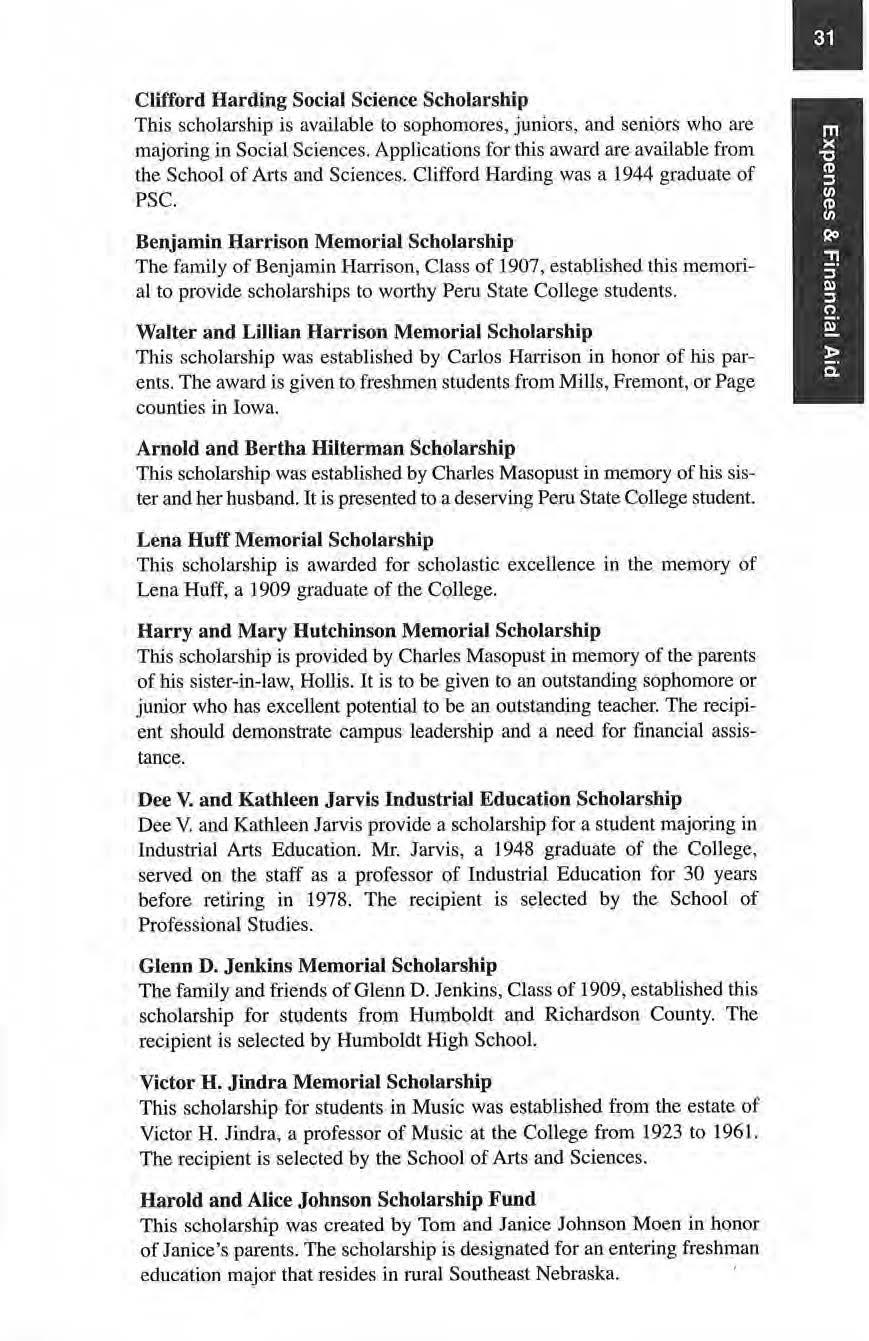
This scholars hip is available to sophomo res, ju n iors, and seniors who are majoring io Social Sciences. Application1; for this award are available from the Schoo l of Arts and Sciences. Cl i fford H arding was a 1944 grad uate of PSC
Benjamin Harrison Memorial Schol arship
T he fami ly of B enjamin H arrison, C lass of 1907 , established this mem orial to provide schol ars hips to worthy Peru State Coll ege students.
Walter and Lmian Harrison Memorial Scholarship
This sc holars hip was es tabli shed by Carlos H anison in honor of his parents. The award is given fresh.men s tud e n ts from Mill s, Fremont, or P age cou nties in lowa.
Arnold and Bertha Hiltennan Scholarship
Thi s schol arship was established by Charles Mas opus t i n memory of his sister a nd her husband. It is presented to a deserving Peru State College student
Lena Huff Memorial Scholarship
Thi s sch o larship is awarded for sc holastic excellence in the memory of L e na Hu ff, a 1909 gradu a te o f the College.
Harry and Mary Hutchinson Memorial Scholarship
This scholarship is provided by Charles M asopu s t in memory of tbe pareuts of his s ister-in- law, Hollis. It is to be g ive n to an outstanding sophomore or junior who has excellent potential to be an outsta n ding teacher. The recipie nt should demonstrate campus leaders hip and a need for fina ncial assistance.
Dee V. and Kathleen Jar vis Industrial Education Scho larship
Dee V. and Kathleen Jarvi s provide a scholars hip for a stud e nt majoring in i ndustrial Arts Education Mr. J arvis-, a 1948 gradu a te o f the College, served on the s taff as a professor o f Industrial Education for 30 years before retiring in 1978 The recipient i s selected by the Sc hool of Profess io nal Studies.
Glenn D . Jenkins Memorial Scholarsh ip
The family and friends of Gle nn D Je nkins, Class of 1909, estab lished this sch ol arship for st1.1dents from Humboldt and Rich ardson County. The recipient is selected by Humboldt High Schoo l.
Victor H. Jindra Memorial Scholarship
This scholars hip for students in Music was estab lished from the estate of Victor H. J indra, a professor of Music at the College from 1923 to 1961. The rec i pient i s se lected by the School of Arts and Sciences.
H arold and Alice Johnson Scho lars hip Fund
T his schol arship was c reated by Tom a nd Janice John so n Moe n in h onor of Janice's parent s . The scholarshi p i s des ignate d for an enteri ng freshman e ducation m ajor that resides in rural Southeast Nebraska.
Pearl A. Kenton Language Arts Award
This award is presented annually to an outstanding student majoring in Language Arts. The recipient is se lected by the School of Arts and Sciences.
Coretta Scott King Scholarship
These scholarships are provided annually by an anonymous donor. They are awarded to African-American fema le freshmen students who are not athletes.
Georgia Klasek Education Scholarship
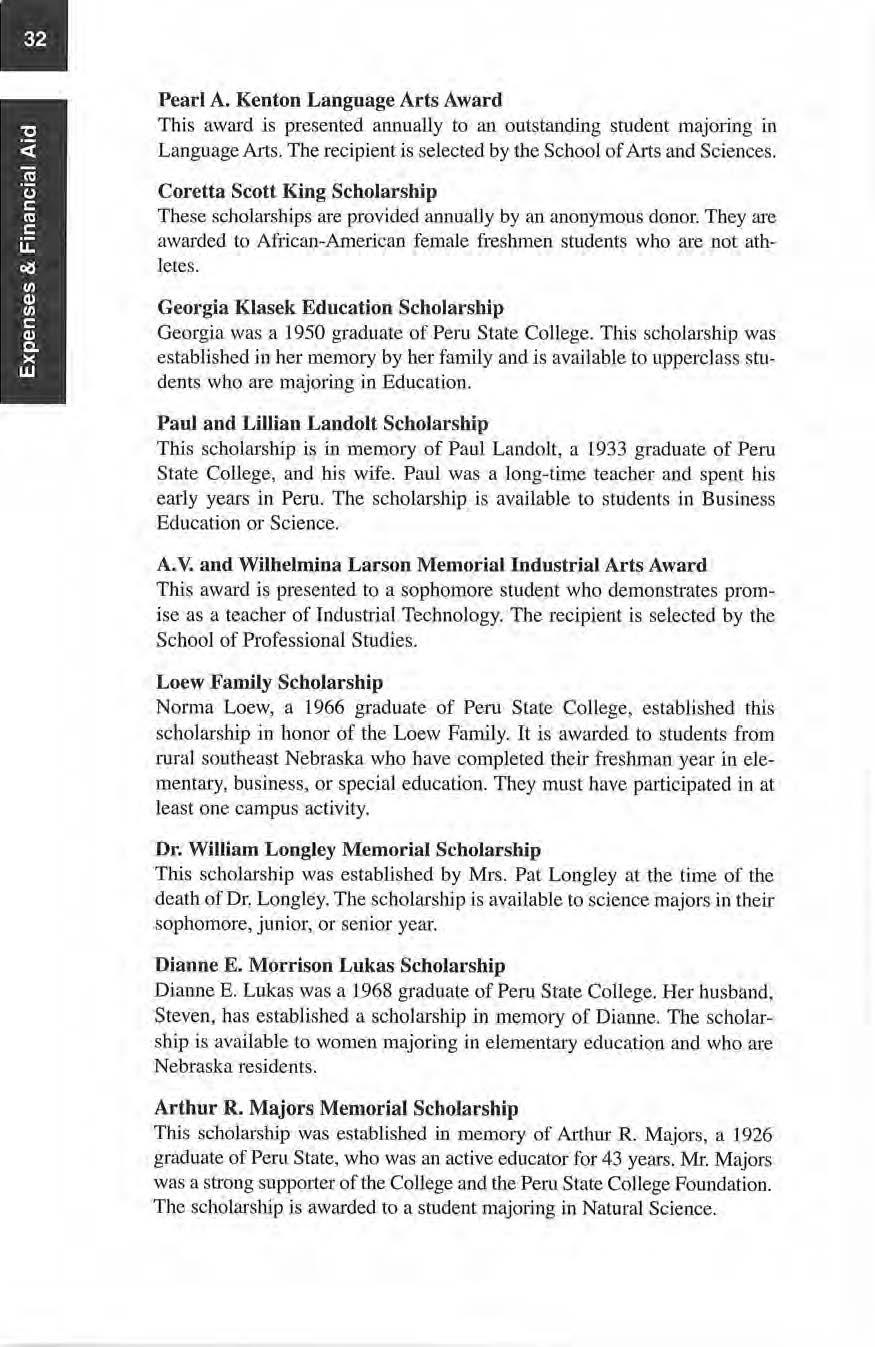
Georgia was a J950 graduate of Peru State College. This scholarship was established in her memory by her family and is avai l able to upperclass sn1dents who are majoring in Education.
Paul and Lillian Landolt Scholarship
This scholarship is in memory of Paul Lando lt, a 1933 graduate of Peru State College, and hi s wife. Paul was a long-time teacher and spent his early years in Peru. The scholarship is available to s tudents i n Business Education or Science.
A.V. and Wilhelm in a Larson Memo rial Industrial Arts Award
Th.is award i s presented to a sophomore s tudent who demonstrates promise as a teacher of Indu strial Tech nology. The recipient is selected by the School of Professional Studies.
Loew Family Schola rship
Norma Loew, a 1966 graduate of Peru Slate College, established th is scholarship in honor of the Loew Fami l y. It is awarded to students from rural so utheast Nebraska who have completed their freshman year in elementary, business, or special education. They must have participated in at least one campus activity.
Dr. William Longley Memorial Scholarship
This scholarship was established by Mrs. Pat L o ngley at the time of the death oJ Dr. Longley. The scholarship is available to science majors in their sophomore, junior, or senior year.
Dianne E. Morrison Lukas Scholarship
Dianne B. Lukas was a 1968 graduate of Peru State College. Her husband , Steven, has established a scholarship in memory of Dianne. The scholarship is available to women majoring in elementary education and who are Nebraska residents.
Arthur R . Maj ors Memorial Scholarship
This scholarship was established in memory of Arthur R. Majors , a J926 graduate of Peru State, who was an active educator for 43 years. Mr. Majors was a stro ng supporter of the College and the Peru State College Foundation. The scho larsl1ip is awarded to a student major.ing in Natural Scie nce.
Charles Masopust Scholarship
This scho larship was donated by Charles Masopust. Although he never attended Peru State College, Mr. Masopust developed an interest in th e College through his brother Joe, a supporter of lhc College and Peru resident. This award is given to a deserving student who may not qualify for other scholarship funds based on outstanding academic accomplishments, but who demonstrates personal qualities that are a credit to the College and student body and who distinguishes himself/herself through involvement in co-cun-icular activities.
Hollis Hutchinson Masopust Memorial Scholarship
Thi s scho la rship, established in 1986, was donated by Charles Masopust in memory of hi s s ister- in - law, a 1933 graduate of Peru State College. The award is to be given to an outstand in g sophomore or junior student who bas participated above and beyond average in math and science and to whom this award will make a difference in achieving his/her educat ion.
Joe Masopu.st Memorial Scholarship
This scho larship was established in 1986 and is donated by Charles Masopust in memory of hi s brother, a friend a nd benefactor of Pem Slate College. The scholarship is to be given ,to the outstanding sophomore or junior student who has contributed the most to Pem State College iu nonscholastic activ ities ( not s port s), has good scho las tic potentjal, and to whom thi s assistance will make a difference in achieving the s tudent's education.
John and Francis Schima Masopust Scholarship
This scho larship was donated by Charles Masopust in memory of his parents and is awarded to a student who knows the value of hard work.
L.B. and Roth Mathews Memorial Scholarship

Thi s scho lastic award is made in the memory of Mr. and Mrs. L.B. Mathews. Mr. Mathews was a Professor of Physics and Principal of the Peru Prep School from 1927 to 1961 . MJs. Mathews was a faculty member a t the Coll ege from 1943 to 1960.
Dr. Paul A. Maxwell Memorial Scholarship
This scholarship was estab li shed by Dr. John Maxwell, a 1946 alum, in honor of his father who was a professor at PSC. Students majoring in education are eligible for thjs scho lars hip.
Jack McIntire Scholarship
Thi s scholarship is awarded to a male or female s tude nt participating in varsity athletics.
Lyle
McKercher Math Scholarship
This scholarship was established to honor Professor Lyle McKe rcher when he retired from Pem State CotJege in 1990 after 30 years of teaching. It is awaJded to an upperclassman majoring in M ath Th e recipient is selected by the School of Arts and Sciences.
Hanford Miller Memorial Scholarship
This scholarship was established by family and friends of Hanford Miller, a former Sdence professor at PSC. The award is given to a junior or sehior science major and is selec ted by the School of Arts and Sciences.
Irene E. Westerman Miller and Mason F. Miller Scholarship Fund
Thi s award was established by Mason Miller in memory of his wife who received her two year degree in 1940. The award is available to an incoming freshman from Pawnee County w ho has a minimum GPA of 2.5. T he award is renewa ble.
Dr. Joy Elmer Morgan Memorial Scholarship
This scholarship was provided by th e estate of Dr. Morgan. a 1912 graduate of Peru State College and long time Secretary of the National Education Association. The award is to be given to outstanding students preparing to become teachers
Evalyn Booth Newton Scholarship
Evalyn Booth Newton was a student at Peru State College in 1925 and 192(j. She was a music and English teacher and supervised student teachers at PSC from 1956 to 1958. Thi s scholarship is available to English Education majors with sophomore, junior, or senior status w ho have a 3.0 or hi gher GPA The award is se lec ted by the Englis h D epaitment.
Omaha World-Herald Scholarships

Among Pern State College's most prestigious scholarships are the Omaha World-Herald Scholarships, funded by the World-Herald Foundation. These scholarships provide full tuition schol arsh ip s for cun·ent graduates of Nebraska high schools who have demonstrated outstanding academi c achievement. The recipient must be a Nebraska resident, have a minimum ACT composition of 25 or SAT of 1100, and graduate from a Nebraska high school. One letter of recommendation is required. The scholarships are renewable to cover eight academic semesters. Undergraduate recipients of th is academic scholarship are required to take a min i mum of one honors course du ring the first year of attendance. The s tudent must maintaiu a 3.25 GPA to retain the scholarship.
Nona Palmer Business Education Scholarship
This scholarship is awarded to a B usiness Education student in the memory of Nona Palmer, a 1910 graduate, who served as a professor of Business from 1915 to J 960. The recipient is se lected by the Sc hool of Professional Studies.
Lester and Maxine Metcalf' Pankonin Scholarship Fund
Thi s scholarship is given by the Pankon in s in memory of William B. and MyrtleF. Metcalf. The award is available to any United States student with a 3.0 or higher GPA.
Larry G . Pappas Science Scholarship
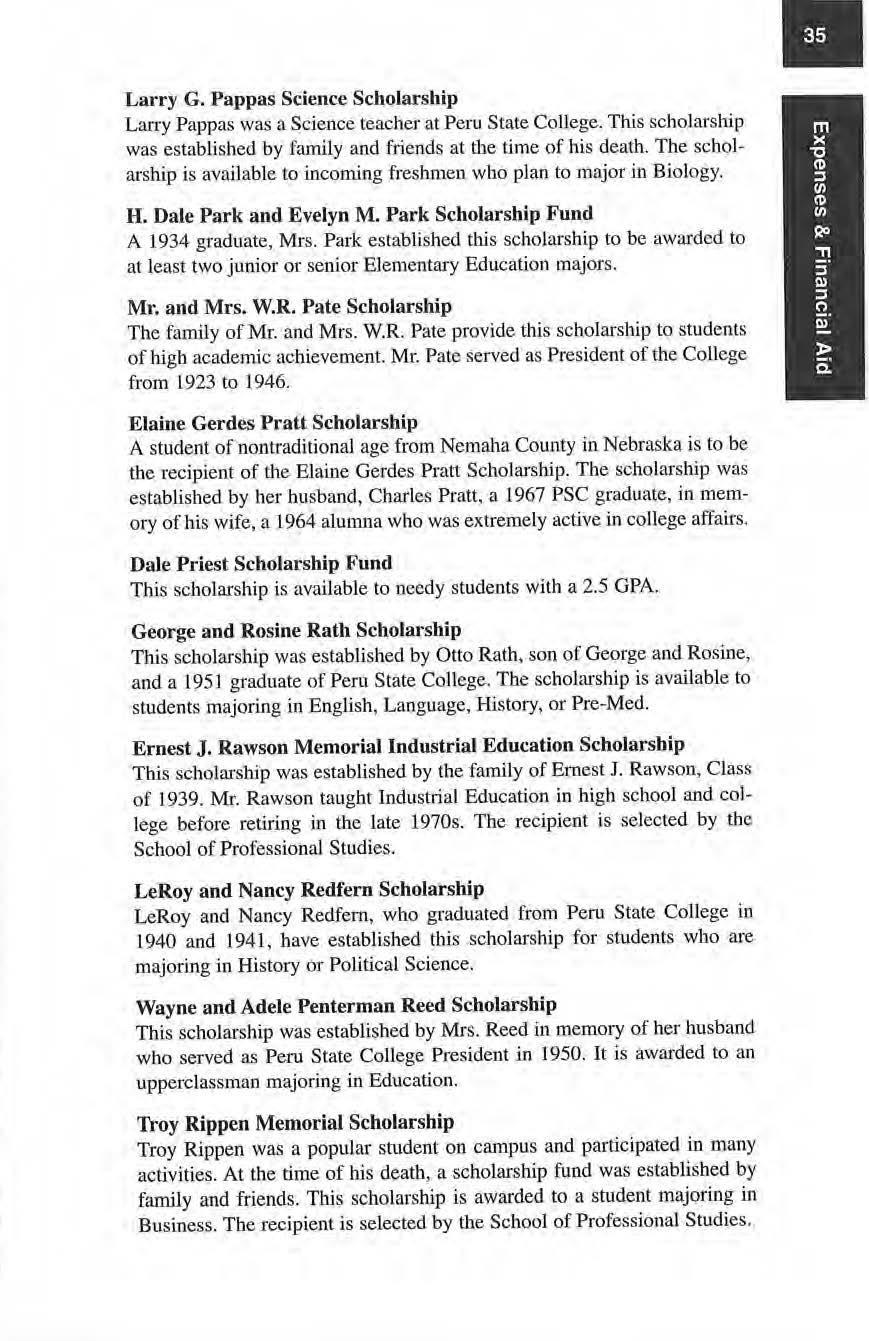
Larry Pappas was a Science teacher at Peru State College. Th.is scholarship was established by family and friends at the time of his death. The scholarship is available to incoming freshmen who plan to major in Biology.
H. Dale Park and Evelyn M. Park Scholarship Fund
A 1934 graduate, Mrs. Park established this scholarship to be awarded to at least two junior or senior Elementary Educatio1i majors.
Mr. and Mrs. W.R. Pate Scholarship
The family of Mr. and Mrs. W.R. Pate provide this scholarship to students of higb academic ncl)ievement. Mr. Pate served as President of the College from l 923 to I 946.
E laine Gerdes PraU Scholarship
A student of nontraditional age from Nemaha County in Nebraska is to be the recipient of the Blaine Gerdes Pratt Scholarship. The scholarship was established by her husband, Charles P ratt, a 1967 PSC graduate, in memory of his wife, a 1964 alumna who was extremel y active in college affairs .
Dale Priest Scholarship Fund
This scholarship is available to needy students with a 2.5 GPA.
George and Rosine Rath Scholarship
Thi s scholarship was established by Otto R ath , son of George and Rosine, a nd a L951 graduate of Peru State College. The scholarship is available to students majoring in English, Language, History, or Pre-Med.
Ernest J. Rawson Memorial Industrial Education Scholarship
Tbis scholarship was established by the family of Ernest J. Rawson, Class of 1939. Mr. Rawson taught Industrial Education in high school and college before retiring in the late 1970s The recipient is selected by th e School of Professional Studies.
LeRoy and Nancy Redfern Scholarship
LeRoy and Nancy Redfern, who graduated from Peru State College in 1940 and 1941, have established tbis scholarship for students who are majoring in History or Political Science.
Wayne and Adele Penterman Reed Scholarship
This scholarship was established by Mrs. Reed in memory oJ her husband who served as Peru State College Pres ident in 1950. It is awarded to an upperclassman majoring in Education.
Troy Rippen Memorial Scholarship
Troy Rippen was a popular student on campus and participated in many activities. At the time of his death, a scholarship fund was established by family and friends. Thls scholarship is awarded to a student majorin g in Business. The recipient is selected by the School of Professional Studies
A.B. Ritchie Scholarship
A.B. Ritchie of Auburn, a 1927 graduate, established a sc holarship to be given to a men's basketball pJaycr who is a sou theast Nebra s ka resident. Tl1e recipicnr is selected by rhe Ath letic Department.
Clarence L. and Mildred Russell Memorial Sch olarship
This scholarship was established in memory of the Russells. Mr. Ru sse ll was a 1917 graduate of Peru State College, and the Russell s were long time supporters of the College. The recipient of the scholarship is to be in the Industria l Technology program and is selec t ed by the Schoo l of Profess iona l Studies.
Lester and Esther Russell Scholars hip Fund

Th is scbohirship was established by family and friends at the t im e of Dr. Russell's retirement from Peru State College in 1995 The scholarship is awarded to a student i11 the Lndustrial Technology program and is sel ec ted by the School of Professional Studies.
Ruth M. Russell Scholarship Fund
This fund was created by family and friends of Mrs. RusscU , a long time Peru resjdcnt, in honor of her 100th birthday. Srudcnts e li gible for this sc holarship shall have graduated in 1he upper one-third of th eir bigh schoo l class. The scholarsl1ip shall alternate each year between students study in g in tbe Arts/Humanities and Science
Vince Sabatinelli Memorial Scholarship
This scholarship is awarded to a deserving athlete in th e memory of Vincent Sabatinelli , a former member of the Peru State football team, who gave bis life in the service of his country in Vietnam. The recipient is s elected by the Athletic Department.
George Sehottenhamcl Scholars hip
This scholarship is in memory of George Schollcnhamel, Professor of Socia l Sciences at 1he Co ll ege from J 957 to J987. It is awarded to a s tudent s wdyiog Hi s tory , Socia] Science, or Fine Arts. The recipient is se lected by tbe School of Arts and Sciences.
Bernice S hackelford Sc ho lars hip Fund
Bernice Jacka Shackelford was a 1941 graduate of Peru State College where s he majored in Ed ucation , She taught in various schools in Nebraska witJ1 37 years at Filley as a teacher and librarian. This scho l arship is available to deserving students.
Ken Sims Industrial Arts Scholarship
This memorial scholarsh i p was establ ished by Mr. Sim s' wife Linda. Both graduated from Peru State College in 1964. ll is awarded to a student majoring in Industri a l Technology. The recipient is selected by the School of Professio nal Studies.
Beatrice Spohn Sc holars hip
Beatrice Spohn was a J929 two-year graduate of PSC. The scholarship i s for an incoming freshman from a Weepjng Water or Sutton, Nebraska high school , and is renewable.
G. Holt ''Pop" Steck Memorial Scholarship
G. Holt " Pop" Steck served as Professor of Music at Peru State College from J 928 to 1943. The scholarship is awarded to a music student with preference for vocal music. The recipient i s selected by the School of Arts and Sciences.
Jerry Stemper Scholarship
This scholarship was established by friends of Jerry Stemper, a former professor and coach at PSC. The award is for an Auburn/Peru high school graduate who plaus to major in Education, The Auburn High School selects the recipient of this scholarship.
Oliver Stevenson Memorial Scholarship
Mrs. Oliver Stevenson, a friend of the College, established this scholarship in memory of her husband. The scholarship is awarded to students who have demonstrated academic excellence.
Bill and Jeanne Tynon Memorial Scholarship
This award is presented to a Nebraska resident student in good standing who has participated in intercollegiate sports at Peru State College. The Bill Tynon Memorial Scholarship fund was estab li shed by Mrs. Jeanne Rhinehart Tynon, a 1965 graduate, in memory of her husband, a 1964 graduate of Peru State College, who was active in athletics at the College. Jeanne Tynon passed away in 1986, and the name of the scholarsh ip has been changed in memoty of J eanne, aJso.
Upperclass Scholarsh ip
The upperclass Scholarship was created throl.lgh a fund drive of PSC alums. The scholarship is for juniors and seniors who demonstrate financial need.
Maude Phel ps Vacek Scholarship
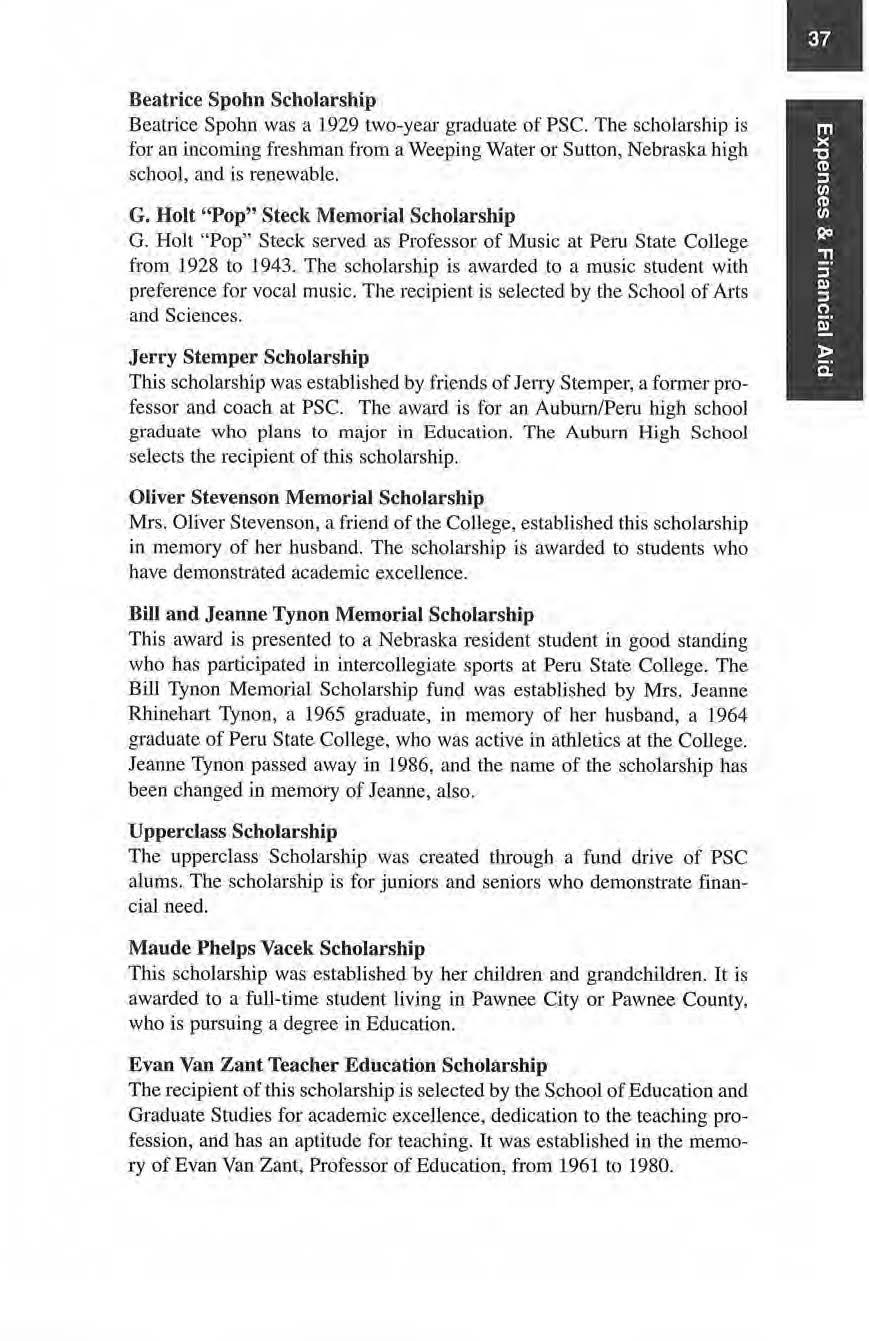
This scholarship was established by her chiJdrnn and grandchildren. It is awarded to a full-time student living in Pawnee City or Pawnee County, who is pursufog a degree in Education.
Evan Van Zant Teacher Education
Scholm·ship
The recipient of this scholarship is selected by the School ofEducation and Graduate Studies for academic exceJlence, dedication to the teaching profession, and has an aplitudc for teaching. It was established in the memory of Evan Van Zant, Professor of Education, from 1961 to 1980.
F
loyd and Doris Wagner Vrtiska Scholarship
This scho larship was establi s hed by the Vrtiskas and is available to juniors or senior s from the counties of Pawnee, Richardson, Nemaha, and Johnson in Nebraska.
Inez Warren Scholarship
There are no restr ictions to this scholarship which was establi shed through the estate of Inez WatTen, a 1934 grad uate of PSC.
John and Daisy Clark Wear Scholarship
Established by the family and friends of Dr. John Wear, Class of 1914, this sc holarship assists a Pre-Medical or Science s tudent at the College. A copy of Dr. Wear's book, My Life and My Work, is in the College Library. T he recipient is selected by the School of Arts and Sciences.
Bereniece McH.irron Weigand Scholarship
The recipient of th.is scholarship is to be a femal e majoring in Education at Peru State College. Established by Bereniece Weigand Woodworth , this scholarship is in memory of her mother, a 1906 Pen.1 State College graduate. Bereniece M . Wei gand was the wife of Charles Weigand, for whom another scholru·s hip has been estab]jshed
C ha rles Weigand Memorial Sch ol arship
This schol arship was established in 1956 by tbe Class of 1906 i n memory of Charles We igand, a member of the class. The scho larship i s awarded to a rising senior
L isa Jo Weis Scholarship
The Lisa Jc;i Wei s Scholarship i s awarded to a freshman volleyball player who is not recruited, who has not been recruited for any other sport, an d w ho would be prim arily a setter. The recipi e nt is se lected by the Athletic Department.
Al Wheel er Scholarship
Funds for th is scholarship have been provided by Fran Wheeler Kendrick , son Dr. Al Wheeler, Jr., and friends of the l ong-time coach and athletic administrator who s erved Peru State from 1938 to 1965. The recipient i s to be a male majoring in Physical Education , who participates in intercolleg iate a thletics, with preference given to a football player. T h e recipient is selected by the Athletic Department.
P aul V. and Margaret Thomas Wilcox Scholarship
Thi s schol arship was established by Mrs. Wilcox. Paul aod Margaret were s tudents at PSC in the early l 920's. Paul w as active in sports while a s tudent on campus and is credited with gi\l.ing Peru State the nickname of Bobcats. There are no restrictions for this scholars hip .
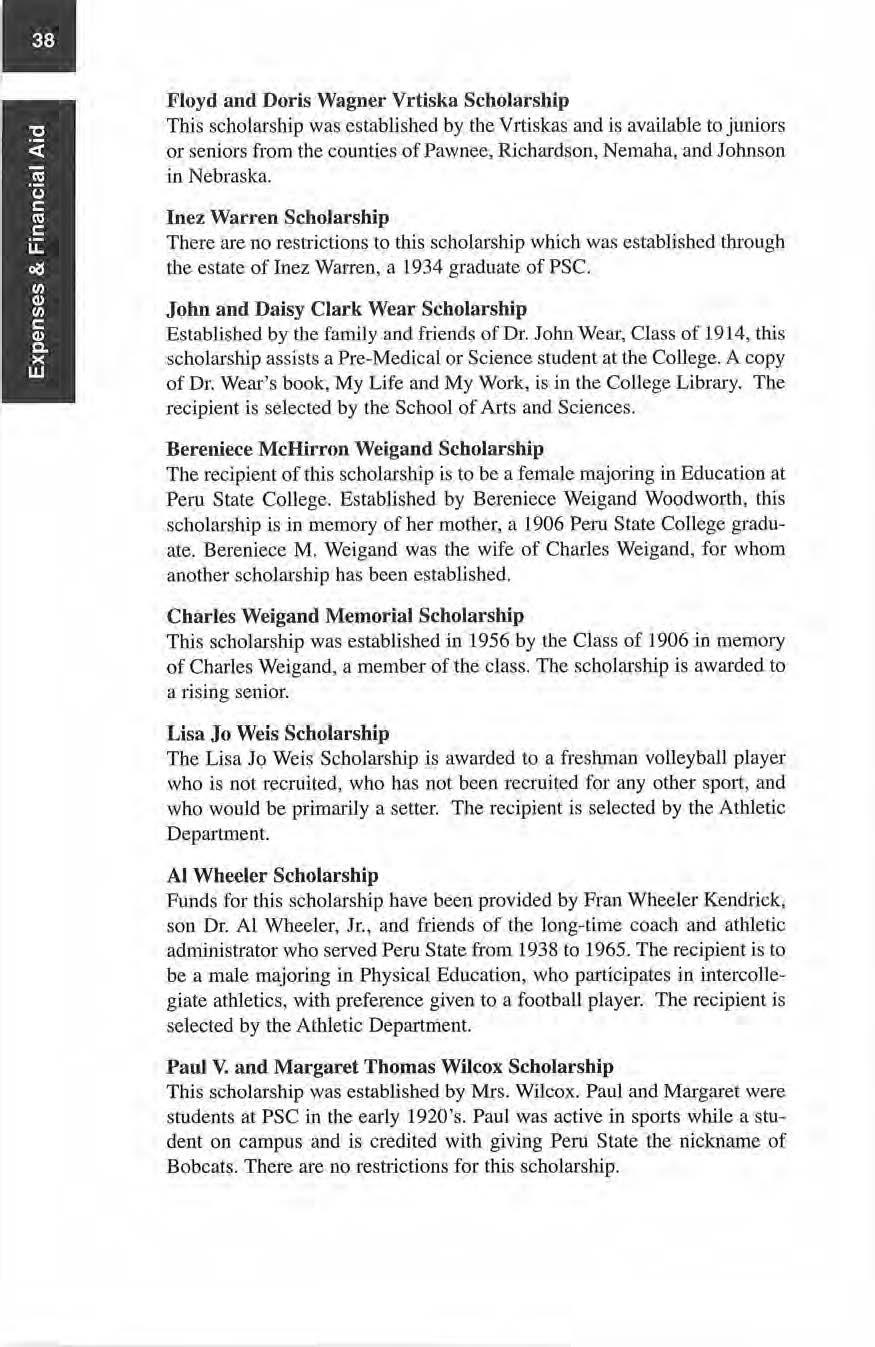
Harold E. WiJley Memorial Scholarship
Mr. Willey, who was a farmer near Mead, is memorialized in this endowment Scholarships are awarded to students who are children of farm or ranch famil ies or their employees. and who are of sophomore rank or above, with a 3.0 average. They must be residents of Nebraska.
Gilbert and Mary Ruth Wilson Leaders hip Scholarship
This scholarship has been established by fami ly and friends of the Wilsous. The scholarship is available to an incoming freshman with a B or higher GPA who has shown leadership qualities in his/her church or community.
Jack D. and Eu.la M. Wolken Scholarship
No restrictions. Amount of scho larsh ip shou ld be sufficient to pay the majority of tuition for one year.
William Henry Wortman Memorial Scholarship
This scholarship is awarded to minority students with a preference being given to Native Americans. It was establis11ed by the famjJy and friends of William Henry Wortman.
Institutional Loans and Awards
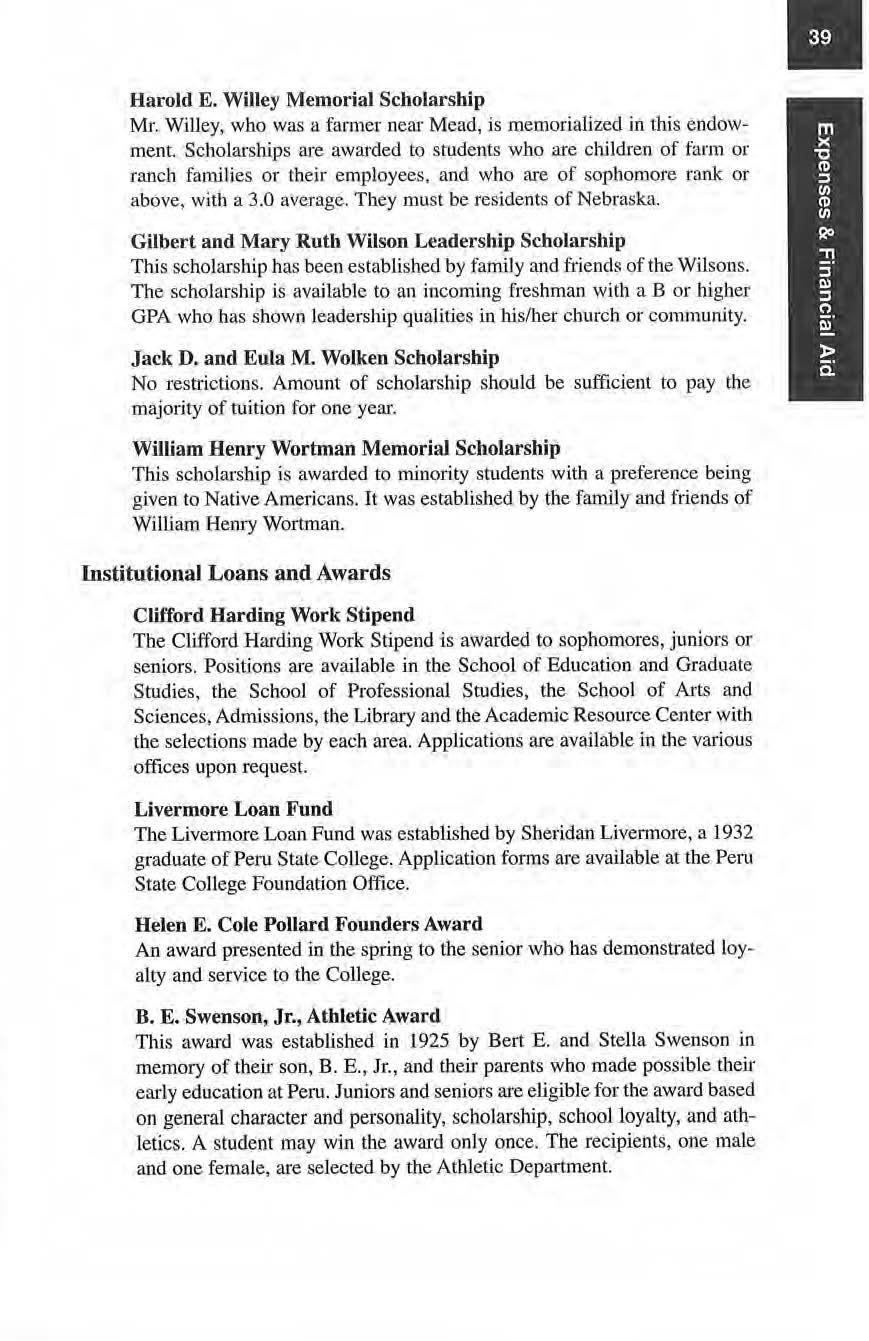
Clifford Harding Work Stipend
The Clifford Harding Work Stipend is awarded to sophomores, juruors or seniors. P ositions are available in tile School of Education and Graduate Studies, tile School of Professional Studies, the School of Art$ and Sciences, Admissions, the Library and the Academic R esou rce Center with the selections made by each area. Applications are available in the various offices upon request.
Livermore Loan Fund
The Livermore Loan Fund was establis hed by Sheridan Livermore, a 1932 graduate of Peru State College. Application forms are available at the Peru State College Foundation Office.
Helen E. Cole Pollard Founders Award
An award presented in the spring to the senior who has demonstrated loyalty and service to the College.
B. E. Swenson, Jr., Athletic ~ward
This award was established in I 925 by Bert E. and Stella Swenson in memory of their son, B E., Jr. , and their parents who made possible their early education at Peru. Juniors and seniors are eligible for the award based on general character and personality, scho larship, school loyalty, and athletics. A student may win the award only once. The recipients, one male and one female, are selected by the Athletic D epartment.
Zelma R. Wonderly Award
This annual award is presented to an outstanding second grade student teacher. The recipient is selected by the School of Education and Graduate Studies.

STUDENT LIFE
STUDENT SERVICES
Student Services Mission Statement
The mission of Student Services is to provide an environment that supports the development of the student as a whole person. Education of the w hol e student encompasses academic training as well as social, spiritual, cultural, physical, and emotional development. Student Services e ncourages studen ts to be active participants i n the formation and attainment of their educational process to clarify values, to solve problems, and to discover, apply, and integrate knowledge.

Academic Resource Center
The goal of the Academic Resource Center (ARC) is to help students learn and reach their potential in a cat'ing and support ive environm ent The Academic Resource Center provides a centralized and focused set of student services and programs that assist student efforts to learn, to pursue enriched academic training, and to find employment in th eir chosen ca reer
The ARC, in partnership wit h the newly renovated library, is the learning center of the campus. Linked together, the two buildings house a wide variety of academic, empl oyment, and transition assjstance in cluding extensive tutorial servie,.. es , learning skilJ s instructjoo , honors program, career counseling, academic advisi ng se rvices, assessment , testing, and more. The Academic Resource Center telephone m.1mbe r is: (402) 872-2305.
Admissions
The Office of Admjssions assists all prospective students with their admission and transition to Pern State College. Students interested in attending PSC s hould contact the office for information regarding the application process.
The activities of the Office of Admissions include the following: Hi gh sc hoo l a nd communi ty college outreach programs.
• Processing of applications for admission and all supporting docwnentation.
• Sponsorship of campus programs such as Open Ho uses , New Student Orientation, Campus Tours and Counselor Day.
• Student Ambassador program - studen t tour gu ides.
• R esponse to aJ \ prospective students ' r equests for information.
• Shared administration of the Coll ege's scho larship program.
• fatemational stude nt advisement and documentation services.
• Residency classification for new students - determination and docwneutation of in-state residency.
Ath letics
Peru State College is a member of the National Association o f Intercollegiate Athletics (NAIA). Th e College has nine athletic programs and a c heerleading squad. Teams are fielded in football, women 's cross country, wo111eu 's go lf, men's and women' s volleyball , men's and women 's basketball, baseba ll , and softball. The athletic teams compete against a ll divi sions of schools in the NAIA and NCAA. Pern State's football team is· a member of the Central States F ootball League; the me n' s volleyball team is a m ember of the MiclA.merica Men's Volleyball Intercollegiate Conference; and the other a thletic teams are members of the Midland s Collegiate A thletic Conference.
The Bobcat teams have all experienced success in recent years with national recognition in the top twenty rankin gs or berths to the national tournaments. The success exhibited by fue teams has not been confined to t he playing arena, as numerous student-athletes have earned national and conference academic honors.
Counseling
Students sometimes feel the need to seek assistance in dealing wi th iss ues whether they are per sonal , voca ti onal, educational , or socia.l. A li st of area counseling services is maint ained in the Offices of the D irector of the Academic R esource Center, Student Supp 01t Services, Hea lt h Center, a nd Hou s ing Staff members will hel p determine potential need and work with students to arran ge the appropriate counseling services or r eftlffa ls.
Student Support Services
The Peru State CoUege Student Support Services Program is a combination of academic and social s upp01t services that enh ance s n1dent learn ing, ongo ing retention to the Coll ege, and graduation success fot· qualified students. Qualification s inclt1de stat11s as a Un i ted States Citizen or abili t y to meet federal financial aid requi remen ts, exh ibit a need for academic ass is tance, and are e ith er : first generation ( ne ith er parent has a co llege degree), low-income back,ground. and/or a perso n wi th a d iagnosed disability.

Students must apply and be accepted into the Student Support Serv ices Program. For more information, please inquire at the offices located in the Academic Resource Center.
Services include mtoring, peer adv isin g, academic monitoring and s upport, study groups, study ski ll s assistance, and cul tural enrichment activities . The Stu dent S upport Services Program is an effective outreach program to retai n stude nts i.o co llege. The best part of the Student Support Serv i ces Program is the camaraderie felt by being a part of a great group of s tudents and caring professiona ls.
Food Service
The Student Center a lso serves as the main clinjng facility. T he main dioing area is open seve n days a week for meal servic e to s tudents , faculty, staff, and guests
All meals are designed with variety, nutrition, and good taste in mind.
A Bonus Points plan is available through the Office of Campus Hou sing and Security and the Business Office. The plan allows s tudents, facu lty, and s taff to use their ID card as a "debit card."
The " Bob Inn" is a lso located io the Student Center and offers grill items. deli sa ndwiches, pizza, coffee, and cold drinks.
R efer to the brochure provided by the dining serv ico contractor for specific meal and service information.
Financial Aid
The College provides a variety of ways for students with limited resources to meet educational costs. An extensive program of Federa l and State grants, scholarships, loans, and jobs are availab le to students with financial need A Free Application for Federal Aid must be completed and filed. The United States Dep aitment of Education will determine the student's need and eligibility. (See Expenses and Financial Aid section in this catalog fo r further information.)
IntramuraJs and Recreation
The intramural program allows participants to join teams or compete individually in meets, leagues, and tournaments .according to spec ific sc hedules. This com~ petition involves preanaoged faciUties, equipment. supervision, officials, and usually re cognition through awards and publicity.
Intramural activities are offered each semester. Otber recreational opportunities for students include use of the weight room, pool, and the Al Wheeler Activity Center. Activities are added to the program as the needs and interests indicate, depending largely on the participation of the students.
Orientation
The ColJege conducts severa l orientation sessions designed to address the spec ial concerns of incoming students. Each session acquaints students (and their parents) with the College and with campus life. The goal of the orientation program is to have the student leave camp us that day being knowledgeable a bout college life, academically advised, and registered. New Sludent Weekend is the first weekend prior to class each Fall semes ter. The weekend is strUctured to acquai nt students with their new campus and to a variety of ski ll s that will help them be successful both academically and socia lly. Attendance partially fulfills the requirements for College 101. (College 10 l is a grad uation requirement.)
Residence Halls and Living Accommodations
AU requests for information about livin g accommodations shou ld be directed to the Di.rector of Campus Housing and Security. The schedule of room and board rates for the current year i s Iisted in the current semester Schedule of Classes and
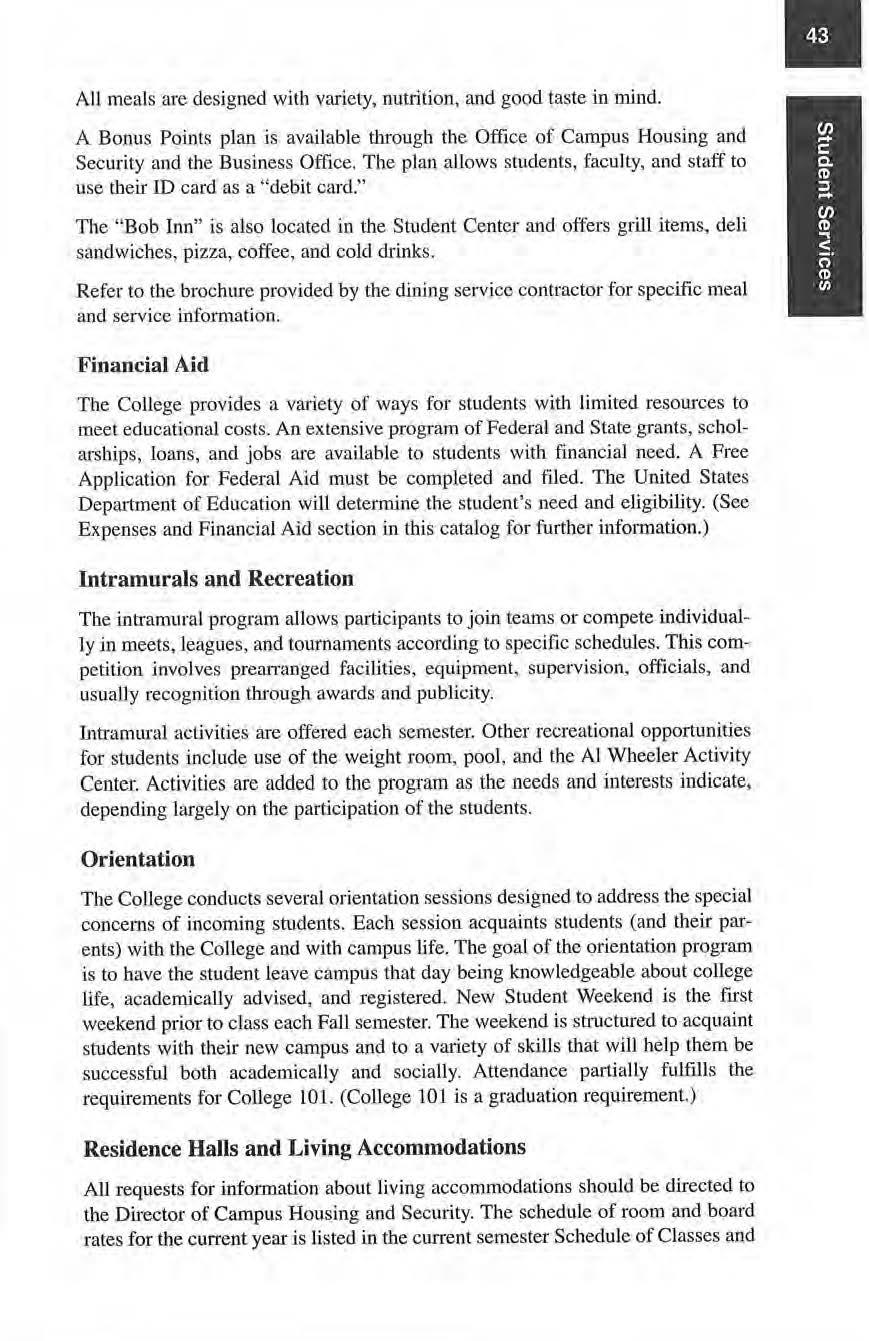
on the College web site at www.peru .edu. Actual room and board rates are available through the Campus Housing Office and/or the Business Office. Room and board rates arc s ubjec t to change.
Living in a residence hall exposes students to a wonderful new environment; it is a Living-learning envirorunent that strives to ass ist students with their academic and personal development.
There are many advantages to Living in the residence halls, with tbe most obv,ious being the proximity to the College's educational and recreational facilities. The Library, Academi c Resource Center, laboratories, music prac tice rooms , workrooms, and campus recreational centers are only a short walk from any residence hall.
While residence hall Jivin g affords students cons iderable freedom, paraprofessional staff members assist students with educational and social programs, aug~ 111enting the academic program. These program s provide assistance to help wi th the adjustment to college life.
Peru State College offers a variety of alternative l.iving accommodations. There are separate residence balls for men and women as well as co-educational halls. Each residence hall has its own policies and unique physical layout. Students are re sponsible for supplying their ow n linen and bedding in clu d ing pillows and mattress pads. Residents are welcome to bring other personal items from home such as comput ers, radios, stereos, etc. H ot plates, microwave oven s, and air cond itioners are not permitted. Each hall is equipped with microwave ovens, washers and dryers , and recreational equipment such as pool and p.ing-pong tables.
The room and board contracts are fo r lhe full academic year. Students should understand that the contract is a financially binding agreement that o bJ igates them for rental rates for the academic year. Con tract<; will be voided only for the following documentable reasons: unfmeseen financial hardship, medical, w ithdrawal from college, grad uation, transfer, or marriage (appropriate verification is required). A cancellatio n fee will be imposed on students eligible to live off campus if written notice of con tract cancellation is received postmarked after Augusc 15 for Fall semester stru.i or January 3 for Spring semester. Students must appeal in writing to the Director of Campus H ous in g and Security ro break all cootracts midyear to be eligible to live off campus

At Peru State Co l lege, all unmarried students must Live in college residence halls for at least two years ; however, this requirement s hall not apply to those undergraduates who meet one or more of tl1e following :
1. Lived on campus for two years prior to the last offic ial day to register for the Fall semes ter.
2 Twenty-one (2 1) years of age or o lder on or before the last official day to register for the Fall semester.
3. Residing at home with their parent(s) or legal guardian(s), that i s 50 miles or l ess from the main campus of P eru State College,
4. Veterans who qualify for veterans benefits by virtue of active service in the armed forces.
5. Eornlled in eight credits or less per semester.
This requirement is a co ndition of enro llm ent , which must be met throughout tl1e academ ic school year.
Appea ls of the housing requirement must be rece ived in writing postmarked no later than May 31 fm returning students for the upcoming academic year. Students should consider their appeaJ to be denied until written a pproval has been received from the Director of Campus H ousing and Security.

A U unma.JTied students living in a residence hall, except for Oak Hill, must participate in a meal program whi le enrolled i n classes at Peru State Col lege.
Centennial Complex
A co-educationa l reside nce hall complex was opened in l9 67 to commemorate Peru State's first one hundred years of service. The Cen tennial Complex consists of three groups of two residence halls each, which house sophomores, juniors, sen io rs, and grad uate students. Second semester freshmen may request perm iss ion to Jive at the Complex if they have a 3.0 GPA o r higher. Davidsou/Palmer Hall, Clayburn/Mathews Hall and N i cho las Pate Hall are co~educationaJ. Nicholas H all houses non-traditional stude nts . Pate Hall houses upperclassmen. Mathews Hall houses PSC's Freshman Exp er ience Program students. For more information concerning the Mathews Me ntor Program, contact the Office of Camp us H ousing and Security.
The living areas in the Complex are set up suite-style. Each su ite is comprised of two or three bedrooms , a liv ing room, and bath. The su ites arc carp eted , furnis hed , and a ir con ditioned; each bedroom h as two built-in desks, study ligh ts, bookcases, a dresser, twin-bankable beds and a double closet with ample s torage. The student rooms are eq uipped for lnternet and loca l telephone access . Cable TV, including HBO , is also provided in each bedroom.
Delze ll Hall
Gothic-styled D elzell H a ll houses approxin1ately 150 .men The spacious Great Room is furnished with sofas, chairs, study tables , and a fireplace. A TV game room is locate d on the l ower level. There are four floors of rooms ananged as combin atio n sleeping a nd study rooms with eacb room housing two students. A built-in, co mbin ation dresser and desk, bookcase , bulletin board , twin-bunkable beds, and draperies are furnished to each studeut.
In addition to a shared walk-in close t, lavatory, and medicine cabinet, eacl1 s tudent is provided with an indiv idual buiJt-in ward robe. There is a large shower room of ceramic tile and marble located on each floor. Computer access to the Internet and loca l telephon e serv ice is provided in eac h ro om.
Cable TV, i nc ludin g HBO , is also prov ided in each room.
Eliza Morgan Hall
Located in the northwest corner of the campus, E Jjza Morgan Hall was opened in 1929 and was partially re110vated in 2002-2003. The building houses approximately 100 women in rooms situated on four floors, There are two large furuisbed lounges located on the fast floor and the basement for student use. Rooms are double occupancy and furnished with two tw inbunkable bed s, two desks, a dresser, a nd window coverings. All new -rooms have temperatw·e control with air co ndjtioning, and the remode led rooms have partial temperatw·e control. In addition, each resident shares with her roommate a closet and sink area. Each floor has centrally located bathrooms and shower areas .
Morgan Hall ha s computer access to the Internet provided in each room as well as local telephon e serv ice. Cable TV, incluclin g HBO, is also provided in each room.
Oak Hill Housing
Oak Hill honsing is available co students who are married or for s tude nts who have families. There are one and two bedroom apruimentlj available at Oak Hill. Each aprutment is fw-nishsed with a s tove and refrigerator. Apartments are l eased on a renewable yearly basis. A deposit is required and is refundabl.e at the end of the lease agreement provided the property is left in good condition. Rent is due the first of the month and is payab le i n the Peru State College Business Office. The College does not condone cohabitation.
Inqtdries about married/fami ly housing may be made at the Offi ce of Campus Housing and Security.
Studen t Handbook
The Student Handbook is a guide for college s ucce ss, college services, campus living, and student conduct. The Student Handbook is no longer printed and is available on the College 's website via the "click here for addi tional links" dropdown box. Students are expected to acquaint themselves and comply with the rule s and policies in this Catalog and the Student Handbook

Stu dent Plann er
The Student Pl anner is provided for al1 s tudents and lists college events and important dates throughout the year. It is provided as part of the student publication fee.
Student Heal th Services
Tbe College maintains its Health Center in A D. Majors Hall. Students may visi t the college nurse or doctor at the Health Center during regularly schedu led office hours or make appointments through the nurse wit h other heal th care providers
Some nonprescription drugs , first aid, and primary care are administered at the
Health Center. Tbe College's responsibility for medical expenses is limited to these services.
It is recommended that students have health insurance. The College does not insure students for health care. Students who wish to participate in intercollegiate athletics must be certified each season as physically fit by a physician and provide insurance infonnation before beginning their sport.
Public Health Services

The College provides space at the H ealU1 Center for two medical clinics for the benefit of the community and the College.
The Family Pl anning Clinic provides pap smears, testing for sexually transmitted infections (including HIV) and pregnancy, and counseling on family planuing. Th.is clinic is held monthly.
The Nemaha County Health D epartment hold s a Well Child Clinic several t.imes eac h month, which is available to any chi ld regardless of residence or income.
Student Prngrams and Student Life
P eru State CoUege provides opportunities fo r studen ts to grow outside the classroom settin g.
Students have the opportunity to become an integral part of campus activities through Student Senate, the student governing body of the campus. Student Senators provjde a link between the CoUege faculty, adm ini stration, and the student body by serving on many College committees. The student re pre sentative to the Nebraska State College Board of Trus tees also reports regularly to the Student Senate. The Sn1dent Senate is an elected body representative of the student commun ity.
Students may also elect to be involved in the Campus Activities Board (CAB), a volunteer studen t organization that provides campus educationa l, social, c ultural, and recreational programs. CAB offers individuals opportunities to select, develop, and present qual ity programming. Throughout the year CAB sponso rs a wide variety of activities including professional artists, dances, picnics, non-traditional student programming, low-budget activities, ethnic cultural events, Women's Hi s tory M on th, Homecoming, and Spring Fling activities.
Students also have the opp01tunity to become involved in other organizations on campus. Participation in these organizations and programs provides students an opportunity to develop leadership and social skills.
Student Organizations
Students at P eru State College may participate in a wide variety of student organizations for their personal, social , academic, or professional benefit
Professional and Social Organizations
For further i11forn1 atio11 co nce rning any organization, cont act the Director of the Academic Resou r ce Cente r.
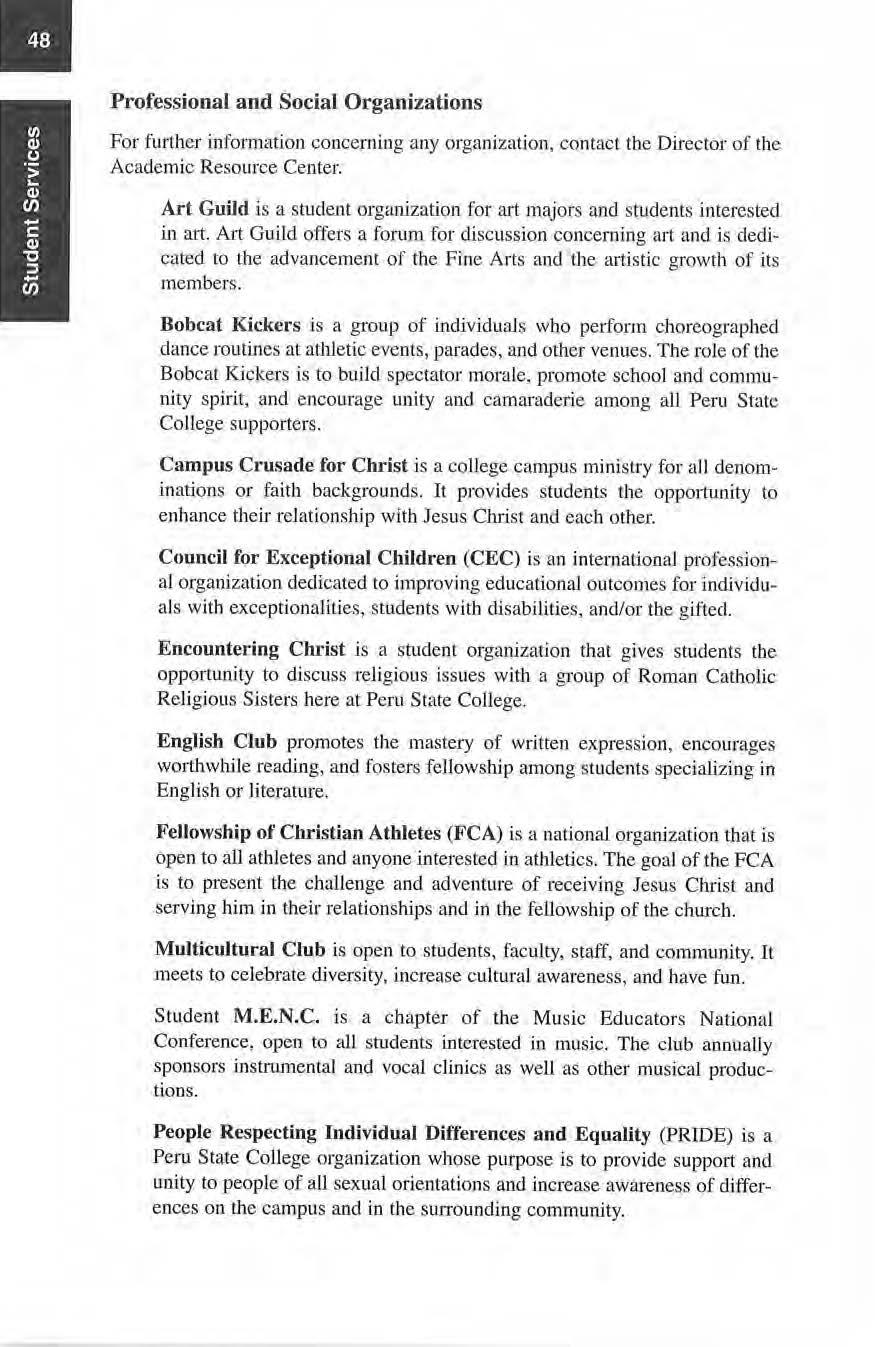
Art Guild is a stude1t1 organization for art inajo(s and students int eres ted i n rut. Art Guild offers a forum for discussion concern in g a rt and is dedicclted to the advancement of the F in e A rts and the art,istic growth of its members.
Bobcat Kickers is a group of individual s who perform c h o r eograp hed dance routines at athletic even t s, parad es, and other venues. The role of the Bobcat Ki cker s is to build spec ta to r morale. promote school and communjry s pirit, and enco u rage unity and ca m araderie among all P e ru S tate College s upporte rs.
Campus Crusade for Christ i s a co llege campus ministry for al l denominations or fajth backgro und s . It provides s tuden t s th e o pp01tunity to enhance their rel a ti ons hip w ttb Je s us Chri s t and each other.
Council for Exceptional Children (CEC) is a n inte rna tional profess ional organiz ation dedicated to improving educational outcomes for i ndividua ls w ith exceptiona lities, Stude nt s with disabilities, and/or the gifted .
Encountering Clu·ist is a student organization rhat g ives students the opportunity to di scuss reli g ious issues with a group of Roman Catholic R e lig iou s Sisters h ere at Pe ru State College
English Club promotes the mastery of written expression, e ncourages worthwhile reading, and fostens fe llows hip among s tudent s s pec iali z in g in Englis h 01' lite rature .
Fellowship of Christian Athletes ( FCA) is a nati onal organization that i s open to all athletes and anyone in teres te d in athletics. The goa l of the FCA is to prese nt the challenge and adventure of receiving Jesus Christ and servi ng him in their relation s hips and in the fellowship of the churc h.
Multicultural C lub is open to s tudents , faculty, s taff, and commm1ity. It meets to celebrate dive r s ity, increase c ultural a waren ess, a nd have fun.
Studen t M.E.N . C. i s a chapt er o f the Mu s ic Educ ato r s National Conference, open t o all s tude nts inte rested io mu s ic. The club aom1ally sponsors iJ1 s tnui1 e nta l and vocal c linics as well as other musica l productions
People Respecting Individual Differences and Equality ( PRIDE) is a P e ru State College organization wl1ose purpo se is to provide s upport and unity to peop le of a U sexual orientations and increase awareness of differences on th e campu s and in th e s urroundin g community.
Peru's Individual Leaders of Today (PILOT) is an i ndependent student organization dedicated to the idea that our s imil arities o utweigb our differences.
Peru S tude nt Education Association (PSEA) is for potential teachers and is affiJiated with the Nebraska Stale Education Association and the Nationa1 Education Association. Its activities are devoted to the improvement of education.
Phi Beta Lambda (PB L) is a sta te and national bus iness association. Peru State's c hapter, Epsilon Tau , is open to all students interested in b11siness.
Photography C lub is open to tho se wanting to share their inte rest in photography. It is an opportunity to learn more about th.is lifetime ski ll. Beginner to advanced photographers are welcome.
Psychology/Sociology/Criminal Justice C lub (PSCJ) is a professional student organization for all Psychology, Socio logy and Criminal Just ic e majors. T be focus Is campus activities, public service and service learning activities, and professional development activ ities in all aroas of the major.
Cam pus Ministries/United Ministry of Higher Ed ucation is a multide nominational fellowship whose pmpose is to share in Cbtis ti an directed soc i al and bib l ical activities. Our calendar is filled w ith activit ies both on and off campus where we share Christ's love, mature in faith, and enjoy our years of college s tudy. Campus M inistries is sponsored by the United Ministries in Higher Education comprised of the following denominations: D isciples of Christ, United Methodist Church, Presbyterian Churc h, and Christian Church.
Honorary Societies

Alpha Chi is the ColJege's national honorary scholars hip society. It recognizes academic scholarship, good reputation , and character. The society's menibers are selected from the top ten percent of the junior and senj or c l asses.
Kappa De l ta Pi is a national honorary education fraternity open to sop homores who rank in the upper qumtile of their class and who s how ev idence of a continued interest in education.
Phi A lpha Theta is a national honorary his tmy society open to students with more th an twel ve hours of history and hi g h sch o lastic standing.
Music Organizations
College Band Program is djvided into the Concert Band, Jazz B and, and Ins trumental E n semble.
Concert Choir is Open to all students with previous choral experience. This group presents two on-campus concerts per semester and makes an annual tour of area high sc hool s. Tbe group performs ml1s ic from dive rse musical periods including some major works. With previous choral experience you can s imply sign up for Mu s ic 102. You do not need to be a music major to participate in any of the choirs or to aud iti on for vocal music scholarshjps
Madrigal S ingers is open to all students by audi ti on in th e fall. This vocal ensemble performs unaccompanied music from the 16th century and presents a fully costumed Christmas dinner in the fall. ln addition , the Madrigal Singers perform at other campus concerts and on the annual cho ir tour of area high schools.
Misty Blues Show Cho ir is open to all students by audition in the fall. Misty Blues presents popular and Broadway musical selections in a choreographed sbow style. Misty Blues performs at the High School Show Choi! Fes tival , at all on-campus choir concerts, and on the annual cho ir tour of area high schools. The group does additiona l concerts on and off campus.
Student Government
The Student Senate focuses on th e interests an d opi nions of students in regard to t he operation of the College. The Senate consists of a 24-member panel (listed below), elected by the studen t body, to serve along with a Board of Trustee R ep resentative (appojnted by the Nebraska Governor) and the Student Bod y Pres ident T he Senate has voting members on a variety of official college bodies
The Student Senate positions include: pres ident. vice president, ten senators-atlarge, two commuter representatives, two nontraditional representatives, two representatives from the freshma n c lass, and one representative from each occupied residence hall. These include Morgan, Delzell, Clayburn/Mathews, Nicholas/ Pate, David son/ Palmer, and Oak 1-fill.
Residential Hall Councils are repres entative cmmcils selected by the members of each residence hall. These govern ing bodies recommend solutions t o student issues, plan educational and soci a l activities for hall residents , and recommend building improvements.
Student Publications
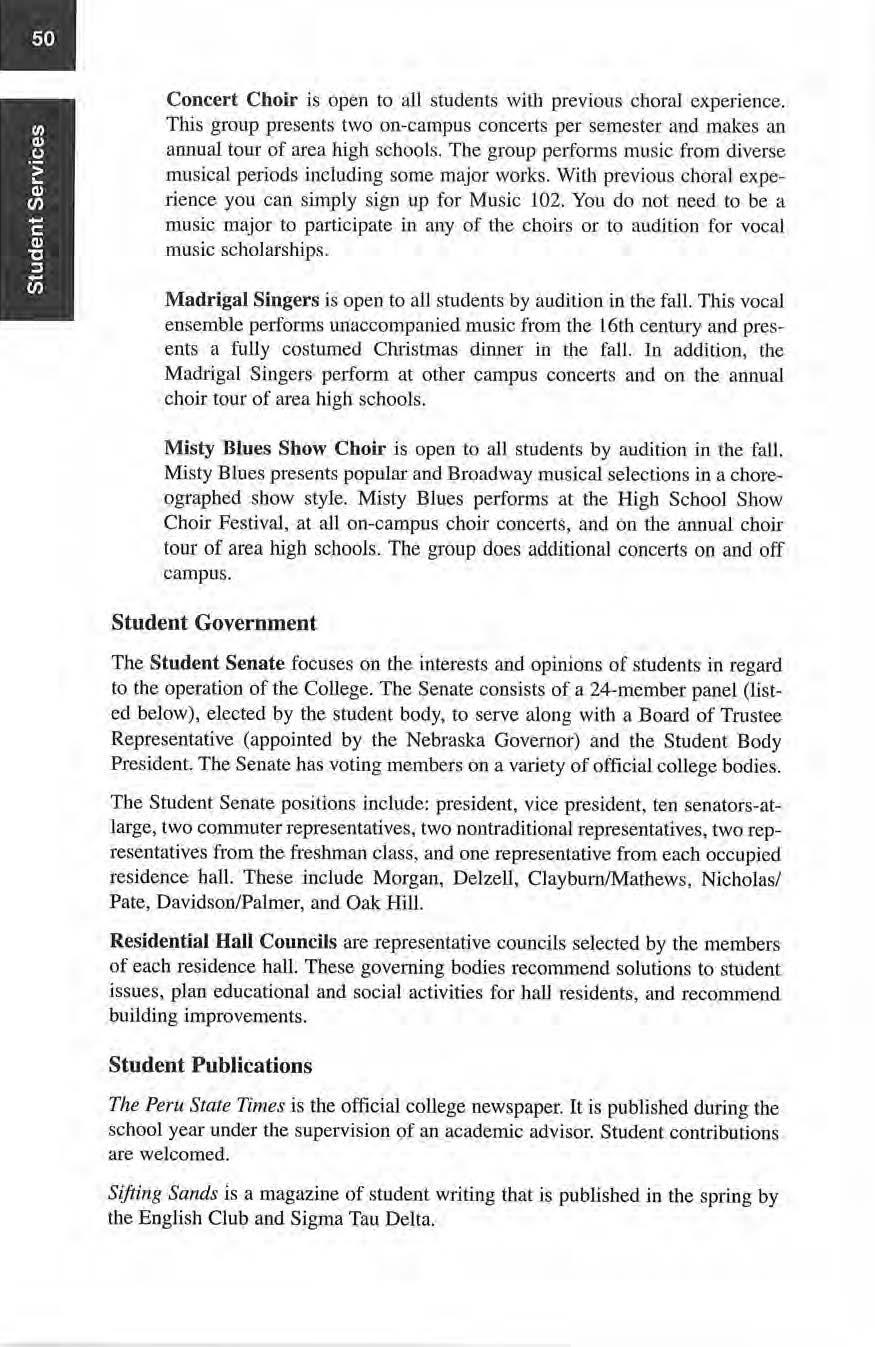
The Peru State Times is the official college newspaper. It is published during the sc hool year under the s upervision of an academic advisor. S t udent contributions are welcomed.
Sifting Sands is a magazine of student writing that is published in the spring by the English Club and Sigma Tau D elta.
STUDENT RIGHTS, FREEDOMS, AND RESPONSIBILITIES

The role of Peru State College is to encourage peop le of all ages to develop tbeir skill s and ta lents , accordi ng to individual abilities and interests, so that collectively they contribute to the continuum o f democracy. College polic ies , procedures, and regulations are formulated to gunraJJtee each student's freedom to leurn and 10 protect the constitutional rights of others.
The c oncept of rights and freedoms , no maner how basic or w idely accepted, carries with it corresponding responsibilities. Students , as well as other members of the Co ll ege community, enjoy tbe same co ns titu tional a nd civil rights guaranteed all citizens; at the same time, they are subject to the laws of the nation , the Sta te of Nebrac;ka, the local community, and the College. AJI me mbers of the Co!J ege community have a s trong res ponsibility to pro tect and maintain an academic c limate in which t he freedom to learn can be enjoyed by all. To thi s end, ce1tain basic regulations and poli c ies have been devel oped to govern the behavior of students and employees as member s of the Colh;:ge community.
Violations of student conduct regulation s wi ll be bandied through the Director of Campus H ousing and Security. A student who violates fede raJ, state and/or locaJ laws may be subject to civi l and /or criminal action in addition to disci p linary action by the College. Each student is res ponsible for knowing and complying with PSC policies, procedures, and deadlines. Policies and regulations may be found i_n the College Catalog, the Student Handbook , and in the Office of Campus Housing and Security.
Academic Rights of Stu dents
The College has the respo nsibility to provide a program of quality ed ucation in keepi ng with its financial resources. Students have protection through campusdesigned procedurns again s t prejudiced or capricious academic evaluation. Student performance shall be evaluated sole ly on an academic basis, not on opinions or conduct in matters unrelated to academic standm·ds. Students are res ponsible for the proper completion of their academic programs, for familiarity with all requirements of the College Catal og, and for maintaining an acceptable grade point average for degree requirements. Students have the right to be informed at the beginning of eac h term of the natu re of the course, course expectat io ns, evaluation standards, and the grading system.
Freedom from Unreasonab le Search/Seizure
Students shall be free from unreasonable search and/or sei zure regarding their person and their personal property. The College reserves the rigbl to search College property regarding personal safety in compliance with College policies.
Freedom of Access
Within the limits of its resources, Peru State College shall be open to all appli -
can ts who are qualified according to cu rrent ad rnission requirements. Peru State College does not discriminate on th e basis of race, creed, color, national origin, mental or physical disabi li ties, age, sex , or sex.ual or ientation in any of its po licies, practices, or procedures. This includes, but is not limited to, ad mi ssions, employment, financial aid, a nd educatio na l services, programs, and activi ties.
Freedom of Association
Stude nt s are free to associate and promote their common interests. They have th e rig ht to seek, through offic ial procedures, the estab li shment of organizations as l o ng as they are not in confl ict with the educatio nal purposes of the Co llege. Students have the 1ight to affiliate with officially recognized campus organizations of their choice, within the membership req uirements of those orga ni zations .
Fl'eedom of Expression
The rights of free speech and peaceable assembly are fundamenta l to the democratic process. The College supports the rights of students of the CoJJege community to exp!'eSs their views and opinion s on act ions o r ideas, to associate freely with others, and to assemble peacefully.
Whether expressing themselves as indjviduals or in organized groups . members of the College community are expected to conduct themselves responsib ly, according to law, and to respect the basic ed ucational goals of the College. Accordingly, the College insists that free expressio n not violate Ute r ig hts of o thers. Disruption of the ed ucati onal processes and functions of the Co ll ege, violation of law, and fighting words wo uld viol ate the Student Code of Cond uct, for example.

The College reserves the right to de 1ermine or reg ulate tim e, place and manner of expression, demonst:rcitions, or meetings.
Code of Cond uct
Students are responsible to obey t he laws of the s tate and nation, the regu lations and polici es of th e Board and of the Coilege; an d to refra in from any co ndu ct iajuri ous to themselves, to others, or to t he reputation or interests o f the College.
A stude nt s hail nor· i gnore a summons from the President or other officer of administrat ion of the College, or from a m ember of th e fac ulty.
Fa ilure by a sn1de nt to pay a fina nc ial obligation owed to th e College o r to any department, division or agency thereof, will res ul t i n denial of readmissjon , denial of transcripts, denial of registration for ensui ng terms, and withholding of dipl omas and, in addition, may res ult in sus pension and/or denial of grade r epo1ts, until suc h debt be paid in full. The President is authorized to promul gate specific polic ies at the College to enforce the provisions of this sec tio n.
A vio latio n of College regu lation s or policy, whether the violation occurs on or off the campus, shall cause the student to be Jjable to s uspensi o n fo llowing a hea rin g designated for that pu rpose. ln general, the off-campus activi ties of stu-
denls are viewed as their personal business. However, when a student violates local, state, or federal laws and at the same time violates the Code of Conduct, either on or off campus, tb e CoUege reserves the option of initiating di sciplinary action on its own. Disciplinary action may be initiated by the College and sanction s imposed against any student or student organjzation alleged to have violated , attempting to violate, or ihtentionally assisting the violation of any of the items OLttljned in the S tudent Code of Conduct. This i nc ludes an individual who is aware of a violation of the Student Code of Conduct, but fail s to report it to a c ampus official. College students will be held responsible for the conduct of their guests/visitors to campus.
Students suspended or dismissed from one of the State Colleges may be admitted to another Nebraska State College only under the same conditions that they would be readmitted to the College from which th ey were suspended.
In the development of College regulations specifying acts of s tudent misconduct for which an offending individual or stude nt organization may b e subject to disciplinary sa nctions under College discipHnary procedures, tbe following acts, among others, s haJJ be considered to constitute misconduct in the State College System.
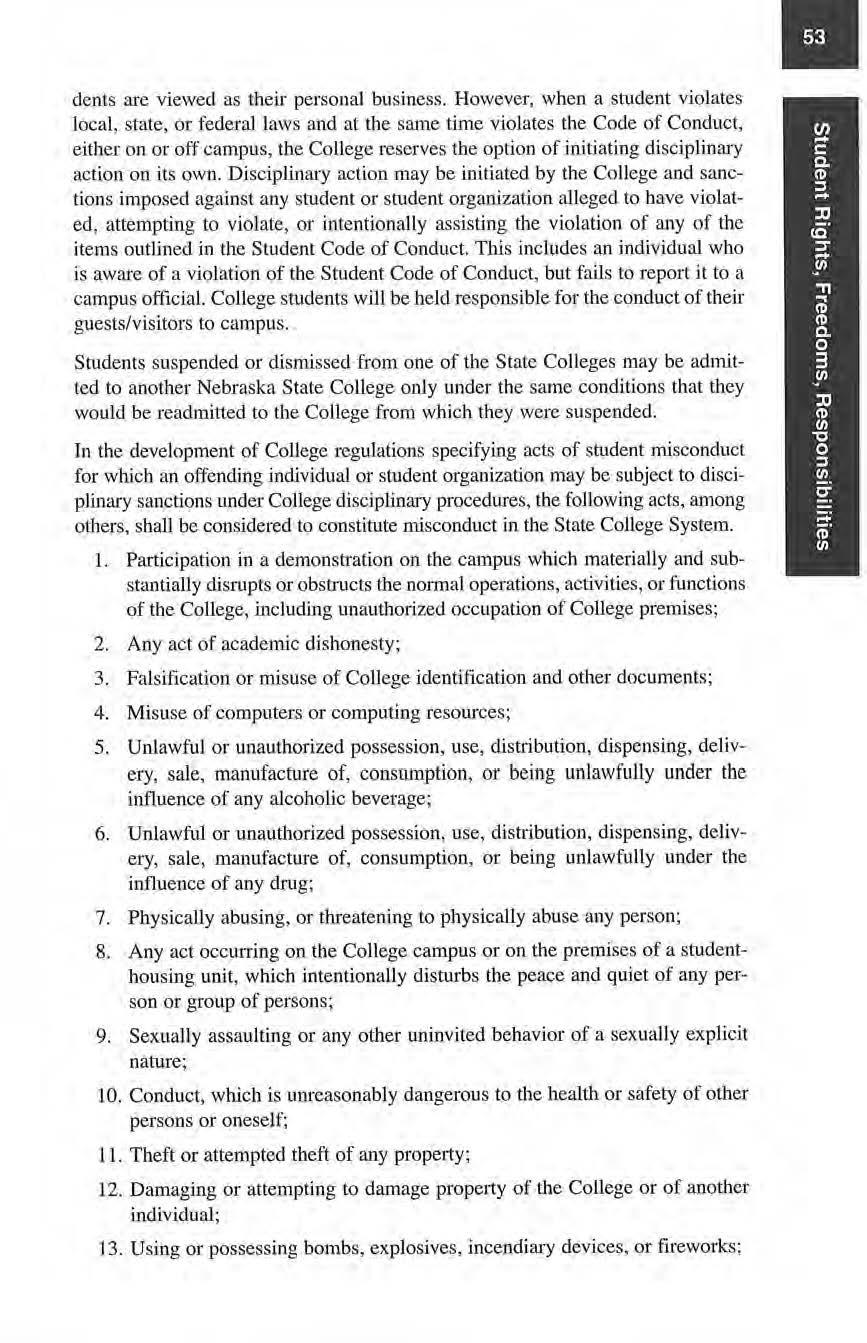
l. Participation in a demon s tration on the campus which materially and substantially disrupts or obsttucts the normal operations, activities, o r functions of the College, mcluding un authorized occupation o f College premises;
2. Any ac t of academic dishonesty;
3. Falsification or misu se of Co ll ege identification and other document s;
4. Misu se of computers or computing resources ;
5. Unlawful or unauthorized possession, use , distribution, dispensing, delivery, sale, manufactute of, cot1snmption, or being unlawfully under the influence of any alcoholic beverage;
6. Unlawful or unauthorized possess ion, use, distribution, dispensing, delivery, sale , manufacture of, consumption, or being unlawfully under the influence of any drug;
7. Physically abusing, or threatening to physically abuse any person;
8 . Any act occwTing on the College campus or on the premises of a studenthousing uo.it, which intentiona lly disturbs the peace and quiet of any person or group of persons;
9. Sexually assaulting or any other uninvited behavior of a sexually explicit nature;
JO. Conduct, which is unreasonably dangerous to the health or safety of other persons or oneself;
11. Theft or a ttem pted theft of any property;
12. Damaging or attempting to damage prope rty of the College or of ano th er individual;
t 3. Using or possess ing bombs, explosives, incend iary devices, or fireworks;
14. Setting or attempting to set any fire on the campus or on the premises of any student- housing Ullit , except in fireplaces or other facilities designated for fires;
15. Fai ling to report a fire or any other extremely dangerous condition when known or recognized on the campus or on the premises of any studenthousing unit;
16. Possessing or selling firearms, ammunit io n, oth er dangerous weapons, m dangerous chemicals on the campus or on the prem ises of any student housing unit; weapons used for bunting anti other legitimate sport may be stored in an area designated by the College; tbe checking in and out of weapons from the designated stmage area must be accomplished in accordance with procedures established by the College and published in !he Student Handbook:
17. Obstructing or failin g to comply with tbe directions of a law enforcement officer, firefighter, or College official in the JJerformance of his or h er duty on the College campus, on the premises of any student housing unit or at any activity or event sponsored by the CoUege or an organization;
18. Hazing any person; consent of the victim of the hazing will not constitute a defense to an allegation of misconduct for hazing;
l9 Comm itting any unlawtia.l act of indecent exposure or public indecency;
20. Participating in any gambling activity in violation of the laws of tbe State of Nebraska or of the United States;
21. Unauthorized use of any College property, faci lities, equipment, or materials;
22. Possessing, producing, manufacturing, or havi ng manufactured without proper authorization, any key or unlocking device for use on any College facility or lock ;
23. Serious traffic violations on the campus, including operat in g any vehicle wh il e intoxicated, speeding, reckless e nd ange1ment, or reckless drivi n g;
24. Violati on of any studen t housing uni t po l icy, ru le, or regu lation;
25. Failure to redeem or make arrangements to redeem within one week after receipt of written notice, an insuffic ient fu nd s or oo account check submitted to the College for cash or for payment of College goods or ser vices;
26. Abuse ofCoUege disciplimu-y proceedings which includes, but is n ot limited to, fail ure to obey a request to appear before a disciplinary officer or committee, falsificat ion of testimo ny, disruption or interference with the orderly conduct of llny hearing, attempting to discoUiage any person from using College disciplinary procedures or participating in such procedures, attempting to inf1uence the impa1iiaJity of a member of a disciplina.t-y committee prior to any proceeding. filing a malicious or fr ivolous complaint, verbal or physical harassment or intimidation of a member of a disc iplinary committee prior to, during, or after a proceeding, failure to co mp ly with any sanction imposed, influenc ing or attempt in g to influence another
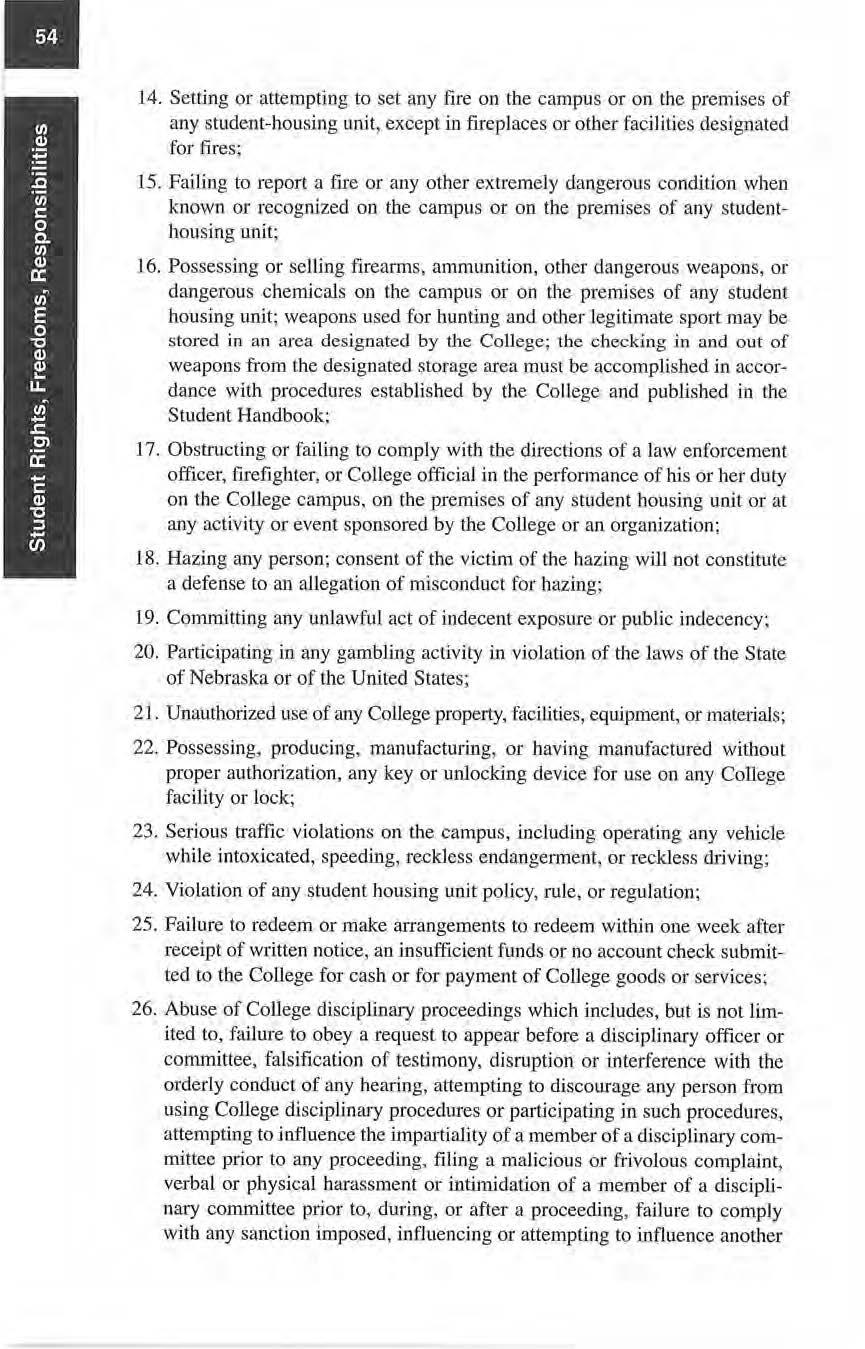
person to commit an abuse of disciplinary proceedings, and a viola lion of the privacy rights of any student or College employee in regard to a disciplinary proceeding; and
27. Any act by a s tudent wh:ich occurs on tbe campus, on tbe premises of any stude11t hou s ing unit , o r at any activity or event sponsored by the College or an organization which is in violation of any ordinance of the municipality in which the College resides, shall constilllte misconduct.
Sanctions may be imposed as provided by College procedure s wb.e11eve r a s tudent or student organization is found to be guilty of mjsconduct under the provisions s tated above or under other published policies or regulations of the College prescribing standards of s tudent conduct. Such sanctio11s may include warnings, demands for restitution or reimbursement, a period of probation, behavioral requirements , suspension , or expulsion. Sanctions ihvolving s us pension or expulsion for misconduct may not be imposed without a disciplinary p roceeding in accordance with Board l_)Olicy and campus rules , regulations and procedures. In the event that a concwTent civil or c1iminaJ action for the same behavior which forms the basis of a compliant under the provisions of th is policy or under other published policies or regulat.ions of the College is in progress, the accused student may reque st in writing to the Vice President for Administration and Finance, or equivalent administrator, that the College del ay the continuance of the College resolution. By requesting to delay the College resolution of the complaint until the ex.ternal civil or criminal proceeding has concluded, the accused student accepts suspension from the College and may not attend any College classes or College-sponsored events or activities or may not en ter or use College property without specific written authorization from the Vice President for Administration and Finance.
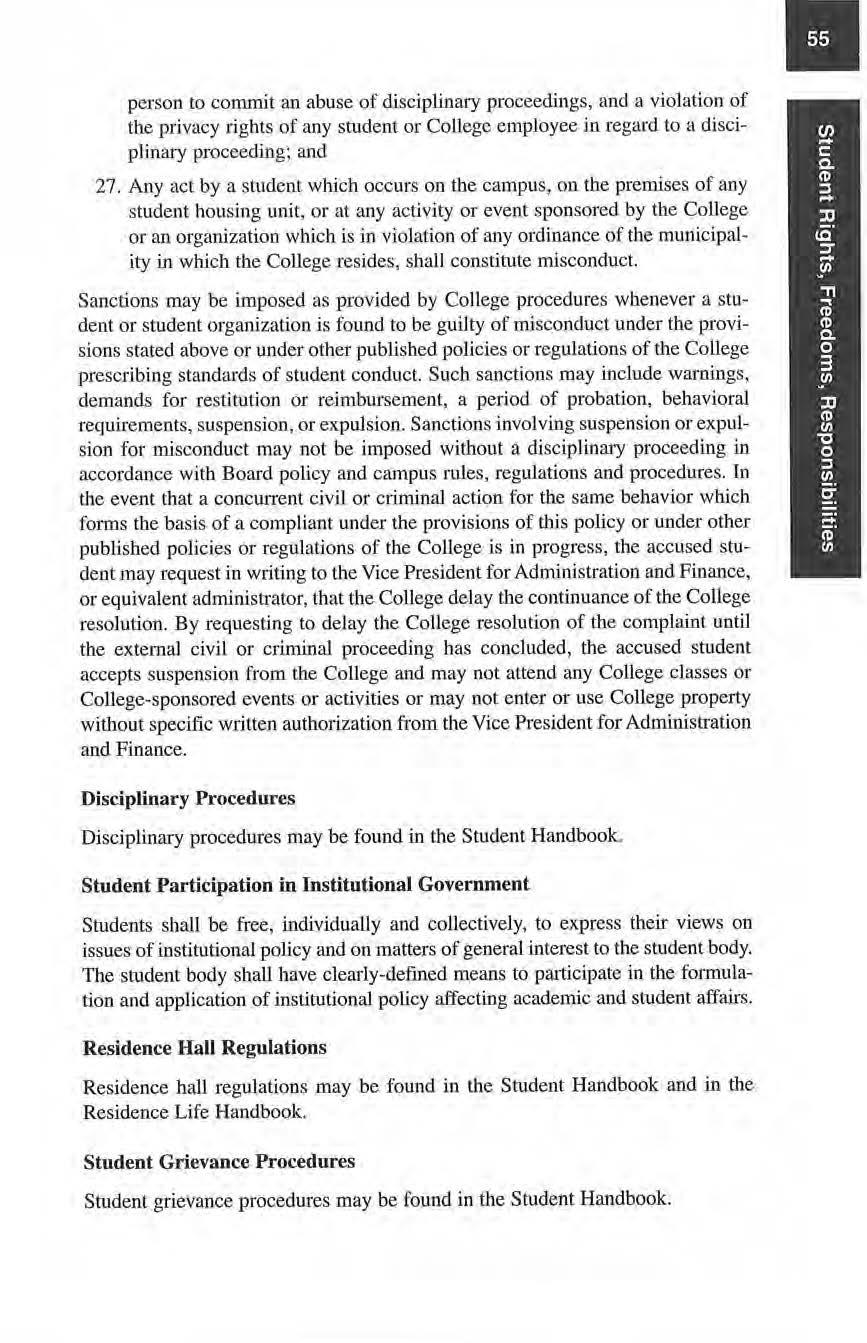
Disciplinary Procedures
Disciplinary procedures may be found in the Student Handbook.
Student Participation in Institutional Government
Students shall be free, individually and collectively, to express their views on issues of institutional policy and o n matters of general interes t to the student body. The student body shall have clearly-defined means to paiticipate in the fo1mulation and application of institutio11aJ policy affecting academic and student affairs.
Residen ce Ha ll Regula tion s
Residence hall regulations may be found in the Student Handbook and in the Residence Life Handbook
Stud ent Grievance Proced ures
Studenl grievance procedures may be found in the Student Handbook.
NON-ACADEMIC POLICIES
AIDS
The pm-pose of this policy is to establish a plan which will be followed in the event any student, employee, or other school contact has contracl"l:id AIDS (Acquired Immune Deficiency Syndrome), o r has been diagnosed by a physician as being infected w ith the HIV virus (Human Immunodeficiency Viru s).
The goals of Peru State College are to:
I. Provide an appropriate and lea s t restr ictive work/study setting as feasible.
2, Provide a safe environment for the College commun ity.
3. Maintain and protect all rights and privacy.
4 Continue to observe non-discriminatory guidel ines for al l areas of campus life (i.e. social , academic , and cultural).
5 Assure that students/staff are not put at risk because of lack of knowledge, ed ucation, or proper equipment.
6. Increase awareness and pmvide education to prevent further disease. HIV/STD testing is available at the Health Cl.inic.
Discrimination
Pern State College believes that fosteri.ng diversity and respect for difference is a fundamental goal of higher educational institu tions. Therefore, the College takes the uneqttivocaJ stance that the subordinati on of a person or a group based on race, color, creed, disability, marital status , national origin, race , sex, or sex Ltal o rientation, c annot be tolerated Peru State College will take s trong and effect iv e steps to achieve a diverse learning environment and a workplace respectful of differences. Clear, fair, and effective policies will be formul ated and communicated to all members of the campu s comm llnity, and administration will res pond promptly and consistently to complaints about any acts that violate those policjes.
Family Education Rights and Privacy Act of 1974
The primary purpose for maintaining student records at Peru State College is to ass ist students with their education al endeavors and to record institutional actions. Tc is the policy qf the Co!Jege to allow students to in s pect, review, and c hall enge their educational records as provided by the Family Education Rights and Privacy Act of 1974 (Buckley Amendment).
The complete College policy regarding the Family Education Rights aud Privacy Act cau be found in the Student Handbook. Complaints about the alleged failure of the College to comp ly with the requirements of the Buckley Amendment s h ould be fu-st addressed to the Office of Vice President for Academic and Student Affairs.
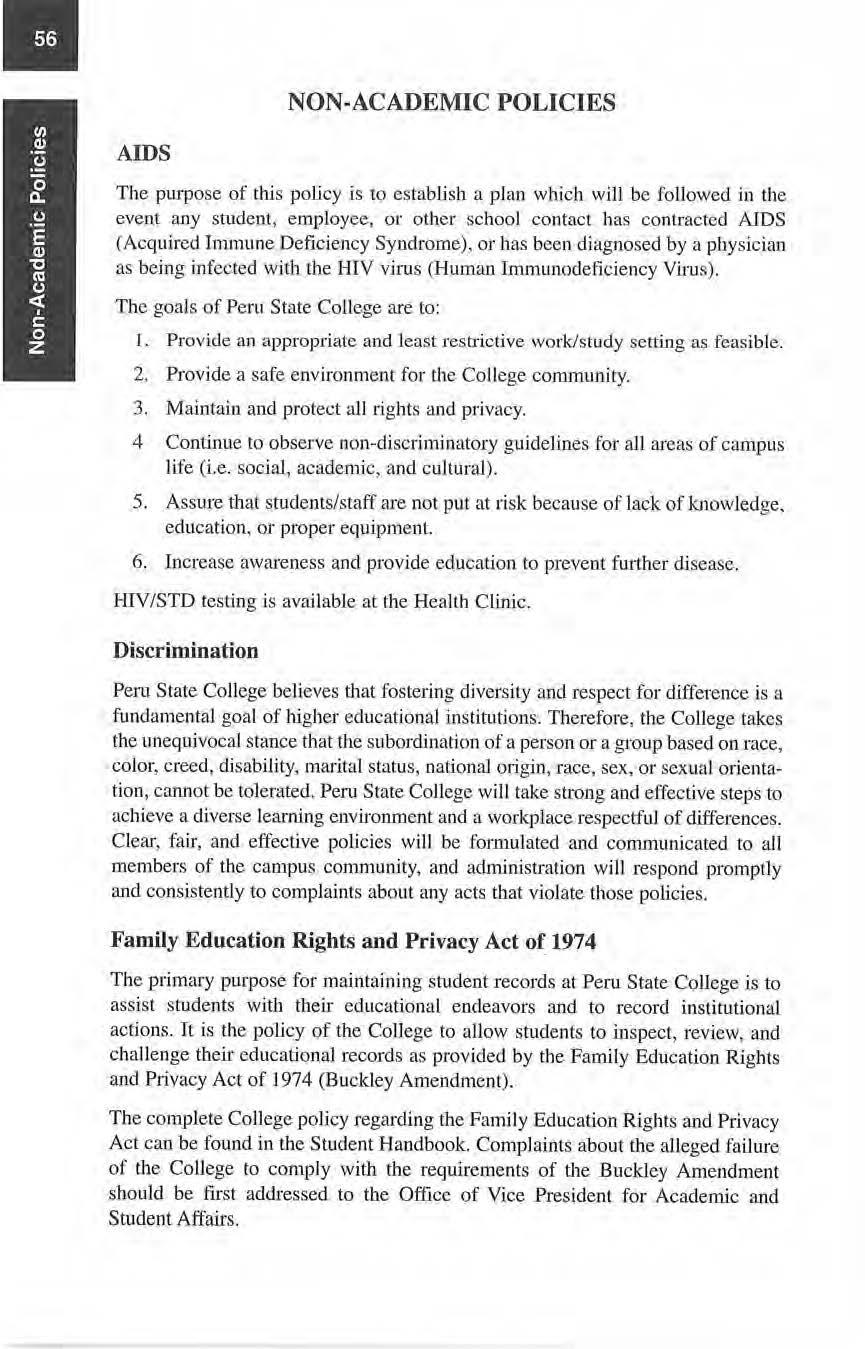
Policies Regarding PsychoJogical Problems
Students experiencing psychological problems whose behavior is detennin ed by Col lege officials to prevent them from participating at a minimal level in academic purs uits or is ili sruptive to campus life may be involuntarily withdrawn from the College. A student will be subject to involuntary administrative withdrawal from the College, including Co llege housing, if it is determined , by clear and convincing evidence, that the student js s uffering from a mental disorder (as defined by the current American Psychiatric As sociation Diagnostic Manual, DSM-N), and, as a res ult of the mental ilisorder:
a) e ngages , or threatens to engage, in behavior which poses a danger of causing physical harm to self or others, or;
b) engages, or threatens to engage, in behavior which would ca use significant property damage, or ilirectly and substantially impede the lawful activities of others.
Prior to an involuntary administrat ive withdrawal bei11g considered, the Vice President for Academic and Student AffaiJS wi ll review U1e student's record and behavior. Jf a studen t is in counseling at the time of the disruptive behavior. appropriate releases of inform ation as requested by the CoUege will be required. S hould a s tud ent not be in counseling with any counselor, the student will be requ ired to submi t to a psychological evaluation and agree to provide the College with a release of information regarding thi s eva luation. Pt'ior to final ac ti on being taken by the Vice President for Academjc and Stude11t Affairs wjth res pect to an involuntary administrative withdrawal, the student being considered for such action will be afforded the opportunity, if they so desire, of a hearing before the administrative official who will be making a final decision in the case.
Application for readmission to the College after withdrawal for behavi01·al factors relating to a psychological condition requires evaluation by counselors designated by the CoUege and final approval by the Vice President for Academic ,ind Student Affairs.
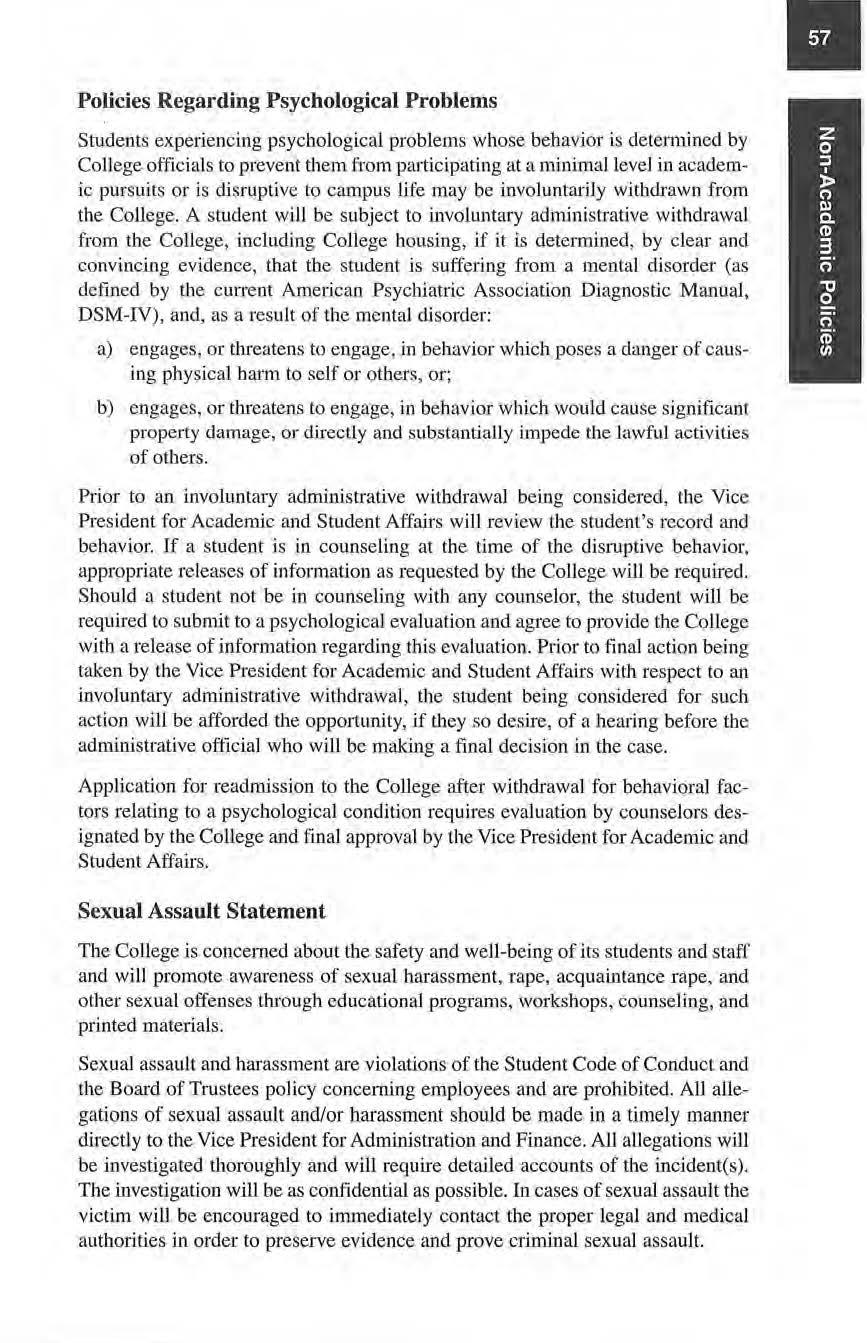
Sexual Assault Statement
The Co ll ege is concerned about the safety and well-being of its studen ts and s taff and will promote awareness of sexua l harassment , r ap e, acq uaintance rape, and other sexual offenses through e ducation a l programs, workshops, coUJJseling, and printed materia ls.
Sexual assault and harassment are violations of the Student Code of Conduct and the Board of Trustees policy co ncerning employees and are prohibited. AU allegations of sexual assault and/or harassment sbould be made in a timely manner directly to the Vice President fm Administration and Finance. All aUegations will be investigated thoroughly and will require detailed accou nts of the incident(s). The investigation will be as confidential as possible. In cases of sexual assault the victim will be encouraged to immediately co ntact the proper legal and med ical authoritie s in o rder to preserve ev idence and prove criminal sexual assault
A llegations of sexual assault or sexual harassment will result in a di sc iplinary and/or grievance procedure as outlined in the Student H andbook. The result~ of disciplinary aocl/or grievai1Ce bearings evo lving from allegatio ns of sexual assault or sexual h arassment will be made known to both the plaintiff and the accused within forty-eig ht (48) hours after the conc lu s ion of the heaii11g. The physica l violation of one person by another is roost se rious, and all appropriate campus and legal sanction s will be brought to bear on all guilty persons.
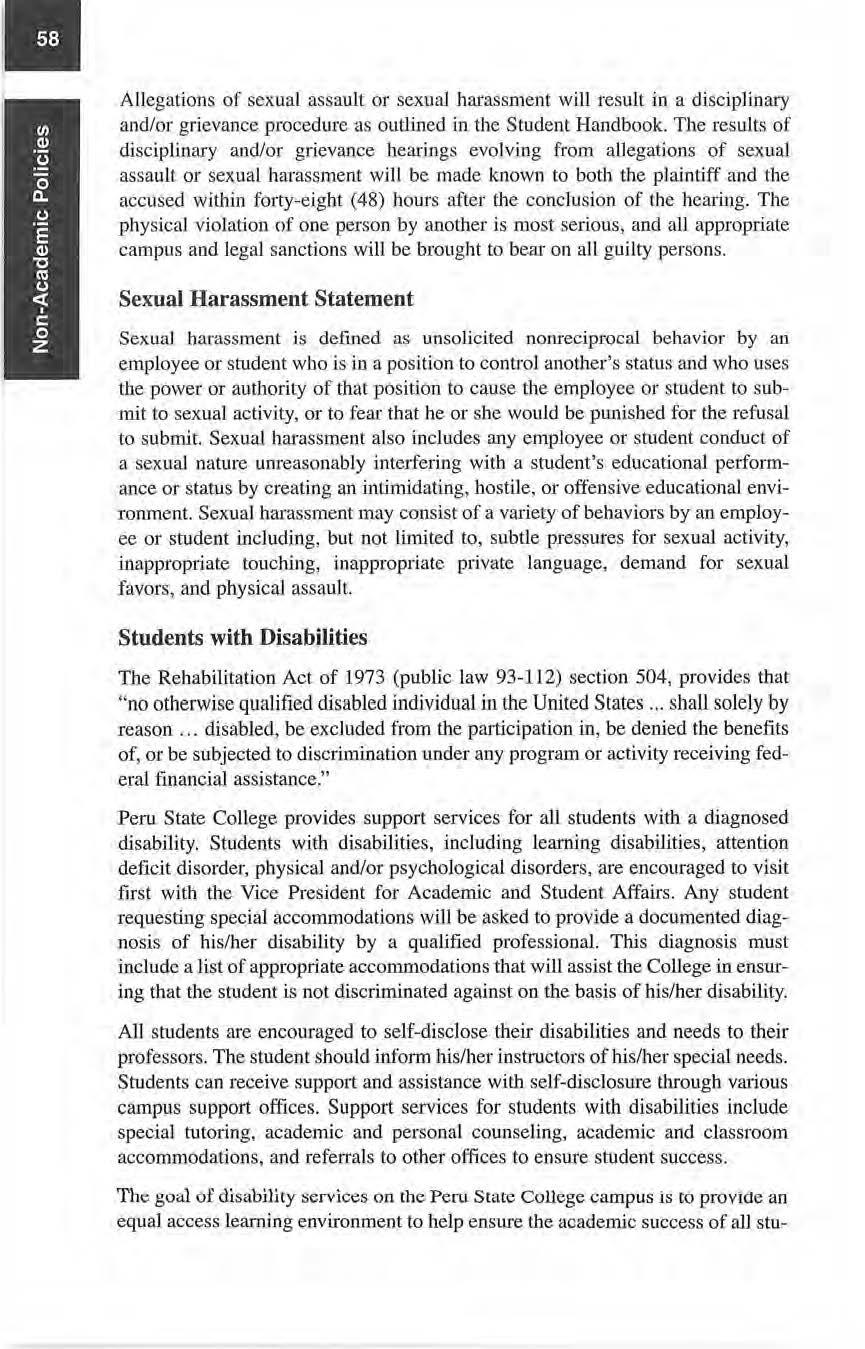
Sexual Harassment Statement
Sexua l harassment is defined as unsolicited nonreciprocal behavior by au emp loyee or studeut who is in a pos ition to control anoth er's status and who uses the power or authority of th at position to cause the employee or student to submit to sexual activity, or to fear that he or she would be p unished for the refusal to submit. Sexual harnssment also includes any employee or student conduct of a sexual nature unreasonably interfering with a student's education al performance or status by creatin g an intimidating, hostile, or offensive educational environment. Sexu al harassment may consist of a variety of behaviors by an employee or student including, but no t limited to, subtle pressui-es for sexual acti vi ty, inappropriate touching, inappropriate private language, demand for sexual favors, and physical assault.
Students with Disabilities
The Re hab ilitat ion Ac t of 1973 (public l aw 93-112) section 504, provides that " no otherwise qualified disabled indiv idual in the United States shall so lely by reason ... disabled, be excluded from the participation in, be denied the benefits of, or be s ubjec ted to discrimination under any program or activity receiving federal financial assistance,"
Peru State College prov ides s upport serv ices for all studen ts with a diagnosed disability. Students with d isabiliti es, inc.luding learofog d isabilities, attention deficit disorder~ physical and/or psychological disorders, are encouraged to visit first with the Vice President for Academic and Student Affairs. Any student requesting special accommodations will be asked to provide a documen ted diagnosis of his/her di sabi li ty by a qualified professional. This diagnosis must include a l ist of appropriate accommodat ions th at will assist the College in ensuring that the student is not discriminated against on ,the basis of his/her disability.
All students are encouraged to self-disclose their disabi lities and needs to their professors. Th e student s hould inform his/her instructors o f his/her special needs. Students can receive s upport and assis ta nce with self-disclosw-e throug h vmious campus support offices. Support services for students with disabilities include speci al tutoring, academic and personal counselin g, academic and classroom accommodations, and refe1Tal s to other offices to e nsure studen t s uccess.
Th e goal of d isability :services on the Peru State College cam pus is co proviele an equal access learn ing environment to h elp enslU'e the academic s uccess of all stu-
dents. All questions regarding services for students with disabilities should be directed to the Office of the Vice President for Academic and Student Affairs.
Vehicle Registration and Parking

Students must register their motor vehicles with the Campus Services office if they plan to operate or park them on campus. Vehicles are defined as all gasolinepowered vehicles such as automobiles, motorcycles, or motor scooters. The 2004-2006 registration fee is $20.
Only vehicles with valid petmits and proper identification are allowed to park in residence hall lots and other campus parking. Students sho uld not park in the residential areas adjacent to the campus.
COLLEGE AND PUBLIC SERVICES
Peru State College Alumni Association
All graduates of Peru State College, as well as former students, faculty and staff who request it, are cons idered members of the Peru State College Alumni. Association.
Active chapters include Lincoln (organized in 1955), Omaha (I 955) , Rocky Mountain ( 1957) , Northern California (1958), and Arizona (1995).

College Library
Housed in an award-winning building with a sculptured interior of cherry wood and stone surfaces, copper and leatber, the oldest library in Nebraska is a serious place for individual and group research and study. Students have access to an extensive anay of techno logy, including state-of-the-art wireless notebooks with connectivi ty throughout the Library and a new computer h1b. Accessible throughout campus and from home - and everywhere else - students have 24/7 lnten\et access to on line databases with tens of thousands of journals and eBooks, a nd elect roni c proficiency tools for personal skill development. The library houses 600,000 items, and s tudent development is further supported by an extensive hardcopy proficiency library. Research is supp lemented by interlibrary loan from other libraries. Specialized research collections include the original manuscripts of authors Marion Marsh Brown, E.P. Conkle, Ruth Crone, and Louise Mears, as well as, regional history. A floor of pre -schoo l and K - 12 classroom resources is devoted to teacher education and offers state-of-the art instructional technology for student coursework.
UNDERGRADUATE DEGREE AND PROGRAM INFORMATION
Graduation Requirements
In compliance with Board of Trustee s policy, this Catalog is intended as a description of the educational prog ram s and activities offered by Peru State Colle ge. Infom1ation in the Catalog is con:ect according to information avaj ]able at the time of publication. The Catalog is explanatory in natw·e and is not a contract between the student and Pem State College. Peru St·ate College reserves the right to withdraw courses at any time, change the rules and requirements regulating admission and g raduation rnqu.ii•ements , and change other reg ulation s affecting the student body.
New students admitted to PSC under th.is Catalog may graduate uuder its requirements if they graduate within seven (7) years of initial enrollme11t. Unless otherwi se noted, all academic policie s in this Catalog that do not pertain to specific academ ic programs are effective .immediately for all enrolled s tudents.

Degree and Program Information
The µrogta.ms offered by the College include: four- year professional curricul a i.n elementary and secondary education; a four-year liberal arts program; flexible bachelor of arts, scie nce and applied science programs; and a nwnber of pre-professional curricula.
Each program at the College cons ists of general stud.ies courses and specialized courses. The genetal studies courses are important to effective living for everyone regardless of vocation. The specialized courses prepare an individual for a specific occupation, or satisfy a particular vocational or cultural interest.
Upon enrolling, each student selects a program and degree objective that determines th e student 's curricu lu m and academic advisor. Th.is choice may be tentative and changed later. Students who desire specjal ass j stance in sel ecting a program may request counseling from their academ ic advisor or the Academic Resource Center.
Degrees
Peru State College is authorized by law and U'1e rules of lhe Board ofTrustees of the Nebraska State Colleges to issue the Master of Science in Education (see the graduate catalog for details) and the following undergraduate degrees:
Bachelor of Arts (B.A.)
This degree is awarded to canwdates who may e lect any major. In addition to general undergraduate degree requirements , candidates must complete the following requirements:
ten ( I 0) semester hours of a modern foreign language or ten ( 10) semester hours of upper-division cred it outside of the student's major in o ne discipline approved by the appropriate Dean; six (6) semester hours of Mathematics or six (6) semester hours of Psychology; Political Science 201, nine (9) semester hours from History 11 3, 114, 201, 202, or Socjology 201, and all requirements of a Bachelor of Science degree.
Bachelor of Science (B.S.)
This degree is awarded to candidates who elect any major except Liberal Arts. Candidates rnust complete the requ.ired General Studies Program and all r equirements of a major area of concentration. Additional hours are selected to enable the student to compl ete the 125 credit hours requised for graduation.
Bachelor of Applied Science (B.A.S.)
This degree is awarded to ca ndidates whose comp lementary area o f emphas is is Man agement, and who transfer from other i n stitutions after having completed a technical associate degree program o r equivalent.
Certificates
A wide variety of 12-hour certifi cate programs a re available. See each School's section in this Catalog for mo.re details.
Degree Requirements for Bache lor of Arts and Bachelor of Science

The foUowing are the minimum requirements for the B.A. and B.S. degrees:
Total Hours
D egree candidates must earn a minimum of 125 semester c redit holll'S.
Upper Division Credit
Degree cand id ates must eru11 at least 40 semester houss of upper-division credit (300 and 400 level courses).
Grade Point Average
A minimum, cumu lative grade point average of 2.5 is required for all degrees in teacher education; the minimum cumulative average for other degrees is 2 .0
General Studies and Major
Degree candidates must complete the General Studies Program, a major (teacher education candidates must complete one field endorsement or one subject e ndorsement), and other courses in support of their educational objective.
Computer Proficiency
Computer Proficiency must. be demonstrated through the successful completion of an on-line comse (regardless of discipline) or a college level compute r course.
Major Grade Point Average
A mjojmum cumulative grade poin t average of2.0 is required for all coui·ses lis ted or se lec te d to fu lfil l, the major hour requireme nt s. No grade lower than a "C' may be used to fu lfill course requirements in a n academic major.
Peru State Credits
A minimum of30 semester houvs m ust be earn ed from Pe ru State College.
Resident Credits
A mjnimum o f 24 of the last 30 semester h ou rs must be earned in resid ence This requirement may be waived in cases where any of the required resident creclit is eanied at an other Nebraska State Co ll ege o r where official cooperative agreements wi th o ther institutions exist. Ex.tensio n , exte nded learning, and off-campus courses conducted by Peru State College aJ'e conside red res ident credits.
Degree Requirements for Bachelor of App lied Science
The Bac helor of Applied Science degree is designed for transfer stu dents wbo have an associate degree or its equivale nt in a technical major. The degree is flexible enough to accommodate the transfer student who meets the fo llowing minimum requ i:rements :
Prerequisites
Degree canclidates must have a technical associate d egree from a regionally-accredit ed institution or it s equivalent.
Total Hours
D egree candidates must earn a m.i.o.imum of 12 5 semester credit hours . A minimum of 30 semester hours m ust be P eru S tate College ins truct ion. A minim.um of 59 semester hours are to b e comple ted through accred ited institution s a uth orized to grant a baccalau reate or hi gh er degree. Except ions: 1) B as ic or rec ruit military training may be used to satisfy the general studies Phy sical and M ental H ealth requirement; and 2) a maximum of 30 hours of CLEP subj ect examinatio ns i s acceptable.
Upper Division Credit
Degree candidates must earn at least 20 semester h ours of upper-divis i on credit (300 and 400 level co urses)

Grade Point Average
A minimum . cumul ative grade po int average of 2.0 is required for all coursework completed at Petu State CoUege.
General Studies
Thirty semester credit hours are required. Courses must be selected from at least five (5) of the following ge neral s tudi es t opi c areas: Engli sh C o mpo s itio n , Speech, Mathemati cs, Statistics, Computers, Science; Humanities ( Art Literatu re, Mu sic and Thea te r); Social Science
(Anthropology, History, Political Science, Psychology, and Sociology); Physical and Mental Health; and Global Studies.
C ompl ementary Emphasis
A minimum of 30 se me s ter credit hours in business courses is reqwred w ith a minimum cumu lative grade point average of 2.0. No grade Jower than a "C" for all courses taken at Peru State Coll ege or transfer work may be used to fu lfill course requi rements within the a rea.
Technical Emph asi s
Sixty-s ix semester hours of cred it from the techn ical associate degree are the rnax.imum applicab le toward th e 125 hours requ.ired for the Bachelor of Applied Science degree.
Additional Degree Regulations
hi add i tion to lbe above degree requirements, the fo ll owing regulations apply to Peru State College bachelor degrees:
Pre-Professional Programs Residence CredHs

Pte-professional students w ho have s uccessfully completed t hre e (3) years in a spec ifi cally appi-oved program m ay transfer to an accred ited professional school during their fourth year and q u al ify for a bachelor' s degree provided th ey meet all other graduation requirements.
Varsity Sports Credits
A maximum of fo ur (4) credit hours of P. E 190 Varsity Spo1ts is all owed toward a degree. Varsity spo r ts credits may be earned for footbaJ I, men's and women's basketball , men 's and women's volleyball, baseball, s oftball , cheerlead in g, women's golt~ and women's cross country. PE l 90 may not be used to fulfill G ene ra] Stud ies requi_remeuts.
Independent Study
A maximum of s ix. (6) ho u rs of Independe nt Study is allowed toward a degree (see page 68) .
Directed Study
A maximum of e ight (8) l10urs o r two (2) co urses of Directed St udy i s a ll owed toward a degree (see page 68)
Cooperative Education
A maximum of 12 hou rs of Cooperative Education internship credit is a ll owed toward a degree. Primarily, the hours earned are noted as general elect ives. There are limitations on tl1e numb er of hours that may be applied to ce rtafo majors (see page 66).
Application for Degree
Peru S ta te College has three grad L1 a ti o n dates: December, May, and August (e nd of snmmer). Degree candidates, upon beginning their next to last semester, mu s t complete a degree app lication through the Director o f R ecords and I nslit ut.ionaJ R esearch.
December Graduates - Students who exp ect to graduate in December shou ld apply for graduation by March l. December graduates may participate in the May commencement following the actual completion of the degree.
May Graduates - Students who expect to graduate in May should apply for graduation by October l of the preceding year.
August Graduates - Students who expect to graduate at the end of s ummer shou ld apply for graduat ion by April 1. August graduates who elect to participate in the preceding May graduation ceremony must apply by the same date as the May graduates.
Stude nt s are expected to have completed all degree requirements on or before the planned date of graduation. December graduates receive a statement of deg ree completion. Diplomas are presented at the subsequent May graduat ion, August graduates may participate in the May commencement prior to or fo ll owing the actual degree completion.
Second Undergraduate Degree

Students apply fo r 011ly one u11dergraduate degree. If it appears the student can qualify for more than one degree, the student must dete rmine the degree for which he/she will apply
An additional undergraduate degree may be obtained by completing at least 30 semester hours of credit beyond the total hours recorded when qualifying for the previous baccalaureate degree. All prescribed requirements for tbe degree must be successfoll y completed
1ndividuals will fo llow the academic requirements of th e College Catalog in effect at the time of their readmiss ion to pursue tbe additional degree
SPECIAL ACADEMIC PROGRAMS

Ex tended Campus
Credit courses are offered to communities in the Peru State College 19-cOLmty service area. Communities included are: Aubum , Beall-ice, Bellevue, Cook, Dorchester, Elkhorn, Falls City, Friend, Johnso n , Lincoln , Louisville, Malcolm, Millard, Milford, Murray, Nebraska City, Omaha, Palmyra, Papillion/LaVista, Pawnee City, Plattsmouth, Ralston, Stella, Sterling, Syracuse, Tecumseh, and York .
Peru State College offers a variety of programs and services to meet the educational needs of the College ' s service area through Learning Centers, Distance Leaming. Internet instruction. collaborat ive efforts with other in st itutions of higher education to provide new and creative educational opport1mities for students of the extended campus . A range of programs is available from credit degree programs (undergrad uate and gradua te), e.x'1ended learning courses for professional relicensure, ce rtificate programs, and non-credit courses.
Learning Centers are located in Lincoln, La Vista/Omaha, and Offutt AFB.
LaVista/Omaha
Graduate courses leading to a degree program for the Master of Science in Education are offered at a variety of times.
Lincoln
Evening courses leading to a Bachelor of Applied Science degree in Business Administrative Management are available.
Offutt Air Force Base
ln cooperation with the Offutt Air Force Base Education Office, Peru State CoJlege offers accelerated evening courses to both military and c ivilian students leading to a bachelor's degree in elementary education, teacher certification/endorsement in elementary, middle grades , and secondary education , and the Bachelor of Applied Science degree in Business Education Management.
Cooperative Education
The Cooperative Education Tntem ship Program provides sn1den ts with the opportunity to explore the field of work or gain valuable work experience while earning academic credit in aU majors. The maximum number of hours allowed for graduation is 12. Employment occurs in positions which are relevant to a student's major or career interest. The program is available to all students including off-camp us and non-traditional students. A flexible registration schedu le aUows students to enroll through the middle of each semester. To help facilitate a mutually beneficial work experience for the student, each placement is approved and monitored by the Dean of a st11dent's major.
First-year students who have completed 15 c redit hours and are in good academic standing are eligible to enroll for explorato ry or major-related Cooperative
Education Internship experiences at the 200 leve l. Students may take o ne (I) to four (4) hours at this level on a credit-no credi t basis. Students w ho h ave completed 45 credit how-sand are in good academic standi.i1g are eligible to enroll for majm· or career related Cooperative Education I n ternship experiences at the 400 level. Students may take from one (1) to twelve (12) hours at this level and wi ll receive an academic letter grade.
Transfer students must complete 15 hours of coursework at Peru State College before they are eligible to enroll in an internship. A ll students must have a permission form signed by the respective Dean before enrolti ng .
College 101
The purpose of College l0 1 is to introduce the new student to informati on and skills pertaiuing to college success. Among the subjects covered are academic expectations and plann ing, study skills, time management, financia l aid , substance abuse, and diversity issues. ColJege 10 l is a graduation requirement for all on-campus, degree-seeking students with fewer than 30 credit hours at the time of admission, unless it h as been waived by the appropriate D ean. Stu dents are automatically e nrolled in College IO l until they successfully complete the course.
College 400
T his one-hour course is designed to teach job search techniques and an educational approach for professional development. It is open to all majors. Contact the Academic Resource Center.
English 100 and Math 100
Elements of Compos i tion (English I00) a nd Elements of Algebra (Math 100) are designed to assist students in reachi ng their educationa l objectives. These courses focus on the areas t hat most often affect s tudent success: composition, mathemat ics, and reading.
English 100 and Math 100 are three (3) credit hours each and earn students institutional credit; however, neither cour se fulfills a General Studies requirement for compos ition or mathemaHcs .
Placement in English l 00 and Math 100 is curren t ly determined by the Computer Placement Tes t (CPT) or other designated institutional evaluati on w hich is required of all students entering Peru State College with fewei- than 30 hours of college work and ACT scores lower than 18 in reading, 18 in sentence composition, and 18 in mathematics.
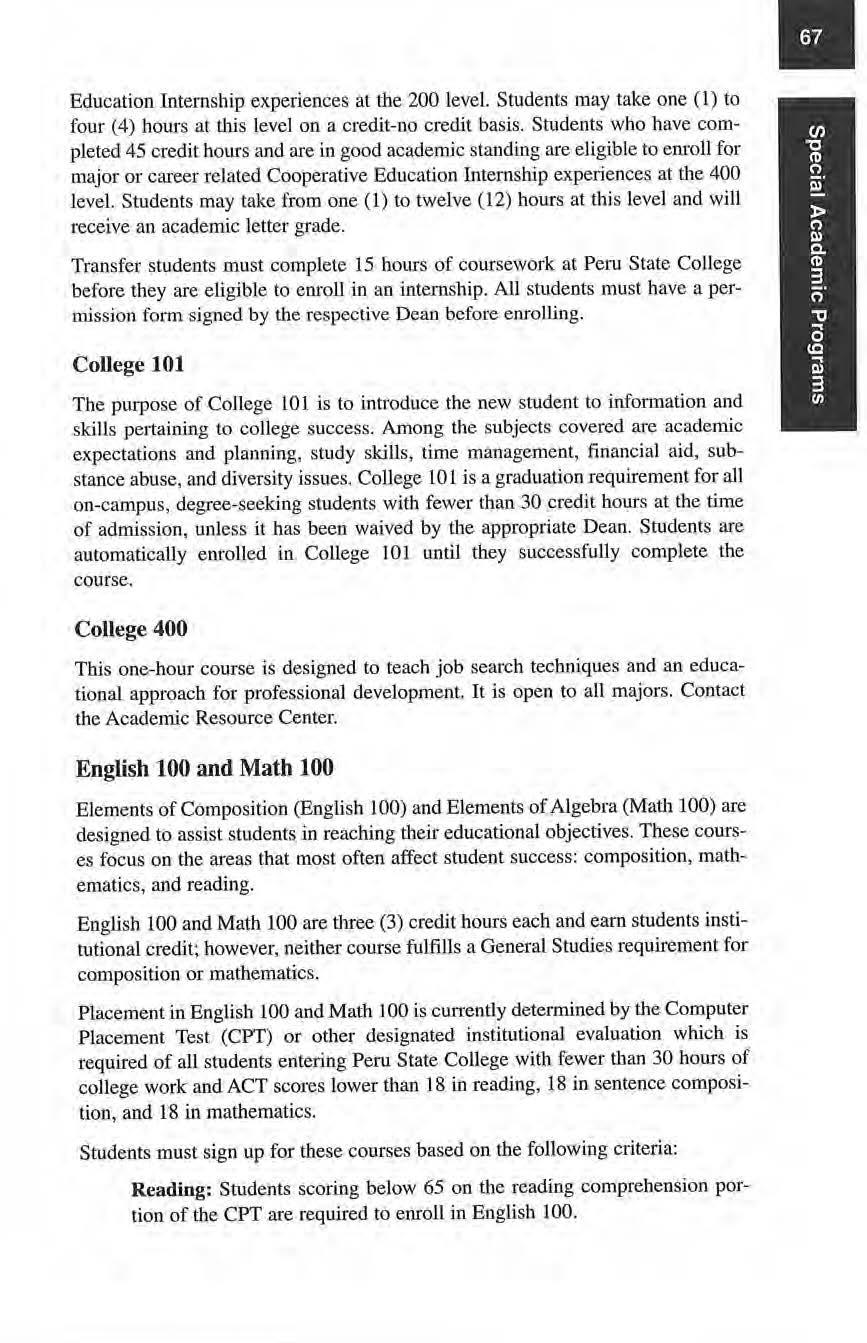
Students m ust s ign up for these courses based on the following criteria:
Reading: Students scoring below 65 on tbe reading comprehension portion of the CPT are required to enroll in English 100.
English Composition: Students scoring below 75 on the sentence skill portion of the CPT are required to enroll in English 100.
Math: Students sco ring below 60 on the arithmetic or below 44 on the elementary algebra portion of the CPT are required to enrnll in Math 100.
Students required to take either English 100 and/or Math JOO must pas s tbc course(s) to en.roll in mathematics and composition General Studies cou rses. Students fail ing to pass either of these coLu·ses will meet with the Vice President for Academic and Student Affairs to discuss further academic options.
Directed Study
A Directed Study (Subject 297 or 497) may be ta.ken (with approval of the instructor and the appmptiate Dean) as a course substitution when a student has been unable to meet a cow-se requirement in the normal manner and can demonstrate a need to take the course via Directed Srndy to graduate. In a Directed Study, the student must meet the same requfrements as in the original course. Directed Srudy is available in nearly every s ubject area and is numbered either 297 or 497. To be eligible to take a Directed Study, a student should have completed a minimum of 90 semester hours (senior standing) and be within two (2) semes ters of graduating.
The following additiona l regulations apply to D irec ted Study:
t. Only two (2) courses of Directed Study (a maximum of eight (8) semester hours) may apply toward meeting graduation requirements.
2 . No roore than one (1) Directed Study may be taken in a given semester.

3. lf a student does not meet the eligibility requi rements but can demonstrale a need to take a Directed Study, the appropriate Dean will make the final decision on approval to register.
4. The student must meet wi t h the instructor at least once each week.
5. A Directed Study Form must be completed and submitted to the appropriate Dean and the Director of Records and Institutional Research when registering for the class.
Graduate Studies
Peru State College offers a Master of Science in Education degree program for teachers in elementary and secondary classrooms. It is a program designed in response to the assessed needs of teachers. The program features emphasis on the improvement of classroom teaching, the use of technology in teaching, and the strengthening of the foundations of educational practice, Further information may be obtained by contacting the School of Education and Graduate Studies.
Independent Stud y
An i ndependent Study is a carefully organized l earning activity with specific objectives and methods of eva luation developed in consultation wjth a faculty
member. Co urses are numbered 499. To be eligible to take an Independent Study, a student must have completed 60 semes ter hours (junior standin g) and be capable of doin g independe nt research , work, and study. The followin g addjtional regu latio ns app ly to In dependent Study courses:
l. No more than six (6) semestei· hours oJ Independent Study may be counted toward graduation requirements.
2. No more than one Inde pendent Study (a maximum of three (3) ho urs) may be taken in a given semes ter.
3. The student mu s t communicate with the instructor at least once each week.
4. An Independent Study Form must be comple ted and submjtted t o the appropriate Dean and the Director of Record s and Institutional Research when registering for the course,
5. A co py of the Independent Study final project should be submitted to the app ropriate Dean as well as th e instructor for departmental archi ves.
Internship (see Cooperative Education)

Pre -Professional Programs
The entrance require ments of most profession a l school s require progr ams of general studie s whjch vary onJy slightly from one profession to another, These pro " grams usually require two years or more of stud y. Since s uch work is also required in the professional cmTiculum of teac hers, Peru State's general sturues program meets the pre-professional nee ds of prospective doctors, dentists, pharmacists, optometrists, nurses , veterinarians, lawyers, e ng in eers, agriculturists, foresters, morticians, journalists, and others. Students follow.iog a pre- profess ional program are urged to check the c atalogs of professional schools so tha t specific e ntrance requirements can be met at Peru State College.
Pe ru Stale Co ll ege and the College of Agriculture an d Natural Resources at the University of Nebraska-Lincoln cooperate to offe r a transfer program. Under the terms of this agreement, students may complete a specified group of courses at Peru State College and then transfer to the University's Co llege of Agric ulture and Natural Resources. A listi ng of these co urses can be fou n d at the end of the sec tion of Pre -Profess ional Programs in thi s cata log.
Pre-profess ional stude nts who have s uccessfully completed three years in a specifically approved program may transfer to a n accredited professional school during thei r fourth year and qualify for a bachelor 's degree provided they meet a ll other graduation requirements.
Summer Session
The Co llege typically offers a Summer Session beginning in early May and running throu gh early August. A limited number of cou rses are offered durin g various session s.
ACADEMIC POLICIES, REGULATIONS, AND PROCEDURES
Academic Appeal
Any reques t for waiver or exception to the policies and regulations st ated in the catalog should be submitted as a written petition to the Office for Vice President of Academic and Student Affairs. Co ns ideration is givon to the petition by the Faculty Senate, and a written response is sent to the peti tioning student. Pe titions s hould cl ca.rJy and spec ifically state the ground s for the request. (Student Grade Appeal information can be found on page 73.)
Academic Bankruptcy
A student may remove up to two complete semes ters of work from his /her cumulative grade point average and degree considerations by petitioning for approval to tbe Office of Vice President for Ac ademic and Student Affairs. To quaJjfy, a student must have completed either 15 consecutive Pern State College semes ter hours of credjt with a minimum 3 .0 term grade point average or 30 consec utive hours with a minimum 2.5 term grade point average at Peru State College followin g the se m es ler(s) the s tude nt wishes to remove.
To declare a semester bankrupt , all courses taken during that semester a re voided (bot b credit hours and grades) . The bankrupt semes ter i s removed from c011sideration for cwm1 lative grade point average purposes , aod the bankrupt credit .is not used for degree requirements. The semeste r listing of courses and grades, however, remrun s 011 the academic transcript.
Academic Credit
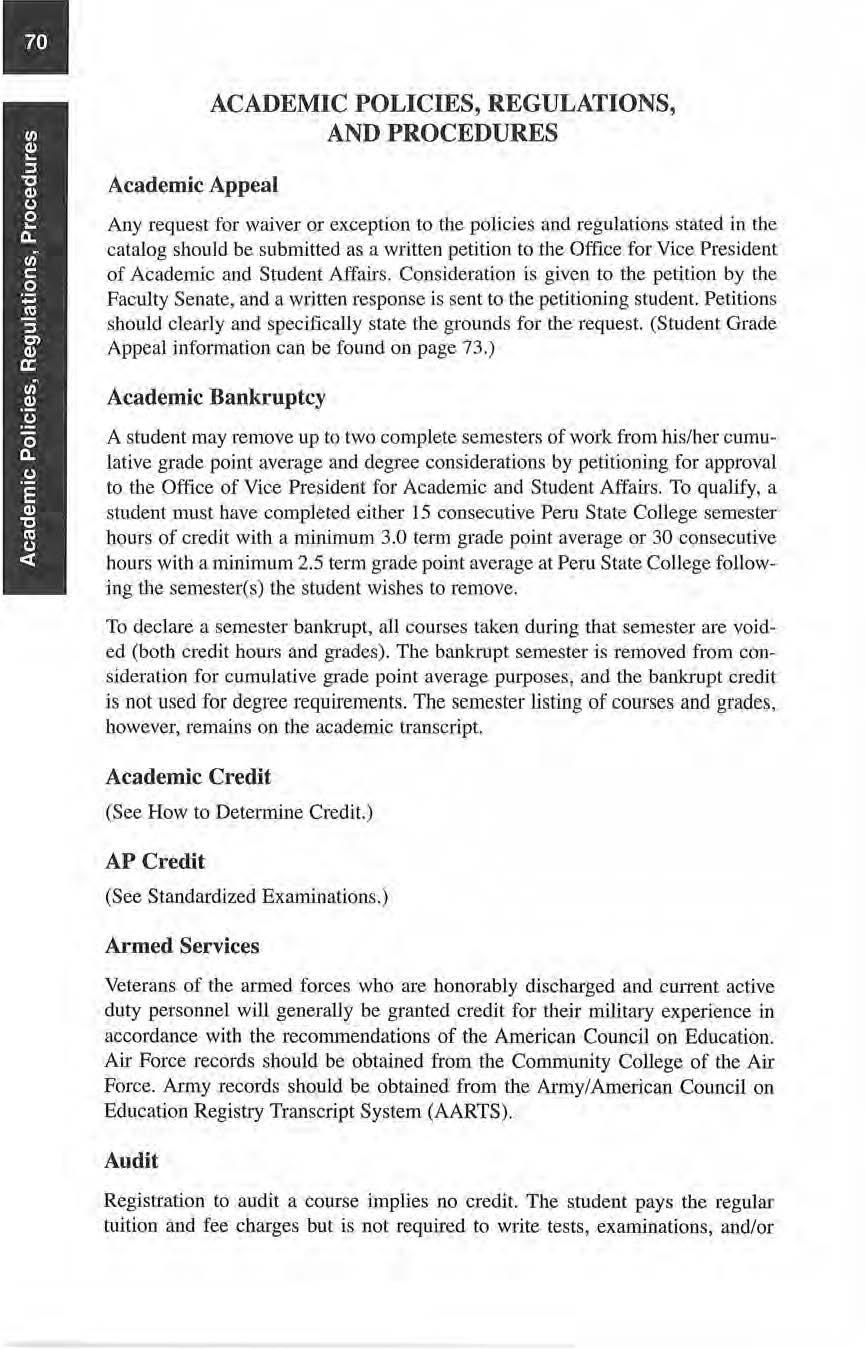
(See How to Determine Credit. )
AP Credit
(See Standardized Examinatio ns .)
Armed Services
Veterans of the armed forces who are honorably discharged and current active duty perso nnel wiJl generally be granted credit for their military experience in accordance with the recommendations of the American CounciJ on Education. Air Force record s s hould be obtained from the Community College of the Air Force. Army records should be obtained from the Army/ American Council 011 Education Registry Transcript System (AARTS).
Audit
Registration to aud it a Co urse implies no credit. The s.tu deut pays tbe regular tuition and fee charges but is not required to write tests , examinations, and/or
papers. No grade is given in audited courses nor can cred it be given at a l ater date. Enrollment is on a s pace-available basis.
CL EP
(See Standardized E xamination s .)
Course Challenge
(See Inst itutional Exam s.)
DANTES
(See Standardized Exami nations.)
Early £ntry
In high schools with which P eru State Co llege has a formal early e ntry agreement, the princip al decides which students are qualified to take c ollege courses , Other restric tions may a lso apply; contact the Office o f Student Records.
Any high school student approved to register for a college credit course will have th e appropriate information e ntered on a college transcript.
High School
(See Early E n try.)
How to Determine Credit
Pern State College credit is expressed as semester credit hours. On e Cl) cred it hour is awarded to a student who s atisfactorily completes ( 1) a c ourse that meets o ne hour per week for a semester, or (2) a laboratory that meets fo r two to tbrne hours per week for a semester, or any combina tion of these depending u pon the type o f in struction and material covered in the course. Cred it for in ternships, s tudent teaching, and other instructional formats is determined us ing o ther app ropriate standards.
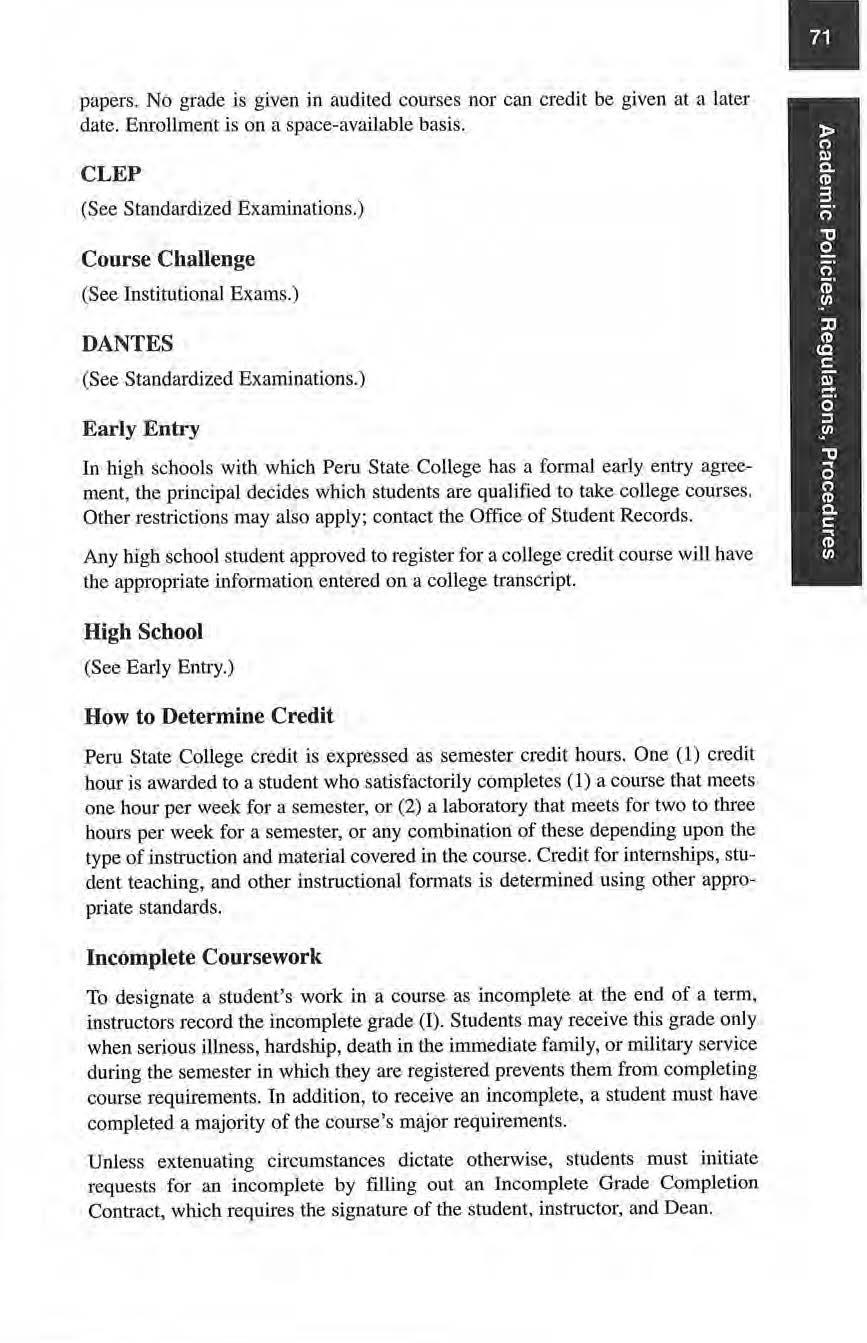
Incomplete Coursework
To designate a s tudent's work in a course as incomplete at the end of a term, instructors record the incomplete grade (I). Students may receive this grade only when serio us illness, hard ship , death in the immediate family, or military service during t be semester in which th ey are registered prevents them from completing course requirements. In addition , to receive a n incomplete, a student must have comple ted a majority of the course 's major requireme nts.
U nless ex tenuating circumstances dictate otherwise, students must initiate rnque sts for an incomplete by filling out an In complete Grade Completion Contract, which r equires the s ignature of the student. instructor, and D ean.
The Incomplete Grade Completion Contract cites the reason(s) for the incomp lete and details the specific obligations the student must meet to change the incomplete ro a letter grade. Tf the student agrees to complete required work prior to the normal deadl ine for making up an incomplete - the end of the subsequent semester - this date must appear in the contract. The Dean, the instructor, and the s tudent receive signed copies of the Incomplete Grade Completion Contract.
Even if the student does not attend Peru State College, all incomplete course work must be finished by the end of the subsequent semester. Unless the appropriate dean approves an extension, and if tbe student does not fulfill contract obl igations in the allotted time , the incomplete grade automatically becomes an F.
Students who have filed m1 application for graduation are not elig ibl e for a grade of Incomplete.
Cr·edi t for Pri or Learni ng/L ife-Experien ce
Students may earn college credit for some experiences and accomplis hmen ts outside of the norma l college setting. Credit may be granted {hrough standardized examination programs (e.g., CLEP, DANTES, A.PP), the credit recommendations of the American Council of Education, and/or an evaluation of an individual portfolio/College examination by an academic department of the CoJlege. Students should beg in this process with a visit to the Office of Student Records for assistance regarding wh ich path to acquiring Life Experience Credit is most appropriate.
The Col lege's general pol icies for awarding ci'edit for extra-institutional learning follow:
1. P r ior Learning/Life-Experience cred its are considered transfer credits and are subject to the same policies as other transfer credits.
2. Only indjviduals who have not part icipated in similar scheduled coursework are el igible to receive Iife-experie11ce credit.
3. Credit by examinat ion may be earned only o nce in a single subject. A similar subject test in anothe r testing program will not eam additional credits.
4 The amount of cred it to be allowed through College exam ination or individual portfol i o eval u ation, the course(s) for which substitution, li any, is made, and the particu lar graduation requirements whic h may be satisfied will be detennined by the D ea n of the appropr iate School.
5. For Bachelor of Science students, the maximum amount of credit granted for gener al life experiences (i.e., those that do not fi t directly into a specific course offered by the College) is 21 hours.
6. For Bachelor of Applied Science studen ts, the maximum amount of credit granted for experie nce deemed to be t he e quivalent of a technical associ~ ate degree is 66 hours.
7 A po11fo lio of evidence of extra-institutional learning is required for those

interested in acquiring a block of credits (more than six hours of credit not corresponding directly to college courses). To assist students interested in developing a portfolio for thi s purpose, the College requires participation in College 200 Prior L earning/Life-Experience Portfolio Development. Portfolios will be evaluated on the level of learning evidenced by leadersh ip and community service experiences, pro fessional work experiences, creative contributions to society, and completion of professional development seminars.
Proficiency Examination Program (PEP)

(See Standardized Examinations.)
Repeat Courses
Students are encouraged to repeat courses in which they have performed poorly. The initial course title and grade are not removed from the stude nt 's permanent record. The higher grade is used to determine the new grade point average. There may also be occasions when students repeat a course for review on an audit basis without a change of grade.
It is the student's responsibility to report all repeated cou rses when registering for courses. Tuition and fees are paid for repeated courses , but additional credit hours are not earned.
Standardized Examination
Students may earn credit through several standardized examination programs. Credits earned from the CLEP subject exam only (College Level Examination Program), DANTES (Defense Activity Nontraditional Education Support), PEP (Proficiency Examination Program), and APP (Advanced Placement Program) can satisfy certain Peru State College degree requirements. Students should contact the Director of the Academic R esource Center for specific information about the College's regulations and procedures for the sta ndardized CLEP examinations. The 66 hour maximum for extrn-inst itutional credit includes standardized examinations.
Student Grade Appeal Policy Policy
Students who disagree with the assignment of a final grade by an instructor may file an appeal under these procedures.
Grade Decision Review
This process is available only to review alleged ly un fair final course grade decisions, not mere differences of opinion regarding the professional judgment of the instructor who made the grade decision , or to dispute grades o n assignments ,
tests, or other work within a course. A grade decision may be considered unfair if the decision;
Was based o n factors other l'han performance in the course and /o r compUauce with course assignments and requirements;
• Involved more ex.:1cti ng or demanding standards than were applied to other students in tbe same course section;
• Con stitutes a substan ti al departure from the in structor's standards as articulated in the course syllabus, catalog descriptions, a ud/or other w1itten materials.
Procedures
A student who wishes to appeal a grade decision m ust proceed as follows:
l. Informal Meeting
The student m ust attempt to resolve th e matter di.reedy with th e instructor through a personal confe rence as s oon as possible after the grade decision is known , but no later th an the end of the fu-st full week of the following regu l ar academic term l f the student is unable to arrange a conference or is not satisfied with the instructor's explanat ion of the grade, the student m ay request in Writing that the dean of the school which offered the co urse convene a conference with the student a nd in struc tor. If the instru ctor is unavailable o r unwilling to confer with the student, the student may request a formal review by the appropriate dean (See section 2c below.)
2. Dean Review
a . Jf the stude nt and the instructor can not reach a mutually satisfactory reso luti o n to the problem, tbe student m ay file a formal appeal. The appeal must be presented in writing, together with relevant documents, t o the appropriate de an no later than the 20th day of college instruction in followi ng academic term. The stu de nt mus t describe the appeal, ide ntify whicll of the three reasons the appeal is based on (See Grade Dec is ion Reviewed), detail the reaso ns the student believes the decision unfair, and document the studen t's attempts to resolve the appeal in formally. For pm-poses of this sectio n , fa ll semes ter a nd spring semester s h all each consrl tute an academic te rm . The student shall send a copy of the appeal to the instructor The instructor shall have ten (10) working days to respond after receipt of the appeal. If t he in s tructor does not respond within that time frame, the dean will cons ider the appea l and documents forma lly submitted by the stud ent.

b. The dean shall review and the appeal and all of th e submi tted documentation, interview persons relevant to the appeal when necessary, and render a written decision within ten (10) wmking days of receipt of the instmctor's response. A copy of the dean's decision will be given to the instructor and the Student.
If the dean is a l so the instructor whose grade is the subject of the
appeal, the Vice President for Academic and Student Affairs shall select another dean to conduct the appeal process.
3 Faculty Senate Review
The student or the instructor may appeal tbe dean 's decjsion. Such appeal must be filed in writing and submitted to the YPASA within five (5) working days of receipt of the dean's decision, with copies to the instructor, the student, and the dean The written appeal sb:lll deal on ly w ith the part or parts of the dean 's decision that the appellant disputes. New evide nce, information, or supporting documents cannot be included as part of the appeal excep t when, by clear and convi ncu1g evidence, it is establ ished that such infom1ation was not available at the time of the orig inal appeal. The Vice President for Acaderruc and Student Affairs will subm it the appeal to the Faculty Senate for review. The Faculty Senate may intervjew the student, the instructor, the dean and other appropriate persons, but only to discuss the iss ues in dispute in the appeal. The Faculty Senate wHl submit a written decision to tbe student, the instructor, and the dean witllin ten ( 10) working days of recejpt of the appeal. The decision of the Faculty Senate is the final decision of the College.

Transfer Credit
Peru State Co11ege considers all courses completed with a grade of "C" or better at other accredited colleges and universities, provided they are reported on the official transctipt of each previously atten ded institution and in credit h ours. Cour ses completed at the pre-college or remedial level are not considered for transfer. T his policy also applies to Peru State College studen ts who earn c redits on an interim basis at another college, provided they h ave the prior approval of tbe Dean of the appropriate School/Director of Records. The required forms for reporting transfer credits are available at the Director of Records and Institutional Research Office.
Variable Credit Courses
The credit hours to be earned and the coursew01·k to be completed are determined at the t ime of registration. Students do not h ave the option of reducing or in creasing credit houxs or coursework after the free drop/add period at the beginning of th e term.
Academic Dishonesty
Academic integrity is a basic principle that requires the student to ta.lee credi t only for ideas and eff01ts that are his/her own . It is dishonest to submit material s in assig nments, exams, or o th er academic work th at is based on sou rces prohibited by the faculty member. Students are entirely responsible for demonstrating to the faculty member's satisfaction, that all work submitted for evahlation belongs to the student or is properly documented. Academic clishonesty, or cheating, shall in cl ude, but is not limited to, situation s in whjch a student:
l. Refers during an academic evaluation to material sources not authorized by the faculty member.
2. Util izes devices during an academic evaluation that are not authorjzed by the faculty member.
3. Provides assistance to another student ot receives assistance from another student during an academic evaluation in a manner not authoi"ized by the facu lty member.
4. Presents as hls/her own the ideas or words of another person without customary and proper acknowledgment of source, commonly called plagiarism.
5 . Knowingly permits his/ber words to be submitted by another person without the faculty member's specific pennission.
6. Acts as a substitute or utilizes a substitute in any academic evaluation.
7. Fabricates data in support of laboratory or field woi-k.
8. Possesses, buys, sells, obtains, or uses a copy of any materials intended to be used as an instrument of academ ic evaluation in advance of its administratio11. This include s onliJ1e posting of papers, essays, exams , etc. online or hardcopy.
9 . Alters grade records of his/her own oi- another student work in a course or a component of a course.
[nstances of academic dishon esty may be discovered in a variety of ways. Faculty members who assign written work ordinarily checl;c citations for acc uracy, run data base and on line checks, and may simply recognize familiar passages that are not c ited. They may observe studen ts in the act of cheatmg. Other students, faculty, or staff may become aware of instances of cheating. All persons who o b serve or otherw ise know about instances of cheating are expected to report such instances to th e proper instructor or Dean.

P enalties for iustances of academic dishonesty:
The faculty .member, at his or her discretion, may a) assign a failing grade for th e assignment, b) assign a failillg grade for the course, c) recommend to the approp1:iate Dean that the studen t's transcript reflect a course failure for reasons of academic dishonesty, d) request that the appropriate Dean recommends to th e President that the offending student be suspended for one semester or, in particularly egregious cases, permanently expelled from the College.
A fac uJty member need present only basic evidence of academ ic dishonesty. There is no req uirement for proof of intent. Students are responsible for understanding the tenets of academic honesty and integrity.
Students may appeal penalties for academic dishonesty usin g the process established for Appeal of Grndes.
Academic Probation and S us pen s ion
Students with a cumulative grad e point average of 1.00- L.99 at the c lose of a semester, regardless of t he number of attempted hours , are placed on acade mi c probation. Probationary students must agree to th e provis ions of an Ac ~1demic Probation Conlract that may include the following: limited e nrollment (9-12 hours); advisor meet ings; and one or more mandatory courses. Probationary students must obtain a minimum 2.0 average for each success ive se mes ter of attendance (continued probation) until th e required cu mu lative grade po in t average of 2 .0 or higher has been ac hi eved. Failure to meet the above condition will result in academic s uspension (see below ). Academic suspens ion is ge nera lly for two semesters.
"21-Hour Rule' '
Stude nt s who have attempted 21 credi t hours or fewer (excludin g transfer record) and have a c umul ative grade point average below l .OO at the close of a semes ter arc placed on an academic probation contract and may conti nue attendance under the above requ irements prov ided the fo llow in g additional requirements have bee n satisfied. The s tudent must meet with a designated Probation Advisor to develop a persona l plan for imp rovement. The s tud e nt mu s t agree to the provisio ns of all Academic P robatio n Co ntract that may include the fo llowing: limited enroll men t (9-12 hours); advisor meetings; and o ne or more mandatory courses. (See chart below.)

Susp en s ion
Students who have atte mpted 22 semester hours or more, excl ud ing tran sfer h ou rs, and have a cu mul ati ve grade point avt!rage bt.:l ow LOO at the end of a semester are s uspend ed . Acade mic suspens io n is gene rally fo r two semesters. A second academic s uspension is ge nerally a final s uspens ion. Suspended students may not take P eru State College courses during the period of suspens io n Students with a cumulative GPA of 1.00 to l.99 s hould refer to the previous section, Academic Probation and Suspension (See c hart below.)
Academic Sta ndards C hart
St atu s after Subsequent Semester
Current or Admitted Status C u mulative G .P.A. (includes subsequent semester)
* Unless the student has a.ttemp ted 2 1 hours or fewer (excluding transfer hours), in which case the s tatus is 1>robatioo See "2 1 Hour Rule," above.
** Unless semes ter GPA is 2.0 or higher, in which case the status is continued probati on.
Status Cum .G.P.A 2.00 or higher 1.00-1.990 .99 or less Good Standing 2.00 or high er Good Standing Probation Suspens ion* Probation 1.99 or less Good Standing Suspension** Suspension
Adm in istrative W ithdrawal/Drop
Students who do not meet the prerequisites of a course as stated in t he cmTent catalog and who have not received instructor permission to enro ll may be admini stratively dropped from the course. Students who are so identified aft.er registering for a course will be norified within the drop/add period by the appropriate Dean of the School that tbey do not meet the prerequisites and shmild institute the procedures for dropping the course. Students who do not drop will be notified by the Dean of the School that they are bei n g withdrawn . The D ean of the School w ill notify the Direc tor of Records and In stitut ional Research to have the s tudent dropped. Such notification will be approved by the Vice P resident for Academic and Student Affairs.
Assessment
All Peru State students participate in outcomes assessment activities that determine whether s pecific learning goal s have been achieved.
To assess wbether senior students bave mastered the content, methodology, and liberal arts base of their discipline, each graduatin g senior must successfully complete the di scip liJ1 e's senior competency. Senjor compet encies for each major are note d in the major's section of the Catalog and below:
C mTent Senior Comp etencies
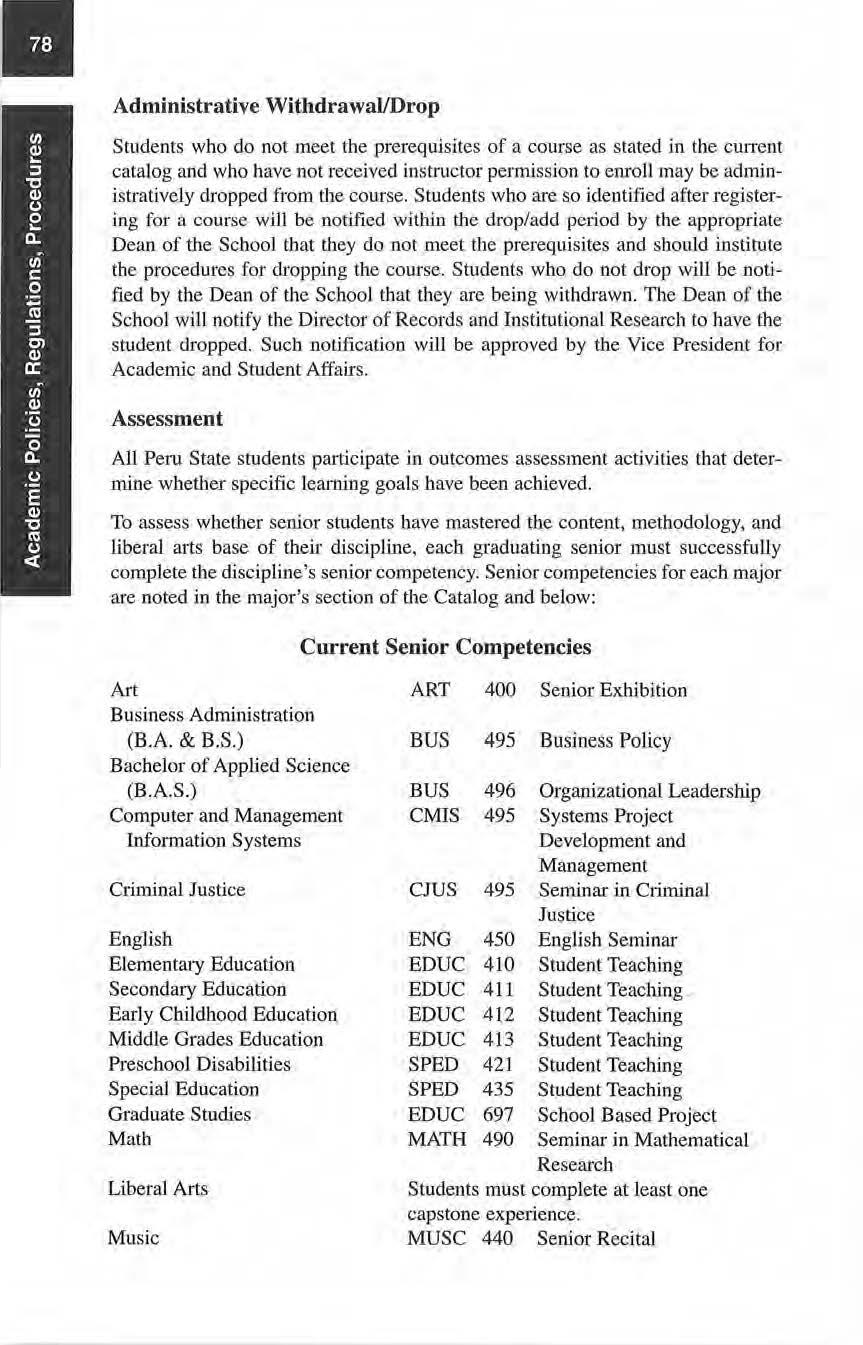
Art ART 400 Senior Exhibition Bus iness Administration (B. A. & B S.) BUS 495 Business Policy Bachelor of Applied Sc ience (B.A.S.) BUS 496 Organizat ional Leadership Compu ter and Manageme nt C MIS 495 Systems Project Information Systems .Deve lopment mid Management C ri minal Jus tice CJUS 495 Seminar in Criminal Ju s tic e E nglish ENG 450 Engli s h Sem in ar Elementary Education EDUC 4 10 S tudent Teaching Secondary Education EDUC 411 Student Teaching Earl y Childhood Education EDUC 412 Student Teaching Middle Grades Education EDUC 413 S tuden t Teaching Pre school Di sabilities SPED 421 Student Teaching Special Education SPED 435 Student Teac hin g Graduate Stu dies EDUC 697 School Based P roject M ath MATH 490 Sem ina r i n Mathematical R esearc h Liberal Arts Students must compl ete a t least o ne capstone expe rience Mus ic MUS C 440 Senior R ec ital
To assess student attitudes about the ColJege experience, each graduati ng se ni or participates in a personal exit interv iew conducted by Peru State College faculty and s taff. Periodically, a sample of a lumni is surveyed a bout their expeiiences while enro ll ed at Pem State College.
The results of all assessment activities are distri buted to appropriate personnel and governance units for recommendations about progra m and ser vice improvement.
Attendance and Scholastic Attitude
Students are expected to attend classes regu larly, to arrive punctually, and to complete al l assigned work. Attendance is a privilege and a responsibility re presented not only by the stu dent's investment, but also by a significant investm ent by the State of Nebraska.
When it is necessary for a student to miss class, he/she h as the respons ibility to notify his/her instructor in advance whenever possible Faculty members have the prerogative of allowing students to make up and complete work mi ssed during the absence.
Instructors have the ri ght to base a pottion of a student' s grade on attendance. In structors must present their grading practices a nd attendance po li c ies in writing to both stude n ts and their Dean durin g the firs t week of th e semester.
Whenever absences or other eleme nts oJ scholastic atti tude become detrimental (regardless of cause) to the student's standing in class and/or the s uccess of the class as a whole, the instrnctor may confer with tbe student. Th e instructor and the student may mutually ag ree that the registration in the cou rse should be w ithdrawn , or the instructor may issue the student a "scholas ti c alert." Future conferences for the same o r related reason s may result in the insuuctor withdrawing the stude nt from the class. If the stude nt req uests, the D ean of th e School may be asked to participate in the decision . The grade will be a "W " if the course withdrawal is pt.for to the last date to withdraw with a "W". An " F " will be recorded after this date.
Change of Advi sor
A student who wants to c hange advisors may obtain a Change of Advisor form from their Dean's office. Change of advisor is not official and complete until the ptevious advisor, the new advisor 's Dean, and the new advisor's signatures are ob tained. Th e previous Dean's office is responsible for transfer of student files to the new adv isor.
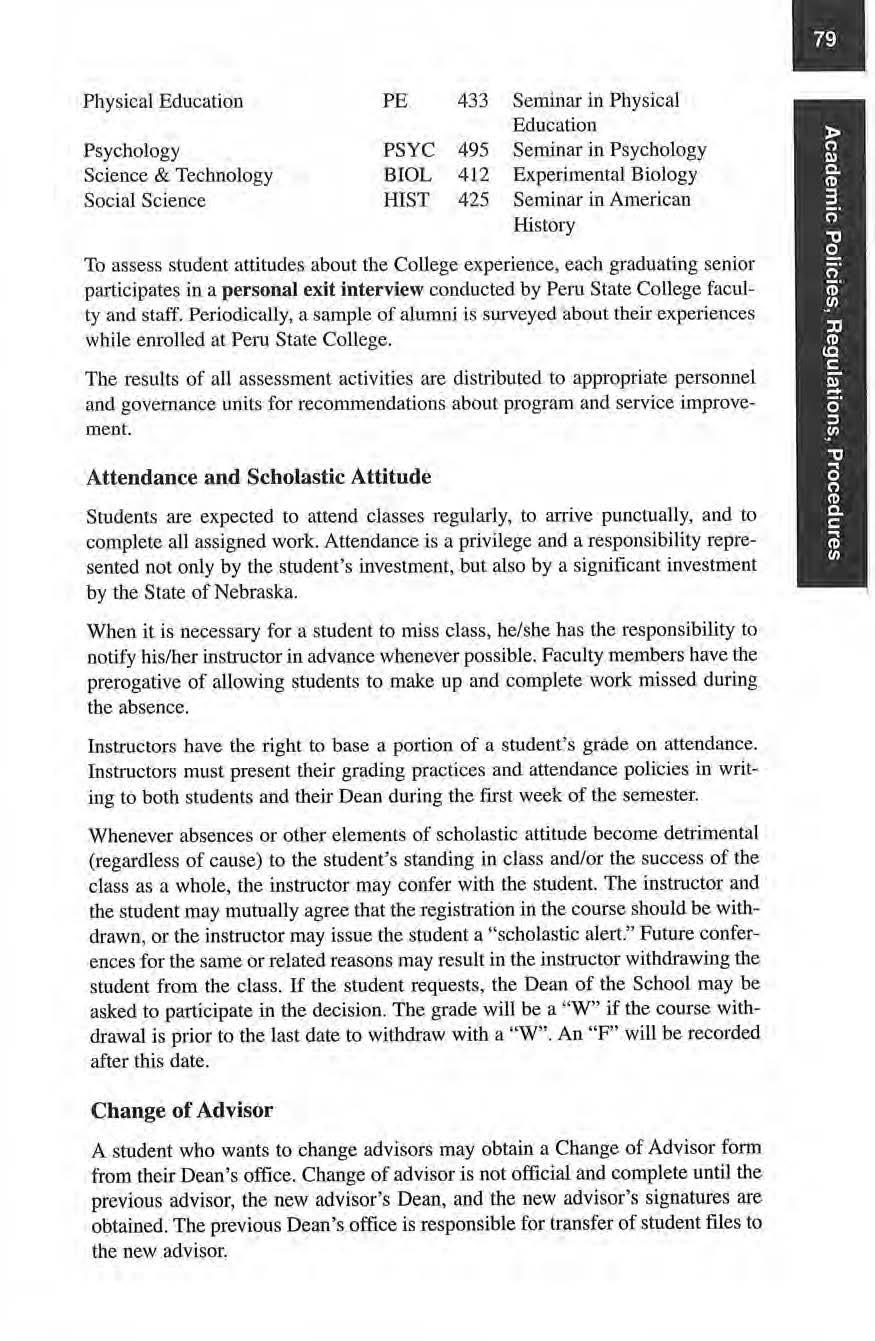
Physical Education Psychology Science & Technology Social Science PE P SYC BfOL HIST 433 Seminar ln Physical Edu cation 495 Seminar in Psychology 412 Experimental Biology 425 Seminar in American History
Change of Major
A student who wants to change his/her major or undecJared status must complete the Change of Major form available from the Dean's office or at the Director of Records and Instirutional Research office.
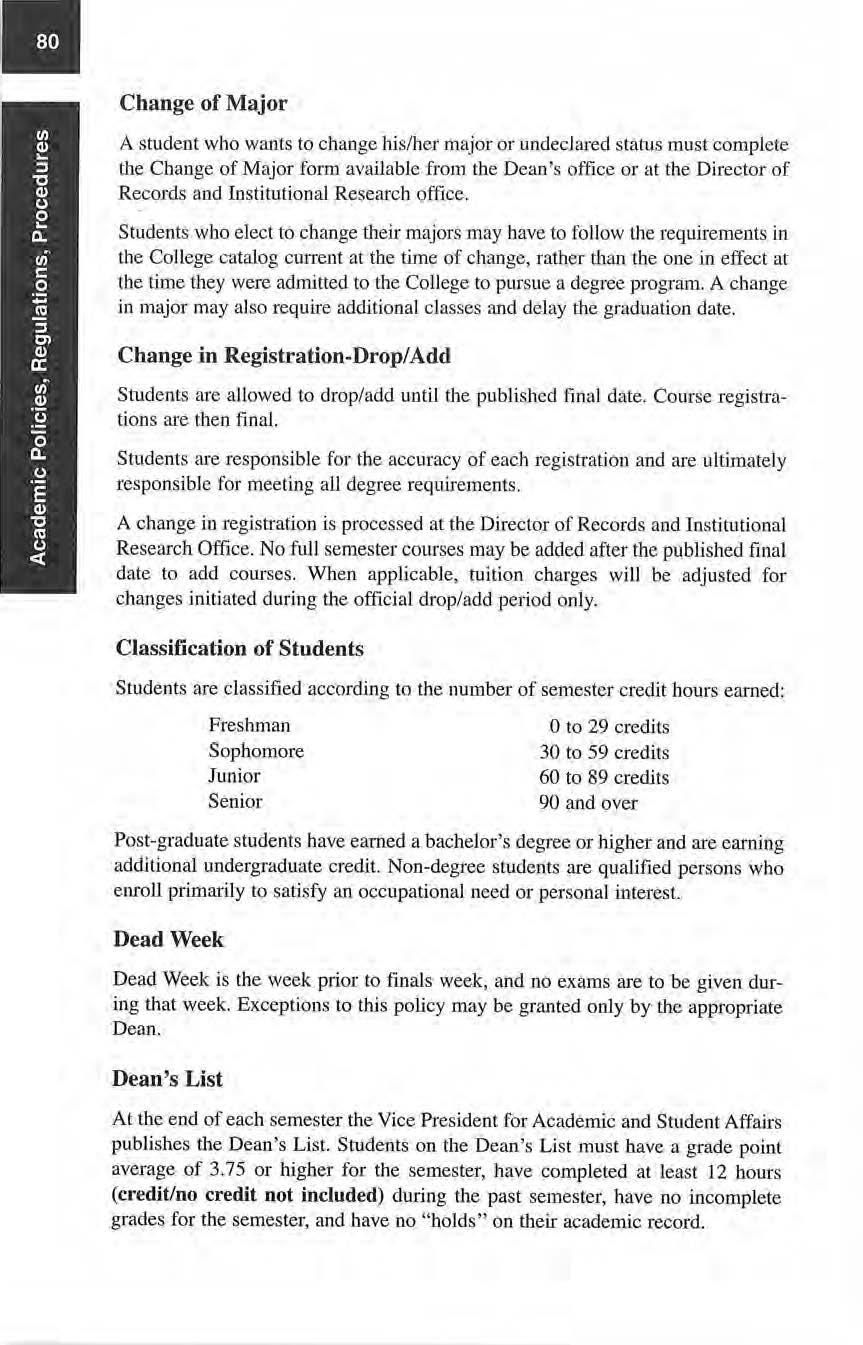
Students wbo elect to change their majors may have to follow the requirements in the College catalog curre11t at the time of change, rather than tbe one in effect at the time they were admitted to the College ro pursue a degree program. A change in major may also require additional classes and delay the graduation date.
Change in Registration-Drop/Add
Students are allowed to drop/add until the published final date. Course registrations are then ti naJ.
Stt1dents m·e responsible for the accuracy of each registration and are ultimately responsible for meeting all degree req11irements.
A change iu registration is processed at th e Director of Records and Institutional Research Office. No full semester courses may be added after the published final date to add cow·scs. When applicable, tuition charges will be adjusted for c h anges initiated during the official drop/add period only.
Class ification of Students
Studen ts are classified according to the number of semester credit hours earned:
Post-graduate students have earned a bachelor's degree or higher and are earning additional undergraduate credit. Non-degree studen.ts are qualified persons who e nroll primarily to satisfy an occupational need or personal interest.
Dead Week
Dead Week is the week prior to finals week, and no exams are to be given during that week. Exceptions to this policy may be granted only by the appropriate Dean.
Dean's List
At the end of each semester the Vice President fo r Academic and Student Affairs publishes the Dean's List. Students on the Dean's List must have a grade point average of 3 75 or higher fo r the semester, have completed at least 12 hours (cl'edit/no credit not included) during the past semester, have no incomplete grades for the semester, and have no "holds" on their academic record.
Freshma11 Sophomore Junior Senior 0
30 to 59 credits 60 to 89 credits 90 and over
to 29 credits
Final Exams
Final exams are scheduled the last week of the semester. Coaches of varsity athletic teams do not schedule regular games or events during this week. However, they may enter their teams in NAlA approved play-offs in which the College has declared an intention to participate if qualified. Smdents who participate in p l ayoff events during finals wee}( arc still subject to the attendance policies of their lnstnictors. Faculty may not schedule final exams fot individuals or courses at tjmes other than those establ is hed in the Finals Week sc hedule without the express consent of the appropriate Dean.
Full-time Student Status
Peru State ColJ.ege students who are enrolled for 12 cred i t hours or more during a semester are considered full-time students. However, the normal course load for a student who expects to complete a bach elor's degree witruneight (8) semesters (4 years) is 15-16 hours. The maximum load without special permission is 17 hours; the Dean of the Schoo l in w hich the student is: majoring may approve 18-2 1 credit hours provided the s tudent obta in ed a minimum 3.5 grade point average the previous semester. The maximum credit hour load is 21. Students must petition Faculty Senate for loads above 21 hou.rs. Class withdrawals subsequent to t he drop/add period are included in the credi t hour load.

Veterans and other eligib le persons attending Peru State College under the benefits of C hapter 34 and 35, Title 38, U .S .C.• as foll-time stu dents mu st be enrolJ.ed for at least 12 semester hours, or the equival ent.
Courses at Offutt Air Base, Southeast Community College, and other off-campus sites are schedu led on an ei ght-week cycle. For each eight-week sessi on, when students are not registered for student teaching, they may register for a m.aximum of 12 semester credit hours with Peru State College. The 12 hours include any independent or directed study courses.
Grading System
Letter Grade Suggested Percentage. Grade Points Equivalent A 90-100 4.0 B+. 85-89 3 .5 B 80-84 3 .0 C+ 75-79 2.5 C 70-74 2.0 D+ 65-69 l.5 D 60-64 1.0 F Bel ow 60 0.0 CR Credit NCR No Credit I Incomplete w Withdrawal
CR and NCR do not affect grade point average; CR is applicable to graduation hours
' T' (Incomplete ) work must be com pl e ted within the next semes ter or the reco rd will s how an "F". Work is to be completed whether the studen t is in attendance or not. Students who have filed an appl.i ca ti o n for graduation are not eligible for a grade of In complete
G raduation Honors
Gradu ation ho nors are ~oferred on bache lor's degree ca ndidate s who have earne d a minimum of -6tf Pe ru State College semester credit hours in graded co urses (CR grades excluded). Th ese hours must be resident credit hours. Grades and credits earned at other col leges a nd universities do not apply toward graduation honors from Peru State Co llege.

3.90 - 4.00
3.75 - 3.89
3.50 - 3 .74
Overload
(See Full-Time Student Status.)
Petition
(See Academi c Appeals .)
Probation
(See Academic Probation.)
Selecting a Major
Summa Cum L aude
M agna Cum L aude Cum Laude
Students who app ly for admission to the Coll ege will indicate on the Application for Admission the major area of study they intend to pursue. Individuals who are uns ure of a major shou ld indicate '' Und eclared" on the application form
Suspension
(See Academic Suspension.)
Tran scripts
A fee is charged for each transcript (including the firs t) . Transcripts are not issued to s tudents w ho have financial ob ligat ions to the C o ll ege or ho lds o n their academic records . Transcript reques ts are made in writin g to the Director o f Records and Institutional Re search.
Once a s tudent graduates or di sco ntinues attendance at P eru S tate College. s ubsequent College credi ts do not beco me a part of his/her Peru State College transcript. This doe s not apply to an active s tudent 's credential file in the Credentialing Office in the School of Education and Graduate Studies.
Waiver (See Academic Appeal.)

Withdrawal from C lass
A student who wishes to withdraw from a c lass must notify his/her adv i sor, the course instructor, aud officia lly withdraw through the Office of R ecords and Institutional Research. Athletes must notify their head coach of their intent to withdraw A student who withdtaws after tbc last day to drop/add classes , the end of the first week of class. receives a "W." After one week past the term mid-point date, a student who initiatc.s a withdrawal receives an "F" for the class.
Withdrawa l from the College
A student who w ishes to withdraw from the College must initi ate his/her withdrawal with the Director of the Academic Resource Center and complete all the appropriate paperwork. Proportional tuition refunds are made in accordance with the refund schedule (see the Expenses and Financial Aid section) to students who officially withdraw from the College.
Prior to one week past the mid-point of the term withdrawal course grades w.ill be "W." After one week past the mid-poi nt of the term, the Vice President for Academic and Student Affairs will determine if unusual or extenuating circumstances surround a withdrawal request and recommend either Withdrawal (W) or Failing (F) grades for all coursework. Poor academic performance is not suffic ie nt reason to receive "W" grades.
GENERAL STUDIES
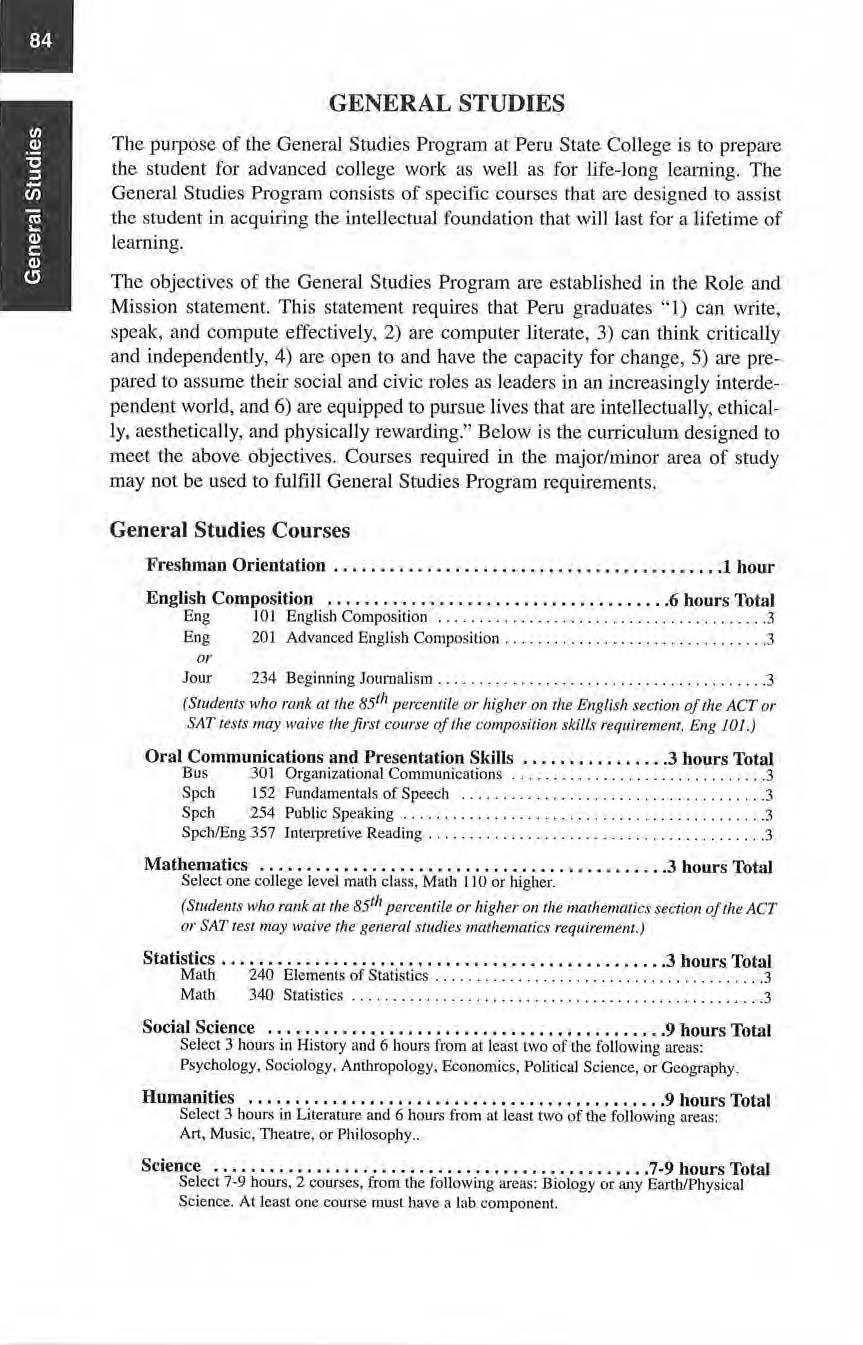
The purpose of the General Studies Program at Peru State College is to prepare the student for advanced college work as weJJ. as for life-long learning. The General Studies Program consists of specific courses rhat are designed to assist the student in acquiring the i_ntellectuaJ foundation that will last for a lifetime of learning.
The object ives of the General Studies Program are es tabli shed in the Role and Mission sta tement. This statement requires that Peru graduates "I) can write, speak, and compute effectjvely. 2) are computer Literate, 3) can think critically and independently, 4) are ope n to and have the capacity for change, 5) are prepared to assume their social and civic roles as leaders i n an increasingly interdependent world, and 6) are equipped to pursue lives that are intellectually, et hi cally, aest hetica lly, and physically rewarding." Below is the curriculum designed to meet the above objectives. Courses required in the major/minor area of study may not be used to fulfill General Studies Program requirements.
who rank at the 851h /Htn·entile or higher 011 the English secrion of tlte ACT or SAT rests 111qy waive //re first cowwe o/tlte i·11111posi/io11 skills requiremem, E11g 101.)
Select one college l~vel math cl.iss, Matb 110 or higher.
(S111rle11u who raf!k at the 85th perce111i/e or higher 011 the mathemmics section of rhe ACT or SAT rest may waive the general s/1/dies nu//hematics req11ire111e111.)
Select 3 hours in History an d 6 hours from at least two of the following ureas:
Select 3 hours in Literature and 6 hours from at lenst two •~f the following areas:
or l'hilosophy
Select 7-9 hours, 2 cour~es, from lhe following ureus: Biology or any Earth/Physical Science. At l east one course must have a lab component.
General Stud ies Co urses Fresh man Orientation I hour E ng lis h Composition ........................... .. ....... . 6 hours Total Eng IOI Briglish Compos iti on , ~ - 3 Eng 201 Advanced E nglish Compositi on .• 3 or Jour 234 .Beginning Journalism ...•......•....... ... , ...... , . . , . , , . ....3 (Srude111s
Oral Co mmunications and Presentation Sk ills .3 hours Total Bus 301 Organiwtional Communication s , •. 3 Speh 152 Fundamentals of Speech •.. 3 Speh 254 Public Speaking • , ••.. .•. 3 Spell/Eng 357 lnteq,retive Reading . .. ...... ... . .. . . . ..... ... ... . . ..........3 Mathematics .3 hours Total
Statistics .3 hours TotaJ Math 240 Elements of Statistics 3 Math 340 Statistics •.. , , 3 Social Science .9 hours Total
Psychology, Sociology, A.nlhropology,
Political Science,
Geography Humanities . , ... , . .. . .. .. .. , ....... . .................. . . 9 hours Total
Art, Music,
Scien ce
, .7-9 hours Total
Economics,
or
Theatre,
,
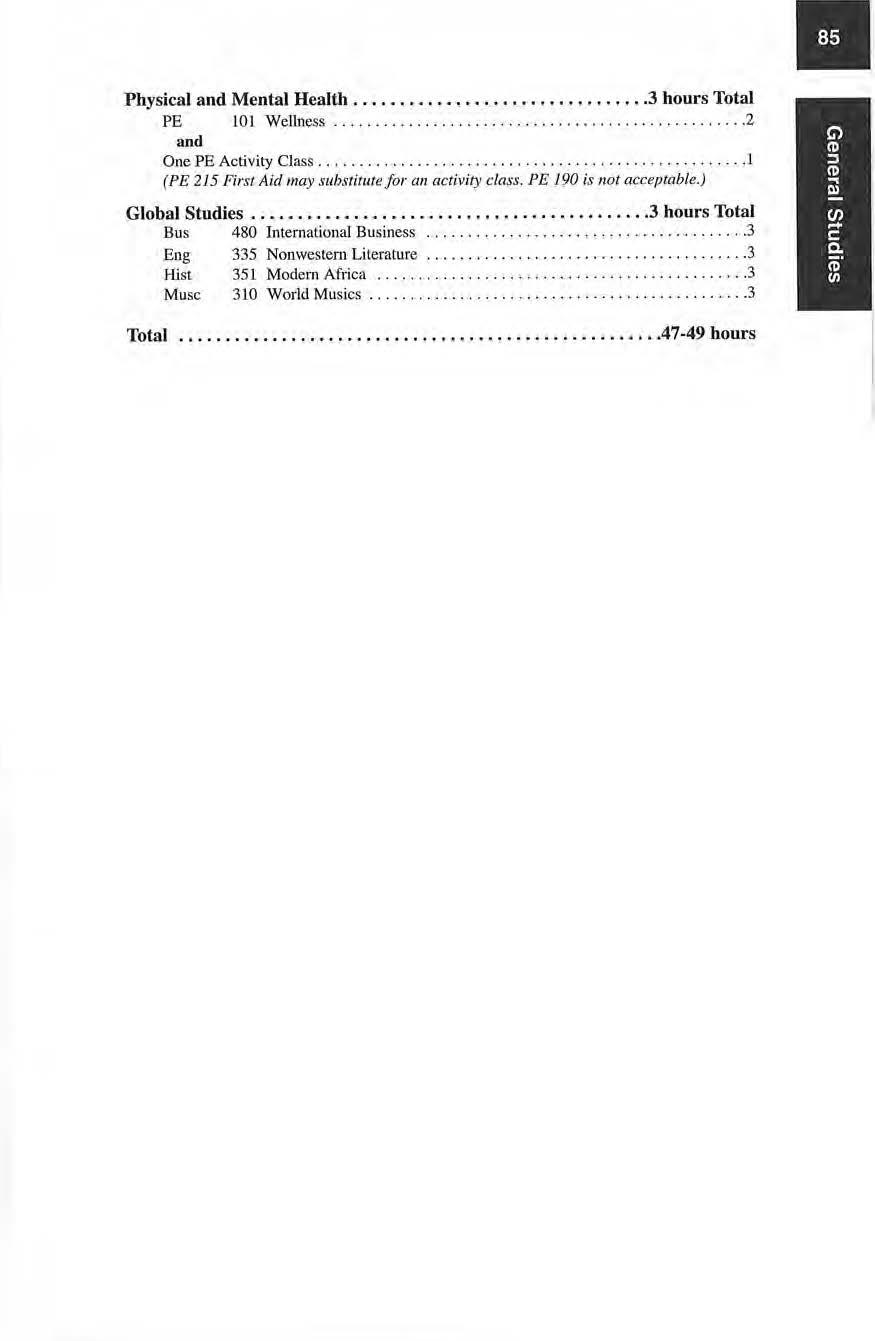
Physical a nd Me ntal Health .3 hours Total PE 10 I Wellness .• , , 2 and O ne PE Activity Class .......... . ................... .. ........ •. ...... . .. . I (PE 2 15 First A id may su/mlrutefor an activity class PE /90 is 1101 acceptable.) G lobal Studies . 3 hours Total Bus 4 80 International Business . ........ ... ..... . . . . .......... . .. . ....3 Eng 335 Nonwestem Litera ture •..•. • '.l Hist 351 Modern Africa , • , , .3 Muse 310 World Mus ics , ..•.•. .3 Total , . 47-49 hours
PERSONAL CURRICULUM GUIDE
Below is an unofficial worksheet that permits th e stud ent to inve ntory General Studies and major co urses by grade received, te rm completed, and number of credit hours earn ed.
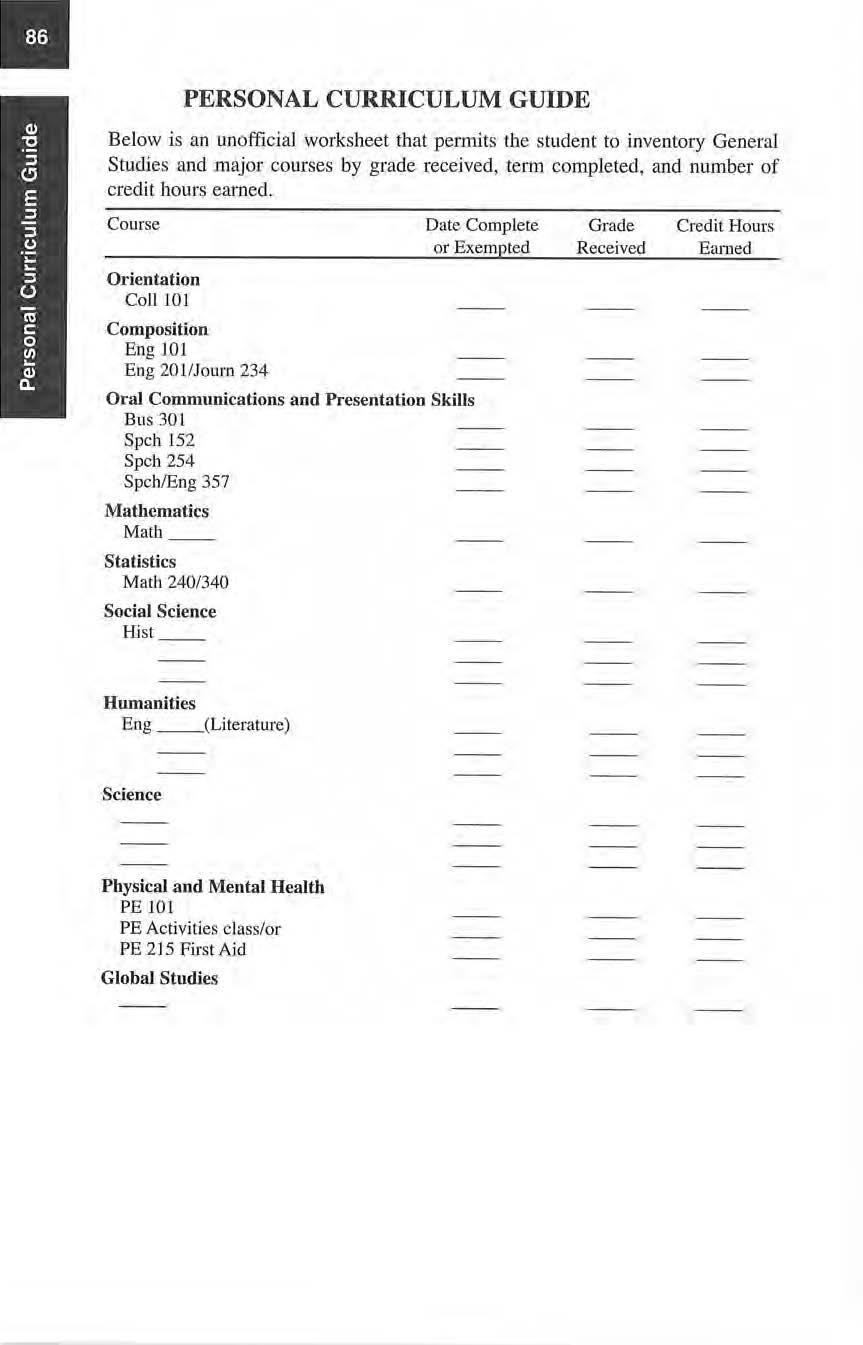
Course
Orientation
Coll 101
Composition
E ng JO!
En g 20 1/ Jo urn 234
Date Complete or Exempted
Oral Communications and Presentation Skills
Bu s 30 1
Speh 152
Speh 254
Speh/Eng 357
Mathematics
Math
Statistics
Math 240/340
Social Science
Hi st
Humanities Eng __( Literature)
Science
Physical a nd Mental Health
PE 101
PE Activities class/or
PE 2 15 First Aid
G lo bal Studies
Grade Credit Hours R eceived Earned
·EGREE PROGRAMS
Peru State College offers twelve undergraduate majors with 45 options, 26 endorsements and 11 minors within the major stn1cture.
DEGREE MAJOR
SCHOOL OF ARTS AND SC IENCES
BS/BA Art
BS/BA
BA
BS/BA
BS/BA
Engllsh Liberal Arts
MnU1ematics
Mu~ic
OPTION
Arl (K- 12)
(Jvlinor in Art)
Fine Arts
Gr&phic Desig11
English
(Minot in English)
(Mlnor in Speh/Orama)
Language Arts
Liberal Ar\.s
Mathematics (Minor in Mathematics)
Community Music a11d
Priva1e Studio
Music Educalion (K-6)
M usic Education (K- 12)
Music Marketing
Music Perfm:mance
(Minor in Music)
BS/BA
Natural Science
Biologitvd) Science
Biology
tMinor in Biology)
Chemistry (Minor in Chemistry)
Natural Science
Nuclear Tec1molqgy
Physical Science
Wildlife Ecology
Social Scieoce
SCHOOL OF E DUCATION AND GRADUATE STUD IES
BS/BA Education
History (Minor in Hi story)
Social Science
{Mlnor in Social Sci)
Early Childhood
Elementary
Secondary
Special Education
Elem or Sec
Middle Grades
Preschool Ot$~bili1ies
BS/BA Physical Education
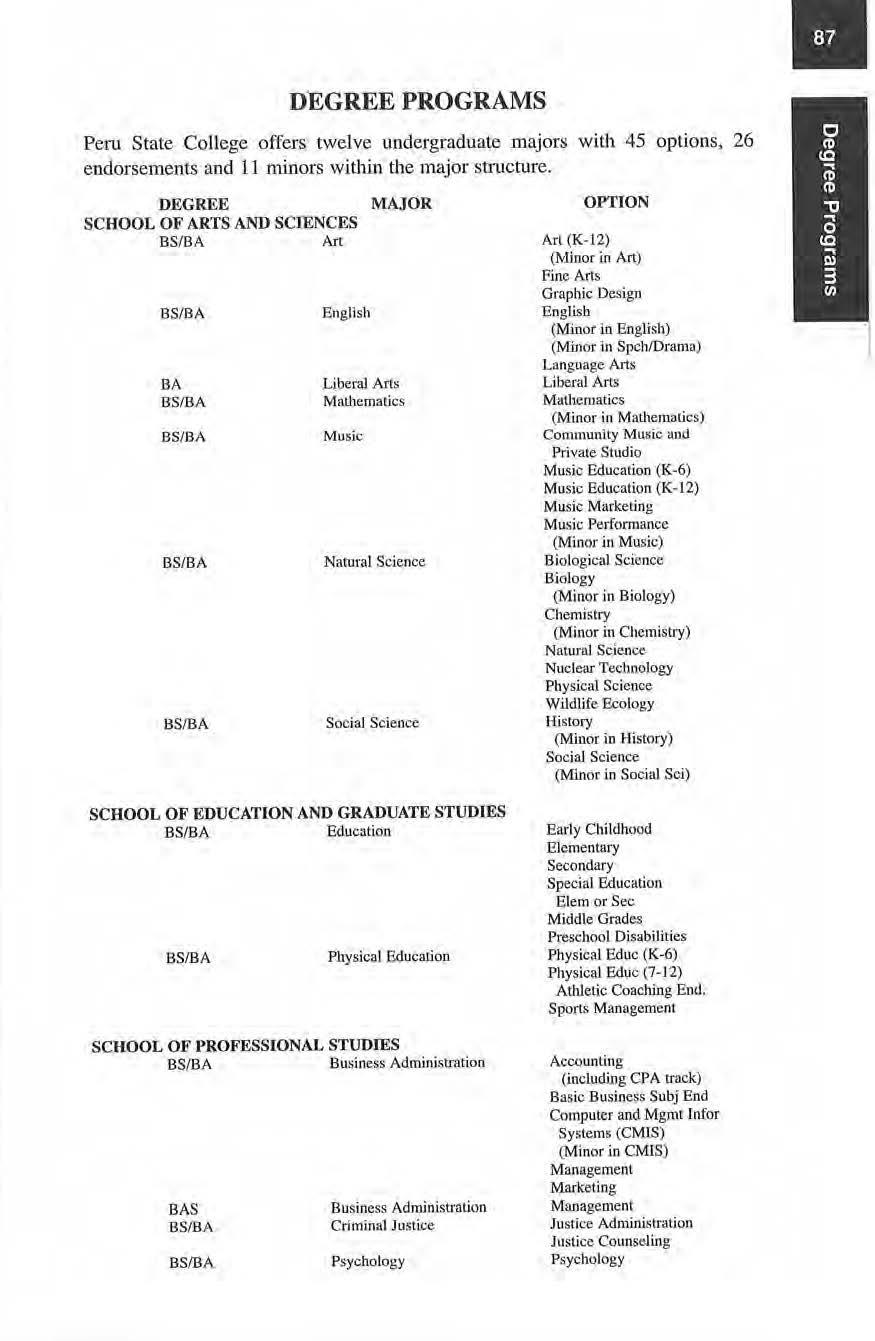
SCHOOL OF PROFESSIONAL STUDIES
BS/BA
Business Administrntion
Physical Educ (K-6)
Physical Educ (7- 12)
Athletic Coaching End.
Sports Management
Acwunting (inducting CPA lrllck)
Basic Busine~s Suhj End
Computer andMgnir lnfor System~ (C MlS)
(Minor in CMlS)
Management
BAS ES/BA
BS/BA
Business Administration
Crftninal Ju ti ce
Psychology
Marketing Management
Juslice Adminislration
Justice Counst11ing
Psychology
n
CERTIFICATE PROGRAMS
SCHOOL OF ARTS AND SCIENCES
Certificate Writing for P u blication
SCHOOL OF EDUCATION AND GRADUATE STUDlES
Certificate Certificate C lussroom Behavior and Management
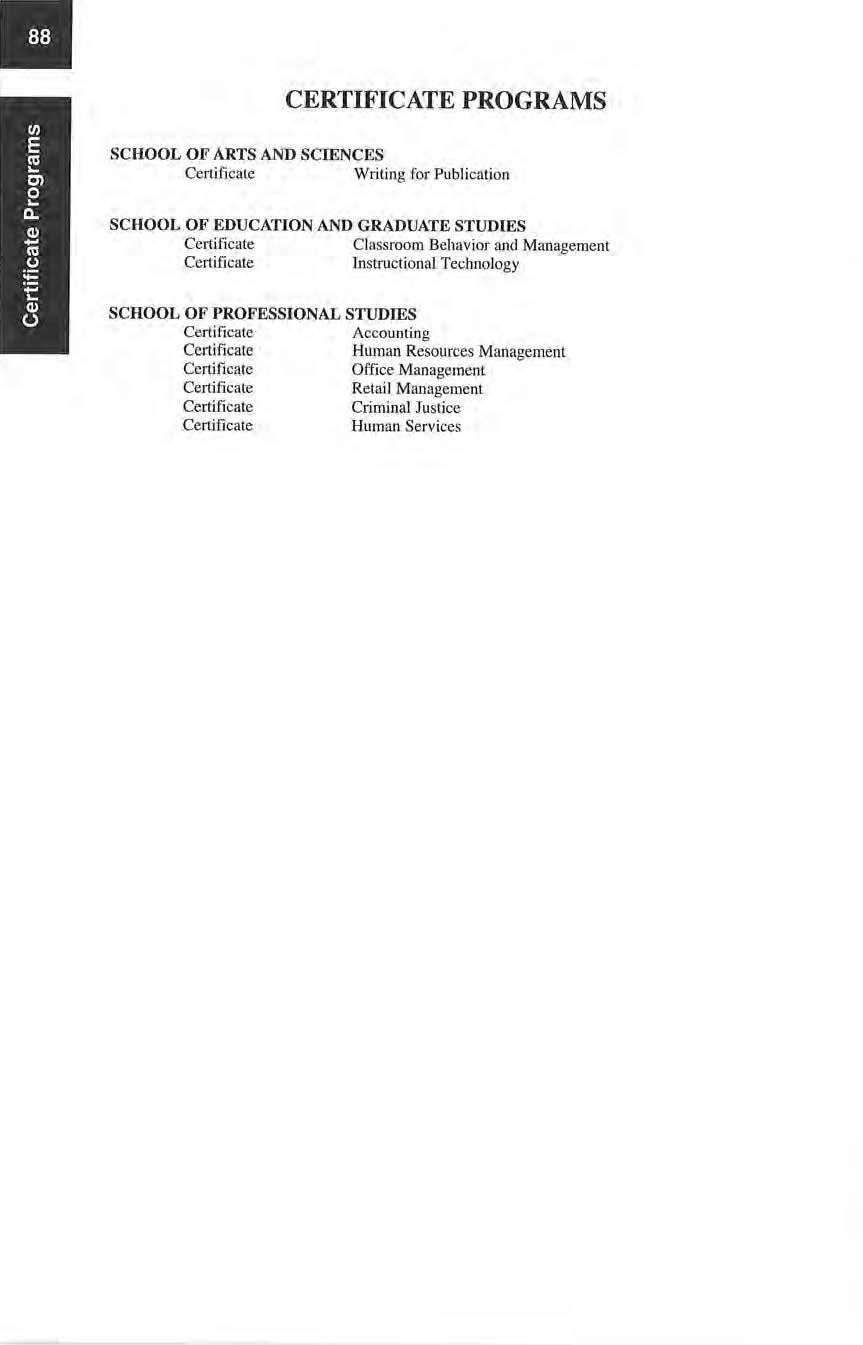
Instructional Technology
SCHOOL OF PROFESSIONAL STUDJES
Certifi<.-a te Cc1tificate
Ccrtificaie Certificate
Certifica te
Certifica te
Accoun ti ng
Humai1 Resources Managemen t
Office M anageme nt
Retail Management
Criminal Justice
Human Services
.
HONORS PROGRAM
The purpose of the Honors Program is to challenge academically gifted students with new ideas and perspectives. Honors experiences are ioteredisciplinary in approach and are desig ned to faci litate the development of advanced capabilities. Students apply to the H.onors Program through the Coordinator. Admiss ion is based on the following criteria:
• 24 ACT composite, or

• A high school c umulative grade point average of 3.0 and a ranking in the top one-fourth of high school graduating clas s, or
• A cumulative grade point average of 3.3 for at lest 12 semester hours at Peru State or another coll ege, or
• Permission of the H onors Program Committee base d on a written petition by a student who does 11ot meet the preceding requirements.
Students who earn a Presidential, Board of Trustee, or Student Opp01tuoity Scholars hip (Non- Resident Scholarship) must successfully pa1ticipate in the H011ors Program.
To be considered Hon ors Program graduates, students must have maintained at least a 3.32 cumulative grade point average and completed the program 's requ irements. Students who successfully complete the Honors Program are designated as Honors Program graduates. They a re recognized at Commencement and on their permanent college records ,
SCHOOL OF ARTS AND SCIENCES
Stephen Sylvester, D.A. D ean of Arts and Sciences Professor of History
Ken Anderson, M.F.A. Professor ofArt
Mic haeJ Barger, Ph.D. Assistant Professo r of Biology
William Clemente, Ph.D Professor of Engli sh
Richard Clopton, Ph.D. Associate Professor of Biology
Sara Crook, Ph.D. Professor of History/ Political Science
Spencer Davis, Ph.D. Professor of History/Social Science
Druann Durbin , Ph.D. Ass is tant Profe ssor of English
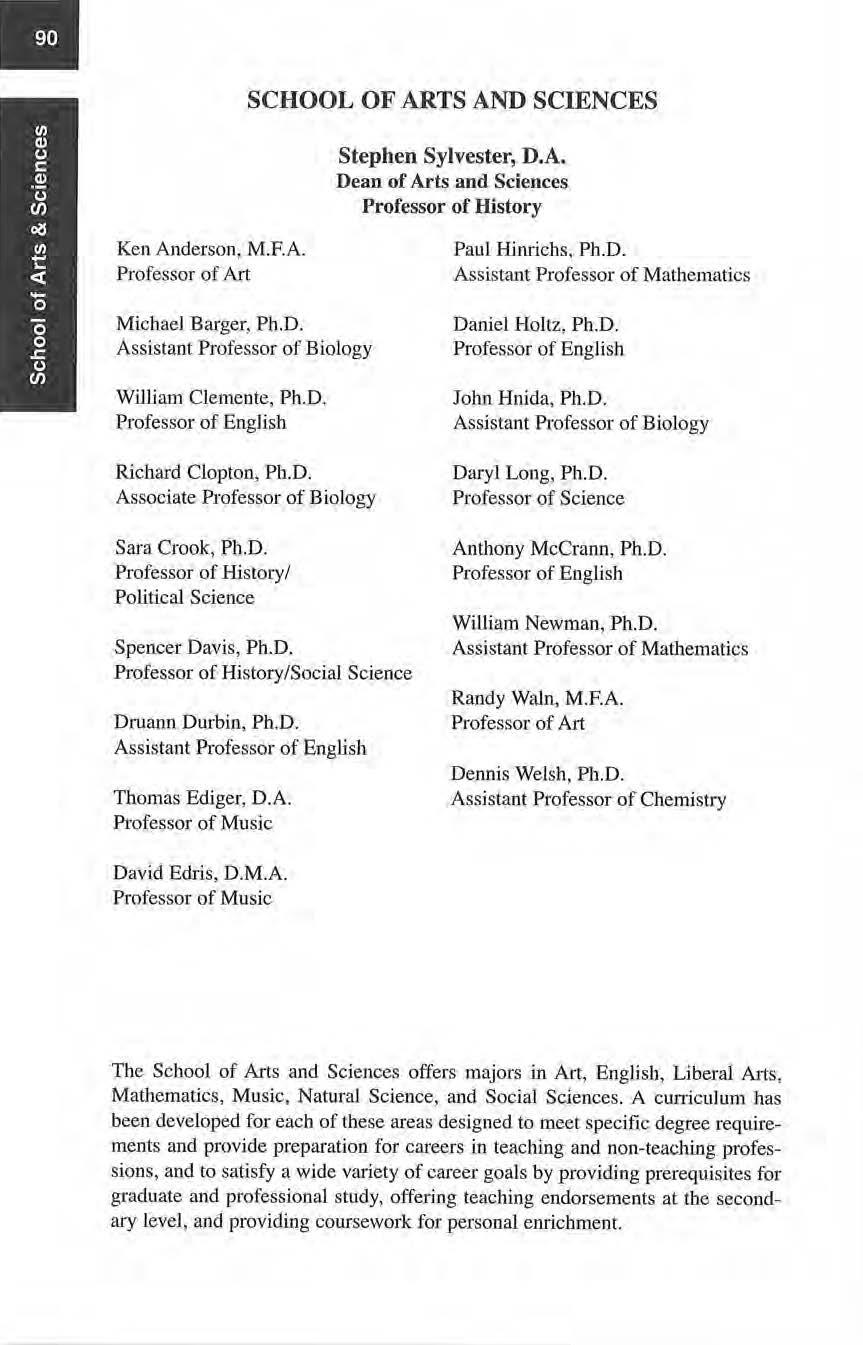
Thomas Ediger, D.A. Professor of Music
David Edris, D.M.A. Professor of Music
Paul Hinrichs, Ph.D. Assistant Professor of Mathematics
Daniel H oltz, Ph.D. Professor of English
John Hnida, Ph.D. Assistant Professor of Biology
Daryl Long, Ph.D. Professor of Science
Anthony McCrann, Ph.D. Professor of English
William Newman , Ph.D. Assistant Professor of Mathematics
Randy Waln, M.F.A. Professor of Art
Dennis Welsh , Ph.D. Assistant Professor of Chemistry
The School of Arts and Sciences offers majors in Art, English, Liberal Alts, Mathematics, Music , Natural Science, and Social Sciences. A cufficulum has been d e veloped for each of these areas desig ned to meet specific degree requirements and provide preparation for careers in teaching and non-teaching professions, and to satisfy a wide variety of career goals by providing prerequis ites for grad uate and professional study, offerin g teaching endorsements at the secondary le vel , and providing coursework for personal enrichment.
The English major includes English or Language Arts . Natural Science major includes Biology, Biological Science, Wildlife Ecology, Chemistry, Natural Science, Nuclear Technology, and Physical Science Social Science major includes History and the broader area of Social Sc iences. Majors in the visual and performing arts areas provide various teaching and non-teaching options in Art and Music.

Teacher education programs offer endorsements in Art, Biology, Chemistry, Hi story, Language Arts, English, Vocal/Instrumental Music Education, Elementary Vocal Music Education, Natural Science, Mathematics, Physical Science, and the Social Sciences.
A number of twelve semester hour certificate programs of study are availab le. Topics include W riti ng fo r Publication.
ART MAJOR
Art Major (K-12 Field Endorsement, Fi ne Arts Option, or Graphic Design Option)
K-12 FieJd E ndorsement*

300 Pottery (up to nine (9) boms in addjtion to required (3) hours)
310 Sculpture (up to nine (9) hours in addition to required (3) hours)
311 Painting (up to nine (9) hours in addition to required (3) hours)
350 Studio Activities (u p to twelve (12) hours limited to three (3) hours per semester)
Note: Students preparing to teach K- 12 Art a.re required to take the Education Core a nd the Secondary Education Option. The practicum and student teachi11g mu st include ex.perieoccs with both e lementaiy aod secondary students.
Art
Art
Drawing
Art
Art
Art
Art
Watercolor
Art
Art
Art
Art
Ari
Art
Ari
Senior
Core
101
I
102 Drawing II
203 2 -D Design
204 3-D Design
210
Painting
221 Printing Processes
311 Painting
314 Digital Imaging
317 Ali H istory I
318 Ar t History TI
325 Figure Drawing
400
Exhibition/Portfolio
Art Core Required Courses Art 206 Art Appreciation Art 3 00 Pottery Art 308 Art Exploration Art 310 Sculpture Art Electives (select eleven (11) h o urs from the following) Hours 3 3 3 3 3 3 3 3 3 3 3 l34 Hours 34 3 3 3 3 12 Art
Art
Art
Art
Special Topi cs in
(1
11 57
Art
498
Art
to 4 hours)
Fine Arts Option**
Art Electives (select fourteen (14) hours from th e following)

in addition to required 3 hours)
required 3
Courses Art 206 Art Appreciation Art 300 Pottery Art 310 Sculpture
Art 300 Pottery
Art 310 Sculpture (in
hours) Art 311 Painting (in addition to required 3 hours) Art 350 Studio Activities Art 498 Spec ial Topics in Art (1 to 4 hours) Hours 34 3 3 3 9 14 57
Art Core Required
(
addition to
**Non,Teacbing option . Prospective teachers must take the Field Endorsement
Required Courses Art 112 Introdu ction to Graphic Design Att 213 Digital D esign Foundation Art 215 Type and Design Concepts Alt 3 13 Digital Illustration A1t 3 15 Digital Layout Alt 320 De sign for the Internet Art 321 Animation for the Web Total for Graphic Design Opt ion Hours 34 3 3 3 3 3 3 3 21 55
Graphic Design Option Art Core
Art Minor
Select nine (9) hours from the following:

Art
Drawing
Art
Drawing
Art
De sign Art 204 3 -D D esign Art 3 17 Art History I or Art 3 18 Art His to ry II Select nine (9) hours from the following cou rses: A.it 300 Pottery Art 310 Sculpture Art 311 Painting Art 325 Figure Drawing Total for Art Minor 3 3 3 3 9 3 3 3 3 3 3 9 21
101
I
102
lI
203 2-D
ENGLISH MAJOR
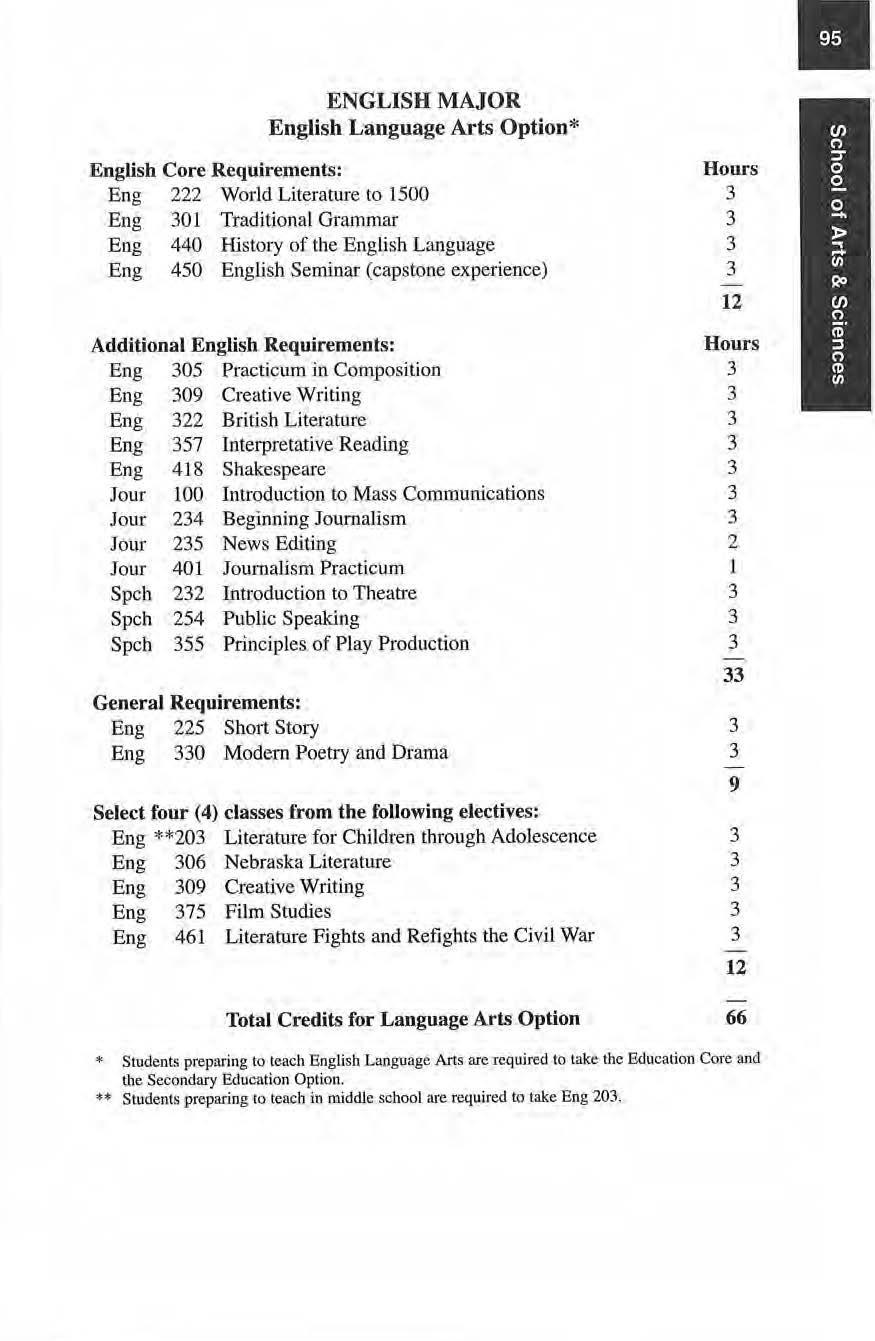
E nglish Language Arts Option*
* Students preparing to teach Engl ish Language Arts are required to take the Education Core and the Secondary Education Option.
•• Students preparing to teach in middle school are required to take Eng 203,
English Core Requirements: Eng 222 World Literatur e to 1500 Eng 301 Traditio na l Grammar Eng 440 History of the Eng lish Language Eng 450 English Seminar (capstone experience) Additional E n glish R equirements: Eng 305 Practic um in Composition Eng 309 Creative Writing Eng 322 British Literature Eng 357 I nterpretative Reading E n g 418 Shakespeare Jour 100 I ntroduction to Mass Communicatio ns Jour 234 Beginning Journalism Jo ur 235 News Editing Jour 401 Journalism Practicum Speh 232 Introduction to Theatre Speh 254 Public Speaking Speh 355 Principles of Pl ay Production General Re quirements: Eng 225 Short Story Eng 330 Mode rn Poetry and Drama Select four (4) classes
e lectives: Eng **203 Li terature fo r Chil dren through Adolescence Eng 306 Nebra ska Literature Eng 309 Creative Writing Eng 375 Film Studies Eng 461 Literature F ights and Refights the Civil War Total C redits for Language A rts Option Hours 3 3 3 3 12 Hours 3 3 3 3 3 3 3 2 1 3 3 3 33 3 3 9 3 3 3 3 3 12 66
from the following
English Option (7-12 Subject Endorsement•)

English Core Requirements : Eng 222 World Literature to 1500 Eng 301 Traditional Grammar Eng 440 Hi story of the Engl is h Language Eng 450 English Seminar (capstone expe rie nce) Additiona l English Requ irements: Hours 3 3 3 3 12 Eng 305 Practicum in Composition 3 Eng 322 British Literat ure 3 Eng 326 American Literaturn 3 Eng 357 lnterpretative Read in g 3 Jolli· 234 Beginni ng Journalism 3 18 Select one (1) class from the following genre courses: Eng 225 Short Story 3 Eng 307 Seminar in the Modern Novel 3 Eng 330 Modem Poetry and Drama 3 3 Select one (1) class from the following e.lectives: Eng **203 Li terature for Children through Adolesce nce 3 Eng 306 Nebraska Literature 3 Eng 309 Creative Writing 3 Eng 375 Film Studies 3 Eng 461 Literature Fights and R efig hts the Civil War 3 3 Tota l for English Option (7-12 S u bj ect E nd orsement) 36 ,. Students preparing to Leqch English are req uired to take the Bducution Core and the Secondnt)' Educntion Option. ** Stud ents prep,1rin g to te.1ch iu middle sc hool are required 10 take Eng 203.

Core Requirements English Option
Eng 222 World Literatw-e to 1500 Eng 30 I Traditional Grammar Eng 440 History of the English Language Eng 450 English Seminar (capstone experience) Additional English Requirements: Eng 322 British Literature Eng 326 American Literature Eng 418 Shakespeare Jour 234 Beginning Journalism General Requirements: Eng 225 Short Story Eng 330 Modern Poetry and Drama Eng 307 Seminar in the Modern Novel Select live
classes
Ule
electives: Eng 203 Literature for ChiJdren through Adolescence Eng 306 Nebraska Literature Eng 309 Creative Writing Eng 357 Interpretative R eading Eng 375 Film Studies Eng 461 Literat1,1re Fights and Ref(ghts the Civil War Total for Non-Teaching English Option Hours 3 3 3 3 12 3 3 3 3 12 3 3 3 9 3 3 3 3 3 3 15 48
English
(Non-Teachi ng)
(5)
from
following
English Minor
following e lectives:
The Certificate of Achievement in Writing for Publication is designed for individuals who want to improve their writi.ng skills a nd learn how to prepare manuscripts and other narrative material for publication. The courses in the program are offered online in eight (8) week i ncrements, two each semester.
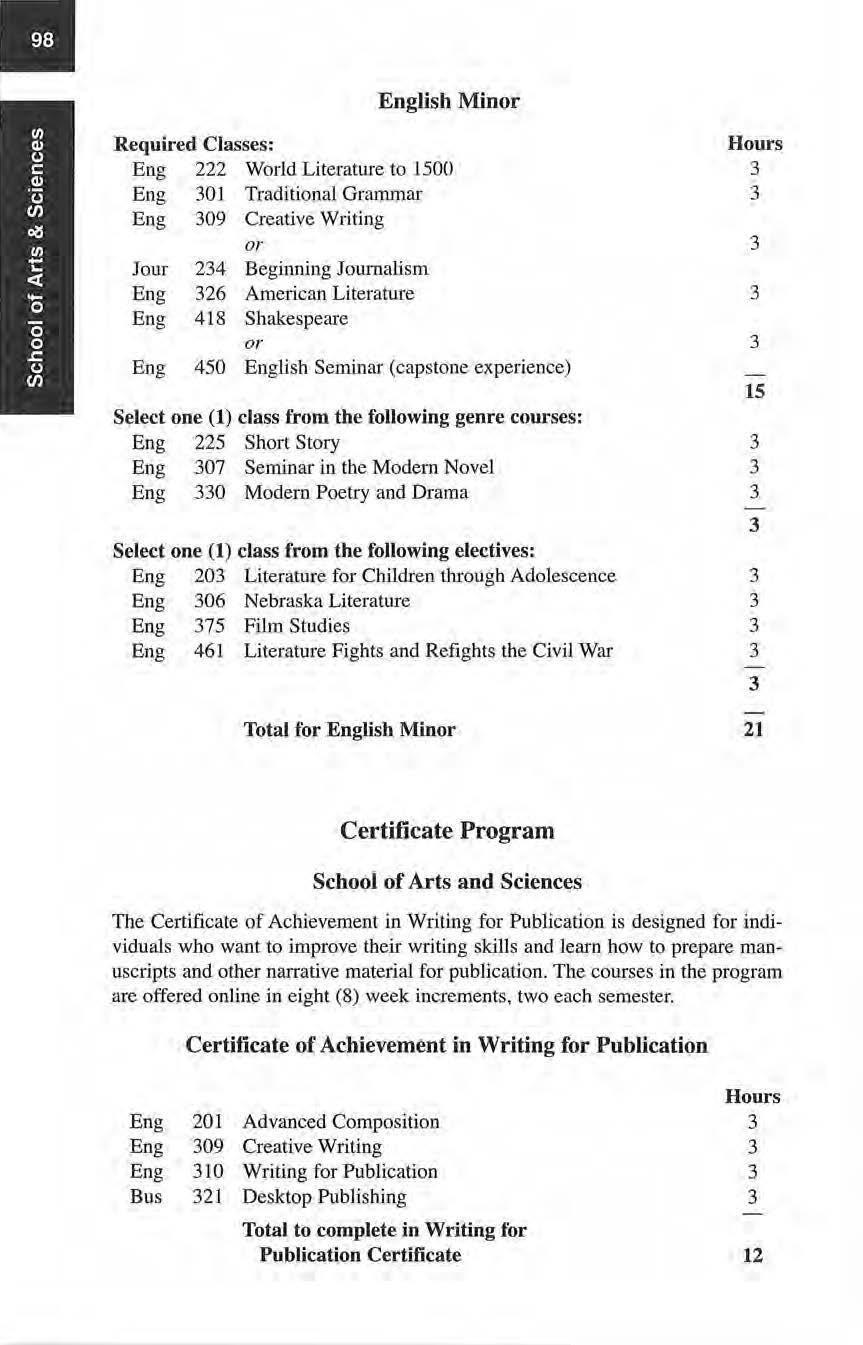
Required C lasses: Eng 222 World Literatttre to 1500 Eng 301 Traditional Grammar Eng 309 Creative Writing or Jour 234 Beginning Journalism Eng 326 American Literature Eng 418 Shakespeare or Eng 450 English Sem.inar (capstone experience)
genre courses: Eng 225 Short Story Eng 307 Seminar i.n the Modern Novel Eng 330 Modern Poetry and Drama
Select one (1) class from th e following
Eng 203 Literature for Children
Adolescence Eng 306 Nebraska Literature Eng 375 Film Studies Eng 461 Literature Fights and Refights the Civil War Total for English Minor Certificate Program Sc hool of Arts and Sciences Hours 3 3 3 3 3 15 3 3 3 3 3 3 3 3 3 21
Select one ( I ) class from the
through
Certificate of Achievement in Writing for Publication Eng 201 Advanced Composition Eng 309 Creative Writing Eng 310 Writing for Pub l ication Bus 321 D esktop Publishing Tota l to complete in Writing for Publicat io n Certificate Hours 3 3 3 3 12
LIBERAL ARTS MAJOR
The Liberal Arts major at Peru State College will build on the broad general studies foundation at the college or on a simjlar found ation in lhe previous experience of transfer students. The degree is deilicated to developing intellectually well-rounded individuals who wish to attain a broad-based undergraduate education It allows s ignificant t1exibility in concentrated areas and allows students to explore multiple areas of interest.
Students must complete Peru State College general studies requirements or Teceive transfer creilit for general studies by earning an associates degree (AA or AS, but not AAS) as described by the Nebraska State Articulation Agreement with Community Colleges. No more than 66 creilit hours can be transferred from community colleges.
General Studies 47 - 49 credit hours

Additional requirements for the Liberal Arts major fall into three categories, the Liberal Arts Core, Concentration Fields, and Open Electives. Within t hese categories, students must complete at least 40 credit hours of courses that number 300 or above. Students must complete at least one capstone exper ience.
Liberal Arts Core:
(These courses may not be used to satisfy general studies requirements and may not be counted to satisfy concentration requiremen ts) 15 c redit hours
IDSTORY - SEE SOCIAL SCIENCE MAJOR
Hours Eng 202 Appmciation of Literalure 3 Art 206 Art Appreciation or Muse 211 Music Appreciation 3 1-:lisl 114 American History after 1865 o r Hist 202 World Civilization after 1500 3 Psci 201 American Government or Phil 201 Introduction to Philosophy 3 Natural or Earth Science Elective 3 Required Liberal Arts C ore: 15
Co ncentration Fields:
1\venty-one (21) credit hours from each of two of the following concentration areas, (Courses taken to satisfy genera l st udi es o r the li beral a r ts core do not co unt. ) At least one capstone cow-sc is required.
Ali Mu si c
En g li s h / J o urnalism
His tory/ Politica l Science
Sociology, Psychology, Anthropol ogy
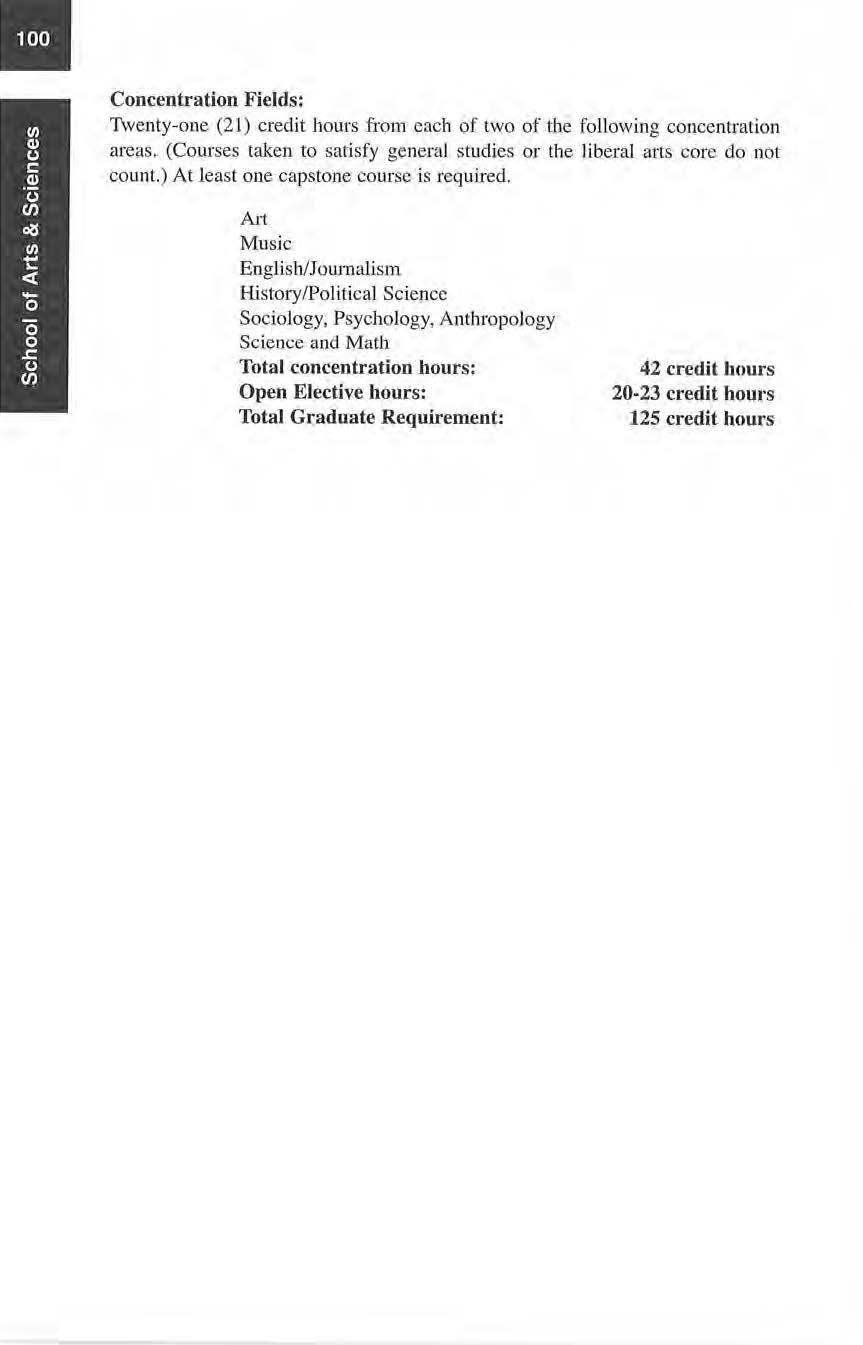
Sc ience and Math
Total concentration hou rs:
Open E l ec tive hours:
Total Graduate Requirement:
42 cred it hours
20-23 credit hou•·s
125 credit hou rs
MATHEMATICS MAJOR
The Math c mali cs M ajo r has two op t ions. a Muthemati cs option a nd a M at hema tic s Edu cation o ption (field e ndorsem eut). Student s comp lc 1ing a mathemat.ics deg ree mu s t a lso take Malh 340 in General Studies.

Tf th e M athe ma ti cs Edu ca li on option is chose n, attention must be g iven to t he additional course work rcguircmc11ts for e ntrance into I.he secumlary teacher educat io n program a nd to th e profess iona l semester Mathemat ics is a fi e ld e ndo rsem e nt in the teac he r edu cat ion prog ram.
Ma th e matics Core Cou rses Math * I 13
ll ege A lge bra and Tri gon o metry
Mathem atics
• S tudents who have taken courses equivalent to M uth I I3 can stnn their program with M nth 225 ln ~uc h cases , three additional elective ho u rs will be required
Math 225 Calc ulu
Math 226 Calc ulu s wi lh Analyti
eo metry .Il Math 230 F o undati o ns o f Ma themati c al Th ought M ath 106 Morlero Alge bra Ma t h 327 Ca lc u lus with A nalytic G eom e try Ill Math 418 Linear Algebra To tal for Ma the m a ti cs Co re Conrses
Co
s with A nalytic Geometry I
c G
Option Required : Te n (10) hrs Math 328 D i ffe re nt ial Equ a tions Math 420 Advan ced Calc u lus Math 440 Advanc ed S tati st ics Math 490 Seminar in M a th ema ti cal Resea rc h Hours 3 5 5 3 3 3 3 25 Hours 3 3 3 1 10 El ectiv es: Nine ( 9) hrs [a minimum of three (3) courses from the following ] : Matb 3 04 Modern Geometry 3 M ath 404 Mathemati cal Modelin g 3 Math 4 30 D iscrete St r uctures 3 Math 498 lndepende n l S tu dy and/o r Special topi cs in M a thematics may be appl ied toward the major wi th the co nsen t of t he Dean of the School. 3 9 Total for M a them a tics Option 44
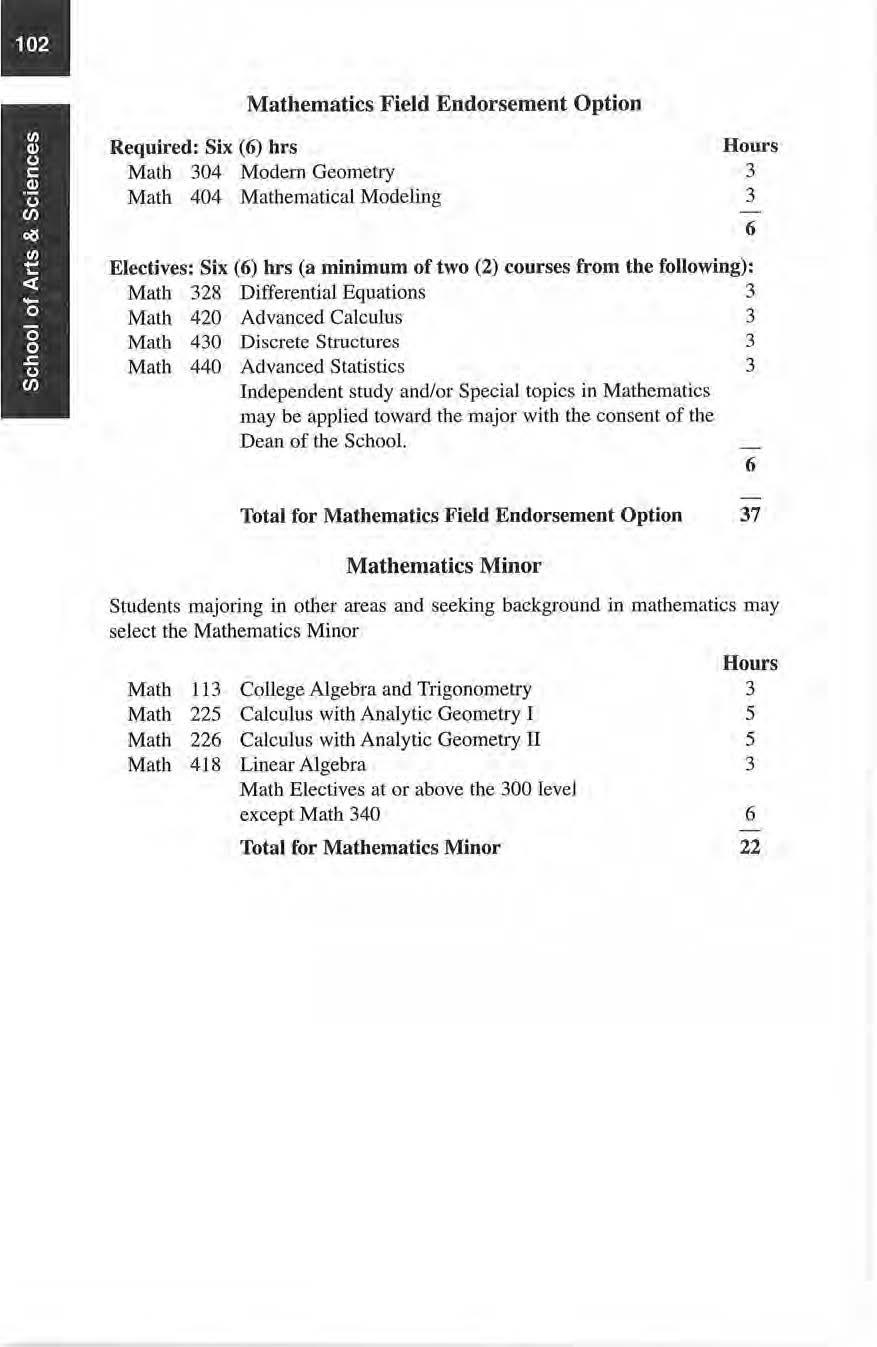
Required: Six (6) hrs Math 304 Modem Geometry Math 404 Mathematical Modeling Hou.rs 3 3 6 Electives: Six (6) hrs (a minimum of two (2) courses from the following): Math 328 Differential Equations 3 Math 420 Advanced Calculus 3 Math 430 Discrete Structures Math 440 Advanced Statistics Independent study and/Ol' Special topics in Mathematics may be applied toward the major with the consent of the Dean of the School. 3 3 6 Total for Mathematics Field Endorsement Option 37 Mathematics Minor S111dents majo1ing in other areas and seeking background in mathematics may select the Mathematics Minor Hours Math 113 College Algebra and Trigonometry 3 Math 225 Calculus with Analytic Geometry I 5 Math 226 Calculus with Analytic Geometry II 5 Math 418 Linear Algebra 3 Math Electives at or above the 300 level except Math 340 6 Tota l for Mathematics Minor 22
Mathematics Field Endorsement Option
MUSIC MAJOR
The Music Education (K-12 or K-6 endorsements), the Music Performance (nonteaching) , the Music Marketing (nonteaching) , Community Mu sic and Private Studio, and the Music Minor ( nonteaching) options are open to all students who have the ability to read music a nd perform on a w ind or percussion instrument, piano, or as a vocalist. Tn addition , those students selecting either Mus ic Education (l<-12 or K-6) or Music Perfonnance (nonteaching) wm be conditionally accepted into the program and must satisfy two level s of qualification (see below) before being fully accepted into their selected program.
Music E ducation (K-12 or K-6) or Music Performa nce
Level I Qualification (after two consecut ive semesters)
I. The student must have achieved at least a 2.5 overaJl GPA after completing two consecutive semesters.
Music Education (K-12 or K-6)
Level JI Qua lification (after four consecutive semesters)
I. The student must be free from d isciplinary probation.
2. The student must have achieved at leas t a 2.5 overall GPA after completing four consecutive semesters.
3. The s tudent must achi eve on the Pre-Professional Sk ill $ Test (PPST) a minimum score of 170 - reading comprehension, 171 - math, and 172composition.

4. The student must complete an interview conducted by the music faculty to assess the student as a prospective teacher.
M usic Performance
Level II Qualification (after four consecutive semesters)
1. The student must be free from discipl.inary probation.
2. The student mus t have achieved at least a 2.5 overall G PA after completing four consecutive semesters.
3. The studen t must complete an interview conducted by the music facu lty to assess the student's attitude, motivation , and enthusiasm toward music perfonnance.
4. The student must perform a qualifying a udition consisting of a prepared piece and a demonstration of fundamental music perfo1mance s kill s, such as sight-reading, sca les, or other skills appropriate to the performance medium.
Special Music Maj or Regulations, Policies, and lnfot•mation
1. All music majors are required to participate in a l arge ensemble (band or c hoir) each semester of full- time e nrollm e nt even though only a limited number of credi ts may count toward meeting graduat i on requirements.
2. Music majors are required to take final examinations i11 their major applied area (private l essons) before a jury of music faculty members at the end of eac h semester of private study.
3. All music majors are req11 i red to register for Muse 100 ( R ecital Attendance) each semester until they have comp leted the estab li shed number of semesters of recital attendan ce.
4. Students pursuing either of U1e Musjc-Education options (K-l2 or K-6), before they will be allowed to enroll in srnden ts teaching, are required to s ucces sfully demonstrate they have achieved t he functional piano skills needed for certificatio n.
5. Music-Education (K- 12) majors are required to <.:omplete Muse 440 (SeniOl' Recital). Music-Performance majors are required to complete both Muse 340 (Junior Recital) and Muse 440 (Senior R ecita l). Students should concurrent ly be enrol led for applied music during th e semester they are enrolled for the junior or senior recital.
6. Music-Performance majors during the freshman year are limited to taking only one (L) hour of app lied music in struction in the major applied area. Commencing with the sophomore year, Music-Performance majors will need to take two (2) hours of private music instruction in the major applied area each semester in order to comp lete tbe required numb er of hours w ithin the four (4) years of attendance.
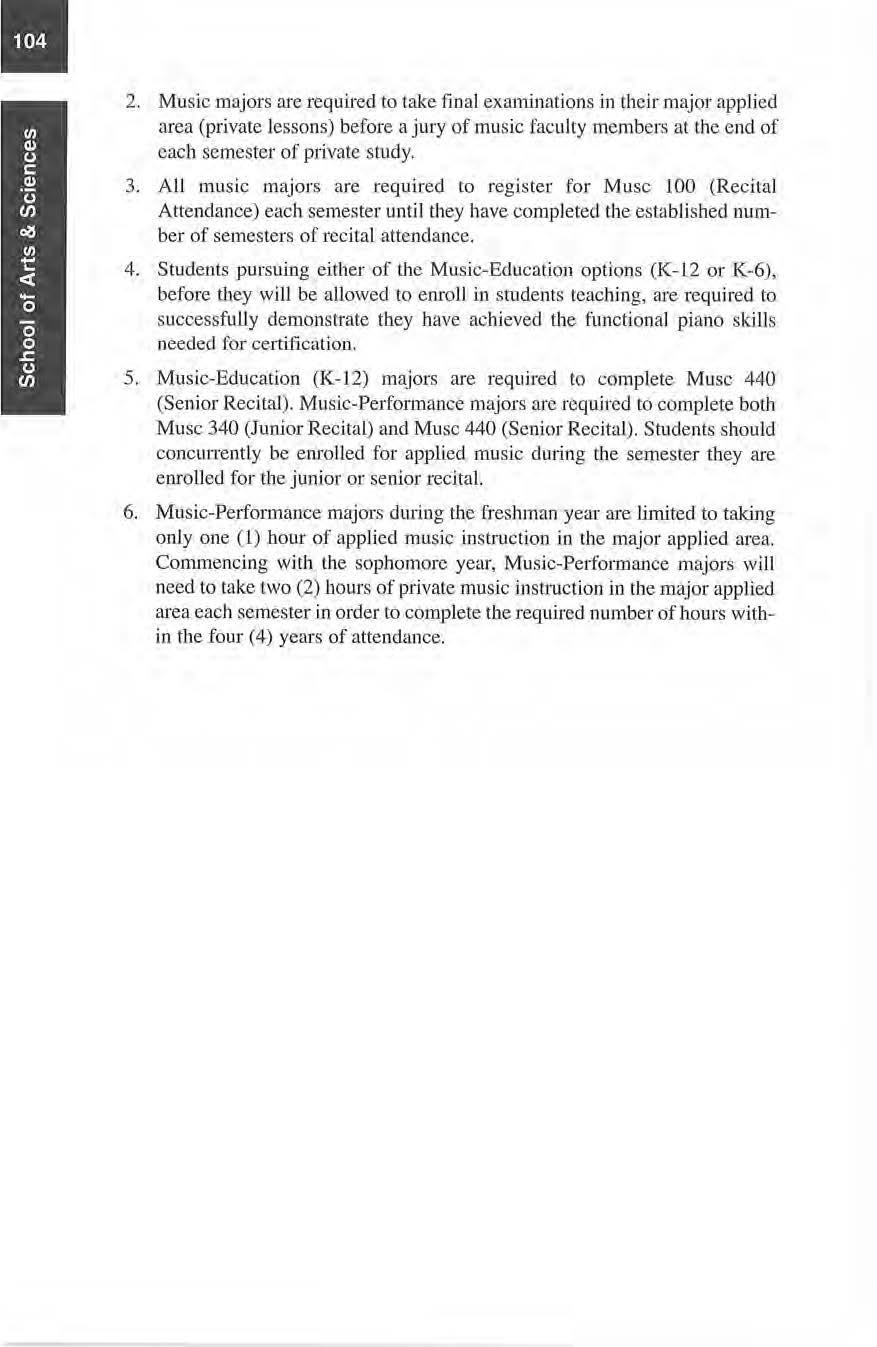
Music - Marketing Option (Non-teaching)

Music Core Requirements: Muse 241 Music Theory T Muse 242 Mus ic Theory TI Muse 310 World Musics Muse 442 Music History 11 (1750-present) Additional Music Requil'ements: Hours 4 4 3 3 14 Muse 363 Music Business 3 Mu se 100 Recital Attendance (s i x (6) semesters required) 0 Large Ensemble Pe rformance 8 (select Muse 10 l College Band or Muse 102 College Choir; six (6) semester required) Applied music in one major area (voice, instrument, or piano) 6 * Applied Piano 2 19 Business Requirements: Bus 251 Legal Environment and Contract Law 3 Bus 328 Principles of Marketing 3 Bus 329 Promotion 3 Bus 350 Sa lesmanshjp 3 Bus 441 Business Administration Intern ship 3 15 Total Music - Marketing Option (Non-teaching) 48 * If the major ~pplied area is piano, th e n two (2) hours of upplied voice or appli ed instrument will be s ubstituted for the two (2) hours .ipplied piano requiremen t.
K-6 VocaJ/Elementary Music Education Option*
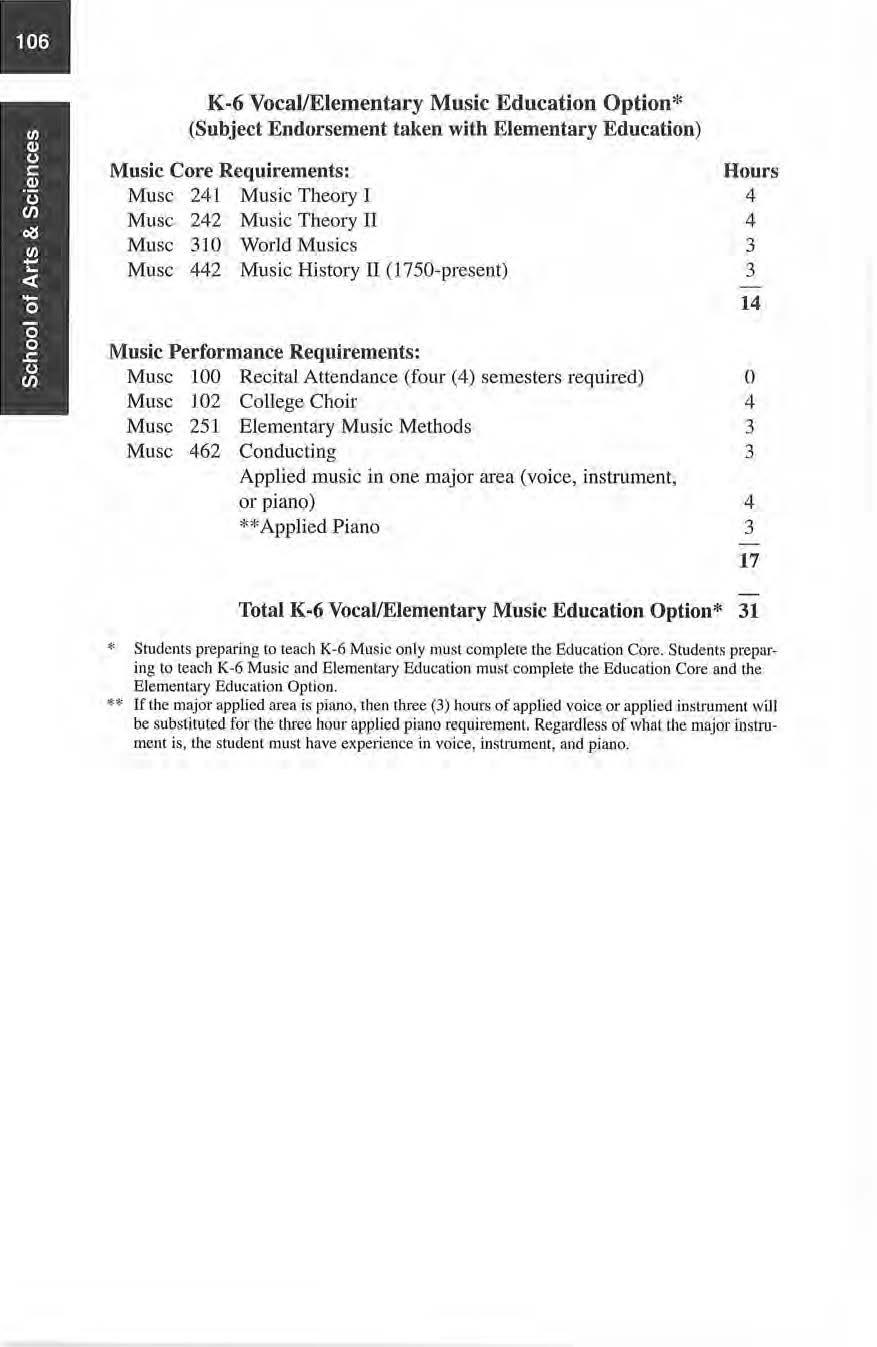
" Studems preparing to 1eac h K-6 Mt1sic only nius1 complele the Educntion Coro. Students prepnring to teach K-6 MuBic and Glementary Education must compl ete the Education Core and lhe E lementary Ed urntion Option.
'"* If!hc majot· applied area is piano , 1hen three (3) hours of applied voice or applicu instrument will be sub~ti M ed for the three ltour applied piuno re quirement. Regardless of what U1e major instrumcm is , tJ1e student must have experien~e in voice, in~trumcnt, and pian o.
(Subject Endorsement taken with Elementary Education) Music Core Requirements: Mu se 24 l Mu s ic Theory 1 Mu se 242 Music Theory II Muse 3 10 World Musics Muse 442 Music History II (J 750-p resent) Music Performance Requirements: Hours 4 4 3 3 14 Muse 100 Recital Attendance (four (4) semesters required) 0 Mu se J02 College Choir 4 Muse 251 Elementary Music Methods 3 Muse 462 Conducting 3 Applied music in one major area (voice, instrument, or pian o) 4 **Appli ed Piano 3 17 Tota l K-6 Vocal/Elementary Music Education Option* 31
K-12 Vocal/Instrumental Music Ed ucation Option (Field Endorsement)
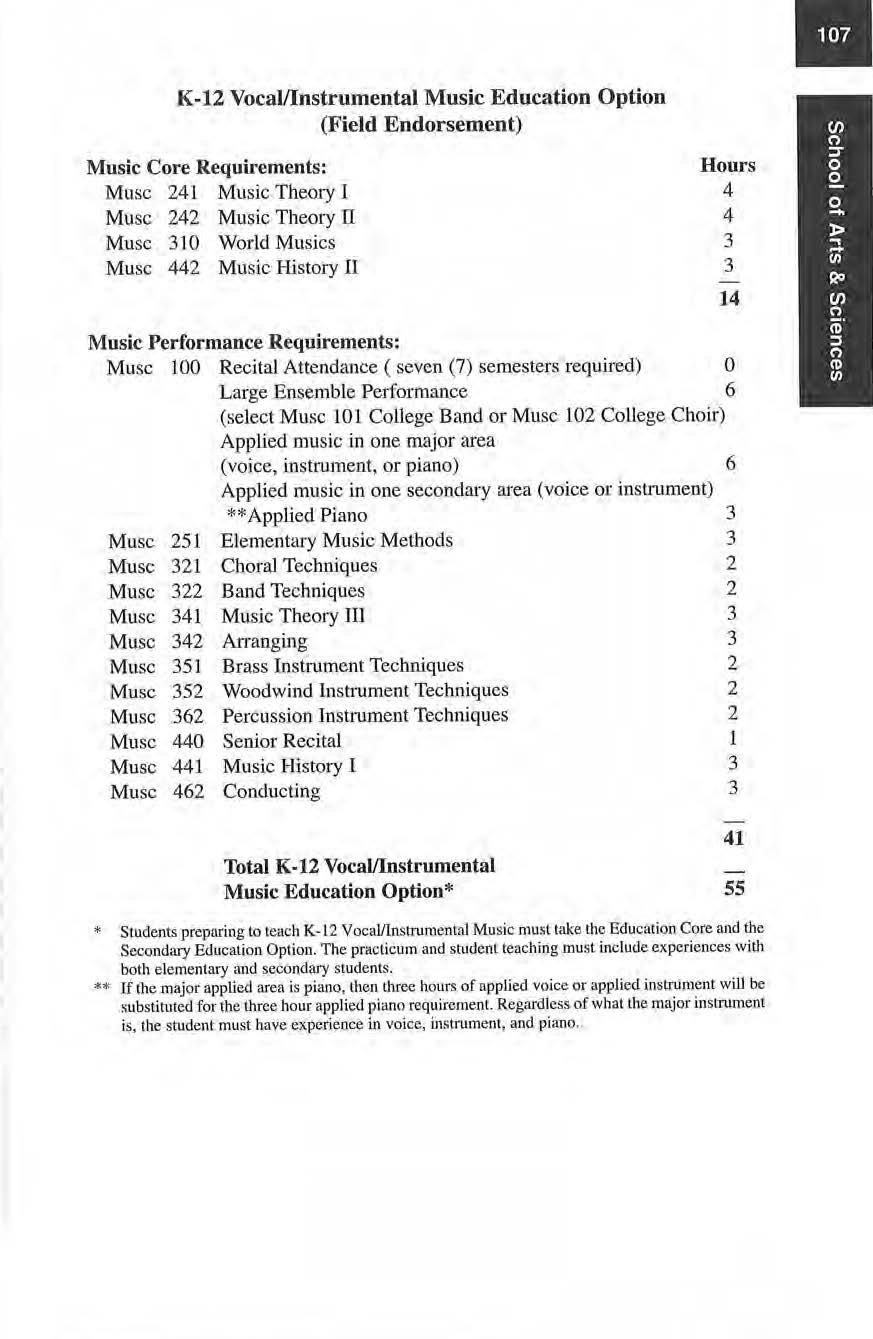
* Students preparing lo teach K-12 VocaVlns trumental Music must take the Educ.itiou Core and the Secondary Education Option. The practicum and studcIil teaching must include experiences with both elementary and secondary students.
*"' 1f (he major applied area is piano, then three h.ours of npplied voice or applied instrument will be subst ituted for the three hour applied piano requ irement. Regardless of what the major instrument is, th.e student· must have experience in voice, instrument, and piano
Music Core. Requirements: ML1sc 241 Music 'fheory I Muse 242 Music Theory II Muse 310 World Musics Muse 442 Music History ll Music Performance Requirements: Hours 4 4 3 3 14 Muse 100 Recital Attendance ( seven (7) semesters required) 0 Large Ensem bl e Performance 6 (select Muse lO l College Band or Muse 102 CoUege Choi r) Applied music in one major area (voice, in strument, or piano) 6 Applied music in one secondary area (voi ce or instmment) ** Applied Piano 3 Muse 251 E lementary Music Methods 3 Muse 321 Choral Techniques 2 Muse 322 Band Techniques 2 Muse 341 Music Theo1y Ill 3 Muse 342 Arranging 3 Muse 351 Brass Instrument Techniques 2 Muse 352 Woodwind In strument Techniques 2 Muse 362 Percuss ion Insttument Techniques 2 Muse 440 Senior Recital l Muse 441 Music Hi story l 3 Muse 462 Conductin g 3 Total K-12 Vocal/Instrumental Mus ic Education Option* 41 55
Music Pe1·formance Req uirements:
Muse 100 Recital Attendance (7 semesters required )
Large Ensemble Performance (select Mus e 101 College Band or Muse J02 College Choir)

Applied music in one major area (voice, instrument, or piano; 7 semesters required) * Applied Piano (3 semesters required)
Tbe Community Music and P1ivate St udio Option is des igned for students who are intere s ted in co ntinuing serious music study and desire to work in community music such as church music, directing community choirs and inslrumental ensemb
Music - Performance Option (Non-teaching) Muse 241 Mu s ic Theory I Muse 242 Music Theory II Muse 310 World Mu s ics Muse 442 Music History IT ( 1750-present)
Music Requirements:
Muse
Junior Recital Muse 440 Senior Recital Muse 341 Music Theory Ill Muse 342 Arranging Muse 441 Mus ic H istory I Mu se 462 Conducting Hours 4 4 3 3 14 0 7 14 3 1 J 3 3 3 3 38 T11tal Mu.sic - Performance Op tion (Non-teaching) 52 • 1I the major U[)pJicd area is piano , Ihen 111:0 (2) hours of npplied voice or applied instrument will be subs 1i tt11ed for the two (2) hour npp lied piano requirernent. Co mm un ity M usic and Privat
340
e Stud io Option
les and by teaching i.n
M usic C o re Requiremen ts Muse 24 1 Mu.sic Theory l Muse 242 Music Theory 11 Muse 310 World Music s Muse 442 Music History lI Hou rs 4 4 3 3 14
a private mus ic studio.
that will allow lessons to be given.)
complete four
(If the major area is keyboard, then s
of applied voice or four semesters of an applied in strument for the Applied Music.)

Additiona l Music Req uirem ents Muse 251 E lementary Music Methods 3 Muse 341 Music Theory lil 3 Muse 342 An-angi ng 3 3 Muse 462 Conducting 3 Muse 497 Practicum in S tudio Teachi ng and/or Comm unity Music 2 (St ud ents will actually teach private stude nts and keep all records associated with studio music teaching, receive help from a facu lty member on their private teacrung and/or help with and observe a community music organization such as a ch urch choir, barbershop chorus. community band, etc.) Muse 499 Senior Project/Independent S tudy 2 Independent Study - Pedagogy and Studio Management and/or Co1nmunity Music (This culminati ng expe rience would be a comple te s urvey of methods; matetials and procedures involved in sludjo teaching and may include additional practicaJ experience in studio teaching. It may also include detailed procedures for management of a community-based music organization.) 19 Music Electives Any music methods or techniques class. 2 Muse P erfo m ance Requireme nts Mu se 100 Rec ital Attendance (seven (7) semes ters required) 0 Large Ensemble P erformance (Select Muse 10 I B and, or Mu se 102 Choir) 7 Applied Mu s ic in one major area 7 App!jed Music Keyboard (four (4) semesters req lLired) 4 (It is s uggested that studen ts who desire to pursue private instruction on orgao
to do so. Anaogemeots will
teacher and a
be allowed
have to be made to find an organ
church
will
18 Total for Community M usic and Private Studio Option 53
tudents
semesters
Music Minor (Non-teaching)
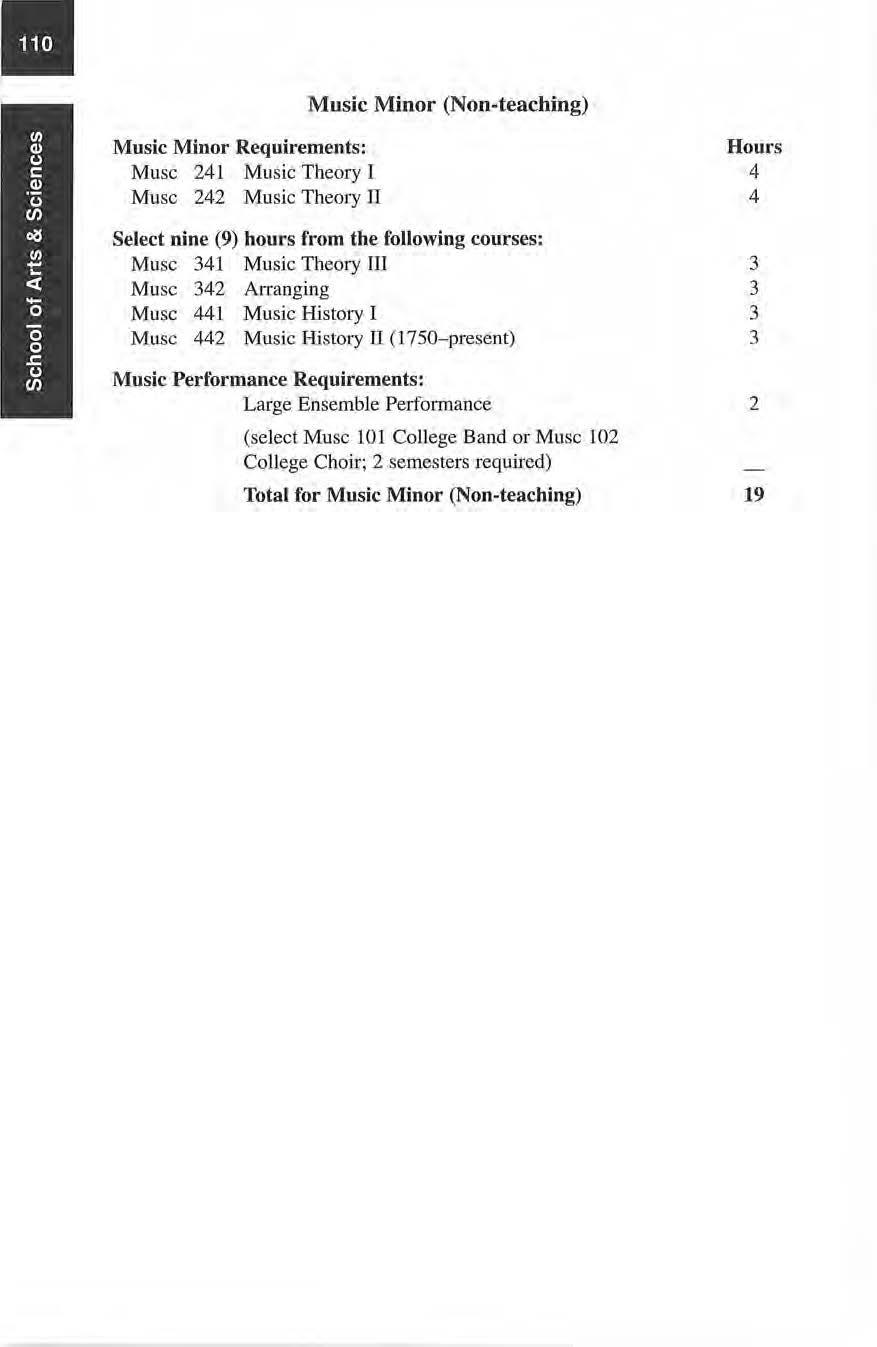
Music Minor Requirements : Muse 2 41 M us ic T heory I Mu se 242 Mu si c Theo ry Tl
nine (9) hours
courses : M use 3 41 Mu si c T heory m Mu se 34 2 Arrang in g Mu se 4 41 Mu sjc llis tory I M use 442 Mu sic His to ry TI ( 1750-present) Music Performance Requirements: Large E n semble Pe rfo rm an ce (se lect M use 101 Co ll ege Band o r Muse 102 Co ll ege C hoir ; 2 se mes ters req uired ) Total fm· Music Minor (Non-teaching) Hours 4 4 3 3 3 3 2 19
Select
from the following
NATURAL SCIENCE MAJOR
The Natural Science Bachelors Degree Program (B.S., 13.A.) consists of a cote of courses to provide the students with a general background. In addition to completing these core courses, the student must a lso select and complete one of the several optjons within the curriculum. These options will allow the student to work towards one of a variety of career and occupat ion al goals.
Natural Science Core Courses
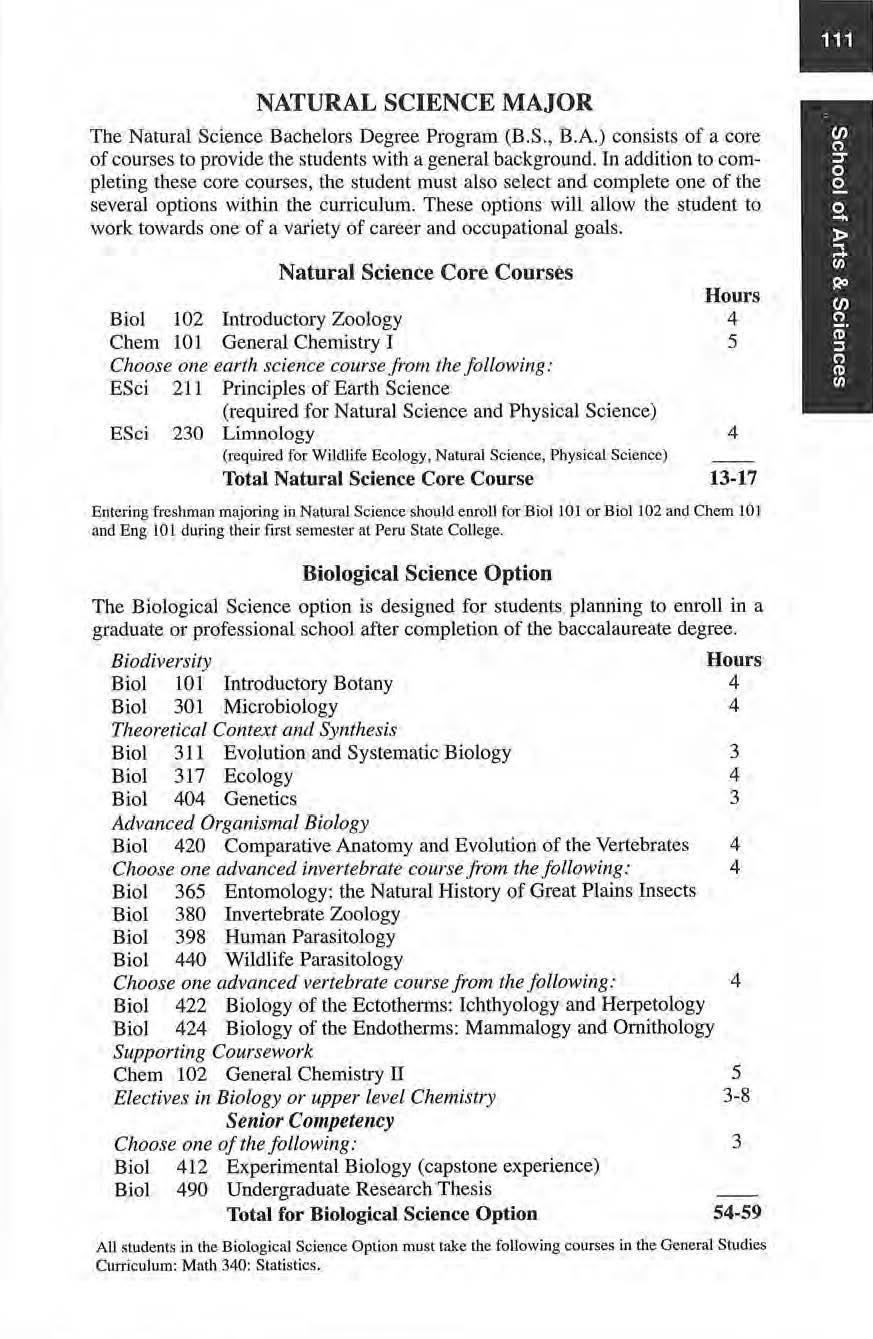
Biol 102
Zoo logy
101 General Chemistry I
Choose one earth science course from the following: ESci 211 Princi pies of Earth Science
(required for Natural Science and Physical Science)
(reqµfred for Wildlife Ecology , Nat\J~at Science, Physical Science)
Entering freshman majoring in Matur~l Science shoulderl(oll fo1· Biol 101 orBiol 102 and Chem IOI aud Eag JO I d uring their first semester -al Peru State College.
Biological Science Option
The Biological Science option is designed for students planning to enroll in a graduate or professional school after completion of the baccalaureate degree.
the Natural Hi story of Great Plain s lnsects
Choose one advanced vertebrate course from the following: 4
All students in the Biological Science Option must take the following courses in the General St\ldies Curriculum: Mnth 340: S t atistics.
Introductory
Chem
Llmnology
ESci 230
Total Natural Science Core Course Hours 4 5 4 13-17
Biodiversity Biol 101 Introductory Botany Hours 4 Biol 301 Microbiology Theo retic<1l Context and Sy11thesis Biol 311 Evolution and Systematic Biology Biol 3 17 Ecology Biol 404 Genetics Advanced Organism.al Biology 4 3 4 3 Biol 420 Co mparative Anatomy and Evolution of the Vertebrates 4 Choose one advanced invertebrate course from
4 Biol
Entomology:
Biol
Invertebrate Zoology Biol
Human Parasitology Biol
Wildlife Parasitology
the following:
365
380
398
440
Biol
Biology
Biol 424 Biology of th.e Endotherms: Mammalogy and Ornithology Supporting Coursework Chem 102 General Chemistry U 5 Electives in Biology or upper level Chemistry 3-8 Senior Competency
the
Biol
Experimental
Biol
Undergraduate Research Thesis Total for Biological Science Opti on
422
of the Ectotherrns: Ichthyology and Het-petology
Choose one of
following: 3
412
Biology (capstone experience)
490
54-59
Wildlife Ecol ogy Option
The Wi ldl i fe Eco logy option is designed for students interested in careers as conservation officers or park rangers.
All students in the Wildlifo Ecology Option must take the following eourses in the General Studies Curri1:u l um: Math 340: Statistics; CMJS 10 I : lnfonna1io11 Systems Concepts and Applications
A Biology Subject Endorsement is offered as part of the teacher education program.
one
course .from the following.'
All students in the Biology Subject Eodorsement Option must take the following courses in the General Studies C urriculum : Math 340: Statistics.
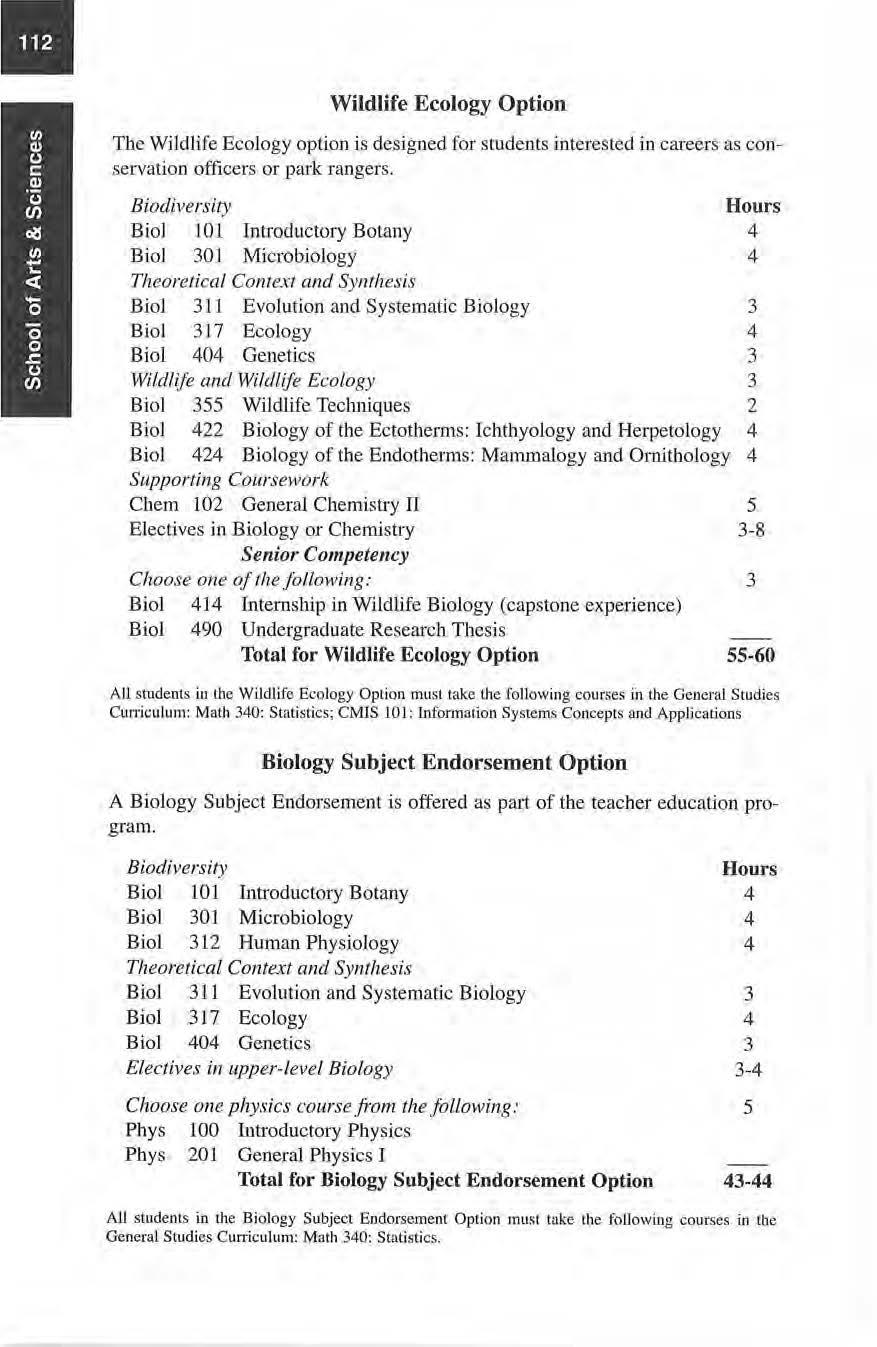
Biodive rsity Biol I01 Tntroductory Botany Biol 301 M i crobiology Theoretical Context and Synthesis Biol 311 Evolution and Systematic Biology Biol 3 17 Ecology Biol 404 Genetics Wildlife and Wildlife Ecology Hours 4 4 3 4 3 3 Biol 355 Wildlife Techniques 2 Biol 422 Biology of the Ectotherms: Ichthyology and Herpeto logy 4 Bio l 424 Biology of the Bndotherms: Mammalogy and Ornithology 4 Supporting Coursework Chem 102 General Chemistry TI Electives in Biology or Chemistry Senior Compete ncy Choose one of rhe following: B iol 414 ln ternship in Wildlife Biology (caps ton e experience) Biol 490 Undergraduate Research Thesis Tota l for Wildlife E cology Opt ion 5 3-8 3 55-60
Biolo gy S ubj ect Endorsement O ption
Biodiversity Biol 101 Introductory Botany Biol 301 Microbiology Biol 312 Human Phys i ology Theoretical Context and Synthesis Biol 311 Evolution a nd Systematic Biology Biol 317 E cology Bio l 404 Genetics Electives in uppe r-level Biology
P hys 100 lutroductory Physics P hys 201 General Physics I Total for Biology S u bj ect Endorsement Option Hours 4 4 4 3 4 3 3 -4 5 43- 44
Choose
physics
Chemistry Subject Endorsement Option
A Chemis try Subject Endorsement is offered as part of the teacher education program.
All student s in the C hemist ry S u bject Endorsement Op tion n,usl tllkc U1e following courses in the Genernl Sn1d ics Curriculum: Math 340: Stntistics.
Natural Science Option
The requLrements li sted xepresent both the education and non-education degree programs. If the teaching endorsement is chosen, attention must be g iven to the addit io na l courses required for entrance into the teacher ed ucati on program professional scmesteL In the teacher education program, Natural Science is a field endorsement.
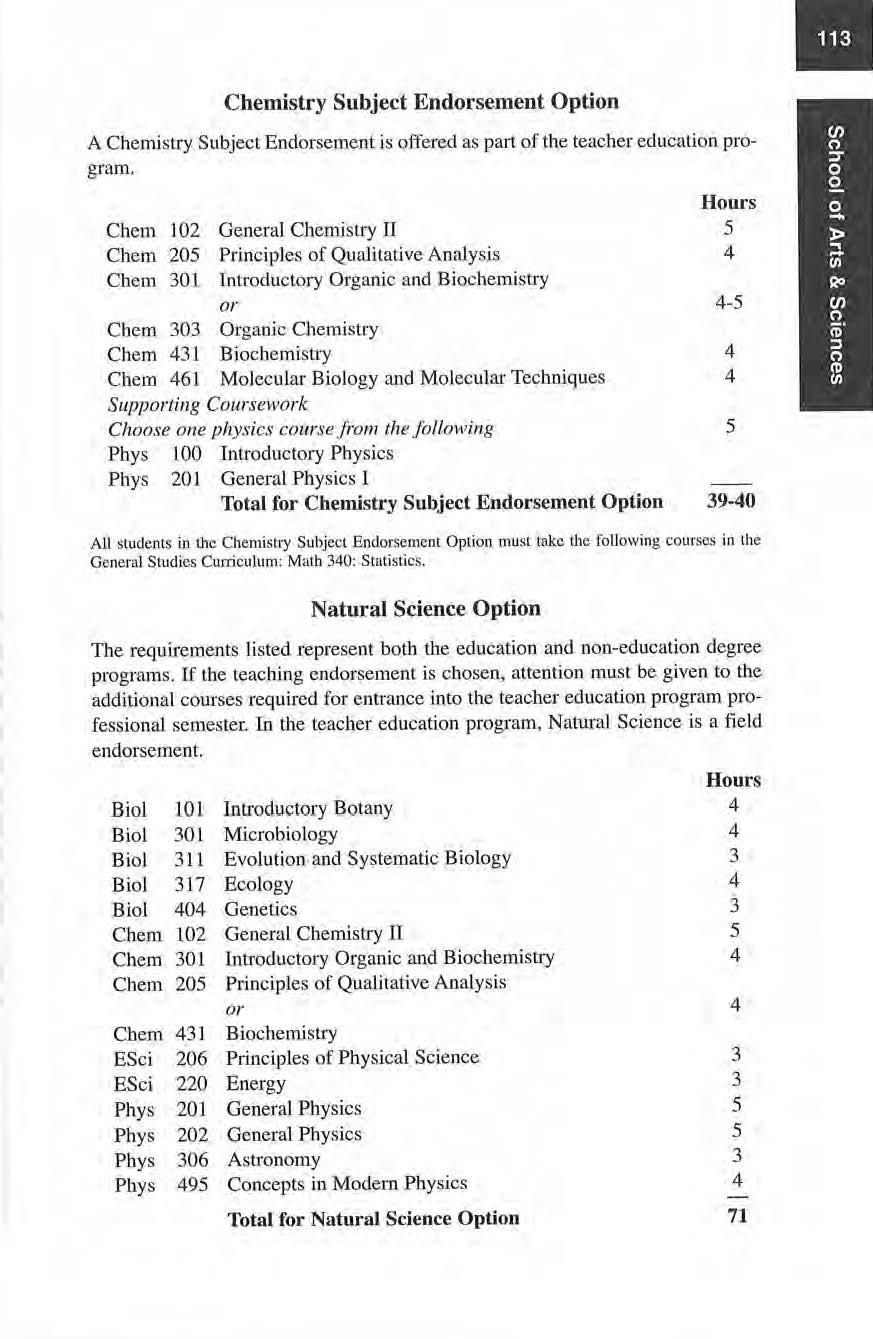
Chem I02 General Chemistry II Chem 205 Principles of QuuJitative Analysjs Chem 301 lntrnductory Organic and Biochemistry or Cbem 303 Organjc Chemistry Chem 431 Biochemistry Chem 461 Molecular Biology and Molecular Techniques Supporting Coursework Choose on e physics course Ji·om the following Phys I 00 Introductory Physics Phys 201 General Physics 1 Total for Chemistry Subject Endorsement Option Hours 5 4 4-5 4 4 5 39-40
Hours Biol 101 Inu·oductory Botany 4 Biol 30 1 Microbiology 4 Biol 311 Evolution a nd Systematic Biology 3 Biol 317 Ecology 4 Biol 404 Genetics 3 Chem 102 General Chemistry II 5 Chem 301 Lntroductory Organic and Biochemistry 4 Chem 205 Principles of Qualitative Analysis or 4 Chem 43 1 Bio chemistry ESci 206 Pri.i1c-iples of Phy sical Science 3 ESci 220 Energy 3 Phys 201 General Phy sics 5 Ph ys 202 General Phy sics 5 Phys 306 Astronomy 3 Phys 495 Concepts in Modern Physics 4 Total for Natural Science Option 71
Nuclear Technology Option
In addition to the specific coursework requirements listed below, tbe candidate for this option must also be a licen sed reactor operator. Questions regarding this program should be directed to the Dean of the School of Arts and Sciences
The requirements liste d represe nt both the educat ion and non-education degree programs . If the teaching endorseme nt is chosen, attention must be given to the additional courses required for entrance into lbe teacher education program professional semester. In the teacher ed ucatjon program, Ph.ysical Science is a field endorsement. Non-education majors must g ive attention to minimum upper-level hour graduation requirements when planning a course of study.

Math 225 Math Phys Phys Biol Biol EScj 226 201 202 210 312 220 230 Econ 222 Calculus with Analytic Geometry I Calculus with Analytic Geometry Il General Physics General Physics Human Anatomy Human Phy s iology Energy Limnology Prin ciples of M acroeconomics Total fo1· Nuclear Technology Option Physical Science Option llours 5 5 4 4 4 4 3 4 3 36
Hours Biol 101 Introductory Botany 4 Chem 102 General C hemj stry II 5 Chem 301 Introductory Organic and Biochemjstry- 4 Chem 205 Principles of Qualitative Analysi s or 4 Chem 43J Biochemis try ESci 206 Principles of Physical Science 3 ESci 220 Energy 3 Phy s 201 General Physics 5 Ph ys 202 General Physics 5 Phys 306 Astronomy 3 Phys 495 Con cep t s in Modern Phy sics 4 Total for Physical Science Option 57
Biology Minor
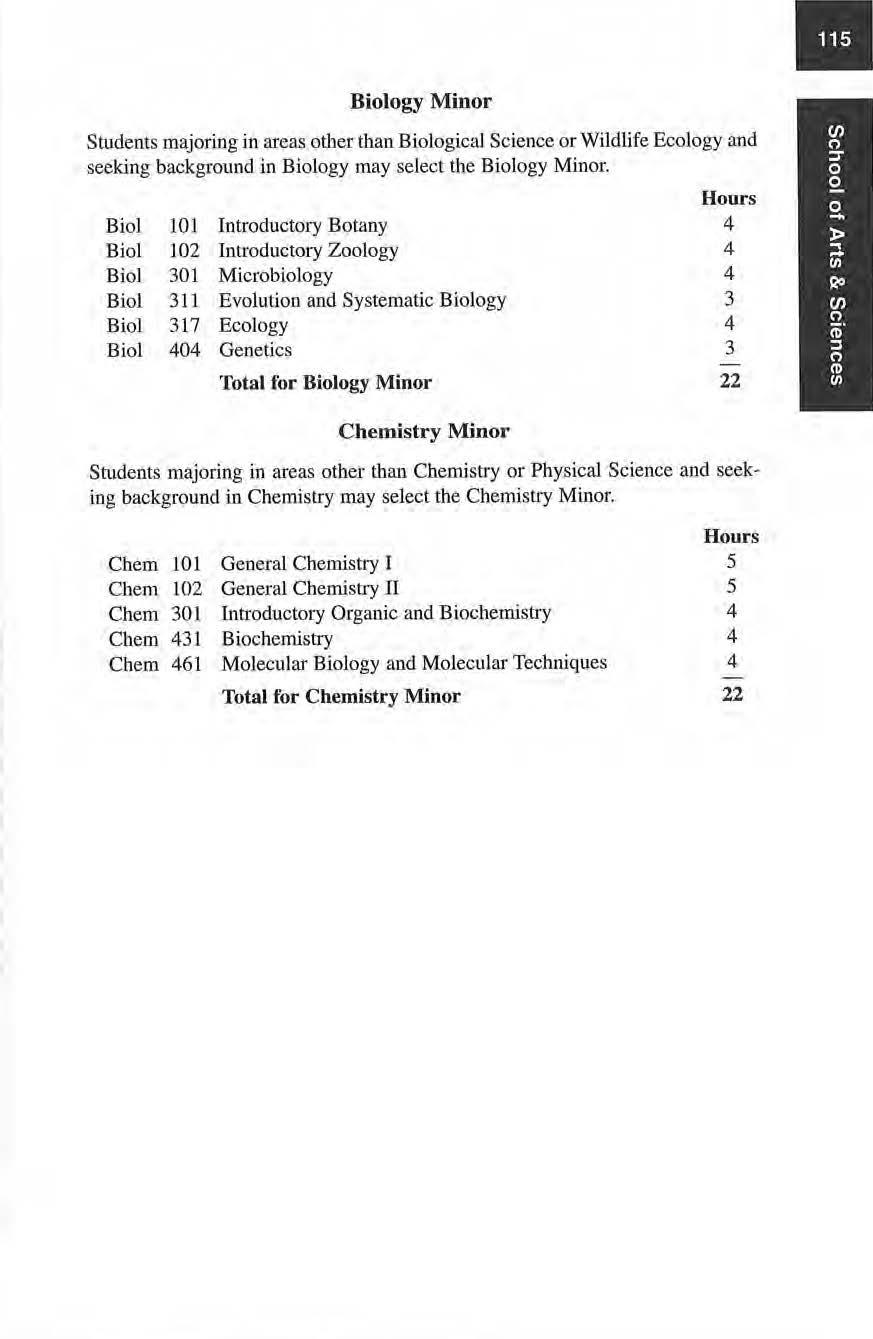
Students majoring in areas other than Biological Science or Wildlife Ecology and seeking background in Biology may select the Bio logy Minor.
Students majoring in areas other than Chemistry or Physical Science and seeking background in Chemistry may select the Chemistry Minor.
Hours Biol 10 1 Introductory Botany 4 Biol 102 Intrnducto ry Zoology 4 Biol 301 Microbiology 4 Biol 311 Evolution and Systematic B iology 3 Biol 317 Ecol ogy 4 Biol 404 Genetics 3Total for Biolo gy Mi nor 22 C he mi s try
Minor
Chem 10 l General Chemistry I Chem 102 General Chemistry 11 Chem 301 Introductory Organic and Biochemistry Chem 431 Biochemistry Chem 461 Molecu lar Biology and Molecu lar Techniques To tal for C hemistry Mi nor H o ur s 5 5 4 4 4 22
SOCIAL SCIENCE MAJOR
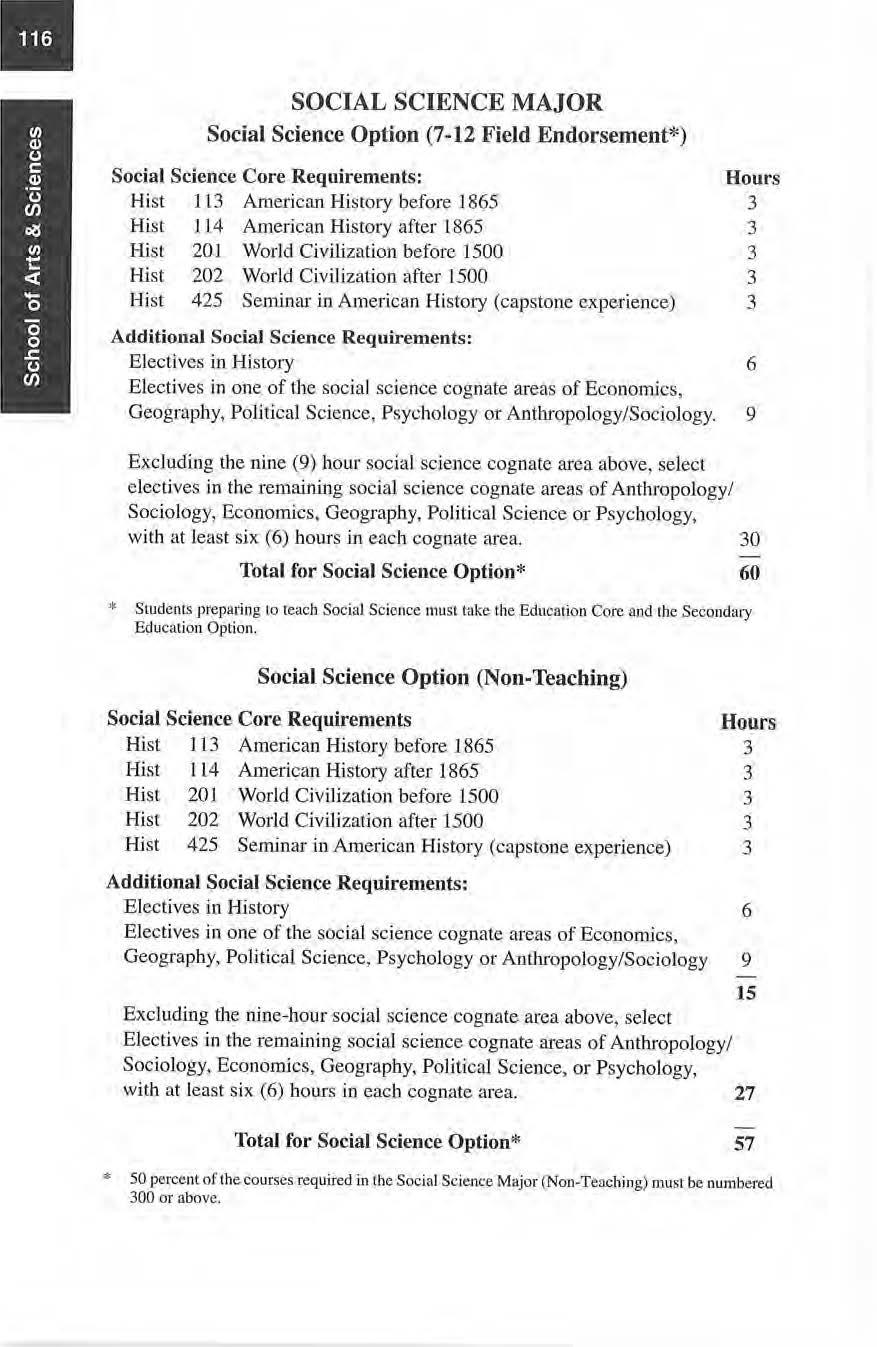
Social Science Option (7-12 Field E ndorsement*) Socia l Science Core Requirements: Hi st 1 l3 American Hi s tory before 1865 Hours 3 Hist I L4 American History after 1865 3 His t 20J World Civilization before 1500 3 Hist 202 World C ivilization after 1500 3 Hi st 425 Seminar in American Hi story (capstone experien ce) 3 Additional Social Science Requirements: E lectives in Hi s tory 6 Electives in one of IJ1e soc ial sc ie nce cognate areas of Economics , Geography, Political Science, P syc hology or Anthropology/Sociology. 9 Excluding U1e
hour social
electives in the
ial
Anthropology/ Sociology, Economics. Geography. Politi cal Science or Psychology, with at leas t six (6) hours in each cognate area. 30 Total for Social Science Option* 60
Social Sciouce
ndaLy
Science Option (Non-Teaching) Social Science Core Requiremeots Hist 113 American Hi story before 1865 Hours 3 Hist 114 American History after 1865 Hi s t 20J World Civilization before 1500 Hist 202 World Civilization after 1500 Hi st 425 Seminar in American Hi story (capstone experience) Additional Social Scie nce Requirements: Electives in History Elec tives in one of the soc ial science cognate areas of Economics, Geography, Political Science, P sychology or Anthropology/Sociology Excluding the
ial
ience
Electives in the r ema ining social science cognate areas of Anthropology/ Sociology. Economics, Geography, Political Science, or P sychology, 3 3 3 3 6 9 IS with at least s ix (6) hours in eacb cog nat e area. 27 Total for Social Science Option* 57 * 50 percent of the courses required in l he Social Sc ience Major (Non-Teaching) musr be numbe red 300 or above
nine (9)
sc ience cognate area above, select
remaining soc
science cognate areas of
* Students preparing to teacl1
must t11ke the Education Co.re and the Seco
Education Option. Social
nine-hour -soc
sc
cognate area above, select

(7- 12 Subject Endorsement* or Non-teaching) Social Science Core Requirements: Hi st 113 American History before 1865 Hi st J 14 American History after 1865 Hist 201 World Civilization before 1500 Hist 202 World Civ ilization after 1500 H ist 425 Seminar in American Hi story (capstone experience) Additional History Requirements: Upper Division American H istory (300 level or higher) Upper Divi sion EUJopean or World Hi story (300 l evel or higher) Electives in Histm·y Ele.ctives from one or more of the social science cognate areas of Anthropology/Sociology, Economics, Geography, Political Science m Psychology. Total fot History Option* Hours 3 3 3 3 3 9 3 12 9 36
to teach History
take the Educntion Core and the Secondary Education
Minor Hom·s Hi st 113 American History before 1865 or 3 Hi st I 14 American History after 1865 Hist 201 World Civilization before l 500 or 3 Hist 202 World Civilization after 1500 Psci 20! Ame1ican National Government or 3 Phil 201 Introduction to Phjl osophy Electives in upper divisjon History, with at least three (3) hours in American History and three (3) hottrs in European History 12 Total for History Mino.- 21
History Option
* S tudenlS pl'epating
must
Option. History
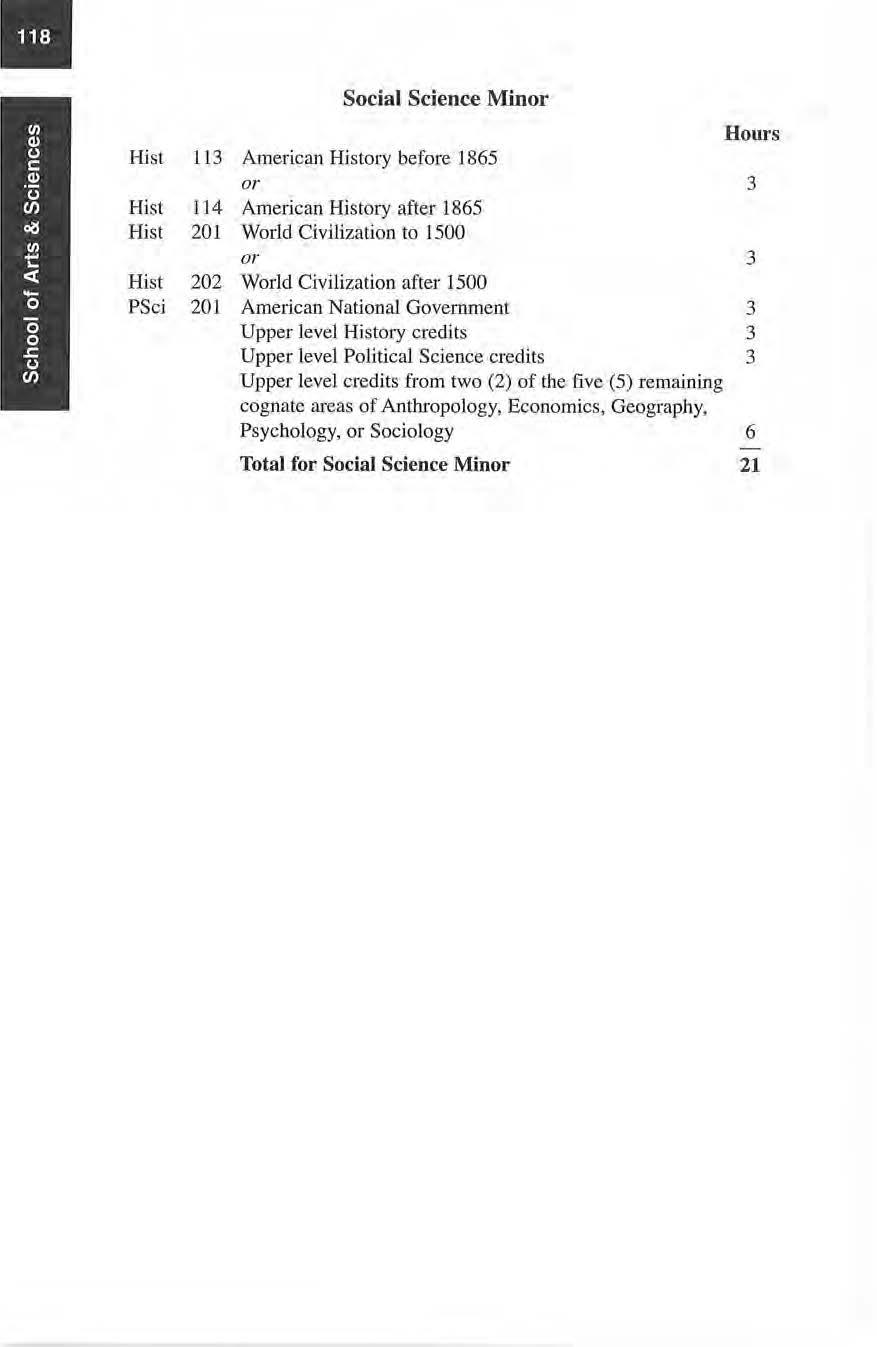
Hist 113 Hist I 14 Hist 201 Hist 202 PSci 201
Hours American History before 1865 M 3 American History after 1865 World Civllization to 1500 M 3 World Civ1lization after 1500 American National Government 3 Upper level Hi s tory credits 3 Upper level Political Science credits 3 Upper level credit s from two (2) of the five (5) remaining cognate areas of Anthropo.logy, Economics, Geography, Psychology, or Sociology 6 Total for Social Science Minor 21
Social Science Minor
PRE-PROFESSIONAL PROGRAMS
The transfer programs Jjsted in this section may require from one to four years to complete. They do not represent academic majors. Students planning to complete a degree at Peru State must sa tisfy the requirements for a specific academic major in addition to completing tbe requirements for one of these programs. Students in these progrants are advised to secure a catal og from the professional schoo l they expect to attend as individual school s may vary in requirements, and consult with their advisor pri or to registering for classes.
The term Pre-L aw refers to a student's intention to pursue advanced studies at a law school, not to any prescribed major or cuniculum. Adequate preparation for entrance into a ranking law school requires -a bachelor's degree. Neither the committee oo pre-law education of the American Bar Association nor leading Jaw schools specify a pmticular undergraduate major or prescribe a specific pre-law program, but they do stress the ability to read perceptively, to write intelligently, to use a library, and to evaluate evidence. Success in law schoo l requires iotellec~ tual depth and breadth as weU as certain skil l s and insights relevant to law study. Since many of the goal s of legal education are also tbe goals of liberal education, law schools recommend that pre-law st udents obtain the widest possible undergraduate experience consistent with their prnfessional objectives. Literate, wellinformed stndents with broad genera l educations tend to succeed in law school. Those students aspiring to enter law school , then , may major and/or minor in any number of fields that will aid them in attaining the following:
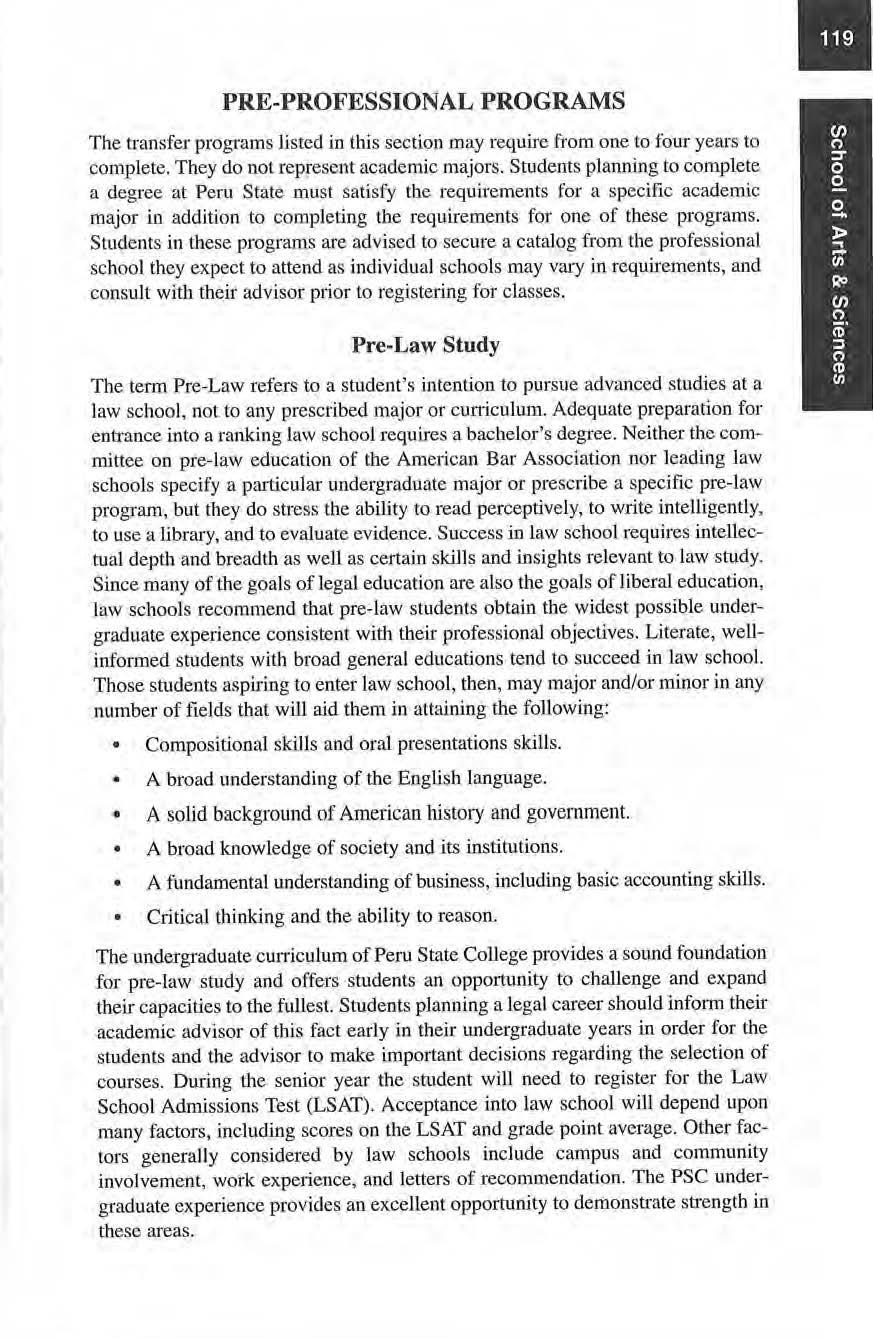
• Compositional ski ll s and oral presentations skills.
A broad understanding of tbe English language.
• A sol id back ground of American history and government.
• A broad knowledge of society and its institutions.
• A fundamental understanding of bus.iness, including basic accounting skills.
• Critical th inking and the ability to reason.
The undergraduate c urriculum of Peru State College provides a sound foundation foy pre-law study and offers stude nt s an oppo1tunity to challenge and expand their capacities to the fullest. Students planning a legal career should inform their academ ic advisor of this fact early in their undergraduate years in order for the students and the advisor to make important decisions regarding the selection of courses. During the senior year the student will need to register for the Law School Admissions Test (LSAT). Acceptance into law school w i.11 depend upon many factors, including scores on the LSAT and grade point av erage. Other factors generall y considered by law schools include campus and commu nity involvement, work expe1ience, and le tters of recommendation. The PSC undergraduate experience provides an excellent opportunity to demonstrate strength in these areas.
Suggested Pre-Law Courses:
Anthropology
*225 lntro to Cultural Anthropology
Business
23 1 Principles of Financial Accounting

251 Legal Environment and Contract Law
35 1 Commercial Law
*468 Public Administration
Criminal Just.ice
l l O Survey of Crimina l Justice
340 Criminal Law
Economics
222 Principles of Macroeconomics
Eng lish
301 Traditional Grammar
308 Technical Writi ng
309 Creative Writing
History
I 13 U.S. History Before 1500
1 14 U.S. Hi.story After 1500
201 World Civilization before 1500
202 World Civilization after 1500
*426 American Constitutional Law
Math
340 Statistics
Philosophy
20 1 Introduction to Philosophy
Political Science
20 I American National Government
202 State and Local Government
*426 American Constitutiona l Law
*468 Public Administration
Socio logy
20 I Principle s of Sociology
Speech
254 Public Speaking
357 Interpretative Reading
Su ggested Major Fields of Study
Business
English Hi s tory
Social Science
*denotes cross-listed courses
Pre-Den tal and P re-Med ica l
The s tudents in this program are advised to sec ure a catalog from U1e profes s ional school they expect to attend as individual schoo ls may vary in requirements for pre-dental and pre- medical programs.
English Composition Chemistry Statistics Calculus Psychology Biology P hysics Atts e lectives H ours 3-6 22 3 5 3 12 LO 12-16
P re-Denta l Hygiene
The fo llowi ng courses are s u gges1ed for admHta nce into a dental hyg ie ne program: Eng lis h Compos iti on

e ne ral Che mi s try
P re-Engineerin g
Su gges1ed p rog ram for t he firs t t wo (2) yea rs :
Th e re quii·ements for forestry sc hool s vary. Early in the pre- fores try prog ram s tudent s should con s u lt the catalog of the college they pl a n to a tte nd
Intro
Mic
Prin
Introdu
Nutrition Fundame
Soc
Hum
12
G
ducl'ory Zoo logy
robiol ogy
c iples o f Soc io logy
ction to Psyc ho logy
nt a ls o f Speec h
ia l Sc ie nces E lec ti ves
ani ties E lect ives
H o ur Seri es
E
Ma
m::ni cs Tec hn ica l
cs C he mi s try Ph ys ics (recommende
E lectives Pre:Fo restry Hou rs 6 10 4 4 3 3 3 3 3 6 12 Hours 6 26 3 LO 10 LO
n g li s h Co mp os iti on
1he
Gruphi
d)
En g li s h Compos ition Biology Che mi s try Eco no mics Po l iti cal Sc ie nces S peec h Physi cs Hours 6 15 10 6 3 3 10
Pre-Mortuary
The following pmgi-am i s suggested as a prerequisite for entering a college of Mortuary Science:
The bas ic arts and sciences r equire ments for nursing programs vary dependiJ1g on the school selected and the level of traming offered (i .e ., diploma, associate degree or baccalaureate degree program). The pre-nursing students are urged to obtain a copy of the catalog from the nursing school selected to insure proper planning for trausfer. The foliowi og courses are suggested for a one-year prenursing program. A second year of coursework tnay be necessary for students entering a B.S.N. program.
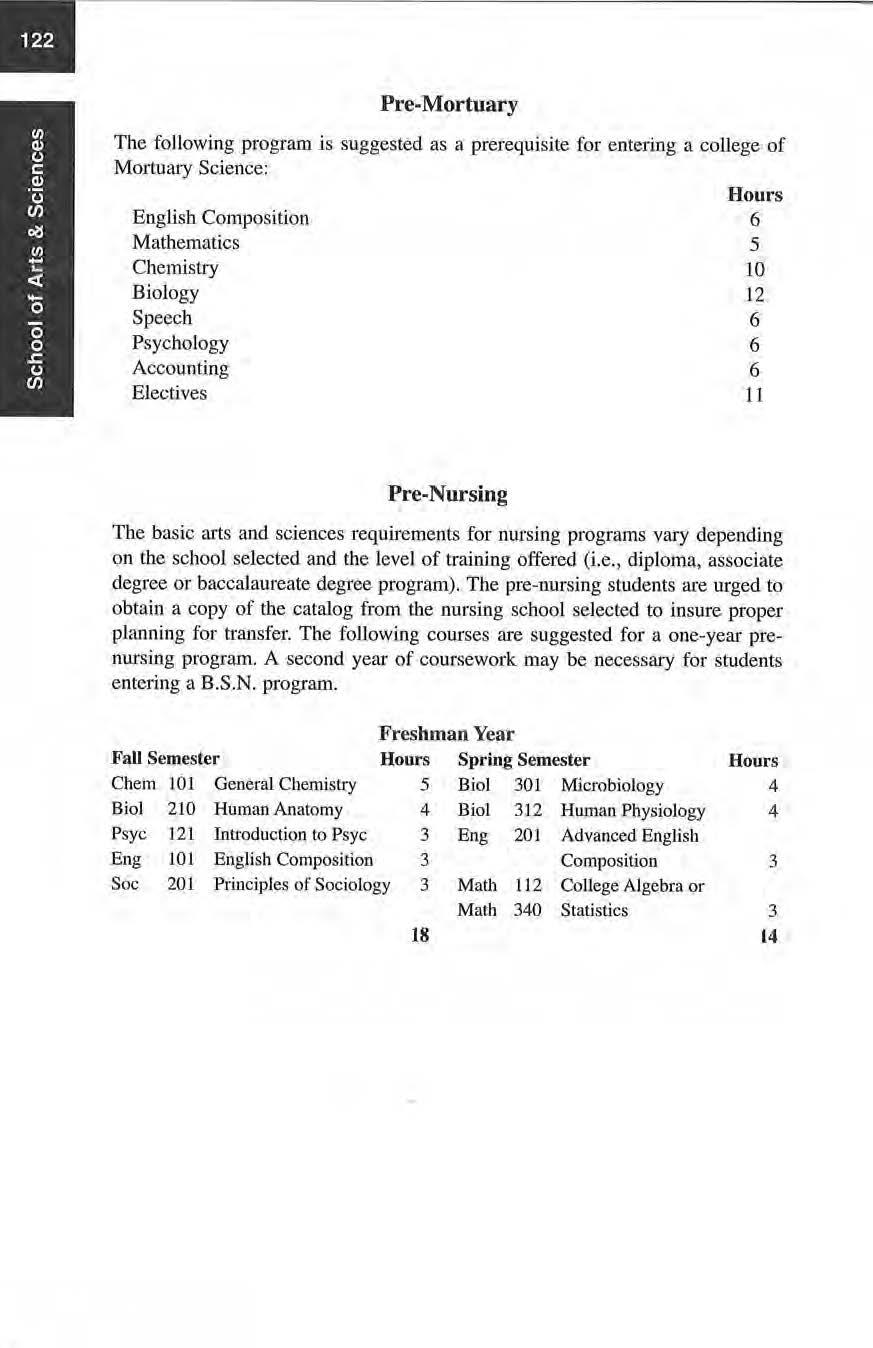
English Composition Mathematics Chemistry Biology Speech Psychology Accounting Electives Pre-Nursing Hours 6 5 10 12 6 6 6 11
Freshma n Year Fall Semester Hours Spring Semester Hours Chem 101 General Chemistry 5 Bio l 301 Microbiol ogy 4 Biol 210 Human Anatomy 4 Biol 312 Human Physiology 4 Psyc 121 Introduction to Psyc 3 Eng 201 Advanced English Eng 101 English Composition 3 Con1position 3 Soc 20 1 Prin ciples of Sociology 3 Math I 12 College Algebra or Math 340 Statistics 3 18 l 4
Pre-Optometry
Tht: following co ursework is suggested for s tudents inte re s ted in enteri n g a baccalaureate program in Optometry.
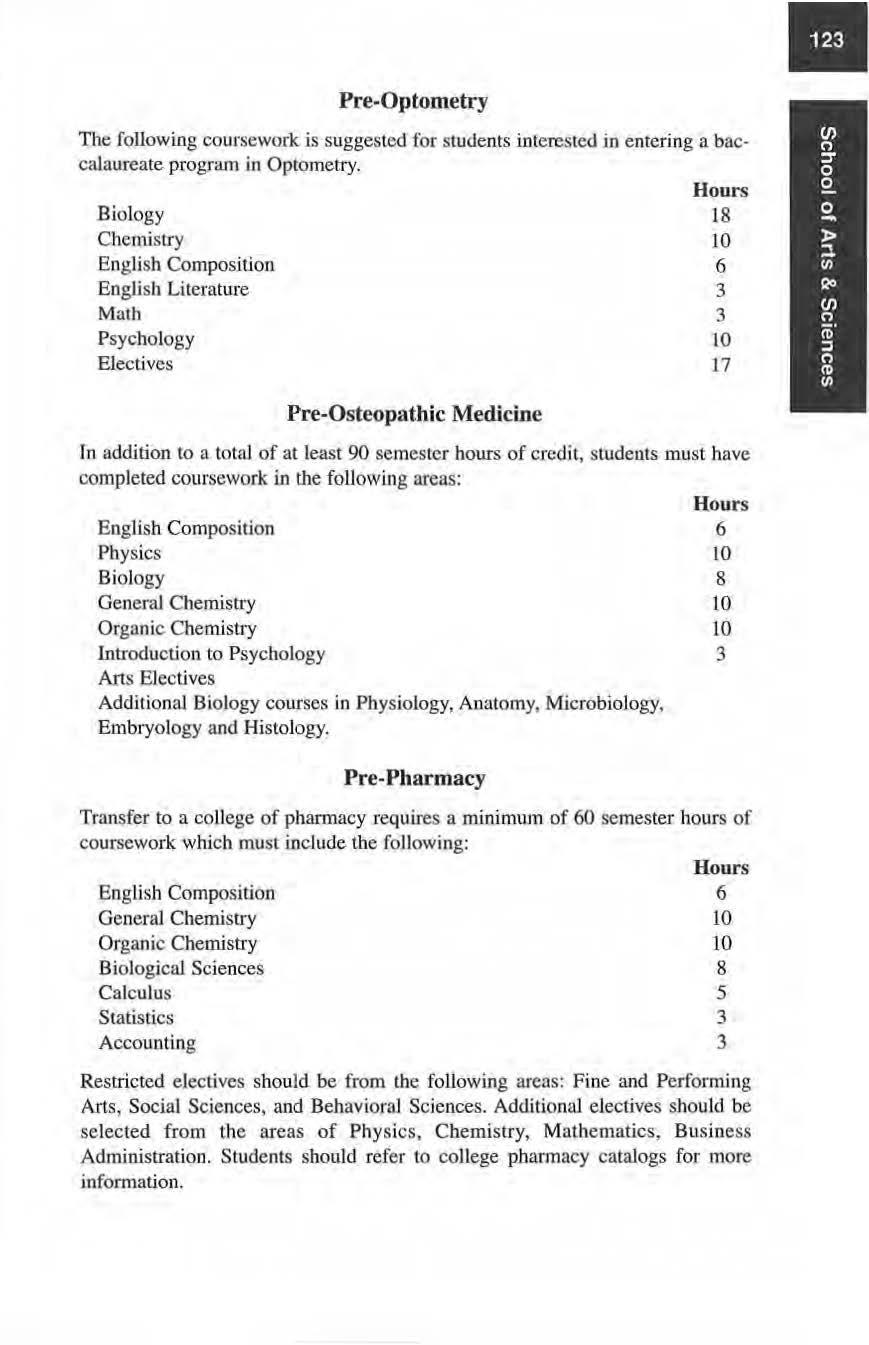
In addition to a lotnJ of at leas t 90 se mes ter hours of credit, s tudents must have co mplete d coursework in the followi ng areas :
Trans fer to a coll ege of phannacy re quires a minimum of 60 se mester h ours of coursework whic h must include th e following:
R estricted electives should be from the following areas: Fine and Performing Arts , Socia l Sciences, and Beh av ioral S c iences. Additional e lectives s hou ld be se l ected from the are as of Phy s ic s, Chemistry, Ma thematics, Business Admini s tration. Students s hould re fe r t o college pharma cy catalogs for m ore information.
Biology Chemistry Englis h Composition En g Us h Literature Math Psycho logy Electives Pre-Osteopathic Medicine Hours 18 10 6 3 3 lO 17
E nglish Compos ition Phy s ics Biology General Chemistry Organ ic Chemis try Introdu ction to Psychology Arts Elec tives Additional Bio logy co urses in Phys iolog y, Anatomy, Microbiology, Embryology and Histology. Pre-Pharmacy Rout's 6 IO 8 10 10 3
English Compos ition General Chemis try Orga nic C hemistry Bi olog ical Sciences Calc ulus S t atistics Accounting Hours 6 10 10 8 5 3 3
Pre-Physical Therapy
The fo ll owing courses are suggested for students interested in Physical Therapy:
App li cants for most physician assistant programs must have satisfactorily completed minimum of 90 semester hours including the following courses:
Applicants to most co lleges of podiatric medicine must have completed the following prerequ is ite courses:

Biology Chemistry English Compos ition Math Psychology Physics Electives Pre-Physician Assistant Hours I l 10 6 6 3 13 10
English Composition Biology (Human Anatomy, Physiology
Chemjstry (General, Organ ic and Biochemistry
Mathematics (Statistics req; College Algebra
Psychology (A bnorma l reg; Developmental recommended ) Pre-Podiatric Medicine Hours 6 16 22 6 9
& Microbiology required)
required)
recommended)
Biology General Chemistry Organic Chemistry Physics English Composition Hours 8 10 lO 10 6
Pre-Radiation Science Technology
The following cow·seworkis suggested for students in radiation therapy, radiography, nuclear medicine technology, or medical sonography.
The following courses a re suggested for s tudents interested in entering a bacca laureate program in Resp iratory Therapy.
The fo llowing coursework is suggested for st11clents interested in entering a baccalaureate program in Veterinary Science.
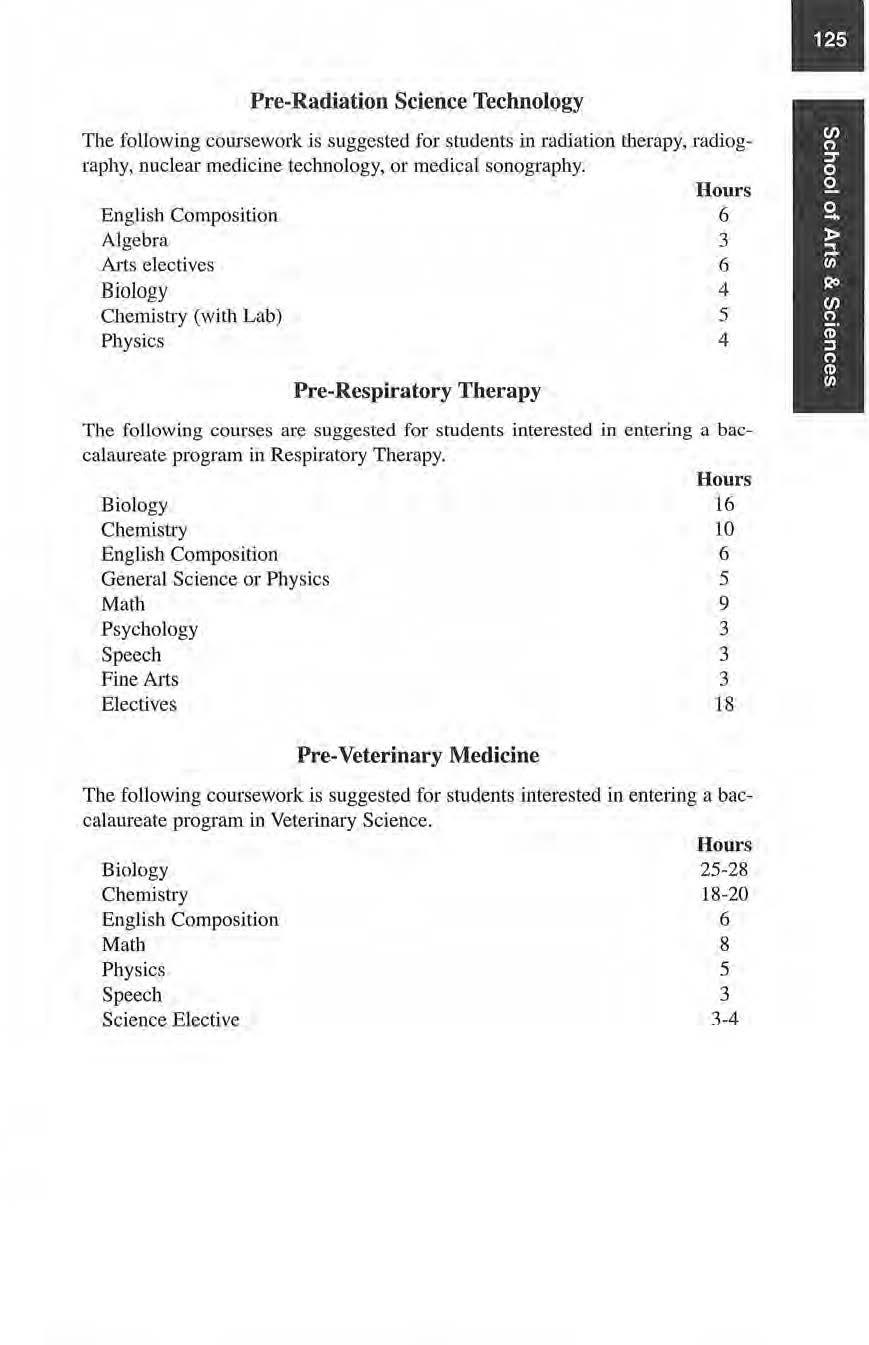
English Composition Algebra Arts electives Biology ChemislJ)' (w ith L ab) Physics Pre-Respiratory Therapy Hours 6 3 6 4 5 4
Biology Chernistzy English Composition General Science or Physics Math Psychology Speec h Fine Arts Elective s Pre-Veterinary Medicine Hours 16 10 6 5 9 3 3 3 18
Bi ology Chemistry English Composition Math Phy s ics Speech Science Elective HoID·s 25-28 18-20 6 8 5 3 1-4
Medical Technol ogy
During the first three years, the s tudent must satisfy the General Studies requirements fo r graduation, complete a rruuimum of 90 semester hours applicab'le toward a baccalau1·eate degree, complete 24 s emester lwurs of Chemistry, 16 hours of Biology, and at least one course each in Mathematics and Physics . The fourth year, which cons is ts of a fuU twelve-month program, spen t in residence at a n approved school of Medica l Technology that awards the degree.
Suggested Program for Medica l Technology
1\velve-month program at an approved school of Medical Technology.

Freshman Year Fall Semester Ho urs Spr ing Semester Hours Eng 101 English Composition 3 Speh 152 Fundame ntal s of Speech 3 M a th 113 College Algebra & 'T'ri g 3 Math 225 Ca.lculus I 5 Bio1 l0 2 Introductory Zoology 4 Hist I 14 U.S. History since 1865 3 Chem 101 G enera1 Chemistry 5 Chem 102 General Chemistry 5 Coll LOl Freshman Orientation I 16 16 Sop homore Year Fall Semester Hours Sprin g Semester Hours Eng 202 App of Literature 3 Biol 420 Comparalive Anatomy 4 Chem 205 Principles of Qualitative Bio l 312 Human Phy sio logy 4 Analysis 4 Chem 206 Principles of Hist 113 U.S. His tory to 1865 Quantitative Analysis 4 or Psci 201 American National Hist 20 1 World Civ to 1500 3 Government 3 Biol 407 Developmental Biology 4 Ari 206 Art Apprecialion PE 101 Wellness 2 or Muse 211 Music Appreciation 3 16 18 J unior Year Fall Semester Hours Spring Semester Hours Chem 303 Organi c Chemistry 5 Chem 304 Organic Chemistry 5 Phys 20 1 General Physjcs 5 Biol 301 Microbiology 4 Biol 404 Genetics 3 Eng 201 Advanced English Physical Educ Activity l Composition 3 Elective 3 Phys ical Edu c Activity 1 Elective 3 17 16 Senior Year
2 Plus 2 Agreement
The 2 Plus 2 Agreement in Natural Resources is a joint program between Peru State College (PSC) and the Colleges of Agricultural Sciences and Natural Resources (CASNR) at the Univers ity ofNebra~ka-L incoln (UNL) which allows PSC s tuden ts to continue their education and study in a major leading to a Bachelo r of Science Degree in Natural Resources. The agreement provides a basic knowledge plus specialjzed course work in naturnl resources. A student enrolled in this program may transfer all satisfactori ly completed academic credits identified in the co urse schedule l isted below, and enter CASNR to study in a major leading to a Bachelor of Science Degree in Natural Resources. Details of the agre ement may be obtained from the Dean of Arts and Sciences

N at ural Reso ur ces
Fres hm an Year Fa ll Semes ter H ours Spring Se mester Hou rs Coll JOI Freshman Orientation I Chem l02 General Chemistry 5 Bng IOI English Composition 3 Biol 101 Introductory Botany 4 Math 225 Calculus with Analytic Speh 152 Pund of Speech 3 Geometry r 5 MatJ1 226 Calculus with Analytic Chem 101 General Chemistry 5 Geometry II 5 Biol 102 Introductory Zoology 4 18 17 Sophomore Year Fall Semester ffours Spring Semester Hours Phys 201 General Physics 5 Econ 222 Principles of ESci 211 Prin Earth Science 4 Macroeconomics 3 Biol 3 17 Ecology 4 Geog 316 Cons of Nat Resources 3 or Math 340 Statistics 3 A.Its Electives 3 Art Electives 6 Econ 221 Princip les of Microeconomics 3 15-1 6 15
SCHOOL OF EDUCATION AND GRADUATE STUDIES
Marl<. Beischel, Ed .D. Associate Professor of Educational Psycho logy
Anthony Citrin, Ed.D. Professor of Educat ion Chair, Teacher Education & Off Campus Programs
Kelly Gatewood, Ph.D. Assistant Professor of Education
John Haney, Ph.D. Assistant Professor of Special Education
Rhonda Johnson, Ed.S. Assistant Professor of Education Title II Coordinator
Ellie Kunkel , Ed.S. Assistant Professor of Physical Education
Johann Murray, Ed.D. Assistant Professor of Physical Education
Pal:licia Rippe, M ,S.Ed. A ss istant Professor of Special Education
Judjth Ruskamp, M.Ed. Assistant Profess or of Education
Bever1y Urbach , Ph.D. Ass is tant Professor of Education
D enn is L. Vokolek, Ph.D. Associate Professor of Physical Education Chair, Physical Education & Graduate Stud ies
Ursula Waln, M.Ed. Assistant Professor of Education Interim Director of Field Experiences
Dick Wiederhold, Pb .D. Assistant Professo r of Education
TEACHER EDUCATION
Peru State C o ll ege, founded as a teachers' college, places a primary emphasis upon the preparation of excellent teachers w ho will serve the regjon , the state and the nation. That teachers are the professionals charged with the task of educating our children for roles in a democratic society is a realization forming the pbilosophical basis for our program.
The Teacher Education Unit i s commi tted to preparing exemplary professionals in the field of education. Th e faculty and staff in the Teache r Education Unit understand th e comp lexity, interrelatedness a nd rncursive n at ure of the teach ingnearning process. We are committed t o preparing our teacher educatio n candidates to be reflective professionaJs in general stud ies, specific content areas, and pedagogy. In addit ion, their educational experiences wil l equip them to be effective communicators and critical decision-makers in a democratic and increasingly technological society. Graduates will be agents fot change with an
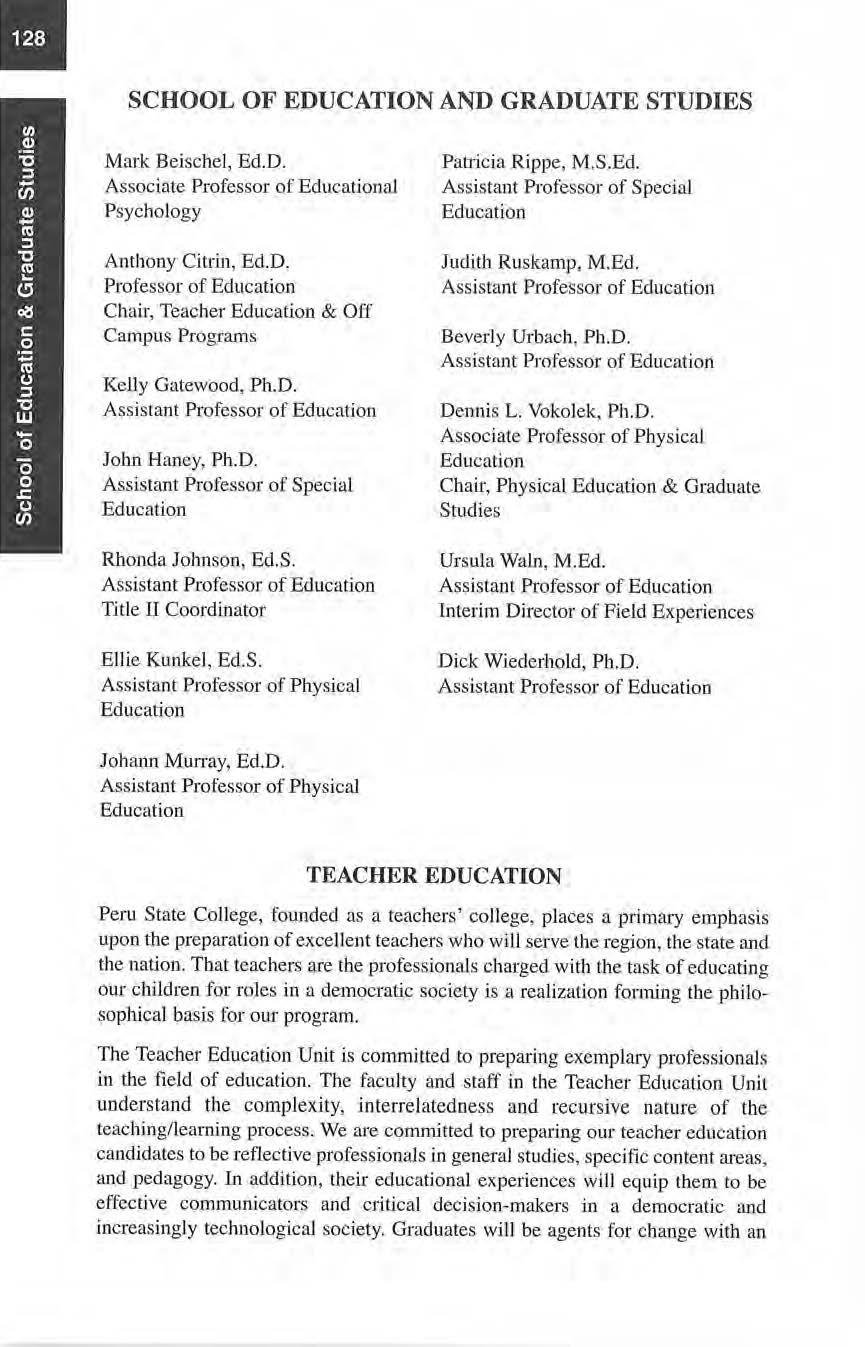
appreciation of diverse cultures and viewpoints. Therefore, we create and llpdate courses based upon our study and reflec tion on current research and professional writing. We encourage diverse field experiences, co-cunicula.r activities and profess ional opportunities. We believe that the self-directed individual unders tands that learning is a lifelong process that invo lves continual growth.
Th e Schoo l of Education and Graduate Studies provides teacher preparation programs in accordance with the guidelines set forth by the Nebraska Department of Education. The Nebraska Department of Education requires that individuals seeking teacher ce.rtification be qualified fo r endorsement in ooe field or one s ubject. Subjects and fields are defined as follows:

Field : Field refers to two or more c losely related subjects. For examp le, Social Science is a field while Hi s tory is a sllbject; or Physical Science is a field while Biology and Chemistry are considered subjects; or Elementary Education is a field including all the subjects taught in grades kindergarten through grade eight.
Subject: Subject refers to specific courses s uch as English , Psychology. or History Education
Th e School of Education and Graduate Studies offers teacher preparation programs in the followiug fields and s ubj ects:
Teaching FieJds
Art (K-12)
Elementary Education (K-8)
Language Arts (7-12)
Mathematics (7- 12)
Music (K- 12)
Middle Grades Education (4-9)
Natural Science (7- 12)
Phy s ical Science (7- 12)
Social Science (7-12)
Special Education (K-9, 7-12) (Mild/Mod erate ly Disabled)
Teaching Subjects
Biology (7- 12)
Basic Business (7-12)
Chemistry (7-12)
Eady Childhood Educ. (P-3)
English (7-12)
Hi st0ry (7-12)
Phy s ical Education ( K.-6, 7- J2)
Preschool Di sabilitjes (P -K)
*Vocal Music (K-6)
*This endorsement is only available to candidates who possess or intend to graduate with an endorsement in elementary education.
An additional s upplemental teachin g endmsement in Coaching is available with most of the above areas.
For complete information regarding teacher education requirement s and teacher certificatio n , contact the Certification Officer, School of Education and Grad uate Studies at P eru State College, or the Director of Teac her Certification , State Department of Education , Lincoln, Nebraska 68509.
Offutt Air Force Base Extension Program
The Offutt AFB Extension Program offers non-traditional, accelerated teacher preparation programs with priority enrollment to active and retired military, Offutt AFB employees, their dependents, and as space is available, civilians. These programs include the Eleme11tary Education and Middle Grades field endorsements, selected gene ral studies classes and the Secondary Education curriculum. These programs will meet the initial Nebraska teacher certificati on requirements. The content cou rses required for secondary endorsement are not offered by the Offutt program. Admjssion, degree, and course reqnirements are the same as on-campus. information regarding the Offutt Extension Program is avai l able by contacti11g the Peru State College Offutt Office, Base Education Center, 106 Peaoekeeper Suite # 806, Offutt AFB, NE 68113. Phone ( 402) 293-1764.
Admission to Teacher Education

Admission to Peru State College does not equate witi1 admission to teacher education. To initiate the process of admission into teacher education, the studeot is required to file a formal application and to meet or exceed a ll necessm·y admission requirements. Once the admission requirements have been met, tbe teacher education committee reviews eac h candidate for admission into teacher educatfon. Students will be notified in wri ti ng if they have been fully admitted or denied admission into teacher education by the Teacher Education Committee. The Teacher Education Committee meets on a regular basis during the Fall and Spring semesters.
Students who transfer cred it from another institution, or stqdents who hold a bachelor' s degree and are seeking only a teaching endorsement , must apply to teacher education immediately upon entering Peru State College. These students should cont act the De an of Education and Graduate Stu dies for .an immediate interview and transcript evaluation. Upon completion of this interview, they should file an Application for Admission to Teacher Education with the School of Education Office Assistant.
Applicants must meet th e following criteria and conditions prior to review for a dm.is sion by tbe Teacher Education Commi ttee:
I . Applicant must be free from social prnbation.
2 . Applicant must possess an overa U grade poinl average of at least 2.5 with at least 54 c redits completed
3 Applicant must possess minimum scores on the Pre P rofessional Skills Te st as follows:
OFFICIAL INSTITUTIONAL SCORE REPORTS ARE REQUIRED. Reading 170 The Praxi s Series Reading 316 Math 171 The Praxis Series M ath 316 Writing 172 The Praxis Series Writing 318
4. Applicant must have recommendations from two Peru State College instructors who are in a position to assess the student as a prospective teacher.
5. Students entering Peru State College as freshmen during the fall semester 2001 (and thereafter) must enroll in pre-requisite course work prior to receiving admission to Teacher Education. The fo]lowing courses must be taken : EDUC 208, SPED 200, PSYC 250, EDUC 205 and PE 101. Please vis it with an advisor for additional information.
6 . Applicant must provide evidence of proficiency in English Composition and Mathematics as indicated by a grade of C or above in co Uege level courses or scores at or above the fiftieth percentile on the English and Mathematics sections of the ACT or 800 on th e SAT.
7. The Nebraska Stale Department of Education's Ru le 21 .requires that the following policy be in effect.

N ebraska Felony and Misdemeanor Policy
All teacher education ins tit ut ions shall requi1·e the prospective student teacher to affim1 under oath that he or she has no fe lony convictions, nor misdemeanor convictions involving abuse, neglect, o r injury to any person, or any othet convictions uwolving moral tw-pitude.
A person with a conviction as indicated in the rule shall not be allowed to participate in pre-sLUdent teaching field, laboratory, and classroom experiences o r student teach without approva l by the State Board of Education.
To conftrtn that they meet this requirement, all students shall complete an oath PRIOR to participation in pre-student teaching field, laboratory, and classroom experiences or student teaching.
In compliance with this rule the following Peru State College policy is in effect: NO STUDENT WILL BE ALLOWED TO PA RTICIPATE IN PRE-STUDENT TEAC HING FIELD , LABORATORY, AND CLASSROOM EXPERIENCES OR STUDENi TEACH U NTil., A NOTARIZED OATH OF P ER SONAL AND PROFESS IONAL FITNESS HAS BEEN PRESENTED TO THE DIRECTOR OF FIELD EXPERIENCES.
PERSONS WITH A RECORD OF C ONVICT IONS MUST CONTACT THE CERTIFICATION OFFICER BEFORE ENROLUNG IN ANY PRE-ST UDENT TEACHING FIELD , LABORATORY, AND CLAS SROOM EXPERIENCES OR STUDENT TEACH.
S TUDENTS FOUND TO BE IN VIOLATION OF THE NEBRASKA FELONY AND MISDEMEANOR POLICY MAY B E REMOVED FROM ANY OR ALL FIELDWORK.
Nebraska Emotional and Mental Incapacity Status
Nebraska Rule 21 states the following:
005 .0lK Al1y student applying for admission to Teacher Edu cation shall not have an emo tional or mental in capacity to practice the profession as evidenced by a legal adjuclication or dete1mination thereof by other lawful means . Such evidence being any of the following:
005 0lKl Such perso n i s, at the time of the consideration of the person's fitness to hold a cert ificate , a mentally ill dangerous person under 83-1009
R.R.S. as evidenced by a declaration or order to that effect by a mental health board of this s tate , oras evidenced by a s imilar finding by a s imilar body of another state.
005.0lK2 Suc h person is , at the time of the consideration of the person's fitness to hold a certificate, a mentally ill indiv idual as defined in 20-164 R.R.S., ("a n individual who has a significant mental illness or emotional impairment as determined by a mental heal th professional qualifi e d under the laws, Illies and regulations of this state and who is an inpa t ient or: resident of a facility for mentally ill individuals) or similar determinations has been made by similarly qualified menta l health professional(s) of another state.
005. IK3 Such p e rson has been declared by a court as mentaUy incompetent in relation to s tanding trial for a criminal charge pursuant to 29- 1822 R.R.S. or 29-182-3 R.R.S., o r similar law s of another state, and has not been found by court to have recovered from such incompetency.

005.01K4 Such perso n has been acquitted of a criminal charge on the basis of a fincling of insanity under 29-2203 R.R.S. or similar laws of aoorher state, unless a court, s ubsequent to such an acquitta l , has found that such person is not dangerous to himself, herse lf, or others by reason of mental illness or defect and has released such person from court ordered treatment purs uant to 29-2702 R.R. and 29-3703 R.R.S., or similar laws of another state.
005.0 I KS A court has found such person to be an mcapacitated person in need of a court appointed guardian pursuant to 30-260 l R. R .S. and 302620 R.R.S. , or s imilar Jaws of a110ther state, and no court order has been entered that such person' s incapac ity has terminated .
005.01K6 A cou r t has appointed a conservator or made other pmtective order(s) due to a couit's find ing that such person in unable to manage his or her property and property affairs effectively for reasons whic h include any of the following: (J) mental illness ; (2) mental deficiency; (3) chronic use of drugs; and (4) chronic intoxication, pursuant to 30-2630 R .R.S. or similar laws of another state, and no cow-t order has been entered that t he d isability of the person has ceased.
II
Students are required to compl ete a Personal and !Professional Fitness Statement PRIOR to all field placements. This s tatement must be on file within the Schoo l of Education and Graduate Studies prior to the student starting his/her placement.
Admission to Student Teaching
Candidates who wish to student teach must submit applications and attend a student teaching stude 11t-teachets seminar prior to th e student teaching term. Deadlines to subm it a ppli cations will be announced. To be eligible to enter student teaching, candidates must meet the following requirements:
I. Received officia l notification of their acceptance into the Teacher Education program.
2. An overall GPA of at least 2.5.
3. Earned enough credits to graduate within one (1) semester following student teaching. Student must submit an upd;ated progress sheet, signed by the advisor, with the application.
4. Please see the Director of Field Experiences for information regarding specific courses that must be completed prior t.o student teaching
S. Completed a mJoimum of 12. hours of credit at Peru State College.
6 Provided a swam statement that the student has not been convicted of a felony or misdemeanor. Persons with a record of conv ictions must contact the certification officer before enrolling in 1any pre-student teaching, field laboratory, and classroom experiences of student teacb.i.og.

7. Provide a sworn statement about emotional and mental incapacity status .
8. Provide evidence of liability insurance coverage designed for coverage in the professional educational setting. (Cune1Jll PSEA/SEAN/NEA membership provides 1iabiHty insurance coverage.)
Student teaching is offered on a credit/no credit !bas is . No letter grades wiJl be awarded. Student teachers wiJJ be evaluated in an on-going manner by the classroom cooperating teacher and a college supervisor. A student teaching handbook is available from the Director of Fie ld Experiences.
A number of twelve hour certificate programs of study are available. Topics include Classroom Behavior and Management, and Instructional Technology.
TEACHER EDUCATION
The School of Education and Graduate Studies offers the Bachelor of Science degree with a major i1'1 Educati on. The Bachelor of Science degree prepares a student to teach in Elementary or Secondary Schools. Options are available in Elementary Education, Middle Grades Education , Spec ial Education: Elementary or Secondary, Early Childhood Education, Physical Education Elementary or Secondary, and Preschool Disabiilities Education.
All required coursework in the Education Core, Core Competencies (as required by the Nebraska Department of Education) and Options must be completed with a minimum grade of "C."

In addition to the requirements listed below, all teacher education students must take Psych 255 Diversity Issues. The Teacher Education Unit is committed to the importance of student advising. Students must contact their advisors on a regular basis.
Please see catalog descriptions regarding pre-requisites and co-requisites.
Education Core
All students seeking certification in any endorsement option area are required to complete the following courses:
Educ **208 Orientation and Practicum Educ **205 Educational Psychology Educ *300 Classroom Manageinent & Effective Teaching Educ ***317 Tests and Measurements Educ *400 Philosophical Foundations of Education P syc **250 Human Growth & Development SpEd **200 Introduction to Special Educa1tion * Student Teaching Total for Education Core ;• Course requires admission 10 Teacher Education prior 10 enrollment. Hours l 3 2 2 3 3 3 16 33 ** Students must complete these courses and PE 101 prior to receiving admission to Teacher Education. *** Special Edu(,-ation and Phys ical Education majors may subslitute apprnpriate assessment chlss See an academ ic advisor.
AU students seeking an e ndorsement in Elementary Education (grades Kindergarten - e ight. (8) must complete the following Opti o n in Elementary Ed ucation.
Secondary Education Option
In co njunction with the Edu cation Core the following classes are required for any e ndorsement to teach in grades seven through twelve. Add iti onal coursewo rk is required in the S ubj ect Area. See e nd o r sement program

E lem e nta ry
E ducation Option
Ho urs Edu c *301 Practicum - Social Studies & Language Arts I Educ *30 2 Practicum Math & Scien ce I Educ *325 Teaching Language Arts in Elem/M iddle School 3 Educ *326 Teac hing Social Studies in Elem/M idd le School 3 Educ *327 Teaching Math in El em/Middle Sch ool 3 Educ *328 Teac hing Science in Elem/Middle Schoo) 3 Educ *334 Teaching Rending in Elementary School 3 Educ *403 Diagnostic and Remedial R eading 3 Eng 203 Literature for C hildren Through Adolescence 3 Art 308 Att Exp loration 3 Mu se 251 Ele mentary Mu sic Methods 3 PE 3 13 Elementary/Middle Sc hoo l Phy si cal Edu.cation 3 Total Cor E leme ntary Ed uca tion Option 32 To tal for Elementary E du ca tion E ndorseme nt 68 Courses marked with au asterisk require admission to Teacher &lucatio11.
tio
ssio nal Stu dies -a nd/or
Sciences. Ed uc *309 Secondary Practicum Educ *3 10 S econdary Meth ods (o r Subject Area Methods Course) Educ *434 Secondary Reading & Writi ng Across the Curriculum TotaJ for Secondary Ed ucation Option Total for Secondary E ducation Endo rsement • Courses marked with an asterisk. require admission to Teacher &lucation. Hours 2 3 3 8 41
descrip
ns in Profe
Arts a nd
K-l2 Teacher Ed ucation Progra ms
Peru State College offers programs to prepare individuals to teach from kinderga1te11 through the twe!f(h grade in the areas of Art and Music. Students working toward K-12 certification must meet the same tequirements and follow the same professional teacher education programs as Secondary Education candidates witb tbe exception of practi cum and studen t teaching, which m ust include experiences with both e lemen tary and secondary students.
Early C hi ldhood Education Option
This program wil l e ndorse an individual to teach Early Ch ild hood grades Prekindergarten through three (3).
Educ *301 Practicum - Social Studies and L anguage Arts
Educ *302 Practicum - Math and Sci ence
Bduc *305 Principles of Early Childhood Educa tion

Educ *308 Early Ch ildhood Practicum
Educ *325 Teaching Lang Art s in Elem/Middle School
Teachi
Science in Elem/Middle School Educ *334 Teaching R ead ing in Elementary Schoo l Educ
Educ *326 Teaching Social Studies in Elem/Middle School Educ *327 Teachin g .Math in Elem/M iddle School Educ *328
ng
*40 l Emergent Literacy
Educ 438
Parents and Families
on
courses: Art 308 Art Exploration or M use 251 Elementary Music Methods Total for Early Childhood Option Total for Ea rly Childhood Endorsement * Cour~es m.irked with au asterisk require adn1ission to Teacher Education Hours l 1 3 2 3 3 3 3 3 2 3 3 3 3 3 36 72
Educ *402 Methods in Early C h.ildhood Edu cation Educ *403 Di agnostic and Remedial Reading
P rofessional Collaboration with
Select
e (1 ) of the foUowin,g
Middle Grades Education Optioo
This program will e ndorse an individual to t each: (A) any or all stu dents in a sel fcontained classroom in grades four (4) through nine (9), ( B ) the areas of s pecial preparation in an integrated team planning/teac hin g organizational pattern in grades four (4) through nine (9) or (C) the areas of special preparation in classrooms with other organizational pattems in grades four (4) through nine (9) .
Educ *30 1
Educ *302
Educ *325
Educ *326
Ed11c *327
Educ *328
Educ *33 4
Educ *434
Educ *40 3
Educ *425
Pra ctic um - Social Studies and Langu age Atts
Practic um - Math and Science
Teaching Language Arts in Elementary / Middle School
Teaching Social Science in Elementary/Middle School
Teach ing Math in Elementary/Middle School
Teac hing Science in Elementary/Midd le School
Teaching Reading in E lementary School or
Secondary Reading and Writing Across the Curriculum
Diagnostic and Remedial R eading
Teaching in the Middle Grades
Select one {1) of the following courses:
Art 308 Art Exploration or
Muse 2 51 Elementary Mu s ic Methods
Total for Middle Grades Option
Total for Middle Grades Endorsement
Additional Requirements For Middle Grades
Special Area Requirements: This endorsement shaU assure that the applicant has special knowledge in two or more content areas of specializat ion. The cutTent Nebraska Department of Education standards require the applicant to have 18 dis6nct semester hours in each of two Special Areas. Special Areas may be chosen from any one of tbe fow- broad fields listed be low:

Fine and Practical Arts Humanities Sciences Social Sciences
The course of study in the content areas of specialization will be developed for each student earning a middle school grades endorsement.
* Courses marked with an aste1isk require admission to Teacher Education ,
Hours l I 3 3 3 3 3 3 3 3 3 3 26 62
Special Education Option: E lementary
This program will endo rse au individual to teac h Elementary Spec ial Education (Mi ld /Moderate Disab iUti es) in grades Kindergarten (K) through nine (9).
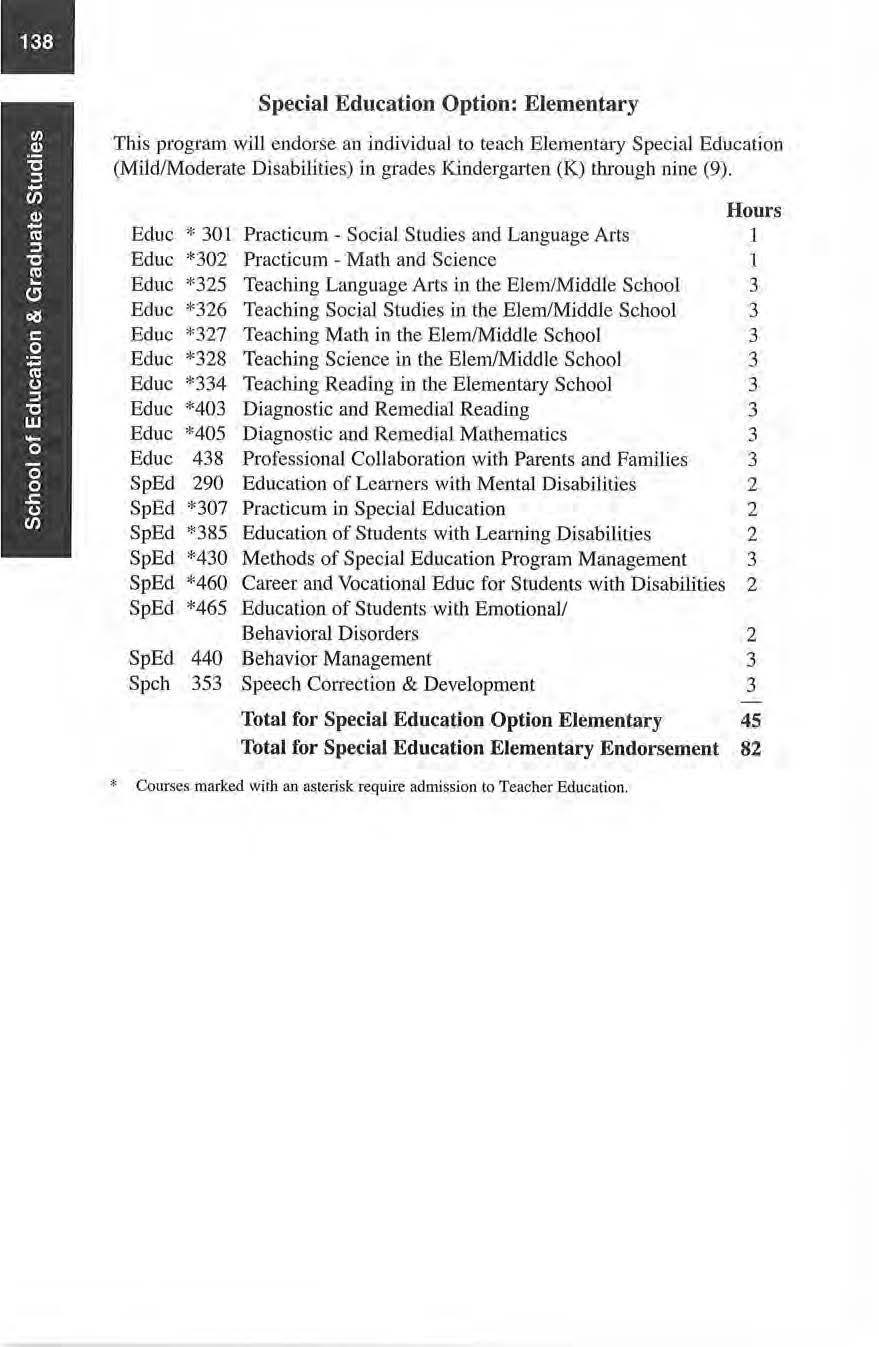
Educ * 301 Educ *302 Educ *325 Educ *326 Ed uc *327 Ed uc *328 Educ *334 Educ *40 3 Belue *405 Educ 438 SpEd 290 SpEd *307 SpEd *385 SpEd *430 SpEd *460 SpEd *465 SpEd 440 Speh 353 Prac ticum - Social Studies and Lang ua ge Arts Practicum - M ath and Science Teac hing Language Arts i n the E lem/Midd le School Teach in g Social Studies in the Elem/Middle School Teachin g Math in the Elem/Middle School Teaching Science in the Elem/Middl e School Teaching Reading in the Elementary School D iagnostic and Remedial Reading Diagnost ic aod Remedial Mathematics Profe ssional Collaboration with P arents and Fami li es Hours 1 1 3 3 3 3 3 3 3 3 Education of Learne rs with Mental Disabilities 2 Practicum in Special Education 2 Education of Students with L earning Disabilities 2 Method s of Spec ial Education Program M anagement 3 Career and Vocational Educ fot Students with Disabilities 2 Education of Students with Emotional/ Behavioral Di sorders Behav i or Management Speech Correction & D evelopment 2 3 3 Total for Special Education Option Elemenblry 4 5 Total for Special Education Elementary Endorsement 82 * Courses marked 1virh an asterisk req uire admission to Teacher Ed uca tion
Special Education Option: Secondary

This program will en dorse an individual to teach Special Education (Mild / Moderate Disabilities) grades seven (7) through twelve (12).
• Courses marked with an asterisk require admission to Teacher Educulioa.
Preschool Disabilities Education Option
This program will e ndorse an indiv idual to teach infants and yo un g c hil dren through age five who hav e disabi lities
• Courses marked with an asterisk requ ire admission to T eacher Educution.
Educ 375 Education of Gifted Learne rs Edu c *403 D iagnostic & Remedial Reading Educ *405 Diagnostic & Remedial Math Educ 438 Professional Collaboration with P arents and fami li es SpEd 290 Educatio n of Learners with Mental Disabili ties SpEd *307 Practicum in Spe.cia l Education SpEcl *385 Education of Students with L earning Di sabi li ties SpEd *430 Methods in Special Educat ion Program M a nagem e nt SpEd 440 Behavior Management SpEd *460 Career & Vocational Educ for Students with Disab ilit ies SpEd *465 Education of Smdent s with Emotional/ Behavioral Di sorders Hours 3 3 3 3 2 2 2 3 3 2 2 Speh 353 Speech Correction & Development 3 Tota l for Special Education Option Secondary 31 Total for Secondary Core 8 Total fo r Special Education Secondary Endorsement 75
Educ *30 1 Practicum - Social Studies a nd Lang Arts Ecluc *302 Prac ticum - Math and Science Ecluc *305 Principles of Early Childhood Education Educ *325 Teaching Langu age Arts in the El e m/Middle School Educ *326 Teaching Social Studies in the Elem/Middle School Educ *327 Teac hing Math in the Elem/Middle Sc hool Educ *328 Teac hing Science in the Elem/Middle School Educ *334 Teaching Reading in the Elementary Sch ool Educ *401 Emerge nt L iteracy Ecluc 438 Professional Collaboration with P arents and Families SpEd *309 Preschool Disabilities Practicum SpEd *405 SpEd /Early Childhood Characteristics & Methods SpEd 440 B ehavior Management Hours l l 3 3 3 3 3 3 2 3 2 3 3 Total for Preschool Handicapped Option 33 Total for Pres chool Handicapped Endorse ment 70
PHYSICAL EDUCATION
The School of Education and Graduate Studies offers programs for individuals w ishing to major in Physical Education which will enable g r aduates to become certified as Pl1ysical Education teachers in the public schools or to be come qualffied for careers in Spons Management and to enable students to meet the requirements for certification as coaches (Non-teaching PE majors must choose tbe Sport Management Option )
Physical Education (K-6) Option
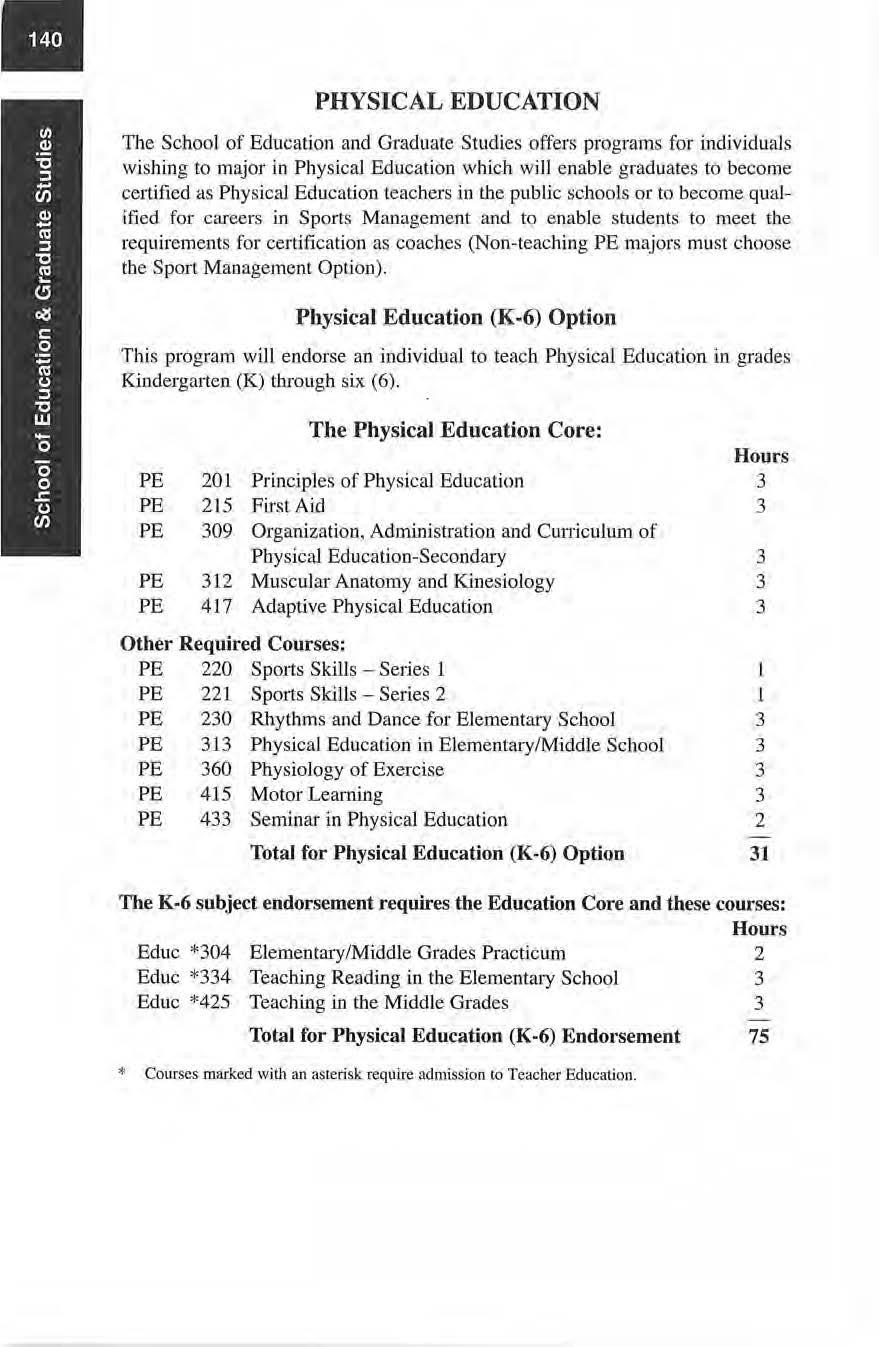
This program will endorse an individuaJ to teach Physical Education in grades Kjt1dergarten (K) through six (6).
The K-6 subject endorsement requires the Education Core and these courses:
The Physical Education Core: Hours PE 201 Principles of Physical Education 3 PE 215 First Aid 3 PE 309 Organization. Administration and Cuniculum of Physical Education-Secondary 3 PE 312 MuscuJa.r Anatomy and Kinesiology 3 PE 417 Adaptive Physica l Education 3 Other Required Courses: PE 220 Spo1ts Skills - Series 1 PE 221 Spo1ts Skills - Series 2 PE 230 Rhythms and Dance for Elementary School 3 P E 313 Physical Education in ElementaryfMiddle School 3 PE 360 Physiology o f Exercise 3 PE 415 Motor Learning 3 PE 433 Seminar in Physical Education 2 Total for Physical Education (K -6) Option 31
Educ *304 Elementary/Middle Grades Practicum Educ *334 Teaching Reading in the Elementary School Educ *425 Teaching in the Middle Grades Hours 2 3 3 Total for Physical Education (K-6) Endorsement 75 * Courses marked w ith an a sterisk require admission to Teacher Education.
Physical Education (7-12) Option
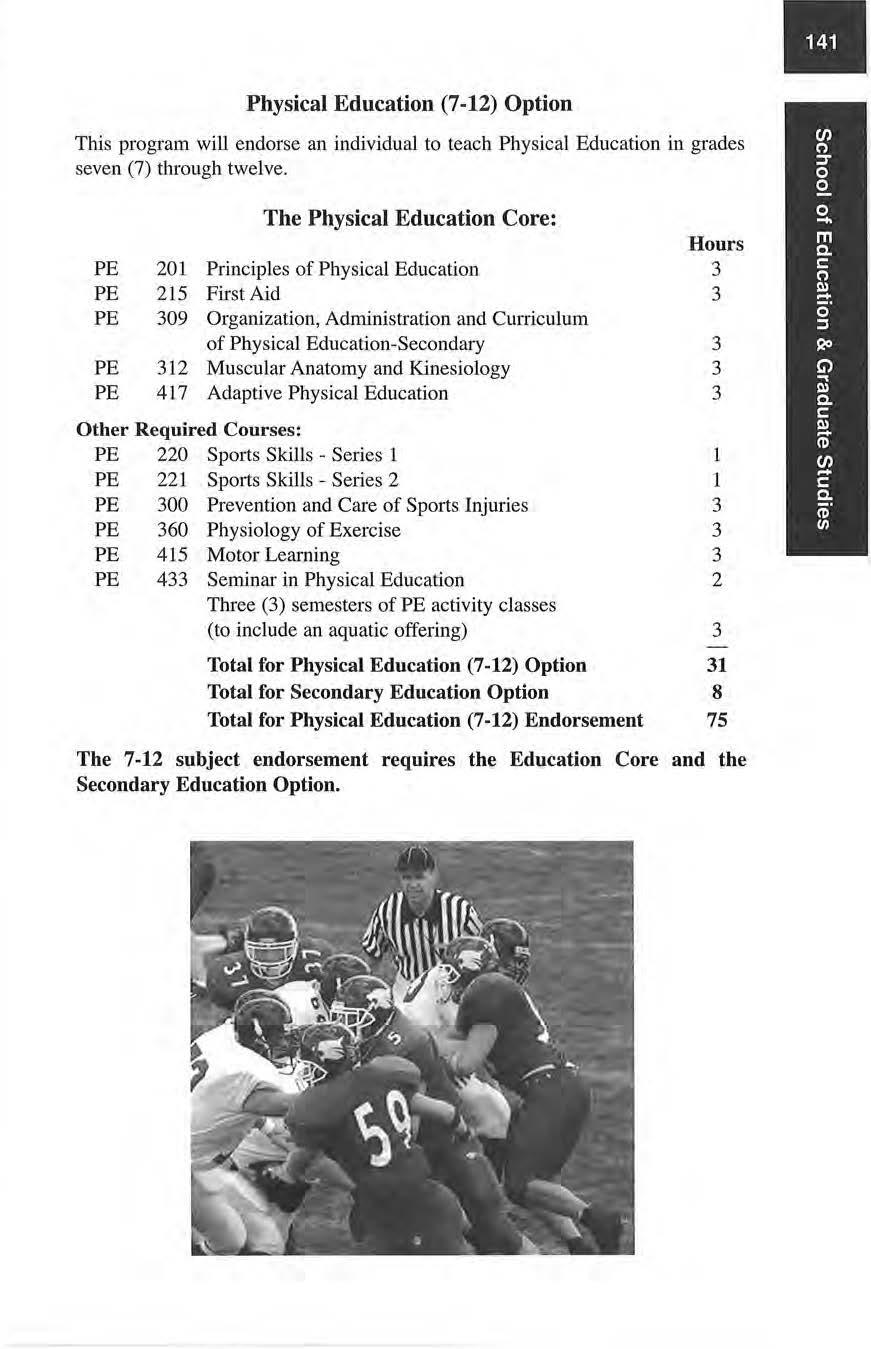
Thj s program will endorse an inilividual to leach Physical Education in grades seven (7) through twelve.
The 7 -1 2 subject endorsement requires the Ed ucation Core and the Secondary Education Option.
PE PE PE PE PE The Physical Education Core: 201 Principles of Physical Education 2 15 First Aid 309 Organization, Administration and Cuniculum of Physical Education-Secondary 312 Muscular Anatomy and IGnesiology 417 Adaptive Physical Education Hours 3 3 3 3 3 Other Required Courses : PE 220 Sports Skills - Series 1 l PB 221 Spo11s Skills - Series 2 l PE 300 Prevention and Care of Sports Injuries 3 PE 360 Physiology of Exercise 3 PE 415 Motor Learning 3 PE 433 Seminar in Physical Education 2 Three (3) semesters of PE activity classes (to include an aquatic offering) 3 Total for Physical Ed ucation (7-12) Option 31 Total for Secondary Education Option 8 Total for Physical Education (7-12) Endorsement 75
Th.i s program will endorse an individual to teach Physical Education in grade s Kinderga rte n (K) through six (6) and seven (7) through twelve ( 12)
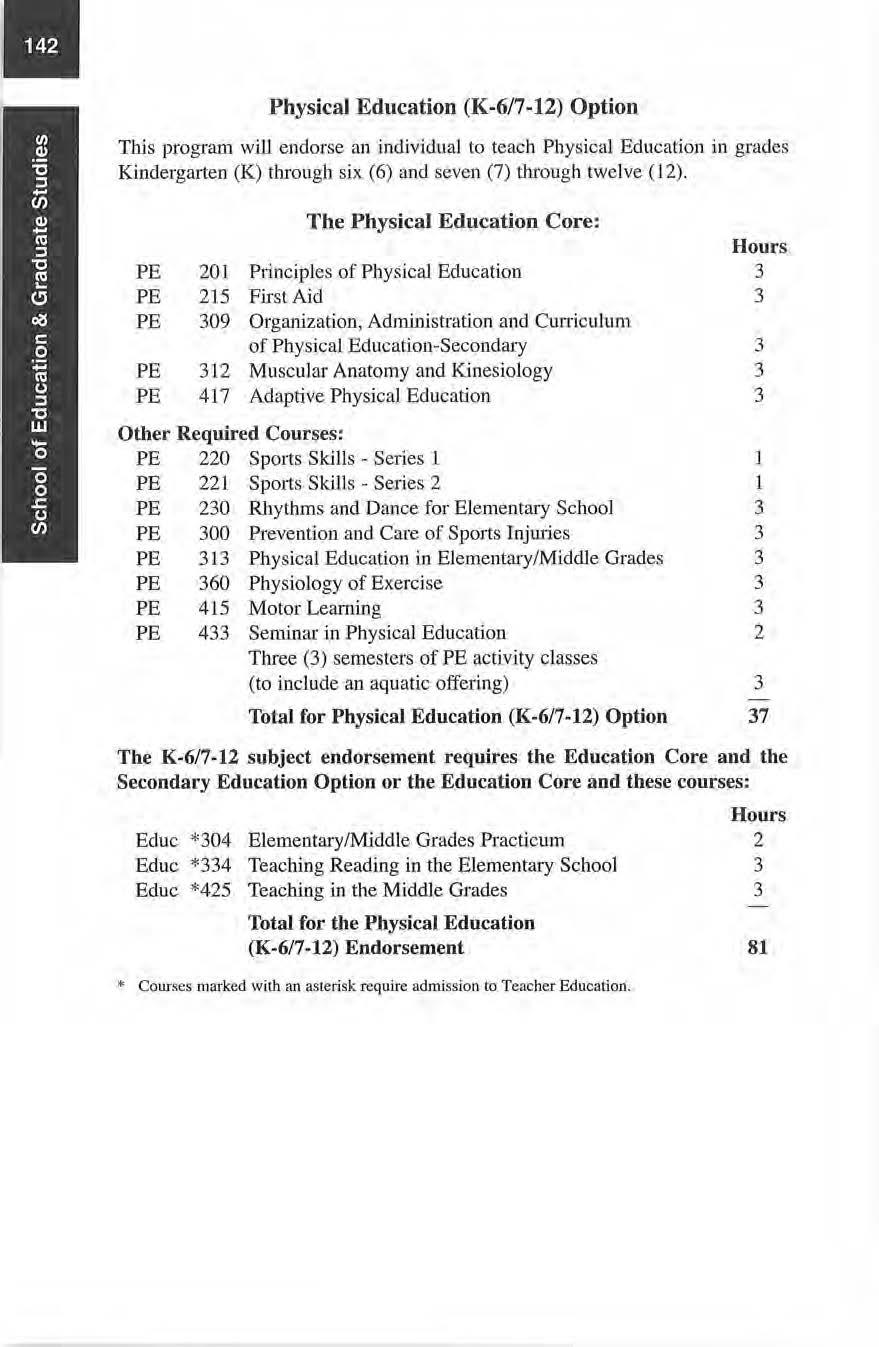
(K-6/7-12)
Physical Educatio n
O ption
PE PE PE PE PE The Ph ys ical Education Co1·e: 20 1 P1inciples of Ph ys ical Education 215 First Aid 309 Organization, Administration and Curricu l um of Physical Education-Secondary 312 Mu scular Anatomy and Kinesiology 417 Adaptive P hysical Education Other Required Courses: Hours 3 3 3 3 3 PE 220 Sports Skills - Series l J P E 221 Sports Skil ls - Series 2 l PE 230 Rhythm s and Dan ce for E le mentary Sc hool 3 PE 300 Prevention and Care of Sports lnjwies 3 PE 313 Phy s ica l Education in Elementa ry/ MiddJe Grades 3 PE 360 Phy s iology of Exerci se 3 PE 415 Motor Leaming 3 PE 4 33 Seminar in Phy sical Education 2 ihree (3) seme s ters of PE activity cl asses (to include an aquatic offeri ng) 3 Total for Physical E ducation (K- 6/7-12) Option 37 The K-6/7-12 s ubj ect e ndorsement requires the Education C ore and the Secondary Education Option or the Education Core an d th ese courses: Edu c *304 Elementary/ Middle Grades Practi cum Educ *334 Teaching Reading in the Elementary School Edu c *425 Teaching in the Middle Grades Total for the Physical Education (K-6/7 -12) Endorsement * Courses marked with nn asterisk require admission lo Teacher Education. Hours 2 3 3 81
Requirements for Athletic Coaching Endorsement
The following program is designed to fit the needs of the high school coach and leads to -an institutional recommendat ion for endorsement. Students completing this program are required to have an endorsement in Physical Education
Requirements for At hletic Coaching Endol'sement Option for Non-Physical E ducation Majors
The following program is provided for those s tudents interested in coaching interscholastic sports and who do not have an endorsement in Physical Educati~ n. It is designed to fit the needs of the high school coach and leads to an institutional recommendation for endorsement. Students completing this program are required to have an e ndorsement in an area other than Physical Ed ucation.
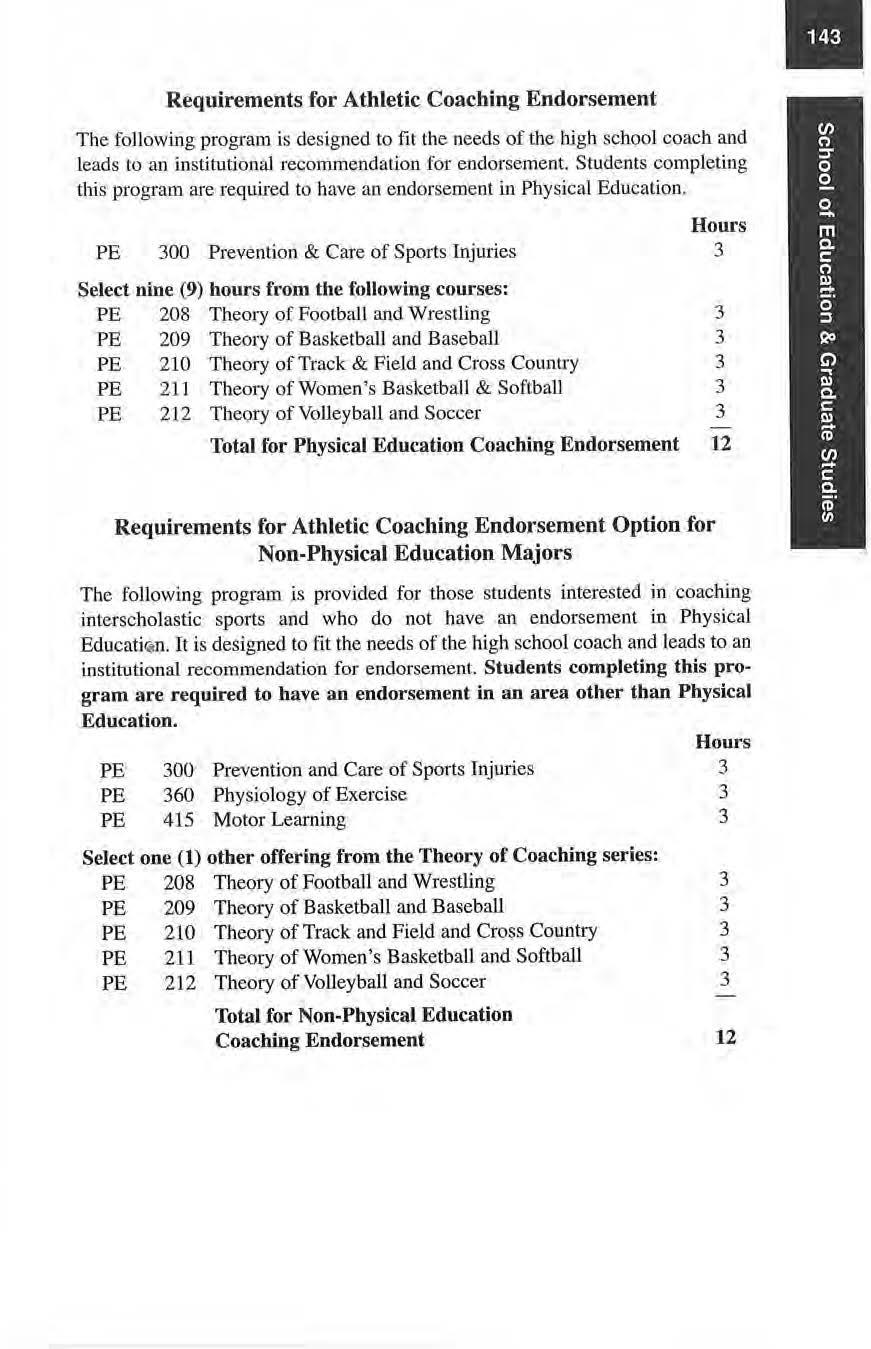
PE 300 Prevention & Care of Sports Injuries Select nine (9) hours from the following courses: Hours 3 PE 208 Theory of Football and Wrestling 3 PE 209 Theory of Basketball and Baseball 3 PE 210 Theory of Track & Field and Cross Count1·y 3 PE 211 Theory of Women's Basketball & Softball 3 PE 2l2 Theory of Volleyball and Soccer 3 Total for Physical Education Coaching Endorsement 12
PE PE PE 300 Prevention and Care of Sports Injuries 360 Physiology of Exercise 415 Motor L earning Select one (1) other offering from the Theory of C oaching series: Hours 3 3 3 PE 208 Theory of Football and Wrestling 3 PE 209 Theory of Basketball and Baseball 3 PE 2 10 Th eory of Track and Field and Cross Country 3 PE 211 Theory of Women's B asketball and Softball 3 PE 212 Theory of Volleyball and Soccer 3 Total for Non-Physical Edu cation Coaching Endorsement 12
Physical Education Sport Management Option
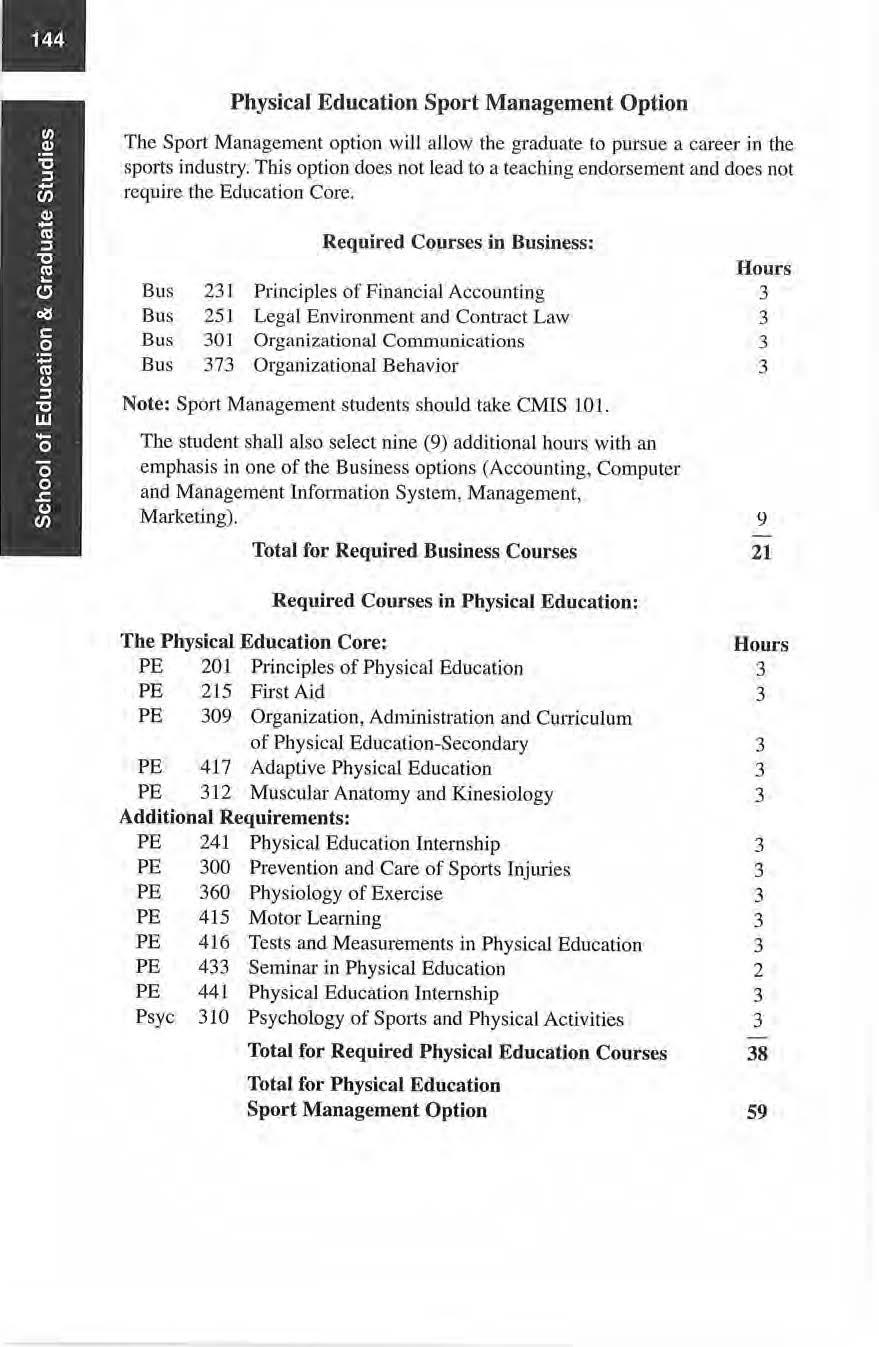
option wil l allow the graduate to pursue a career in the sports industry. Thi s option does not lead to a teaching endorsement and does not rcqujre the
The
Required Courses in Business: Bu s 23 I Principles of Fiuancial Accounting Bu s 251 Legal Environment and Contract Law Bus 30 1 Organizational Commuoications Bus 373 Organizational Behavior
Sport Management student s s hould
CMlS W1. The student shall also select nine (9) additional houJS with an emphasis in one of t he Business options (Accounting, Computer and Management Information System, Management, Hours 3 3 3 3 Marke6ng) 9 Total for Required Business Courses 21 Required Courses in Physical Education: The Physical Education Core: PE 201 Principles of Physical Education PE 215 FiJst Aid PE 309 Orga nization, Administration and Curriculum of Physical Educalion-Second,uy PE 417 Adapt ive Phy sical Education PE 312 Muscular Anatomy and Kinesiology Add itional Requirements: PE 241 Ph ys ical Education Internship PE 300 Prevention and Care of Sports Injuries PE 360 Physiology of Exercise PE 415 Motor Learning PE 416 Tests and Measurements i n Physic al Education PB 433 Seminar in Phys ical Education PE 44 l Physical Education Internship Psyc 310 Psychology of Sports and Physical Activities Total for Required Physical Ed ucation Courses Total for Physical Education Sport Management Option Hours 3 3 3 3 3 3 3 3 3 3 2 3 3 38 59
Sport Management
Educatiou Core.
Note:
take
Certificate Program
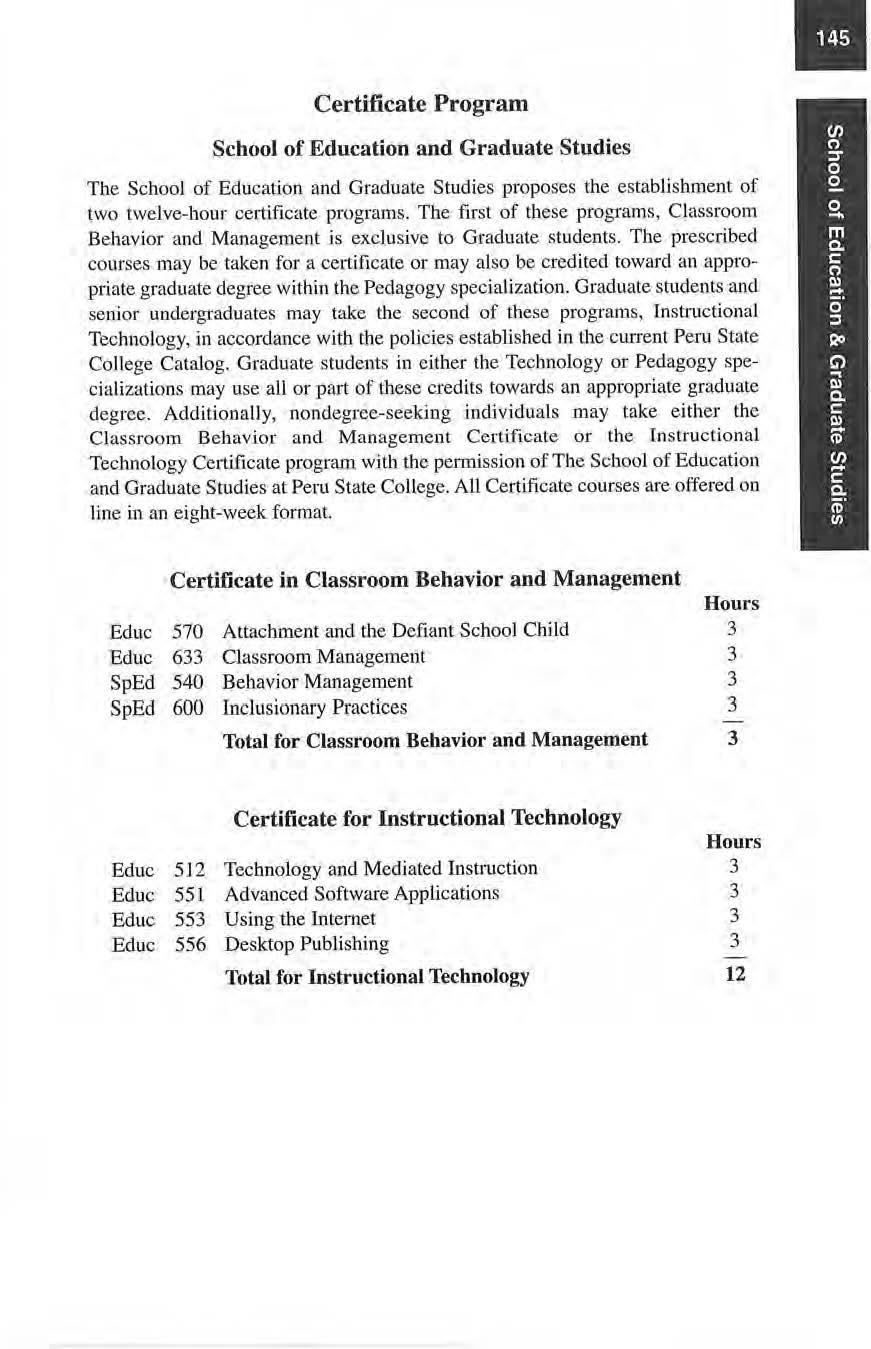
School of E ducation and Graduate Studies
The School of Education and Graduate Studies proposes the estab li shment of two twelve-hour ce rtificate programs. The ftrst o f these programs, Classroom Be havior and Management is exclusive to Graduate s tudents. The prescribed courses may be taken for a certifi cate or may also be cred ited toward an appropria te graduate degree with in the Pedagogy specialization. Graduate s tud e nts and se nior undergraduate s may take the second of these programs, ln structional Tech nolo gy, in accordance with the poli cies established in the curren t Peru State College Catalog. Graduate st ud e nts in e ither the technology or P edagogy specia li zat ions may use all or part of these credit s towards an appropriate graduate degree. Additionally, nondegree-seeking individuals may take either the C l ass room Be havior and Management Certificate or the [nstructional Technology Certificate prog ram wrn1 th e permission ofTbe School of Education and Graduate Studies at Peru State Co llege. All Certificate courses a re offered ou line in an eigbt-week format.
Certificate in C la ssroom Behavior and Management Hour s Educ 570 Attachment and the De fiant School Ch il d 3 Educ 633 Classroom Management 3 SpEd 540 Behavior Management 3 Sp&I 600 lnclusionnry Practices 3 Total for Classroom Behavior and Management 3 C ertificate for Instructional Technology Hours Educ 512 Technology and M ed i ated In struction 3 Educ 551 Advanced Software Applicatio ns 3 Educ 553 Using the lntemet. 3 Educ 556 D esktop Publi shing 3 Total for Instructiona l Technology 12
SCHOOL OF PROFESSIONAL STUDIES
Todd Drew, M.B.A. , M.Ed. Dean of Professional Studies
Assistant Professor of Business
Kelly Asmussen, Ph.D. Associate Professor of Criminal Justice and D epartment Head of P sychology and Criminal Justice
Bruce Batterson, J.D., M.B.A. Assistant Professor of Business and Department Head of Business
Judy Grotrian , Ph.D. Assistant Professor of Business
Erik Hertzel, M.B.A. Instructor of Computer and Management Inform at ion Systems
Joel Lundak, Ph.D. Profes sor of Psychology
James Nevitt, fh.D., CADAC l Assi stant Professor of Human Services
William Snyder, Ed.D Pro fessor of Business
James Thomas, Ph.D Profes sor of Business
Patrick Wray, M.B.A. instructor of Business
The School of Professional Stud ies offers programs to prepare students for a wide range of occupations in business, government, and nonprofit organizations. The programs are designed to provide marketable skills and knowledge, prepa ration for advancement on the job, and background for graduate study. Bachelor of Arts and Bachelor of Science degrees are offered in Business Adm.inistration, Criminal Ju stice, and Psychology. The B achelor of Applied Science degree is offered for individuals who wish to comp lete a degree in management after having completed a tech nical Associate Degree.
The Business Administration program off'ei-s a c hoice of options - Accounting, Computer and Management Info rmation Systems, Management, and Marketing. The Basic Business Subject Endorsement is available for individuals who wish to teach busi ness courses in secondary scboo ls . A minor in Computer and Manage ment lnfonnation Systems is also available.

The Bachelor of Applied Science program is a flexible program leading to a Management emphasis. A wide variety of electives are available to meet individual career goals.
The Criminal Justi ce program provides options iu Justice Administration, for individuals interested in developing leadership/management skills, and Jus tice Counseling, for inruvidual s interested in human services-related education. Certified Alcohol and Drug Addiction Counseling (CADAC) courses are offered.
The P sychology major features a strong set of core courses for individuals interested in eventual graduate study and electives that target interesting subjects in the field and allow students to develop sought-after human serv ices skills.
A number of twelve semester hour certificate programs of study are available. Topics inc l ude Accounting, Human Resources Management, Office Management, Retai l Management, Criminal Justice, and Human Services.
Over twenty of the School's courses are offered online, many during five, eightweek sessions each year. Online courses are a convenient way for the highly motivated student to continue or accelerate their studies without having to commute to campus. Contact Peru Online at 402-293-1764 for more inforruation
Because of generous alumni and Foundation support, the School of Professional Studies has been able to develop an International Field Experience program and associated scholarships. To date, students have studied in Australia, Costa Rica, and Ecuador.

BACHELOR OF SCIENCE

Bus 231 Bus 232 Bus 251 Bus 301 Bus 328 Bus 335 Bus 339 Bus 373 Bus *495 Econ 221 Econ 222
BUSINESS ADMINISTRATION BUSINESS CORE Principles of Financial Accounting Principles of Managerial Accounting Legal Environment and Contract Law Organizational Communications Principles of Marketing Production/Operations Management Busjness Finance Organizational Behavior Business Policy (Senior Compete ncy Course) Principles of Microeconomics Principles of Macroeconomics Total for Business Core Courses Accounting Basic Busines~ Computer and Management Information Management Option Option Subject Endorsement Systems Option Note: Required Program Prerequisites: CMIS 101 Infom1atfon Systems Concepts -and Applications Math 120 Finite Mathematics Math 340 Statistics Hours 3 3 3 3 3 3 3 3 3 3 3 33 Markeiing Option Hours 3 3 3
* CM!S ,l'l11de11r.1 will complete CMIS 495, Sysre111 ,1· Project Developmenr and Ma11agc111 e111, hmead of Bus 495, Business Policy.
Business Administration - Accoun ting Option
The Accounting option prepares student s fo r hig h-0emand careers in fin:mcial reporting a nd management. Initial cou rsework is des igned to prepare students for positions in private indus try and the Ce1tified Management Acco unt a nt (CMA) examination. Those students de siring to take the Certified Pu bl ic Accountant (CPA) examinatio n wiU n eed to comp le te tbe additional Require ments for the Publi c Accounti ng/CPA F ocus.
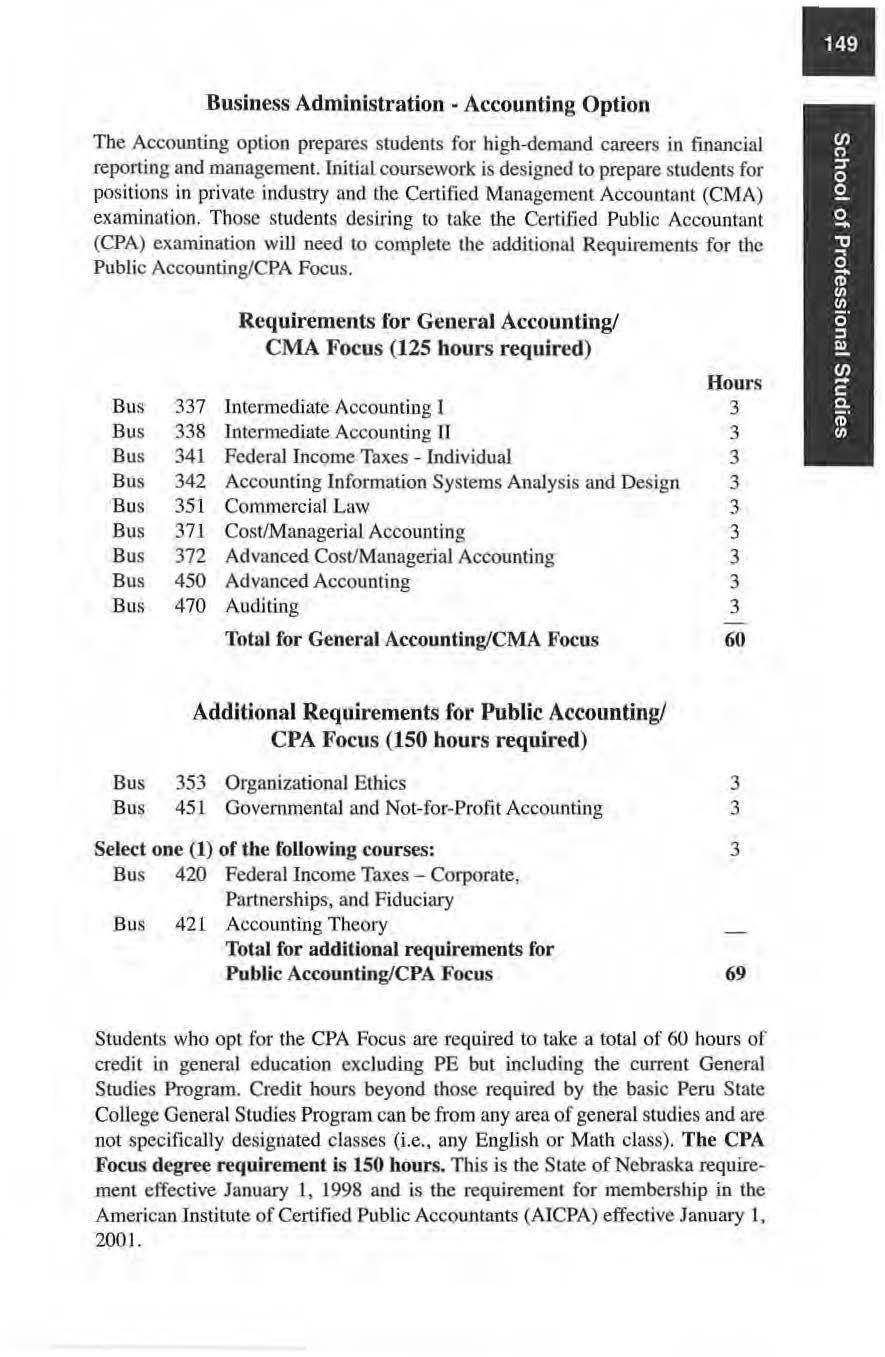
Total
Additional Requirements for Public
Students who opt for the CPA Focus are required to take a total of 60 hours of cred it in general education excluding PE but including the current General Studies Program. Credit hours beyond those required by the basic Peru S tate College General Studjes Program can be from any area of general s tudies and are not spec ifically desjgua ted classes (i.e., any Engli sh o r Math c lass). The CPA
the State
and is the requi rement fo r membership in the American Institute of Certified Public Accountants (AICPA) effective
Bu s Bus Bus Bus B u s Bu s Bu s Bus Bus
for General Accou nting/ CMA Focus (1 25 hours required ) 337 Intermed iate Account in g I 338 lntcnnediate Accounting 11 341 Federal In come Taxes - Indiv idual 342 Accounting In format ion Systems Analysis and D esig n 35 1 Comme rci al L aw 371 Cost/Managerial Accounting 372 Advanced Cost/Managerial Account ing 450 Advanced Accounting 470 Aud_iting
Requirements
for Ge neral Accounting/CMA Focus
CPA Focu s
hours
Bus 353 Organizational Ethics Bus 451 Govern mental and Not- for-Profit Accounting Select o ne (1) of the following courses: B us 420 Federal Income Taxes - Corporate, Partnerships, a nd F iduciary Bus 421. Acco unting Theory Total for additional requirements for Public Acco untin g/CPA Focus Hours 3 3 3 3 3 3 3 3 360 3 3 3 69
Accounting/
( 150
required )
Focus degree requirement is 150 hours. Thj
of Nebraska
men t effective January I,
s i s
require-
1998
Jan uary I , 200J.
Business Administration - Basic Business Subject Endorsement
The Bas ic Bus iness Subject Endorsem e nt prep ares s tud ent s for certification to t each basic busin ess courses in Nebraska publi c school s in gtade le vel s 7- 12
Stude nts in this option mus t co mplete a minimum of 33 semest e r h ours in Bus ines s and Economics and three (3) hours in information syst e ms technology. This requirement is met by completing the Bus ine ss Administration Core cou1 ses li s ted and CMIS 101 , Info1111ation Systems Concepts and Applications.
Students must compl e te the above Subject Endorsement plu s the Profe ss io nal Education courses listed in the Schoo l ofEducation and Gradu ate Studies section under tJ1e Profe ssio nal Education Sequence and under Secondai-y Education.
Business Administration - Computer and Management Information Systems Option
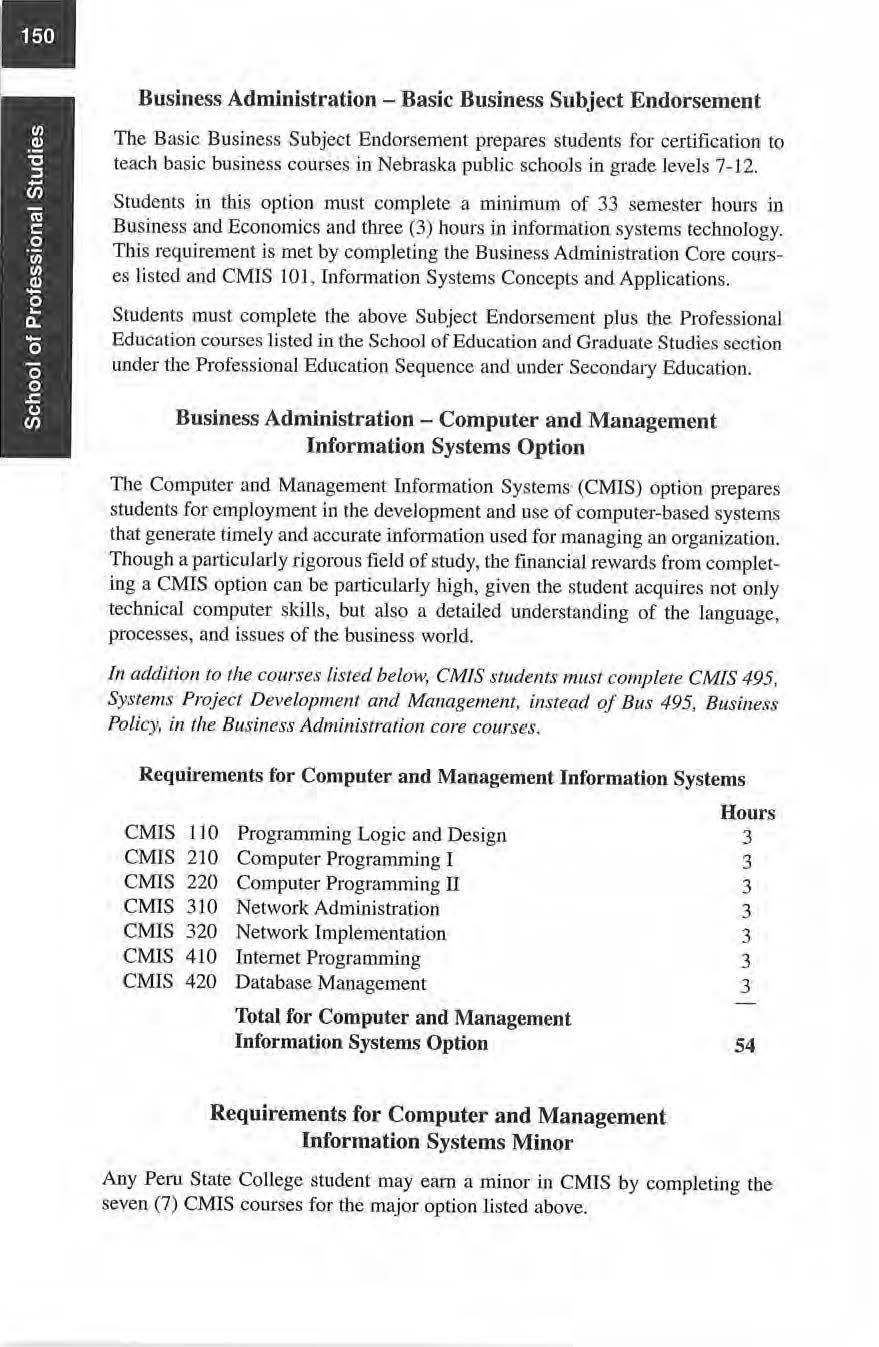
The Computer and Managem ent Information Sys tem s ( CMIS ) option prepares s tudents for e mployment in th e development and use of{:Om puter- based systems that ge nerate timely a nd accurate information used for man aging an organ izatiou. Though a particularly rigorous field of stud y, the financial rewards from completing a CMIS option ca n be particularly high , given the student acquires not only technical c omputer sk ill s, but also a de tailed und e rstanding of the l anguage, processes, and issues of the busine ss world.
In addition to th e courses listed below, CMIS students must complete CM/S 495, S ystem s Project Deve lopmen t and Managem ent, insteqd of Bus 495, Bus iiiess PoUcy, in the Business Administ ration co re courses.
Any P eru State College student may earn a minor in CMIS by comp leti ng the seven (7) CMlS courses for the major option liste d above.
Requirements for Computer and Management Information Systems CMIS l 10 CMIS 2 10 CMIS 220 CMlS 3 10 CMI S 320 CMIS 410 CMJS 420 Programming Log ic and Design Computer Programming I Computer Programming Il Network Administration Network lmpleinentation Internet P rogramming Dat abase Management Total for Computer and Management Information Systems Option Requirements fo..- Computer and Management Information Systems Minor Hours 3 3 3 3 3 3 3 54
Business Administration - Management Option
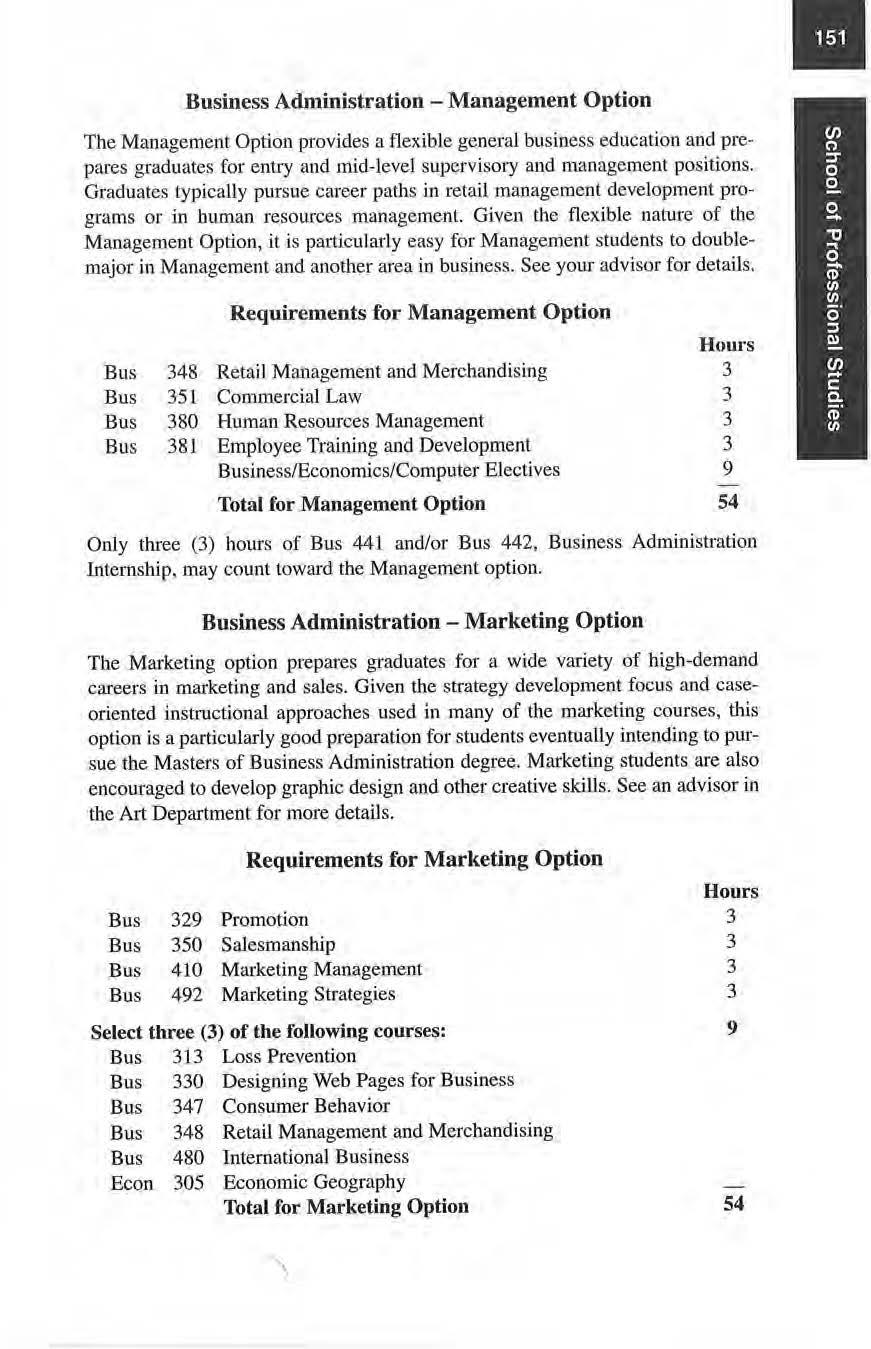
The Management Option provides a flexible general business ed ucation and prepares graduates for entry and mid-level supervisory and management positions. Graduates typically pursue career paths in retail management development programs or in human resources management. Given the flexible natu~e of the Management Option, it is particularly easy for Management students to doublemajor jn Management and another area in business. See your advisor for details.
Requirements for Management Option
Only three (3) hours of Bus 441 and/or Bus 442, Business Administration lntemship. may count toward the Management option.
Business Administration - Marketing Option
The Marketing opti on prepares graduates for a wide variety of high-demand careers in marketing a nd sales. Given the strategy development focus and caseoriented Jnstructional approaches used in many of the marketing courses, this option is a particularly good preparation for students eventually intending to pmsue the Masters of Business Administration degree. Marketing students are also encourage-d to develop graphic design and other creative skills. See an advisor in the A1t Department for more details.
for Marketing Option
Bus 348 Reta il Mai1agement and Merchandising Bus 35 l Commercial Law Bus 380 Human Resources Management Bus 381 Employee Training and Development Business /Economics/Computer E lectives Total for Management Option Hours 3 3 3 3 9 54
Requirements
Hours Bus 329 Promotion 3 Bus 350 Salesmanship 3 Bus 410 Marketing Management 3 Bus 492 Marketing Strategies 3 Select three (3) of the following courses: 9 Bus 313 Loss Prevention Bus 330 Designing Web P ages for Business Bus 347 Consumer B ehavior Bus 348 Retail Management and Merchand ising Bus 480 International Business Econ 305 Economic Geography Total for Marketing Option 54
Certificate Programs
Four 12-credit hour Certificate courses of study are avai l able to students e nrolled in degree programs as well as to ind ivid uals in the community who wish to acquire a s pecific skills set.
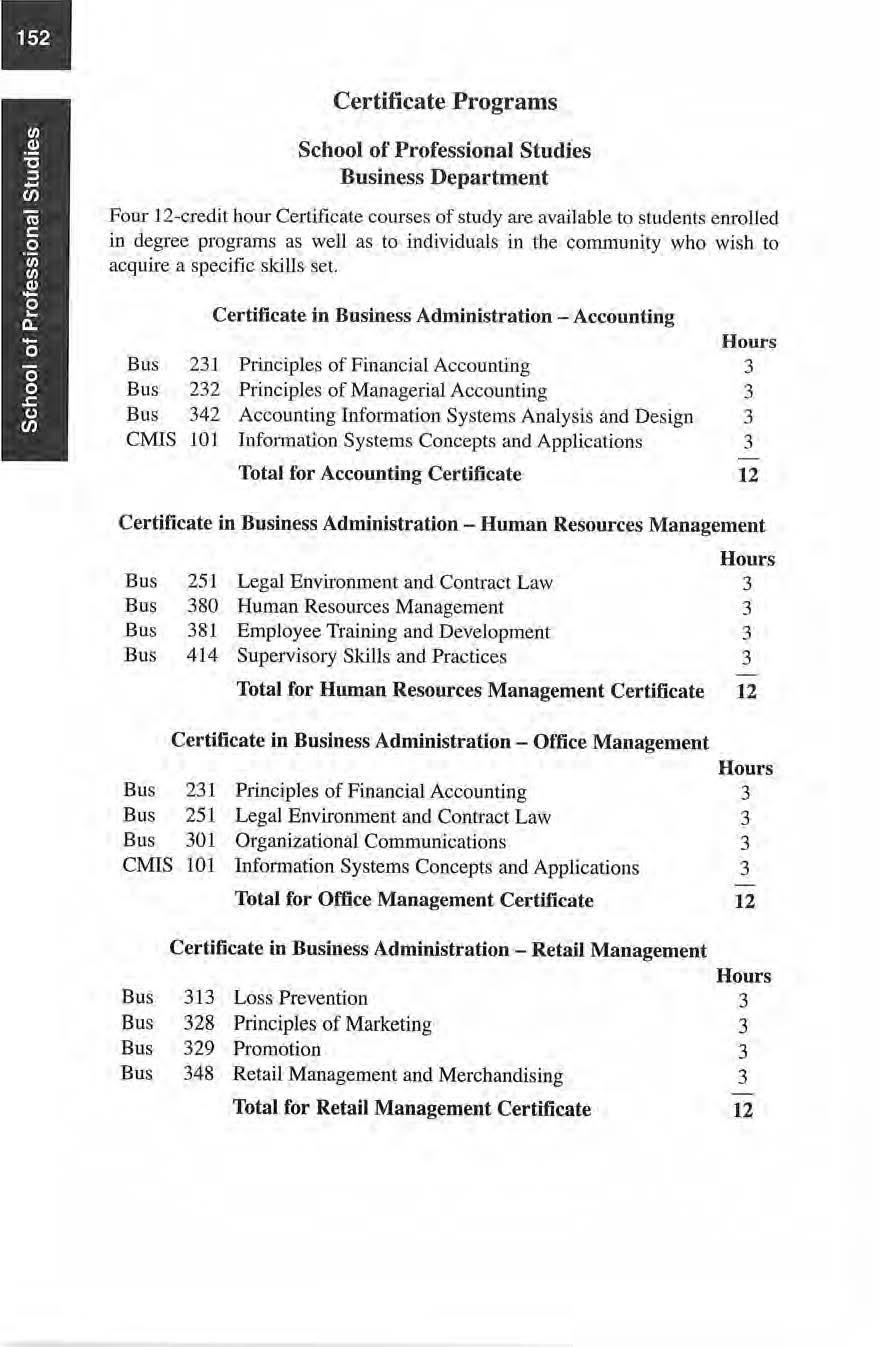
School of Professional Studies B u siness Dep a l't:tnent
Certificate in Business Administration -Accoun ti ng Hours Bus 231 Principles of Financial Accounting 3 Bus 232 Principles of Managerial Accounting 3 Bus 342 Accounting Information Systems Analysis and D es ign 3 CMIS JOI Infonnatioo Systems Concepts and Applications 3 Total for Accounting Certificate 12 Certific ate in Business Ad.ministration - Human Resources Management Bus Bus Bus Bus 251 380 381 414 Legal Environment and Conn·act Law Human R esources Management Employee Training and Developm ent Supervisory Skills and P ractices Total for Human Resources Manage ment Certificate Certificate in Business Ad ministration - Office Management Bus 231 Bu s 251 Bus 301 CMIS 101 Prin cipl es of Financial Accounting Legal Environment and Contract Law Organ izational Communications Tnfonnation Systems Concepts an d Applications Total for Office Management Certifica te Certificate in Business Administration - Re tail Management Bus Bus Bus Bus 313 328 329 348 Loss Prevention Principles of Marketing Promotion Retail Management and M erchandis ing Total for Retail Management Certificate Hours 3 3 3 3 12 Hours 3 3 3 3 12 Hours 3 3 3 3 12
BACHELOR OF APPLlED SCIENCE BUSINESS ADMINISTRATION
Pursuit of the Bachelor of Applied Science degree requil'eS the completion of a technical associate degree or equivalent. The degree is designed for those iuterested in developing management skills to complement their techt1ical background. Nearly all of the cou!'ses required to complete this degree are offered online. Contact Peru Online at 402-293-1764 for more information.
APPLIED SCIENCE CORE

Students with a wide variety of career interests can be accommodated through substitution of an individualJy-tai loted set of e lectives for the 12 e lect ive hours required. Contact the Dean of the School of Professional. Stud ies to di scuss a proposal.
Select four (4) of the following courses:
Bus Bus Bus Bus Bus Bus 3 01 328 335 339 373 496
Organizational Communications Principles of Marketing Production/Operations Management Business Finance Organizational Behavior Organizational Leadership (Sehio r Competency Course) Total Applied Science Core Note: Required Program Prerequisite: Math 340 Statistics Management Option Requirements Hours 3 3 3 3 3 3 18
Hours
12 Bus
Principles
Financial
Bus 232 Principles of Manage1'ial
g Bus 251 Legal Environment and Contract Law Bus 313 Loss Prevention Bus 348 R etail Management and Merchandising Bus 380 Human Resources Management Bus 381 Employee Training and Deve lopment Bus 410 Marketing Management Bus 414 Supervisory Skills and Practices Bus 431 Small Business Management Bus 498 Special Topics in Business Econ 221 Principles of Micro economics Econ 222 Prin ci ples of Macroeconomics Total for Management Option 30
231
of
Accounting
Accountin
BACHELOR

The Ctimina l Just ice major is an interdisciplinary soc ial science cu rriculum t hat concentrates on developing practical skills and knowledge fo r professio nal careers in the jus ti ce field . Students' studies focus on correction s, law enforcem ent, coUl"ls, juvenile justice, criminology, victimology, and research methodg to s tudy crime, criminal and ab normal behavior, and society's response . CRlMJNAL JUSTICE CORE H ours CJus 110 Survey of Criminal Justice 3 CJus 220 Introduction to Corrections 3 CJus 230 Polic ing in America 3 CJus 308 Community-Based Con-ections 3 CJus 330 Research Method s 3 C Ju s 340 Crim inal Law 3 CJus 360 Criminology 3 CJus 4 10 Juvenile Delinquency 3 CJus 420 Judicial Systems and Processes 3 CJus 441 Crimin al Justice Internship 3 CJ us 495 Seminar in Crimina l Ju stice (Senio r Competency Course) 3 Total Criminal Ju s tice Core Courses 33 Justice Administration Option Justice Counseling Option Note: Required Program Prere quisites: CMIS J 01 lnfmmation Systems Concepts and Applications Psyc 121 Introduction to Psychology Soc 201 Princ iples of Sociology Criminal Justice - Justice Administration Option Hours 3 3 3 The Ju stice Administrat ion o ption i s fo r studen ts who are interested in developing leadership/management skil ls.
OF SCIENCE CRIMINA L JUSTICE
Requirements for Justice Administration Option
Select seven (7) of th e following courses:
Bus 251 Legal Environment and Contrac t Law
Bus 301 Organizational Communications
Bus 373 Organizat ional B ehavior
Bus 380 Human Resources Management
Bus 38 L Employee l'raining and Development
Bus 4 14 Supervisory Ski ll s and Prac tices
CJus 300 Organization and Administration of Ju stice

Ous 3 13 Loss Prevent ion
CJus 385 Victimo logy
CJus 442 Crimina l Ju stice lnterns hip
PSci 426 American Constitutional Law
PSci 468 Public Administrat ion Total
Requirements for Justice Counseling Option
Hours 21
Tbe Justice Counseling optio n is for students who are interested in human services-related education. Students may take approved Certified Alcohol and Drug Addiction Counseling (CADAC) courses which are indicated wi th an asterisk(*) below. To earn CADAC cert ifi cation, in add ition to completi ng th e required courses, students must co mplete 3 00 hours of supervised field expe rience and pass the required examination s.
Select seven (7) of the following courses:
CJus 385 Victimology
CJus 442 Criminal Just ice In ternship
Educ 365 Ch ild Abuse
Psyc 250 Hum an Growth and Development*
Psyc 450 Abnormal Psychology
So Wk 300 Profes sional Ethics*
SoWk 310 Techniques of Counseling*
SoWk 320 Assessment , Evaluation, and Casework Management*
SoWk 330 Diversity Issues in Counseling*
SoWk 390 Group Worl<*
SoWk 410 Addictions*
So Wk 420 Medical and Treatment Issues in Chemical Dependency*
Hours 21
Total for Ju.c;tice Co unseling Option 54
for
Administration Option
Justice
54
BACHELOR OF SCIENCE
PSYCHOLOGY MAJOR
The Psychology major prepares s tud e nt s for grad uate s tudy as well as for careers where strong huma11 servi ces skills are necessary. Students may take approved Certified Alcohol and Drug Adiliction Counseling (CADAC) courses whi ch are indicated with an asterisk(*) below. To earn CADAC cerrification, in addition to com pleting the required courses , students must complete 300 hours oJ s upervised field experience a nd pass the required examinations.
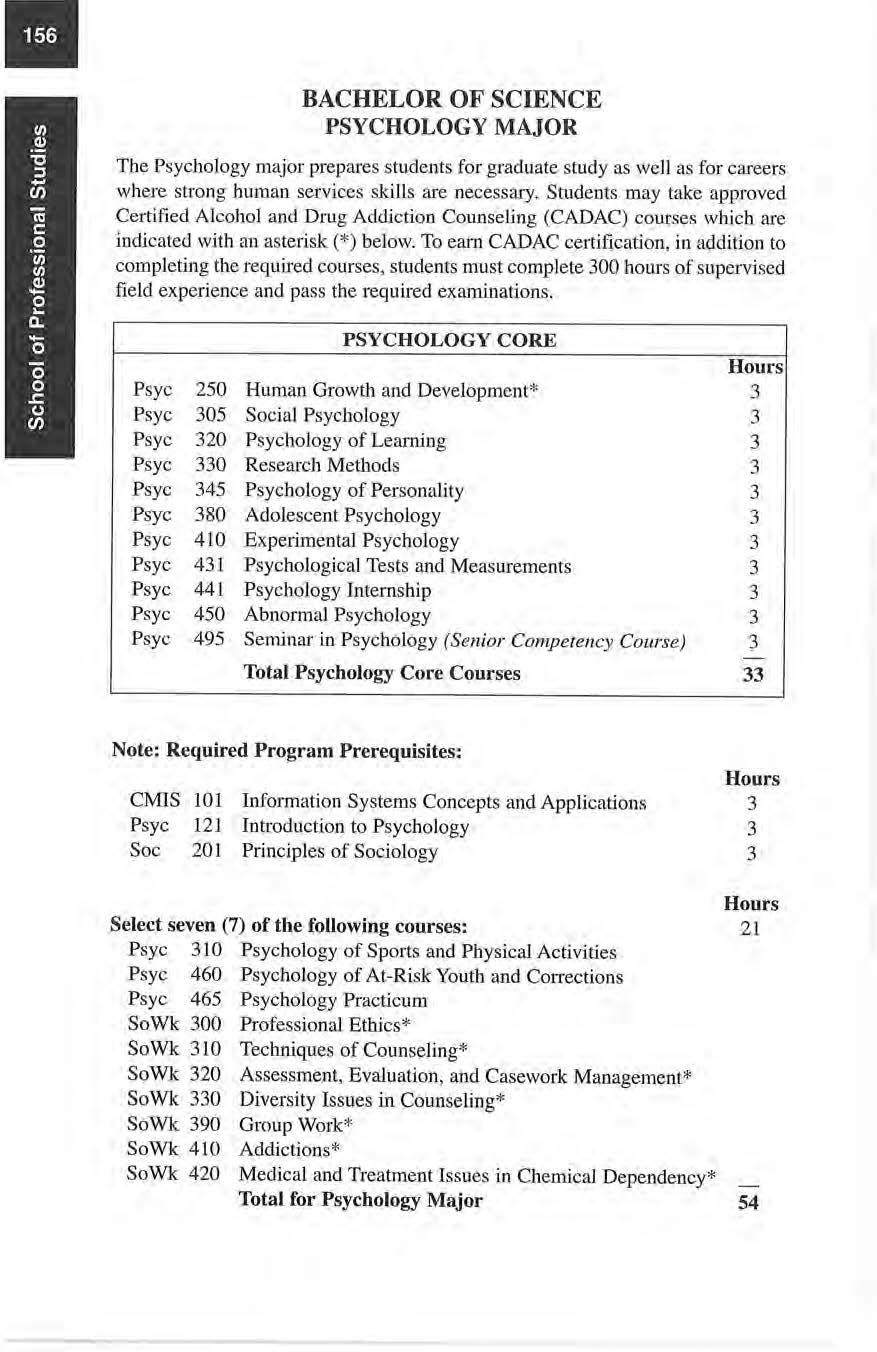
Psyc Psy c Psyc Psyc P syc Psyc Psyc Psyc P syc Psyc P syc
CORE 250 Human Grow th and Development* 305 Socia l Psychology 320 Psycho logy of Learning 330 Research Method s 345 P sycho logy of Persona lity 380 Adolescent Psychology 410 Experimental Psychology 43 l P sycholog ical Tests and Meas urements 44 1 P syc hology Interns hip 450 Abnormal Psychology 495 Seminar in Psychol ogy (Senior Competen cy Course) Tota l Psychology Core Courses
PSYCHOLOGY
CMIS IO I I nformation Systems Concepts and Applications Psyc 121 Introduction to Psychology Soc 201 Principles oJ Sodology Select seven (7) of th e fo llowing courses: Psyc 310 Psychology of Sports and Phy s ical Activities P syc 460 Psychology of At-Risk Youth and Conections Psyc 465 Psychology Practicum
300 Professio nal Ethics*
Wk 3 lO Techniques of Counseling* So Wk 320 Assessment,
and Casework Management* SoWk 330 Diversity Issues in Counseling* So Wk 390 Group Wotk* SoWk 410 Addictio ns * SoWk 420 Medical and Treatment lssnes in Chemical Dependency* Total for Psychology Maj or Hours 3 3 3 3 3 3 3 3 3 3 3 33 Hou rs 3 3 3 Hours 21 54
Note: Required Prog ram Prerequisites:
SoWk
So
Evaluation ,
Certificate Programs
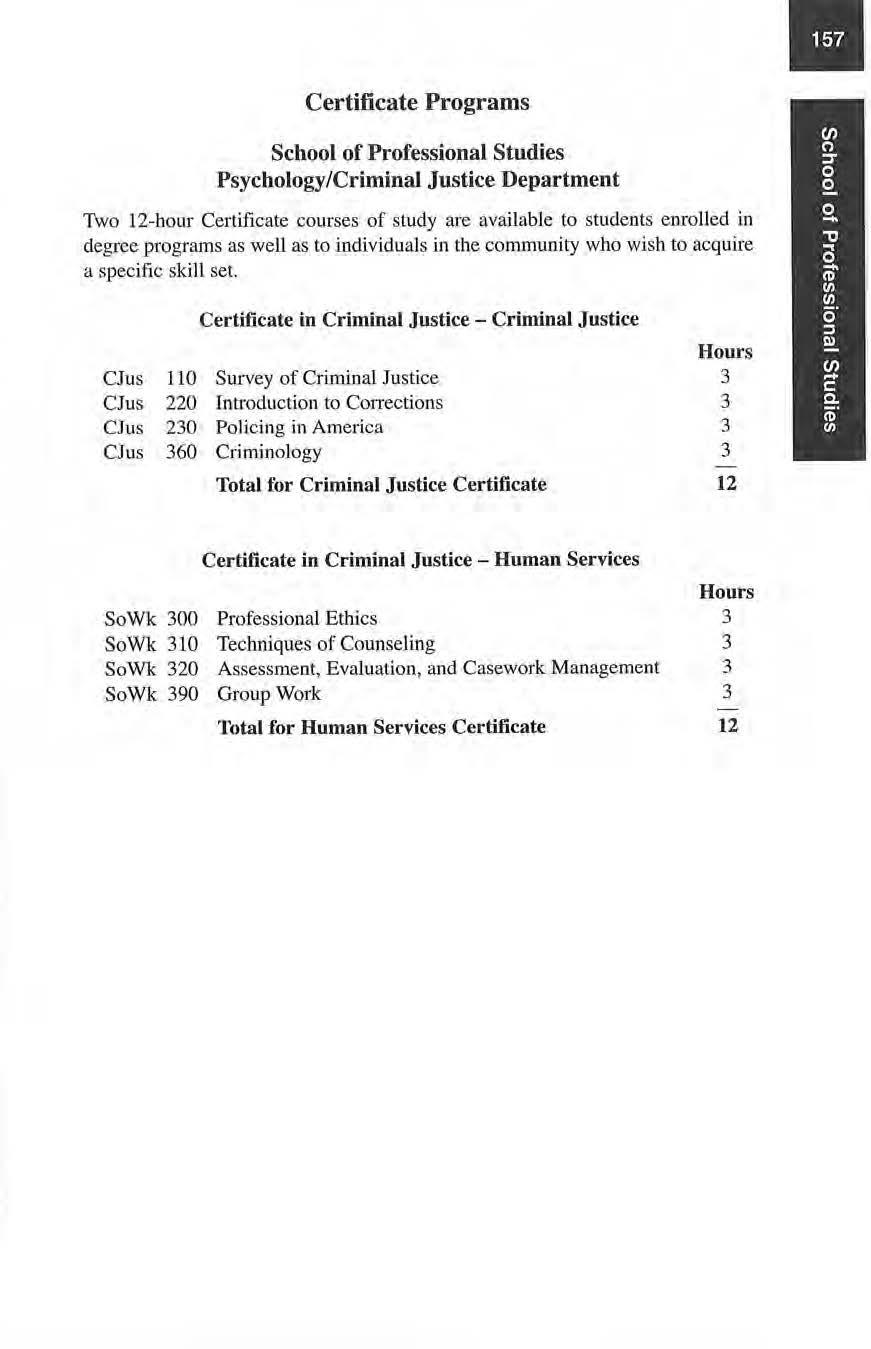
School
1\vo 12-hour
programs as well as to individuals i n the commun i ty who wish to acq uire a
of Professional Studies
Justice Department
Psychology/Criminal
ee
specific s kill set. C Ju s CJus CJ us CJus Certificate in Criminal Jus tice - Criminal Justice 110 Survey of C ri min a l Ju stice 220 fn trod uc tio n to Conections 230 Policing in America 360 Criminology Total for Criminal Justice Certificate Certificate in Crimina l Jus tice - Human Services SoWk 300 Professio nal E t h ics SoWk 310 Techniques of Counseling SoWk 320 Assessment, Eval ua t ion , and Casework Management SoWk 3 90 Group Work Total for Human Services Certificate Hours 3 3 3 3 12 Hours 3 3 3 3 12
Certificate courses of study are availab le to s tudents enrolled i n degr
COURSE DESCRIPTIONS
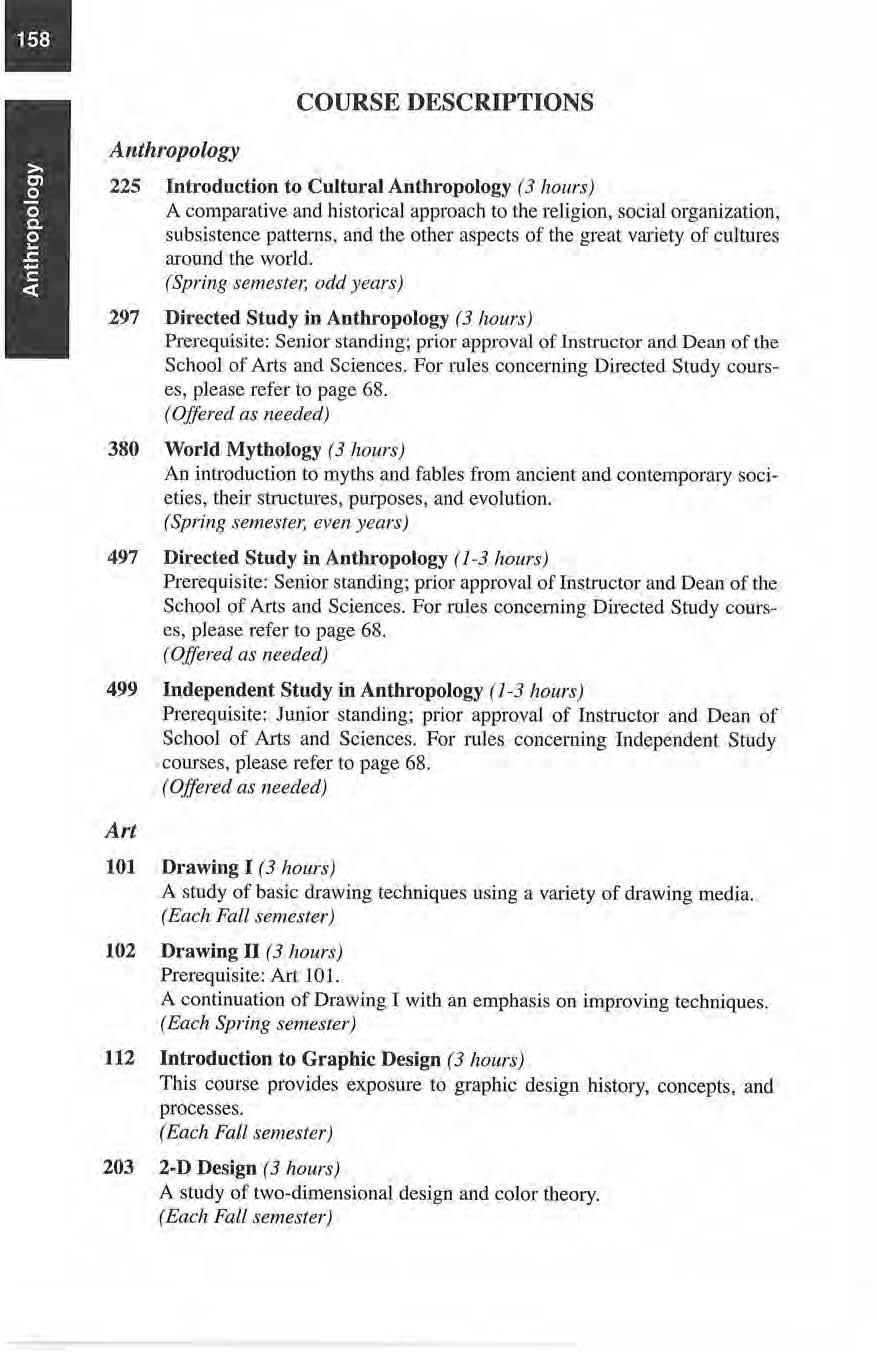
Anth,-opology
225 Introduction to C ultural Anthropology (3 hours)
A comparative and historical approach to the religion, social organization, subsistence patterns. and the other aspects of the great variety of cultures around the world.
(Spring se111este1; odd years)
297 Directed Study in Anthropology (3 hours)
PTerequisite: Senior stancLing; prior approval of lnslructor and D ean of tbe School of Arts aud Sciences. For rules concerning Directed Study courses, please refer to page 68
(Offered as needed)
380 World Mythology (3 hours)
An introduction to myths and fables from ancient and contemporary societ ies, their structures, purposes, and evolution. (Spring semeste1; even years)
497 Directed Study in Anthropology (1-3 hours)
Prerequisite: Sen ior standing; prior approval of Instructor and Dean of the School of Arts and Sciences. For rnles concerning Directed Study coui-s~ es, please refer to page 68.
(Offered as needed)
499 Independent Study in Anthropology ( 1 -3 hours)
Prerequisite; Junior standing; prior approval of Instructor and Dean of School of Arts and Sciences. For rules concerning Independent Study courses, please refer to page 68.
(Offered as 11eeded)
Art
101 Drawing I (3 ho1.1J·s)
A study of basic drawing techniques using a vruiety of drawing media. (Each Fall semester)
102 Drawing II (3 hours)
Prerequisite: Ari 10 J.
A continuation of Drawing I witb an emphasis on improving techn iques. ( Each Spring semester)
112 Introduction to Graphic Design (3 lzours)
This course provides exposure to graphic design hfatory, concepts, and pt'ocesses.
( Each Fall semester)
203 2-D Design (3 hours)
A study of two-dimensional design and color theory. ( Each Fall semester)
204 3-D Design (3 hours)
A study of three-dimensio nal design using a variety of media.
( Each Spring semester)
206 Art Appreciation (3 hours)
Tbe study of art hi story principles tbrou gh painting, scu lpture, arc hitecture, etc.
(Each semester )
210 Water Co lor Pai nting (3 hours)
Pre requisi tes : Art 101, I02, 203. This course emphasizes compositions in color using opaque and transparent water color. This course may be repeated for a total of twelve (12) hours. Stude nts are limited to three (3) hours credit per semester.
(Sp ring semester, odd years)
213 Digital Design Foundation (3 hours)
Prerequisites: Art 10 l , 112 , 203. Design principles are examined in the context of graphic design applic ations in this course.
( Each Spring semeste r )
2 15 Type and Design Concepts (3 hours)
P rereq ui sites: Art 101,112, 2 0 3,213. Typography is examined as visua l element of design and as a primary form of communfoation in g ra phic design in th.is course.
221 Printing Processes (3 h ours)
Prerequisites: AJt 101, 102, "203. This cou rse introduces tbe history and techniques of the graphic arts of block printing, etching , and lithography Thi s c ourse may b e repeated for a total of twe lve (12) hours. St11dents are limited to three (3) hours credit p er semester.
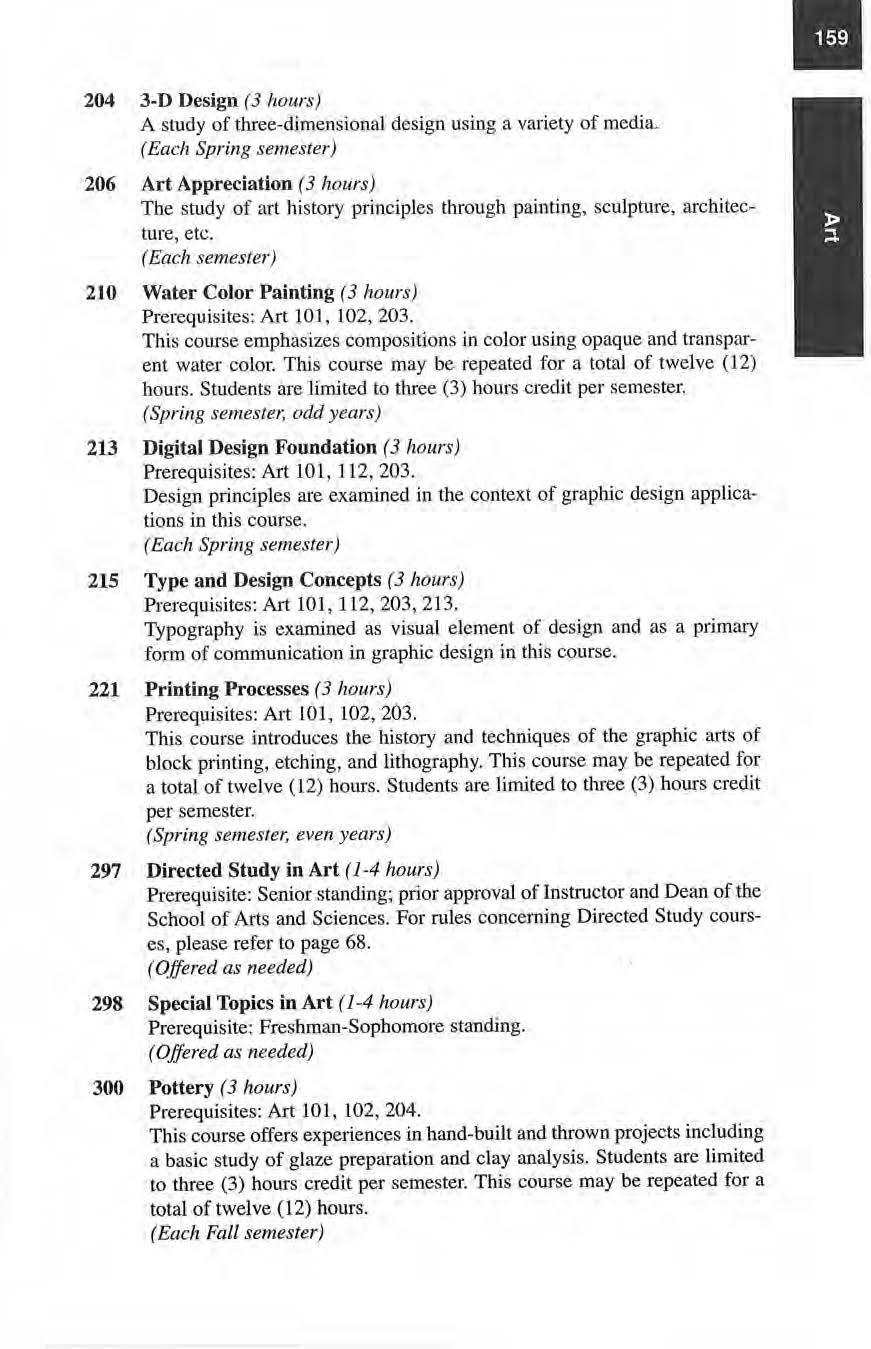
(Spring sem es1er, even years)
297 Directed Study in Art ( 1-4 hours)
Prerequi s ite: Senior standing; prior approval of Instructor and Dean of the School of Arts and Sciences. For rnles concern ing Directed Study courses, p lease refer to page 68.
( O.ffe re d as needed)
298 Special Topics in Art (1 - 4 hours)
Prerequisite; Freshman-Sophomore standing.
(Offered as needed)
300 Pottery (3 hour s)
Prereq uis ites: Art 101 , 102 , 204. This course offers experiences in hand-built and thrown proj ects including a basic study of glaze preparation and clay analysis. Students are limited to three (3) hours credit per semester. This course m ay be repeated for a total of twelve (12) hours .
(Eac h Fall semester)
308 Art Exploration (3 hours)
A study of the purpose of art education in the elementary school program. The Stu.dent is presented with a survey of the history and philosophy of art in the elementary school and becomes actively involved in art activities designed for the elementary school classroom.
(Each sem e ster)
310 Sculpture (3 hours)
Prerequisites: At1 101, I 02. 204.
This course introduces experiences in three-dimensional form using a variety of materiaJs. Students are limited to three (3) hours credit per semester. The course may be repeated for a total of twelve (l2) hours
(Each Spring semester)
3Jl Painting (3 hollrs)
Prerequisites: Art 101, 102, 203.
This course introduces studio experiences in oil. and acrylic painting techniques. Students are limited to three (3) bours credit per semester. The course may be repeated for a total of twelve ( 12) hours.
(Each Fall semester)
313 Digital Illustration (3 hours)
Prerequisites: Art l01, !02. In, 203 , 213.
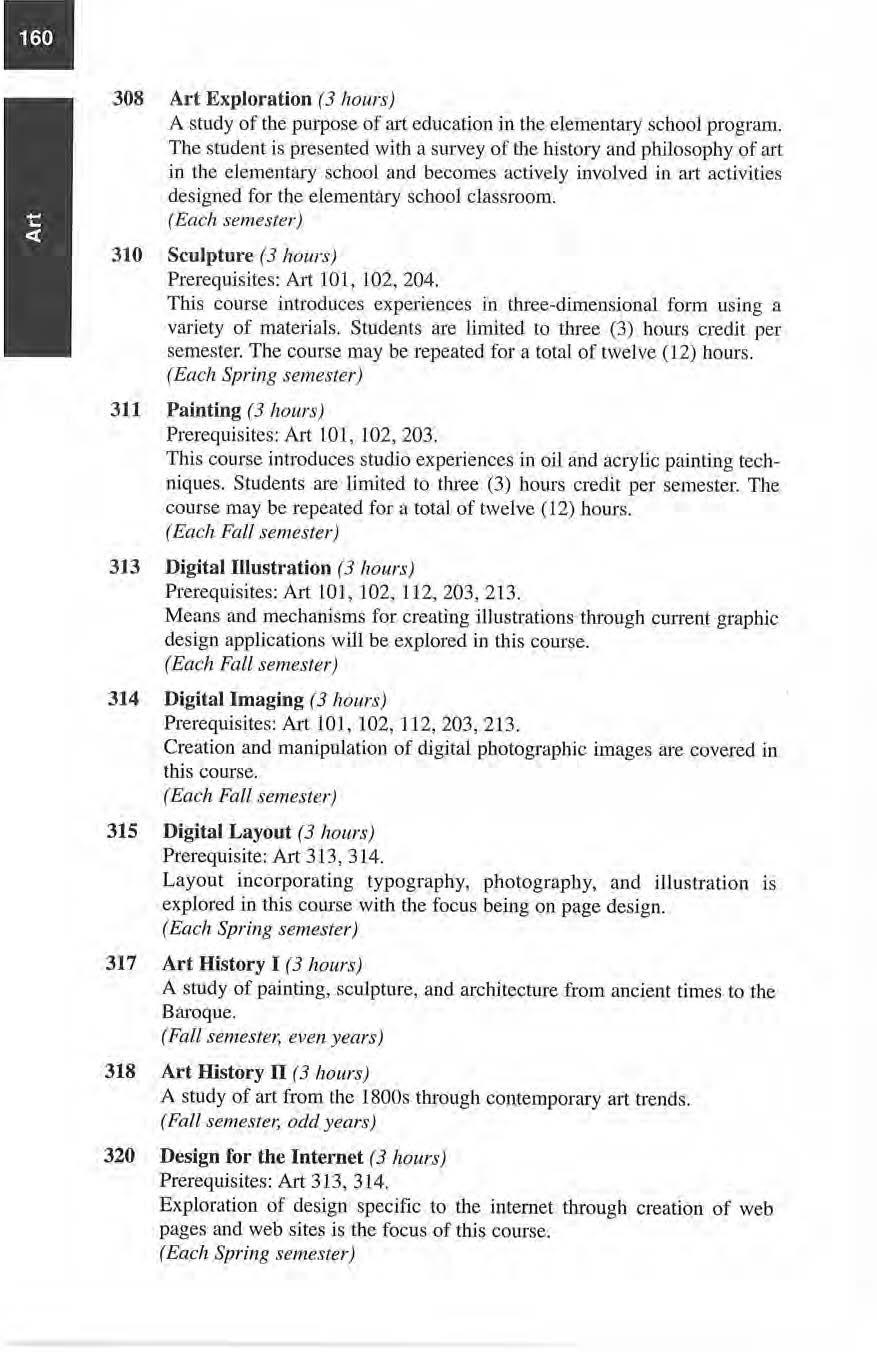
M eans and mechanisms for creating illustrations through c urrent graphic design applications will be explored in this course.
(Each Fall semester)
314 Digital Imaging (3 hours)
Prerequisites: Art IOI. 102, 112,203,213.
Creation and manipulation of digital photographic images are covered in this course.
(Each Fall semester)
315 Digital Layout (3 hours)
Prerequisite; Art 313,3 14.
L ayout incorporating typography, photograplly, and illustration is explo red in this colu·se with the focus being on page design.
( Each Spring semester)
317 Art His tory l (3 h ours)
A study of painting, sculpture, and architecture from ancient times to the Baroque.
( Fall semeste1; even years)
318 Art History IT (3 hours)
A study of art from the 1800s through contemporary art tre11ds.
(Fall semeste1; odd years)
320 Design for the Internet ( 3 hours)
Prerequisites: Art 313, 314.
Exploration of design specific to the internet through c reation of web pages and web sites is the focus of this course.
(Each Spring semester)
321 Animation for the Web (3 hours)
Pre requi sites; Art 3-Des i gn and creat ion of animation as a for m and for integrat ion with web pages will be developed in this course.
(Each Spring semes1er)
325 Figure Drawing (3 hours)
Prere quisit e: Art LO I , 102, 203, 2 04. fi gure drawing is a course that deals with drawing of the huma.n anaromy from live models. Thi s co urse may be repeated for a total of twe lve ( 12) hours. Studeuts are limite d to three (3) hours credit per se meste r. ( Each Fall semester)
350 Studio Activities (3 hours)
Prereq uisi tes : Art 101, 102, 203, 204. An integrated cours e cons isting of s tuden t s working in various art mediums. Students will be allowed to work iu the field of theil" choosing; paintin g, sculpt ure , etc. This comse may be repeated for a total of twelve (12) houi:s. Students are limited to three (3) hours credit per semes te r. ( Each Spring semest er)
400 Senior Exhibition (1 hour)
Prerequis ite: Senior s tanding. Art and Art Education majors will mount an ex.l1ibition of their work and develop a s lide portfolio Students taking tbe Graphic Design option will prepare a professio nal presenta tion portfolio and a slide po rtfolio. Senior Exhibition/Portfolio is the capstone co urse for th e student's c reative experience in art at PSC.
(Each semeste r)
497 Directed Study in Art ( 1-4 h ours )
Prerequisite: Senior s tanding ; prior approval of In strnct o r and Dean of the School of Arts and Sciences For rules concerning Directed Study courses, please refer to p age 68.
(Qffered as needed)
498 Special Topics in Art ( 1 -4 hours)
Prerequisite: Junior-Senior s tanding
( Offered as needed)
499 Independent Study in Art ( 1-3 hours)
Prerequisites : Junior standing; prior approval of the Instructor and Dean of the School of Alts and Sciences. For rules concerning Tndepeudent Study courses, p .lease refer to page 68.

(Offered as needed)
Biological Science
101 Introductory Botany (4 hours)
This course e xamines the foundation principles of biology with s pecial emphas1s on anatomy, morphology, life cycles, reproduction, evolution and diversity of plants and related organ is m s. Both lectu re and laboratory are required for th.is course.
( Each semeste r)
Introductory Zoolo gy (4 hours)
Tbis course examines the foundat:i011 principles of biology with special emphasis on anatomy, morphology, life cycles, reproduction, evolutio n and diversity of animals and related organisms. Both lecnue and laboratory are required for this course.
(Each semester)
130 General Biology (4 hours)
An integrated course designed to introduce the basic patterns and processes of biology and the scientific method. The course builds a conceptual understanding of major biological problems and opportun ities and the rote the biological sciences play jn understanding and solving these problems and exploiting op portuniti es. Major top ics include: medicine, epidemiology and disease; app li ed evolution and ecology; genetic engineering, cloning and biotechnology; population growth and the role of demographics in e nergy and economic development, and other relevant cull'ent topics as appropriate. This is a course for non-majors and cannot be used fo r elective credit in the Natural Science major. Both lecture and laboratory are tequired for this course.
(Offered as needed)
210 Human Anatomy (4 hours)
Prerequi sites: Biol 102.
A comprehensive examination of the celJ biology, histology, and organ systems of humans. The course is designed for s tudents in allie<l health and pre-nursing. B oth le cture and laboratory are required for this course.
(Each Fall semester)
220 Horticu lture a nd P lant Propagation Tech niques (3 hours)
Prerequisites: Biol 101.
Students learn the foundation aesthetic, maintenance and propagation techniques of horticuln1re iii this course. Emphasis is placed on plant propagation techniques and horticu l tural practices for plant specjes suited for successful gardening in Nebraska. Both lecture and labor atory are required for this course.
(Spring semeste1; even years as needed)
225 Freshwater Biology (3 hours)
Prerequ isites: Biol 102.
This course -examines the biology of lakes and streams, focusing on the diversity, assembly, and jnteractions of macrobiotic communities Both lecture and laboratory are required for this course.
(Fall semester, even years as needed)
297 Directed Study in Biology (1-4 hours)
Prerequisites: Senior standin g; prior approval of Instructor and Dean of the School of Arts and Sciences. For rules concerning Directed Study co m ses, please refer to page 68.
(Ojfered as needed)
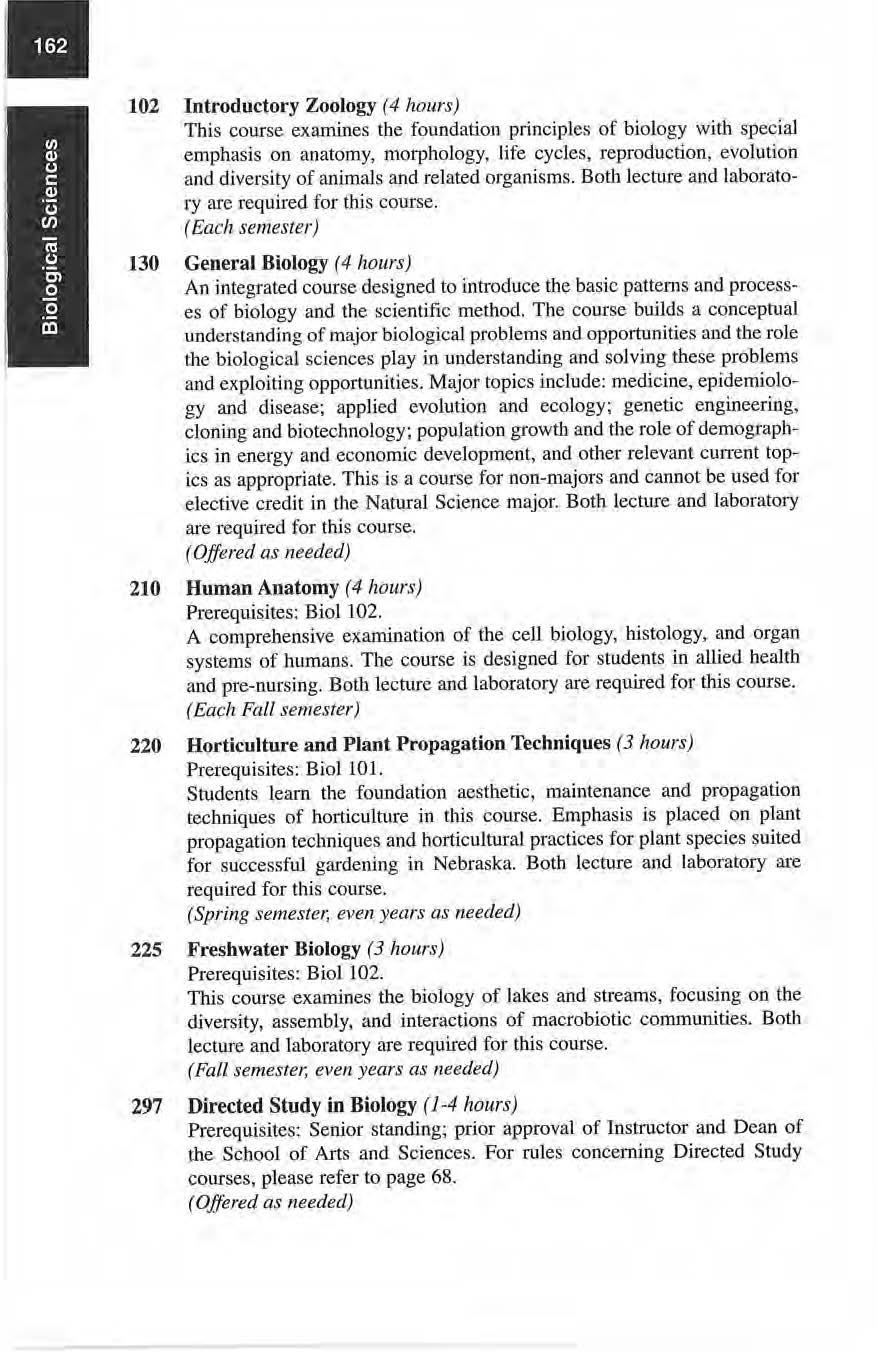
102
298
Special Topics in Biology (1-4 hours)
Prerequisi tes: Freshman-Sophomore standing ( Offered as needed)
30 1 Microbiology (4 hours)
Prereq uisites: Biol 10] and 102; or 210.
An introduction to the biology of prokaryotic, eukaryotic, and viral microbes; the diseases associated with microbe.s; and basic microbiology lab techniques. Both lecture and laboratory are required for this course.
(Each Spring semester)
311 Evolu tion and Systematic B io logy (3 hours)
Pre requi sites: Biol 101 and 102.
Evolution is the cote th eory of modern biology and all biology depends upon a robust systematic hypolhesis of evolutionary l'elations hip among organisms. Tlu s course presents the fundamental concepts of the modem Evo lutionary Synthesis: adaptation, niche and population variation; microevolution; speciation and species isolation; systematic theory; phenetic and phylogenetic classification; and wo logical nomenclature.
( Fall semeste1; even years)
312 Httman Physiology (4 hours)
Prerequ.isites: Biol 102 and 210.
An examination of the functions and interactions of the organ systems of the human body with an emphasis on the body's homeostatic control mechanisms. B oth lecture and laboratory are required for tbis course.
(Each Spring semester)
317 Ecology (4 hours)
Prerequisites: Biol 101 and 102.
The interactions among organisms and environment are stud ied in this course including major foci on ecology of the individual, population ecology, and community eco logy. Both l ecture and laborato ry are required for this course.
(Fall semeste1; odd years)
350 Conser vation and Management (3 hours)
Prerequisites: Biol 101 and 102.
Trus course examines the rnle of density dependent and density independent population limitin g factors on the persistent and growth of wildlife populations. Sources and impacting factors on m etapopulatio ns, species persistence, and biodiversity are examined from an ecological and wildlife management perspective.

(Spring semeste1; even years)
355 Wildlife Tech n iques (2 hours)
Prerequis ites: Biol 350 or concommitant enrollment. This is a laboratory and field-based examination of contemporary tec hniques for monitoring, sampling, and evaluating the health, size, and p ersistence of wi]dJife populations and overall community and ecosystem health.
(Fall sem este1; even years)
360 Animal Behavior (3 hours)
Prerequisites; Biol 101 and Biol 102.
A survey of the evolutionary, genetic, physiological, and ecologica l bases of animal behavior.
(Spring semesre,; odd yem·s as needed)
365 Entomology: the Natural History of' Great Plains Insects (4 hours)
"Prerequjsites: Biol l 02.
Insects are numerically, taxonomically, and volumetrically the dominant life forms on Earth. This comse provides an introduction to insect diversity, evolution, ecology, taxonomy, development, and physiology through a study of tl1e natural history of common Grear Plains insects. Both lecture and laboratory are requjred for this course.
(
Fall semester: odd years as needed)
380 Invertebrate Zoology (4 1!011rs)

Prereqwsites: Biol 101 and Biol 102.
This course is a comprehensive survey of the structure, classification, ecology and evolutionary relationships of invertebrate animals. Primary focus is placed on the comparative anatomy and evolution of major invertebrate phyla. Both .lecture and laboratory are required for th.is cow-se.
(Spring semeste,; even years as needed)
398 Human Pat'asitology (4 hours)
Prerequisites: Biol 101 and 102.
The morphology. eco logy, ep id emiology, and evolution of parasites are studied in this laboratory course. Emphasis is placed on tbe diagnosis, course of infection , and c linica1 pathology of important human internal parasites. Both lecture and laboratory are requiJed for this course.
(Spring semester, even years as needed)
404 Genetics (3 hours)
Prerequisites: Biol 101 and 102.
Th is course provides an introduction to molecular, cellular, organ.ismal, developmental and population genetics.
( Fall semeste,; odd years)
405 Histology and Biological Microtechnique (3 hours)
Prerequisites: Biol 102.
The preparation , curation , and rruc roscopic anatomy of animal and plant tissues are studied in this course. Topics include histological microtechn.ique, specimen fixation, differential stafoing and preparation of permanent mounts of whol e and sectioned materials.
(Spring semeste1; even years as needed)
407 Developmental Biology (4 hours)
Prerequisites: Biol 101 and 102.
This course is a study of the mechanisms of development in plants and animals. Both lecture and laboratory are required for this course.
(Spring semcst e1; even y ears as needed)
409 Advanced E cology (3 hour.~)
Prerequisites: Biol 3 17.
The interactions among organis ms and environment are studied in this course including major foci on the role of genetics and adaptatio n on persistence and col on ization by populations as well as the effects of landscape and s patial scale on the ecology of the individual, metapopu latio n , and comm unity.
(Sprins sem ester. o dd years as needed)
412 Expe rimen tal Biology (3 hours )
Prerequisites : Biol JO} ,md l02. e ight (8) hours upper div ision Biology courses, and Senior standing.
Students will co nc eive, design and conduct a self-contained experimenta l research project in biology. The resulting data and conclu si ons wil l be repo rted in tbe form of a p latform presentation and a techn ica l manuscript. This is a capstone course for th e Biological Sci'ence option and includes a s tudent senior competency defense.
(Each Sprins semester)
414 Inte rnship in Wildlife Management (1-12 hours)
Prerequisites: 45 hours of comp leted coursework, minimum 2.0 GPA , permi ss io n of Department Head and Natural Sc ience and Wildlife Internship Coordinato r.
This program a.llows wildlife s tudents to gain rel e vant wmk experience and estab li s h professional relationships in their field of speciality
Students may e oroll fo r 1-12 hours of graded credit. A minimum of fo1ty hours of work experience will be required for every hour of credit p e r semester. The stud ent will comp lete necessary paperwork with employer aod Wildlife Internsh ip Coordinator. The s tudent's work will be su pervised and evaluated by the Wildlife lnternship Coordinator in cooperation with t he employer Thi s is a ca pstone course for the Wildlife Ecology option and inc lud es a stude nt senior competency defen se A1nnged.

(Each semester; summer session)
420 Comparative Anatomy and Evolution of the Vertebrates (4 hours)
Prerequisites : Biol IO! and 102.
The evo lu tionary rise and diversification of ve1tebrates .is s tudied through a detai led analysis of com p arative anatomical des ign among major vettebrate taxa in lecture and the u se of comparative anatomical dissect ion techn ique in laboratory. Both lecture a nd laboratory a re required for this course.
(Spring sem este1; odd years)
422 Biology of the Ectotherms: lchthyology and Herpetology (4 hours)
Prerequi sites: Biol 101 and 102.
This course examines the fishes, amphibians, and r eptiles from taxonomic , physiological , eco logical and evolu tionary pers p ectives. Emph asis is placed on representatives in the Great Pl ains and Nebraska. Both lecture and laboratory are required for this comse.
(Fall semeste1; odd years)
424 Biology of the Endotherms: Mammalogy and Ornithology (4 hours)
Prerequisites : Bibl 101 and 102.
The taxonomy, systematics, anatomy. physiology, rep roduction and ecology of birds and mammals are s tudied in this cou rse, with an emphasis on common spec ies of Nebraska and the Midwest. Both lecture and laboratory are required for this course.
(Fall semester, even years)
440 Wildlife Parasitology (4 hours)
Prereq uisites: Biol IO I and Biol 102.
Tbe morphology, ecology, epidemiology, and evolution of parasites are studied in this co urse. Emphasis is placed on the impact, su rvey, monitoring, collection and identification of parasites of Great Plain s wildlife. B oth lecture and laboratory are required for this course.
(Fall sem.estei; odd years as needed)
490 Unde rg1·aduate Research Thesis (3-6 hours)
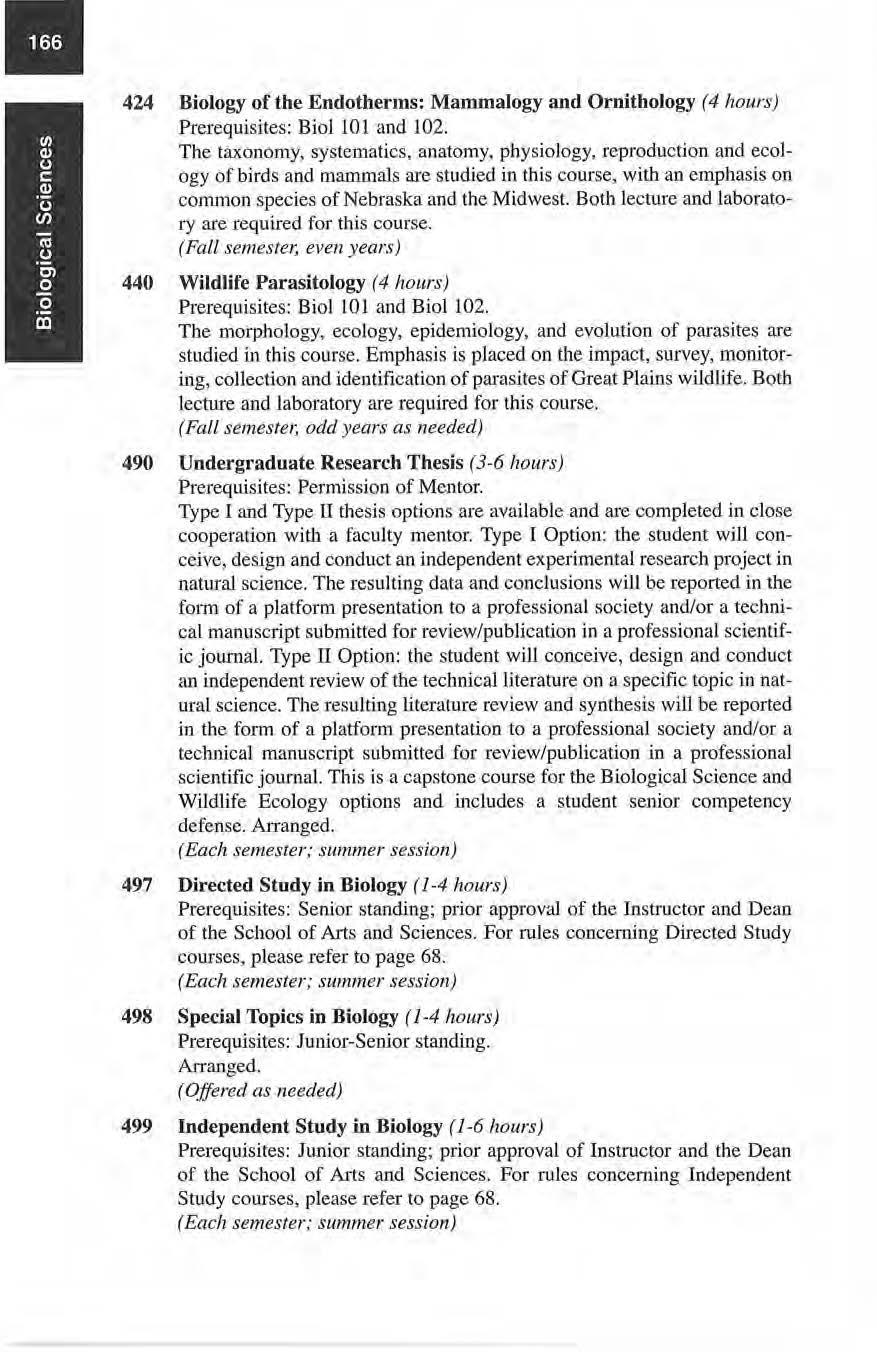
Prerequisites: Permission of Mentor
Type l and Type Il thesis options are available and ru-e comp leted in close coopera tion with a faculty mentor. Type [ Option: the student will conceive, design and conduct an independen t experimental research project in natural science. The resulting data and conclusions will be reported in the f01m of a platform presentation to a professional soc iety an<l/or a technical manuscript submitted for review/publication in a professional scientific journal. Type II Option: the student will conceive, design and conduct an independent review of the teclmicaJ literature on a specific topic in natural science. The resulting literature review and synthesis will be reported in the form of a platform presentation to a professional society and/or a technical manuscript submitted for review/publication in a professional scientific journal. This is a capstone course for the Biological Science aod Wildlife Ecology options and includes a s tudent senior competency defense.Arranged.
( Each semester; summer session)
497 Directed S tudy in Biology ( 1-4 hours)
Prerequisites: Senior standing; prior approval of the Instructor and Deao of the School of Arts and Sciences. For rules concerning Directed Study courses, please refer to page 68.
(Ead1 se m ester; summer session)
498 S peci al Topics in Biology ( 1-4 hours)
Prerequisites: Junior-Senior standing. Arranged.
( Offered as needed)
499 Independent Study in Biology (1-6 hours)
Prerequisites: Junior standing ; prior approval of Instructor and the Dean of the School of Arts and Sdences. For rules concerning Independent Study courses, please refer to page 68.
(Each semester: summe r session)
Business
231 Principles of Financial Accounting (3 hours)
St udents are introduced to accounting as an information system t hat provides repo1ts to stakeholders about the economic activities and condition of a business. Students team about the complete accounting cycle, accounting systems and internal con trols , and balance sheet acco untscash, receivables, inventories, fixed and intangible assets, and cutTent liabilities.
( Each Fall semester)
232 Principl es of Managerial Accountin g (3 hours)
Prerequi s ite: Bus 231.
Students continue their preparation i.n accounting by studying tbe accounting process for a corporation - organizat ion, cap ital stock transactions, and dividends; income and taxes , stockholders ' equity, and investments in stocks; and bonds payable and investments in bonds. Other topics studied are: statement of cash flows, financial statements and analysis, managerial accounting and job order cost systems, process cost systems, cost behavior and cost-volume-profit analysis, an d budgeting and performance evaluation using variances from standard costs.
(Each Spring semester)
251 Legal Enviro nmen t and Cont ract Law (3 hours)

This course examines the sources and migins of law and tbe legal system, legal processes, and fundamental legal principles, with an emphasis on the obligations of parties to a contract.
( Each Fall semester)
260 Entre pren e urship (3 hours)
T his course is designed for those interested in starting a small business. T he areas covered wiJl include writing a sma ll bus i ness p lan. researching markets, rais i ng money, analyzing accountu1g records, an d using infonnation technology.
(Offered as needed)
297 Direc ted S tud y in Business (1-4 hours)
P rerequisite: Senior standi ng; prior approval of lnstrUctot· and Dean of the School of Professional Studies. For rnles concerning D irected Study courses, please refer to page 68
(Offered as needed)
298 S pecial Topics in Bus iness (1-4 hours)
Prerequis ite : Freshman-Sophomore standi ng.
(Offered as needed)
30 1 O rgani zation a l Co mmunications (3 hours)
Prerequisite: Speh 152, E ng 201. Students study communication foundations, the writing process. and communicat ing throu gh letters, memoranda, ru1d e-mail messages. The culminating activity permits the students to understand the repo11 process and
research methods , manage data and use graphics, and organize and prepare reports and proposals for the design and delivery of business presentations.
(Each semester)
313 Loss Prevention (3 hours)
This co urse is des igned to impart the knowledge of internal security issues such as personnel screening, the identification of high-risk employees , methods of employee theft, honesty shopp in g, undercover detectives, interrogation principles, cotmse lin g, alarm systems, and perimeter security. External issues will include shoplifting, checks and credit c.~ard security, forgery, bw·glary, and vendor fraud. This course is cross- li sted as CJus 3 l3
( Each Spring semester)
328 Principles of Marketing (3 hours)
Students learn the buying, selling, transporting, and storing functions involved in marketing. with an introduction to retailing, wholesaling. and marketing management.
( Each Fall semesrer)
329 Promotion (3 hours)
Prerequisite: Bus 328 recommended. Students exa rni11 e t11e five elements of the promotion mix including advertising , di.reel marketing, personal selling, sales promotion, and public relations/publicity, focusing on the blending of the elements into an integrated marketing communication program.
(Each Spring semes1er)
330 Designing Web Pages for Business (3 hours)
Prerequisite: CMIS IOl.
This course is an introduction to the HyperText Markup Language (HTML). HTML i s U1e language used to create a web page. Topics covered wi!J include: planning, defining design elements. page layo11t tools, photography, image maps , videos, audio animation and 3D, sett ing up a web server, designing for speed and efficiency, and designing a self-promotion site. How commercial organizations sco re s ite design is also covered.
(Offered as needed)
331 Risk Management and Insurance (3 hours)
This course is an introduction to the study of risk management and insurance.
(Offered as needed)
332 Investments (3 hours)
This course uWizes economic principles in evaluating the major uses of investment fu11ds, including savings accounts in banks a nd other finandal in st itution s, government bonds, corpotate stocks and bonds, annu ities, and real estate.
(Offered as needed)
335 Production/Operations Management (J hours)
Prerequisite; Bus 232, Econ 22 1, Math 340 recommend ed
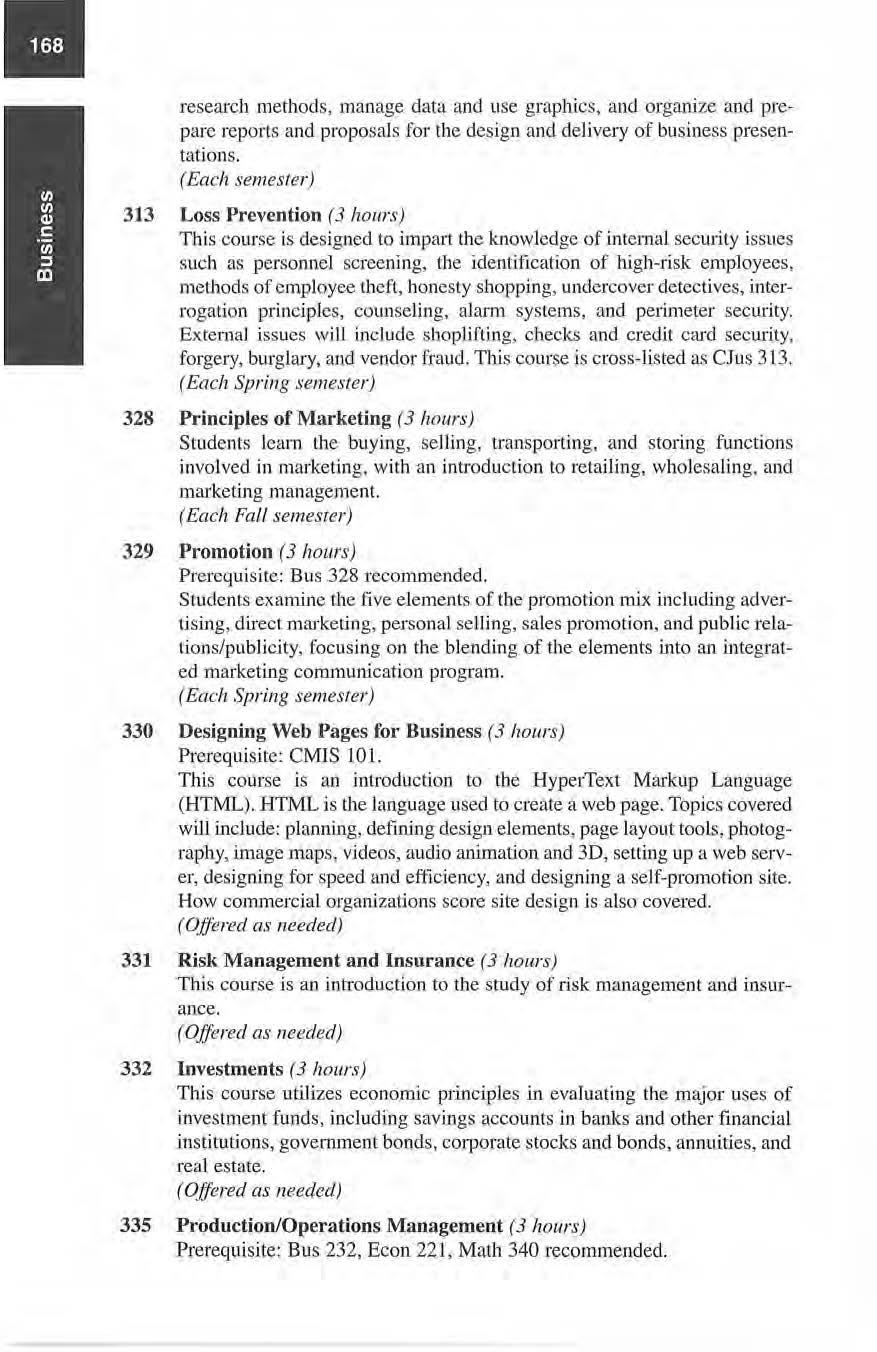
This course explores a wide vatiely of pmduction and operations management topics. Topics considered include: operations strategy and competitiveness , product design, process selection, quality management, capacity management , Just-in -Time (IlT) production systems, facility location and layout, supply chain management, operations scheduling, and the production planning process.
(Each Spring semes/er)
337 Intermediate Accounting I (3 hours)
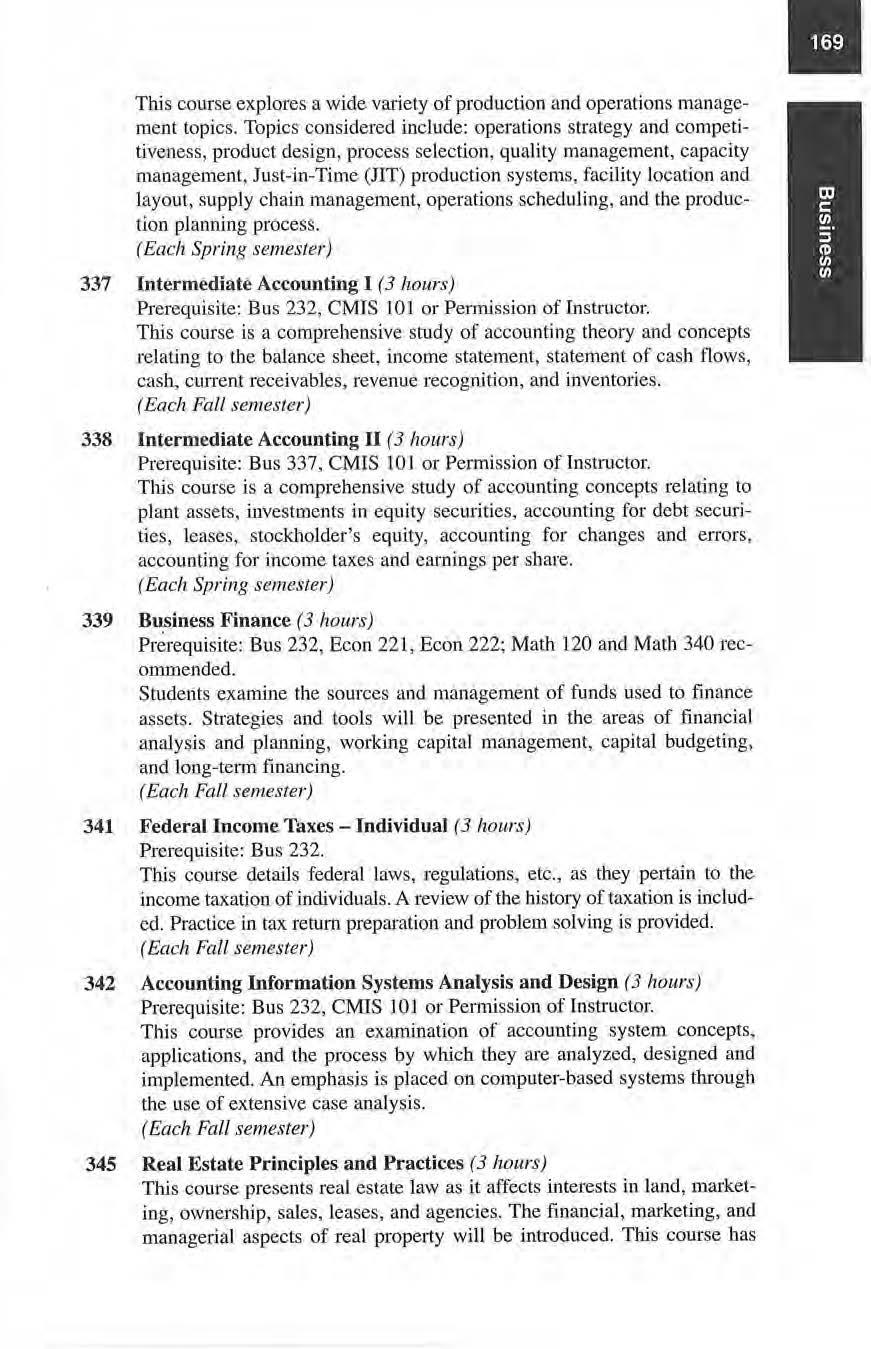
Prerequisite: Bus 232, CMJS I01 or Permission of Instructor. Th.is course is a comprehensive study of accounting theory and concepts relating to the balance sheet, income statement, statement of cas h flows, cash, cunenr receivables, revenue recognition, and inventories.
( Each Fall semester)
338 Intermediate Accounting II (3 hours)
Prerequisite: Bus 337, CMIS tOJ or Permission of lnstrnctor.
This course is a comprehensive study of accounting concepts relating to plant assets, investments in equity secmities, accounting for debt securities, leases, stockholder's equity, accounting for changes and errors, accounting for in co me taxes and earnings per share.
( Each Spring semester)
339 B11:5iness Finance (3 hours)
Pre requ i site: Bus 232, Econ 221, Econ 222~ Math L20 and Math 340 recommended.
Students ex.amine the sources and management of funds used to finance assets . Strategies and tools will be presented in the areas of financial anaJy!) is and planning, working c.apital management, capital budgeting, and long-tetm financing.
( Each Fall semeste r)
341 Federal Income Taxes - Individual (3 hours)
Prerequisite: Bus 232.
This course details federal laws, regulations, etc., as they pertain to the income taxation of individuals. A review of the hi s tory of taxation is included. Practice in tax return preparation and problem solving is provided.
(Each Fall semester)
342 Accounting Information Systems Analysis and Design (3 hours)
Prerequisite: Bus 232, CMIS JO! or P ennission of Instrnctor. This course provides an examinati on of accounting system con cepts, appli cations, and the process by which they are analyzed, designed and implemented. An emphasjs is placed on computer-based sys tems through the use of extensive case analy s is.
( Each Fall semester)
345 Real Estate Principles and Practices (3 hours)
This course presents real estate law as it affects interests in land , marketing, ow netship, sales, leases, and agencies. The finaDciaJ, m arketing, and managerial aspects of real property will be introduced. This course has
been approved by the Nebraska Real Estate Commission for pre-license education as #0040.
(Offered as needed)
346 Financial Institutions and Markets (3 hours)
Prerequisite: Econ 222.
Students study the various institutions which constitute the United States fLn ancia l system. Analysis of financial market dynamic~ and the mechani cs of interest rate determination are also covered
( Offered as needed)
347 Consumer Behavior (3 h o urs)
Prerequisite: Bus 328.
This course is designed to impart the principles of c onsume r behavior in the areas of motivation, perce ption, Teaming, attitude cha nge, information processing, life-style, demographics, social class, reference groups, opinion leaders and diffusion , fami ly and culture, and shopping environments
(Each Fall semester)
348 Retail Management and Merchandising (3 hours)
Prerequisite: Bus 328 .
This course is designed to impart the principles of i·etailing including strategies, merchandise management , store operations, evaluation and control, financial strategies, human resources management, buying and se lling, information sys tems, promotions, and inventory control.
(Each Spring semesler)
350 Salesmanship (3 hours)
St11dents focus on the skil ls and techniques used in selling and persuasion. The course is designed to help t11e student learn to sell products and ideas through a study of proven techniques used by successfu l salespeople.
(Each Falt semester)
351 Commercia l Law (3 hours)
Prerequis ite: Bus 251.
Th.i s course examines the legal principles covering sales contracts and negotiable instruments under the Uniform Commercial Code, property ownership, bailrnents, corporat ions, partnerships, an<l other business organizations.
( Each SjJring semeste r)
353 Organizational Ethics (3 hours)

Thi s course applies ethical concepts and principles to moral issues in business: corporate Jesponsibility, discrimination , advertising, competition, whistle-blowing , tt'ade secrets, multinationals , envirnnment, workers' rights, government regulation, investment , bribes, product liability, and con sumerism,
(Offered as needed)
360 Real Estate Finance (3 hours)
Prerequisite: Bus 345 .
Thi s course i s a detailed analysis of the methods and techniques of financ-
ing the purc hase ofreal es tate. Areas of s tudy include fond sources, analysis of mortgage risk, FHA underwriting, othe r government influences and agencies, legal aspects , and the policies and procedw·es of len cling in stjtutions. This course has been approved by the Nebraska Real Estate Commission for pre-license education as #0042.
(Offered as needed)
361 Real Estate Law (3 hours)
Prerequisite: Bus 345
Students learn the legal implications of estates in land, deeds, leases, mortgages , easemen ts, zoning ordinances, cove nan ts, trespass, nuisance, licenses , invitees, and descendants' es tates. Thi s course has been approved by the Nebraska R eaJ Estate Commission fo r pre-license education as //004 1.
(Offered as needed)
371 Cost/Managerial Accounting (3 hours)
Prerequisites: Bus 232. Math 120, Math 340, CMIS 10) O( Permi$sion of Instructor
This course covers the accounting concepts and procedures pertaining to cost/managerial reporting. M ajo r topics are cost flows, allocation of indirect costs, job order costi ng and process costi ng, a nd the accounting for lost units , joint products, a nd by products.
( Each Fall semester )
372 Advanced Cost/Managerial Accomlting (3 hours)
Prereq uis ites: Bus 335, Bus 37 1.
This course cove rs s tand ard cos tin g, variable costing, relevant cost in g, designing a master budget, inve ntory control and production, capi ta l budgeting, and designing a cost sys tem for measuriug o rganizational performance.
(Eac h Spring semester )
373 Organizational Behavior (3 hour s)
This co Ltrse presents the foWJdations of the history, theo r y, and application s of organizational behavior i n the ateas of personaJity, stress, motivation, job design, goal setti ng, learning theory, behavior modification. g roup behavior, powe(, leadership, organizational structure , decis ionrnakin g, and control.

(Each Fall semeste r)
374 Advanced Spreadsheet Applications (3 hours)
Prerequisite: CMIS 10 l.
This course will cover advanced techniques in Spreadsh eet applications using bu siness applications for th e co ursework. Advanced co mma nd s and some m acro programming will be covered . Advanced spread sh eet application s wiJI be ut i lized for case analysis includin g s preadsheet modeling, information system d evel opment, and autom a ted forms-oriented database management.
(Offered as needed)
380 Human Resources Management (3 hours)
Prerequi site: Bus 373.
Students build upon the behavioral theories presented in Bus 373, Organ izational Behavior, and learn how to plan and implement s trateg ies to efficiently manage the finn 's most critical resource - employees Recruiting, selecting, evaluating, developing, and co mpensating employees will be emphasized, while legal issues and managing in a union environment will also be covered.
(Eac h Spring semester)
381 Employee Training and Development (3 hours )
Prerequisite: Bus 380.
This course is designed to assist stu dents in the study of corporate training. Topics include: needs assess men t, relevant education theories and program design, transfer of trait1ing, traditJonal training methods , use of new technologies in training, and follow-up and evaluation of costs and benefits of training.
(Each Fall semester)
410 Marketing Management (3 hours)
Prerequisites: Bus 328, Math 120
This course analyzes ma.rketiJ1g principles from the managers ' point of view, specifically in terms of t11eir application toward meeting various marketing objectives. Strategies and too ls wi ll be pres e nted in the ,'treas of market analysis and resear ch, product development , advertising, promotion, pric ing, and distribution. Students w ill have the opportunity to work as part of a team to develop a detailed marketin g plan.
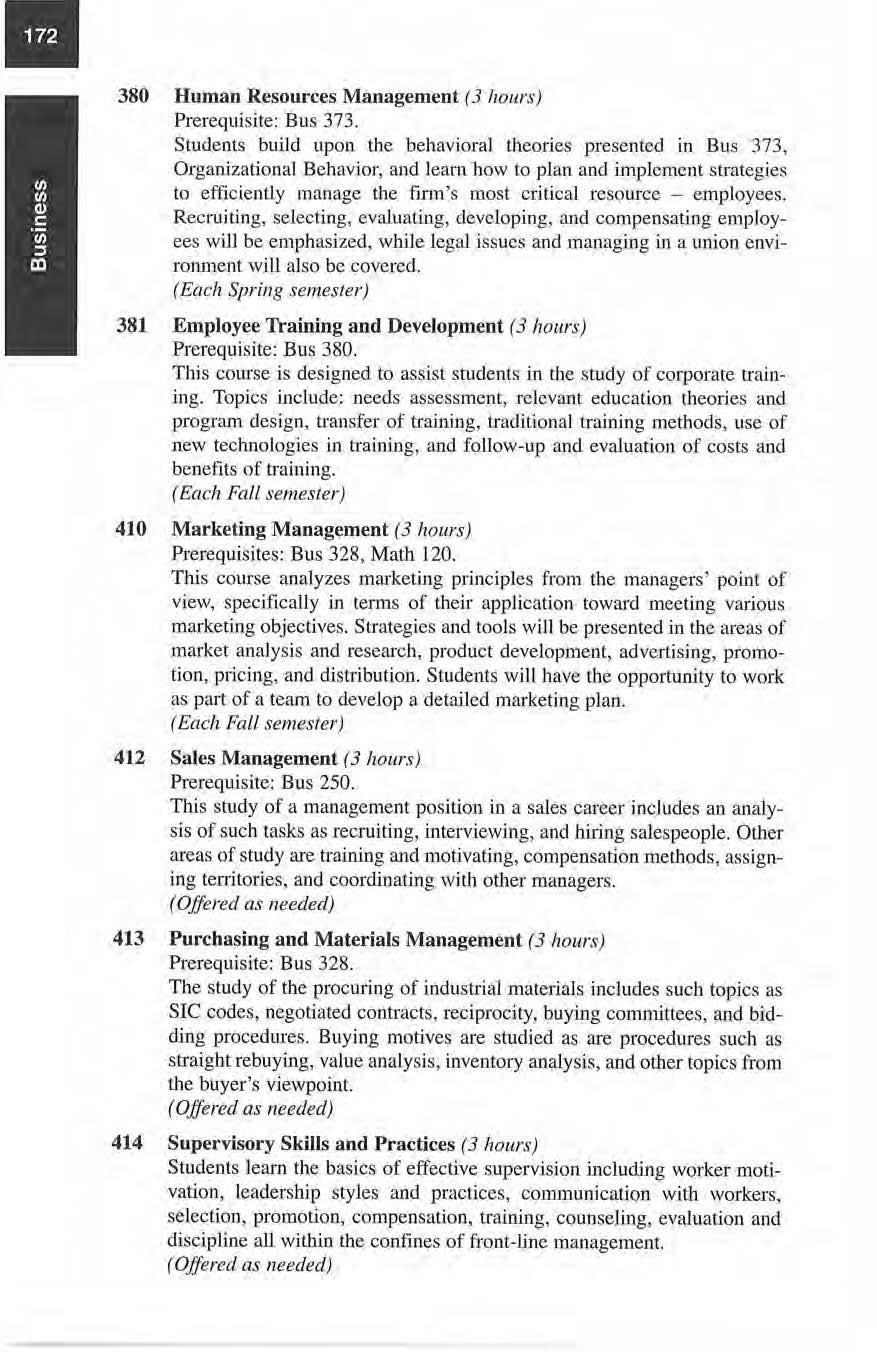
(Each Fall semester)
412 Sales Management (3 hours )
P rerequisite: Bus 250.
This study of a management po sition in a sales career includes an analysis of such tasks as recruiting, i:nteJviewing, and hiring salespeople. Other areas of s tudy are training and motivating, compensation methods , assigning ten-itories, and coordinating with other managers.
( Offered as needed)
413 Purchasing and Materials Management (3 hour:,)
Prerequisite: Bus 328.
The s tudy of the procuring of indusn·ial materials includes s uch topics as S IC codes, negotia ted contracts, reciprocity, buying committ ees , and bidding procedmes. Buying motives are s tudied as are procedures su ch as straight rebuying, value analysis , iJwentory analysis, and other topics from the buyer's viewpoint
(Offered as needed)
414 Supervis01·y Skills and Practices (3 ho11rs)
Studen ts learn the basics of effective supervision including worker motivation, leadership s tyles and practices, communication with workers, selection, promotion, compensation, training, counseling, evaluation and discipline all within the confines of front-line management.
( Offered as needed)
420 Feder a l Income Taxes - C m·po rate, Partn ershi ps, Fiduciary (3 hours)
Prerequisites: Bus 232, Bus 34l.
Students study federal laws, regulations, etc., relating to estate and gift taxation and income taxation of partnerships, corporations , and fiduc iaries. P ract ice in tax return preparation and problem solving is provided. (Each SjJring semester)
42 1 Accou nti ng Theo ry (3 hours)
Prerequis ite: Bus 338
This course is a study of theoret ical cons iderations in asset measurement and income determination. Emphasis is placed on pronouncements of recognized accounting authorities.
( Offered as needed)
430 Ind ustria l Ma rketi ng (3 hours)
Prerequisite: Bus 328
Students an alyze industrial distrib ution considering organizational consu01ers, demand, buying process, and strategies. Understanding plann i ng, product lines, channels, logistics, pricing, and promotion are included
(Offered as needed)
431 Sm all B us iness Manage ment (3 hours)
T his course studies planning, requiremen ts, resources, and operations involved in small business management/ownership.
( Offered as needed)
441 Bus iness Adm ini stration Internshi p (1 -12 hours)
Prerequisite: 45 hours of completed coursework, mi nimum GPA 2.0; Pea:russion of the Busines s Depattment Head. This program is designed for students with a major i.I.1 Business to gain work experience related to their major and career goals. Students may enroll for 1·12 hours of graded credit. A mini.mum of forty (40) hours of work experience Wi ll be required for every hour of c re dit per semester. Tbe student wiU complete necessary paperwork with the employer and the School of Professional Studies office. The student's work will be supervised and monitored by the D ean of the School of Professional Studies. A final paper will be prepared at the conclusion of the internship. Only three (3) semester hours of Bus 44 1 and/or Bus 442 may be applied toward the Management option.
( Each semester)
4 42 Business Ad minis tration I11 ternsltip (1-12 hours)
Prerequisite: 45 hours of compl eted coursework, minimum GPA 2.0; Pennission of the Business Department Head.
T his program is designed for students with a major in Business to gain work experience related to their major and career goals. Students may enroll fo r I - l 2 hours of graded credit. A rrrinimum of forLy (40) hours of work experience will be required for every hour of credit per semester. The student will com plete necessary paperwork witl1 the employer and the School of Professional Studies office The student's work will be super-

vised by the Dean of the School of Profes sional Studies A final paper will be prepared at the conclusion of the internship. Onl y three (3) semester hours of Bus 441 and/or Bus 442 may be applied toward the Manageo,ent option.
(Each semester)
450 Ad va nced Accounting (3 h ours)
Prerequisite: Bus 338.
This course emphasizes financial accounting concepts and applications rela ted to business combinations and consolidated financial statements. Accounting for part nership s and accounting for foreign cun:ency a:ansactions will also be covered.
(Each Fall semester)
45 1 Governmen tal an d Not-for-Profit Accoun ting (3 hours)
Prerequisite: Bus 338.
Accounting theory and practice are applied to governmental andothernotfor-profit entities including hospitals and colleges. Auditing of government entities is disonssed.
(Each Spring semester)
468 Public Adminis tratio n (3 lwttrJ)
Prerequisite: P Sci 201.
Students will study a range of topics involved in tl1e administration of public agencies. Topics will inc lude the history of Amer ic a's public service, the development of intergovernmental relat ions , bureaucracies, public personnel, budget i ng , decision-making, eval uation procedures, and regulatory adrninistration. This class will encourage students to investigate the role of public administration in the past and today, as well as to conjecture the possibilities for the future. This coUJse is cross-listed as PSci 468.
{Spring semeste,; odd years)
470 Auditing (3 hours)
Prerequisite: Bus 338, Bus 342. This course covers generaUy aocepted auditing standards and procedures and the philosophy supp01ting them. Auditing techniq ues available to the independent public accountant are also studied.
(Each Spring semester)
480 Internatio na l Bus in ess (3 hours)
Prerequisite: Bus 328, Bus 339, and B us 373. Students learn contemporary business and management practices in multinational market environments with emphasis on cultural, financial , and marketing differences.
( Each Fall semester)
492 Ma rketin g S tra tegies (3 hours)
Prerequisite: Bus 328, Bus 410.
T he case-study approach is used to instill the methods of marketing analysis for decision - making. Companies in a variety of industries will be considered. Specific components include financial analysis, s ituat ion analys is, s trategic planni ng activities, problem and opportunity analysis, gener-
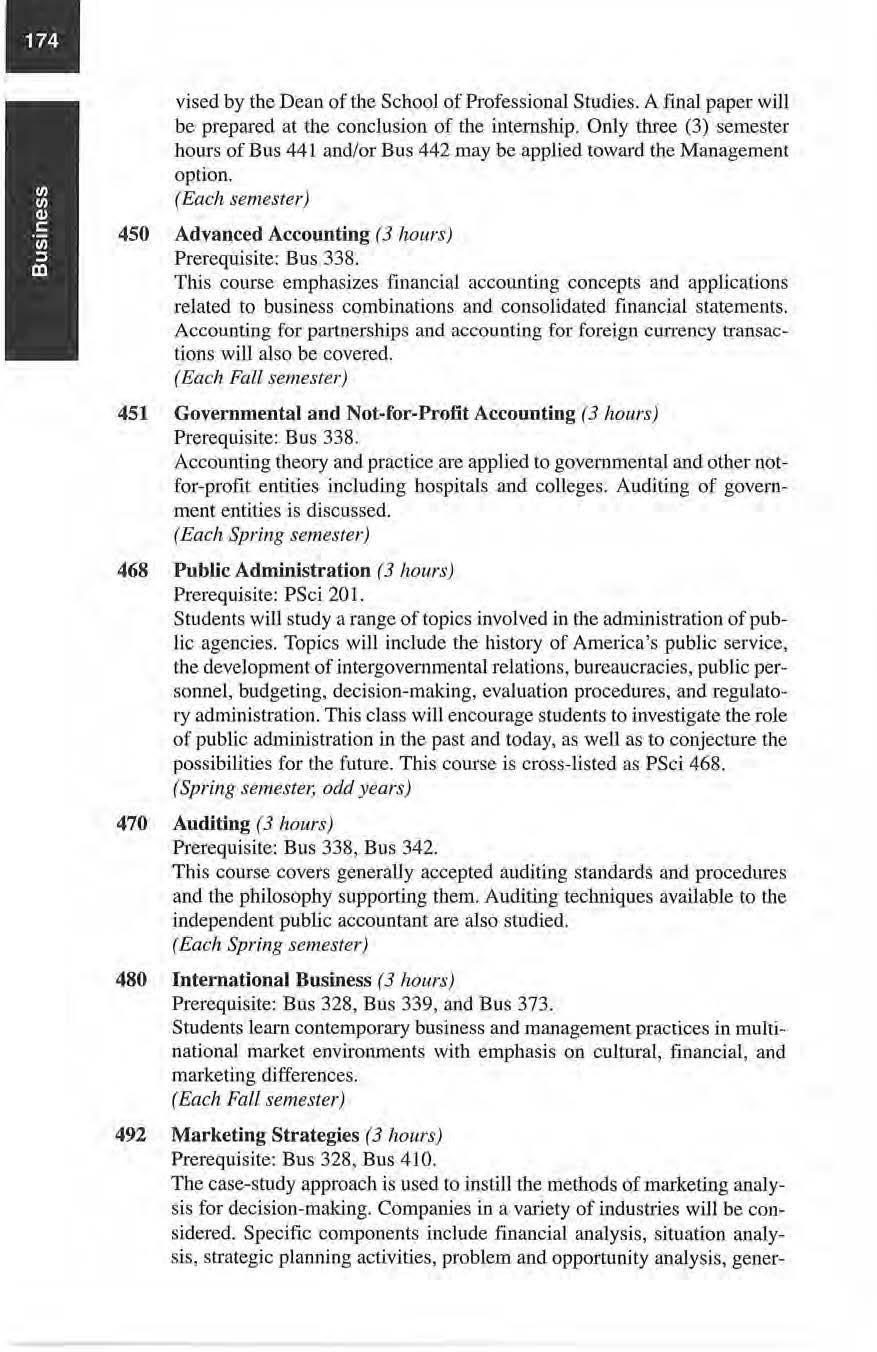
ation and evaluation of alternative marketing programs, defining measurable objectives, and marketing mix/program decisions. Students are encouraged to take thfa course the semester immediately foUowing Bus 410, Marketing Management.
(Each Spring semester)
495 Business Policy (3 hou.rs)
Prerec111isite: Senior business major havin g completed 45 semeste r hours of business major including CMI S 101, Bus 328, Bus 339, Econ 221, and Econ 222. Recommended for student's last semester.
As the capstone course for Business Administration students, seniors in the program will be req uire d to demo nstrnt e their analytica l, communication, and solution deve lopment competencies through oral and wrinen presentation of business case reports. Students wi ll a lso have the opportunity to prepare and present a company or industry situation analysis.
(Eac h semester)
496 Organizational Leadership (3 hours)
Prereq uisi te: Students mu st have completed a min imum of one-half of the business co urses required in their major includ in g Bos 373, Organizational Behavior.
As the caps tone co urse for the Bachelor of Applied ScienceManagement program, seniors in the program will be required to demonstrate their analytical, communication, an d solution development competencies turough preparation of business case reports covering a wide variety of organizational issues. Preparation of a final comprehensive report will also be r equired.
(Offered off-campus o nly)
497 Directed Study in Business (l -4 hours)
Prerequis ite: Senior standing; prior approval of instructor and Dean of the Schoo l of Professional Studies. For rules concerning Directed Study courses, please refer to page 68.
( Offered as needed)
498 Special Topics in Business (1 -4 hours)
Prerequisite: Juni or-Senior stand in g.
( Offered a s needed)
499 Independent Study in Bus iness (1-3 hours)
Prerequisite: Junior stan ding; prior approval of Instructor and the Dean of the School of Professional Studies. For rules concernin g Independe nt Study courses, please refer to page 68.
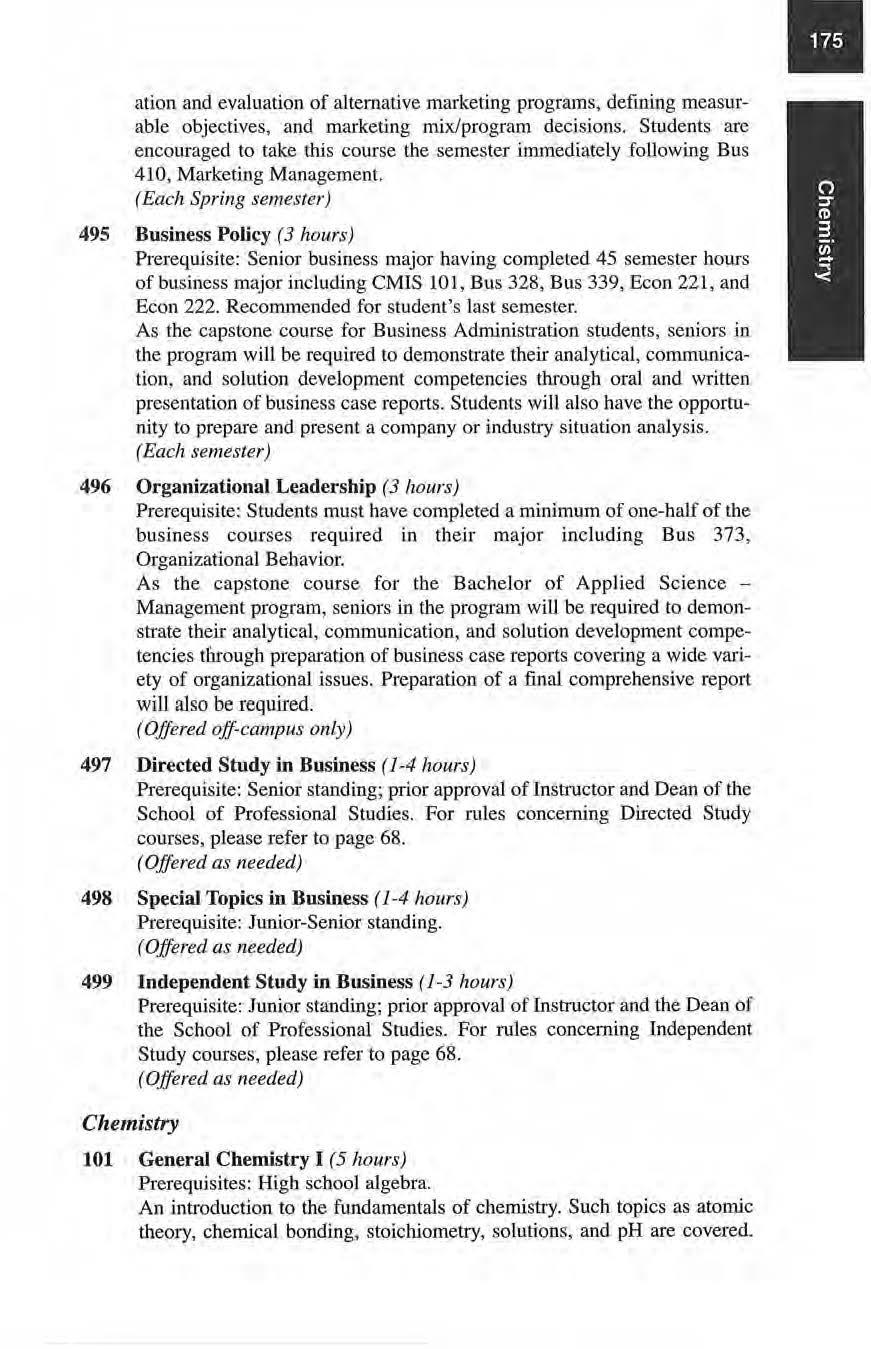
(Offered as needed)
Chemistry
101 General Chemistry I (5 hours)
Prerequisites: Hig h school algebra. An introduction to the fundamen tals of chemistry. Such topics as atomic theory, chemica l bonding, stoic hi ometry, solution s, and pH are covered.
Both lecture and laboratory are required for thi s course
(Each Fall semester)
I02 General Chemistry U (5 hours)
Prerequi sites: Chem 101.
This course is an application of the fundamentals of chem istry, including s tates of matter, oxidation-reduction, thermochemisn·y, chemica l equ ilibrium , kinetics, nuclear chemistry, and descriptive chemistry. Both lecture and laboratory are required for this course.
(Each Spring semeste1)
205 Principles of Qualitative Anal ysis (4 hours)
Prerequi s ites : Chem IO I, Chem 102. This course presents the fundamental principles of qualitative analysis and their technical application in th e laboratory. Both lecture and laborato,y are required for this course.
(Fall semester. eve n yea rs as needed)
206 Principles of Quantitative Analysis (4 hours)
Prerequisites: Chem 205.
This course co ntinue s to pre sent the fundamental p1-i.nciples of quantit ative analysis and theiJ rechnjcal application in the laboratory. Both l ecture and laboratory are required for this comse.
(Spr ing semester, odd years as needed)
297 Directed Study in Chem istry (1-5 hours)
Prerequisites; Senior standing; prior approval of Inst1uctor and the Dean of the School of Arts and Sciences. For rules concerrung Directed Study courses , please refer to page 68.
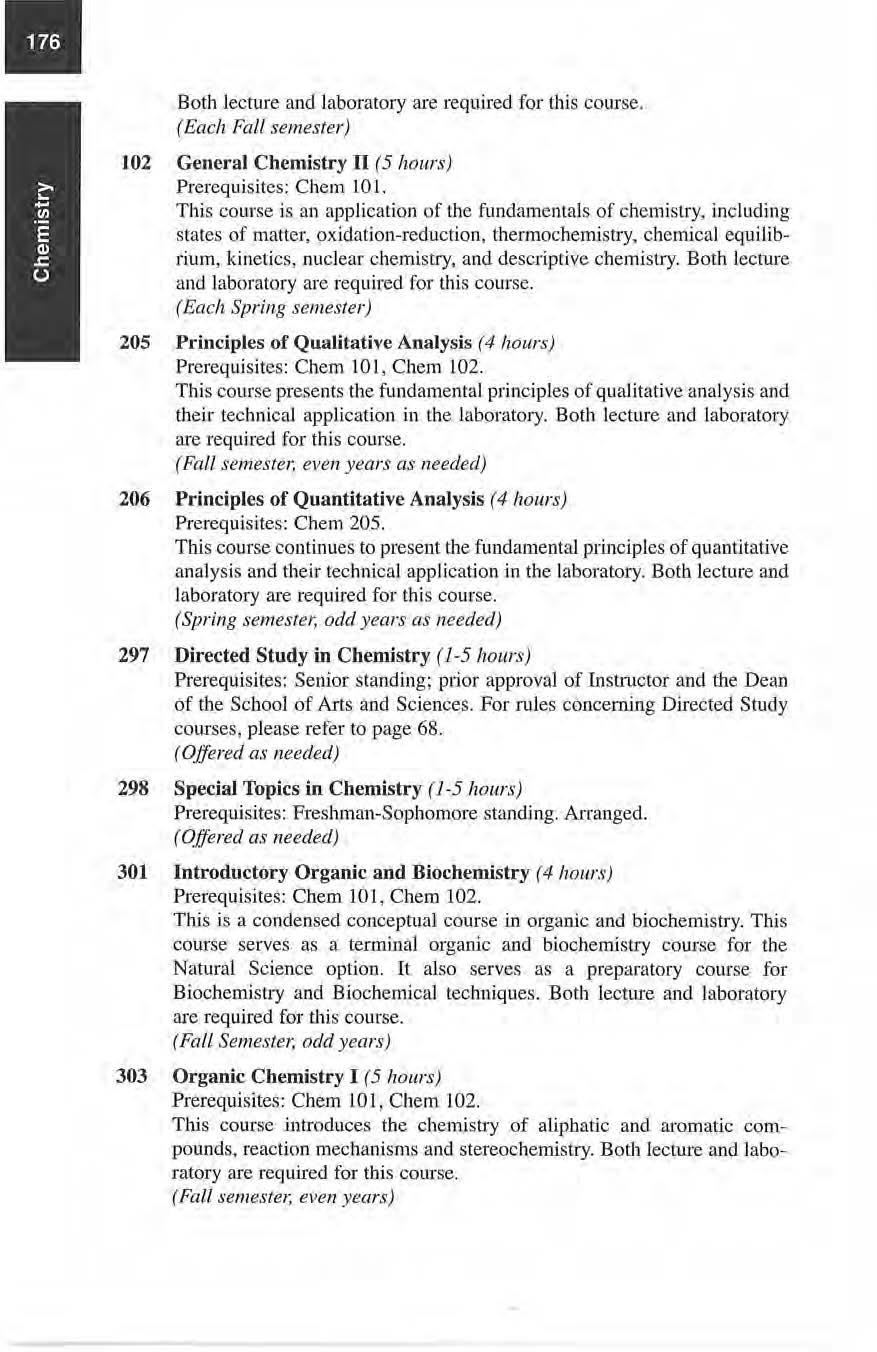
( 0.ffered as needed)
298 Special Topics in Chemistry (1-5 hours)
Prereqllisites: Fres hman-Sophomore stan d.ing. Arranged.
(Offered as needed)
301 Introductory Organic and Biochemistry (4 hours)
Prerequi sites : Chem 10 I , Chem 102.
Thi s is a condensed conceptual cou rse in organic and bi ochemistry. This course serves as a tenni11al organic and biochemistry coun,e for the Natural Science option. It also serves as a preparatory course for Biochemis try and Biochemical techniques. Both lecture and laboratory ru·e required for tllis course.
( Fall Sem ester. odd yea r s)
303 Organic Chemistry I (5 hours)
Prerequisites: Chem LOI , Chem 102
This course fotroduces the chemistry of aliphatic and aromatic compounds, reaction mechanisms and stereochemistry. Both lecture and laboratory are required for this course.
(Fall se111este1; even years)
3 04 Orga nic C hemis try U (5 hours)
Prerequisites: Chem 303.
This course is a continuation of Chem 303 wit h emphasis o n Lhe chemi stry and d etection of functional gro ups The laboratory emphasis is on methods of q ua li tat ive organic analysis. Both lect ure and laboratory are required for th is course.
(Spring semester. odd years)
43 1 B ioch e mis try and Bioc he mical Tec hniques (4 hours)
Prerequisires: Chem 30 I or Chem 303.
T h e chemical foundations of molecular biology wi th an emphasis on the molecular aspec ts of in termediary metabolism are sludied. Both lecture and laboratory are required for this course.
(Falt semester, odd years)
4 61 Molec ular Biology and Molec ular Tec hniques (4 hours)
Prerequisi tes: Chem 431.
The founda ti on techniques of molecu lar biology with an emphasis on t he molecu lur n ature and J\mction of genes and ~on tcmporary molecular techn iques. B oth lecture and laboratoiy are requ ired for this cou rse.
(Spring semester, even years)
4 97 Directed S tudy in C hemis try ( 1-5 hours)
P rerequisites: Sen ior sta nding; priot ap proval of Instructor an d t he Dean of t he Sch ool of Arts and Sciences. For rules concerning Directed Study courses, p lease refe r to page 68.
(Each semester; summer session)
498 Special Topics in Ch e mis try ( 1-5 hou r s)
Prerequisites: Junior-Se n ior standing. Arranged.
(Offered as needed)
499 lnde pend ent Study in Che mis try (1-6 hours)
Prerequisi tes: Ju n ior s tand in g; prior ap p roval of l nstrucror and the Dean of t he School of Arts and Sciences. For rules co ncerning I ndependent Study in C hemistry co urses, please refer to page 68.

(Offered a.~ needed)
C ollege
101 Freshman Ori ent a tion ( I hour)
Th is cou rse is ao introd uction to college imccess skills. It is a graduati on requirement for all on-campus, degree seeking students wi th fewer 1han 30 cred it hours at the t ime of admission, un less it has been waived by the appr opriate Dean. Stude n1s requiring Co ll I OJ are automalically e ru·olled until successfu ll y completing the course.
( Each semeste1: offered Ollline)
400 C aree r Strategies ( J hour)
T his course is desi gned to teach job search techniques, an educati ona l a pproach for professional development. Open to aJ I majors.
(Each semester)
Computer a,zd Management fllformation Systems
101 Information Systems Concepts and Applications (3 hours)
Prerequisites: Ability to type.
This course is an introduction to IBM-based spreadsheet, database, and presentation graphics software cun-ently used in industry. Development of proficiency usi ng selected commercial software packages is stressed.
(Each semester)
110 Programming Logic and Design (3 hours)
Th.is course is for students who plan to take courses in Computer and Management Information Systems above the 100 level. Students use flowcharts, pseudocode and other design techniques to learn basic computer co ncepts, construc ts of an algorithmic language, control structures, s ubroutines, simple data types and compound data types (such as records, anays, a nd strings) Pro cessing of strings, lists and files are introduced. Object-oriented programming techniques wi ll be introduced as well.
(Eqch Spring semester)
210 Computer Programming I (3 hours)
Prerequisite: CMIS 110.
Th.is course provides an introduction to programming and algorithm development using Visual C++ with ele ments of p rog ram structure and subprogram usage. Problem-solving techniques, including stepw ise refinement, are applied to problems in mathemati cs and business with algorithms for searching, merging, and sortin g introdu ced.
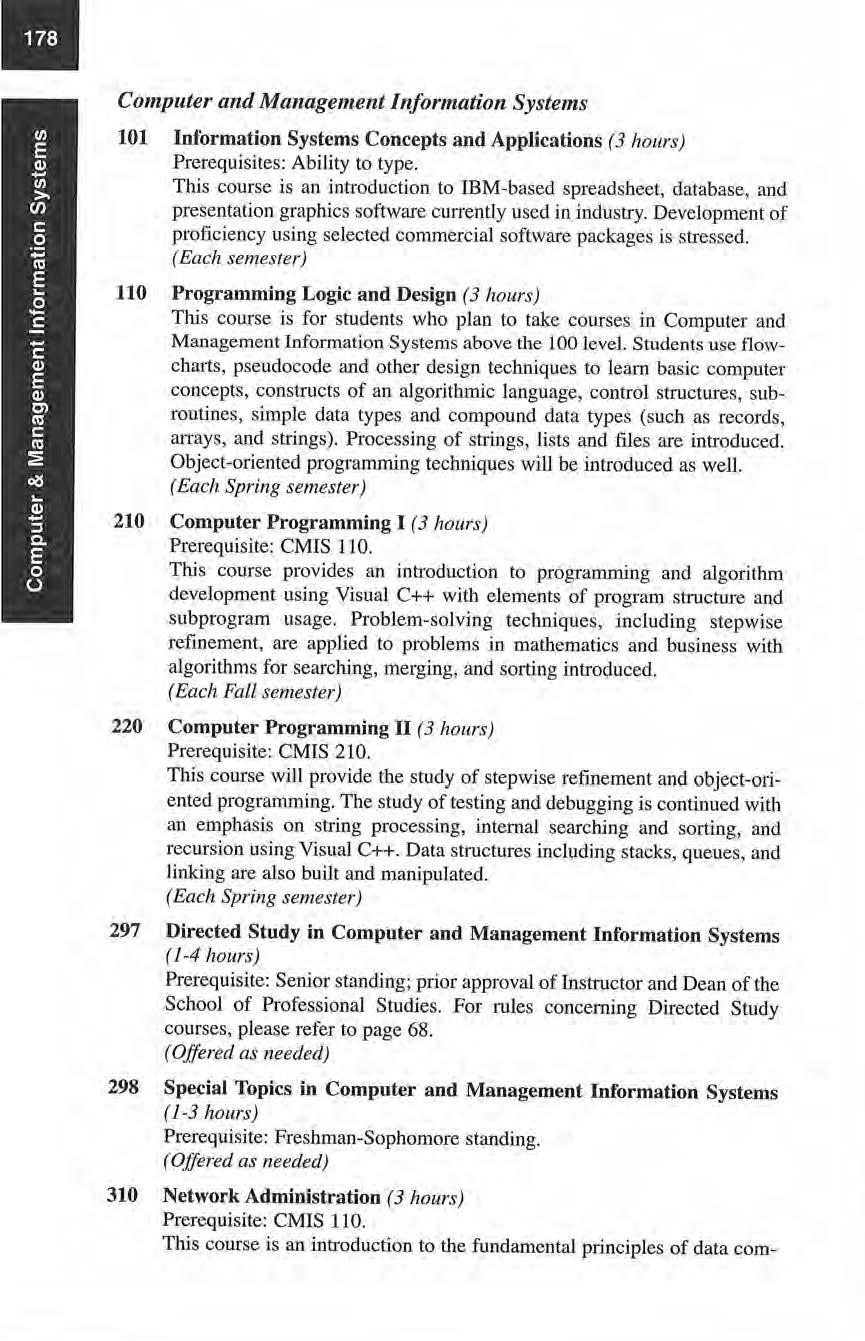
(Each Fall semester)
220 Computer Programming II (3 hours)
Prerequisite: CM IS 210.
Thi s course will provide the study of stepwise tefjnement and object-OJiented programming. The study of testin g and debugging is continued with an emphasis on str ing pro cessing, internal searchin g and sorting, and recursion using Visual C++. Data structures including stacks, queues, and linking are also built and manipulated.
( Each Spring semester)
2'Y1 Directed Study in Computer and Management Information Systems (1-4 hours)
Prerequisite: Senior standing; prior approval of IJ1s truct or and Dean of the School of Profes sional Studies. For rul es co ncernin g Directed Study courses, please refer to page 68.
(Offered as n eeded)
298 Spec ial Topics in Computer and Management Information Systems (1-3 hours)
Prerequisite: Freshman-Sophomore standing.
(O.ffered as needed)
310 Network Administration (3 hours)
Prereq ui site: CMIS 110.
This course is an .introduction to the fundamental principles of data com-
municatiou a nd connectivity. The students will have hands-on experience in managing a local area net.work. Topics include communication media, hardware, message flow with protocol, networking analysis, management of data communication systems and administration of local area networks
(Each Fall semester)
320 Netwo1·k Implementation ( 3 hours)
Prerequisite: CMIS 310.
Th.is course is an in-depth study of the technical issues associated with local area networks. Topics include digital transmission fundamentals , networking protocols, advanced network architectures, security protocols as well as configuration and installation of local area networks. Individuals who complete the course are ready to take th e Network+ certification examination.
(Each Spring semester)
410 Internet Programming (3 hours)
Prereguisite: CMIS 110.
This course w i.11 introduce students to Internet tech nology aod facilitate the development of skills in designing computer programs that work with Internet technology. The course will emphasize the fundamentals of Internet web servers and browsers, HTML, XHTML , and XML, client side programs using Java Script, popular web servers, and database connectivity through the web.
( Each Fall seme ster)
420 Database Management (3 hours)
Prerequisite: CMIS 110.
This course is a study of the methods used to store and access data. The course will introduc.e how to develop databases using Microsoft Access. Normalization, fot·m development, reporting, macros, and database security will be considered.
(Each Fall semester)
495 Systems Project Development and Management (3 hours)
Prerequisite: Senior business major having completed 45 semester hours of business major. Recommended for student ' s last semester.
In this capstone course, the student will propose and execute a systemsrelated project. The project is chosen in consultation with the instructor and must demonstrate the application of knowledge and knowledge skills acquired in the progcam. The techniques associated with formal project management will be reviewed and used throughout the course.
(Each Spring semester)
497 Directed Study in Computer and Management Information Systems (1-4 hours)
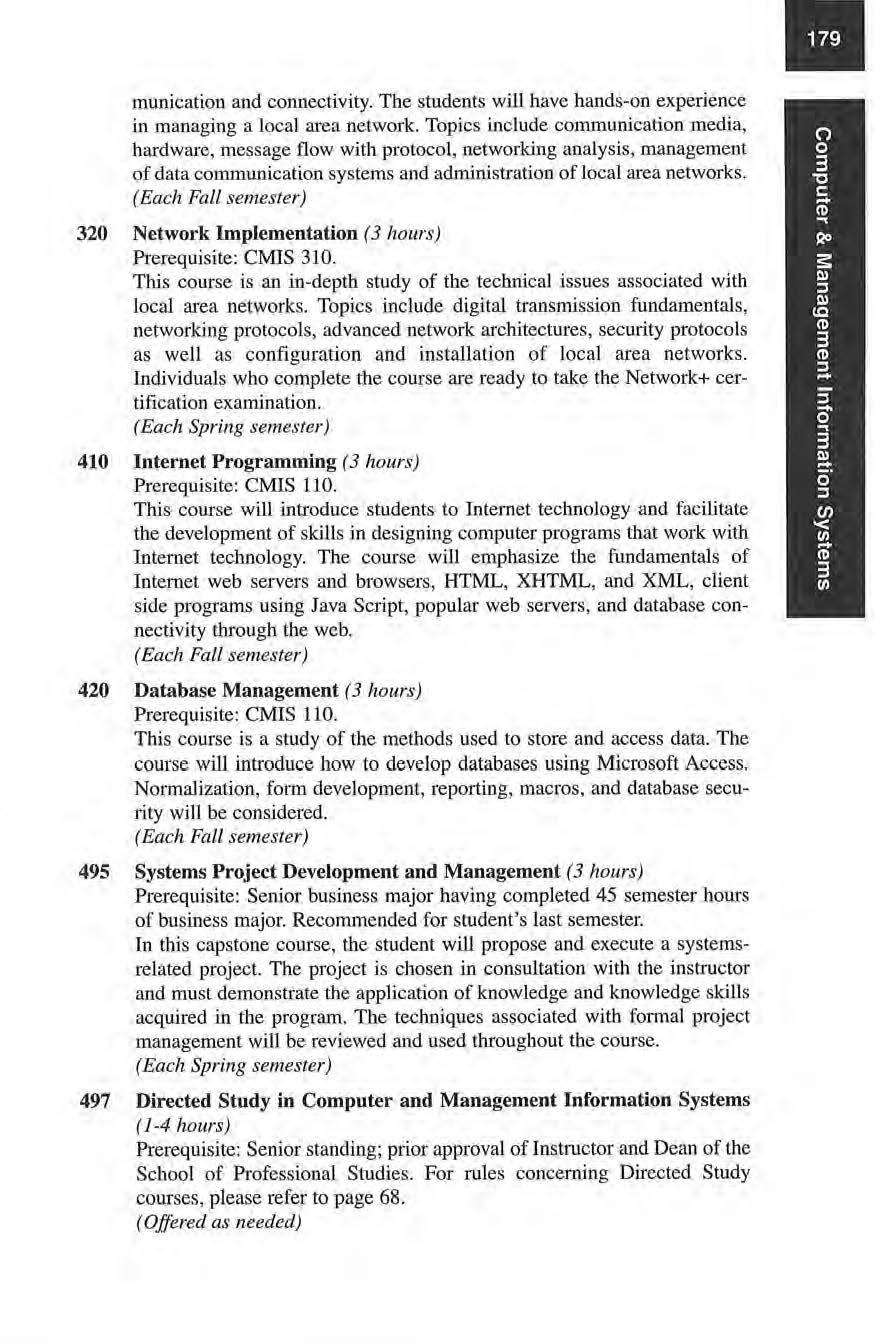
Prerequisite; Senior s tanding; prior approval of Instru ctor and Dean of the School of Professional Studi es. For rules concerni ng Directed Study courses, please refer to page 68
( Offered as needed)
498 Special Topics in Computer and Management Information Systems (1-3 Jzours)
Prerequisite: Junior or seniof s tanding .
( Ojfered c1s n eed ed)
499 Independent Study in Com puter a nd Management Information Systems ( 1-3 hours)
Prerequisite: Junior standing; prior approval oflnstructor and Dean of the School of Profes s ional Studies. Por rules concemjng Independent Study courses, please refer to page 68.

(Offered as needed)
Consumer Economics
332 Nufrition (3 /zo11r s)
Fundame ntal principles of human nutnt1011, its development through research as elated to the need s of individuals according to their age, sex. and occupation are s tudied.
(Each Fall semester)
Criminal Justice
110 Survey of Criminal Justice (3 hours)
1'his course introduces s tudents to general ciirunal jus tice concepts and knowledge about the relationships of crime and cri.lninal behavior. The purpo se, role, and inter rel ationships of the police, other law enforcement officials, the courts and judiciary, corrections, and parole system will be iliscussed.
( Each Fall semester)
220 introduction to Corrections (3 hours)
Prerequisite: Clus llO.
This course is a general introdu ctory co urse that describes the his tory and development. of corTections in America, the various aspects of correc tionaJ practices, and issues and perspectives affecting in s titutional life withi n the coJTectional system. Organizational and achninistrative practices wi ll be examined.
(Each Spring semester)
230 Policing in America (3 hours)
Prerequisite: CJus 110 .
This course covers the major roles of the police i n American society. The cotlrse wilJ investigate the origins of policing and law enforcement, poli.ce organization, the functions of police in society, and the polices' relationships to the various components of the criminal justice system. l ssues co nfronting police adm.irustration will be discussed,
(Ead1 Fall semester)
297 Directed Study in Criminal Justice ( 1 -4 hours)
Prerequi si te: Senior standing ; prior approval of In stru c tor and Dean of tbe School of Professiona l Studi es. For mies concerni ng Directed Study courses, please rofer to page 68.
(O.ffered as needed)
298 Special Topics in Criminal Justice ( l-3 hours)
Prerequisite: Freshman-Sophomore standi ng.
(Offered as needed)
300 Organization and Administration of Justice (3 hours)
Prerequisites: CJus 110.
Th.i s course will examine historical, as well as theoretical, aspects of the organization ~nd administration of the pol ice, courLs, corrections and juven.ile justice systems. The roles and functions of personnel and administrat ive management issues and practices that span and influe nce the justice and human services system are discussed.

(Each Fall semester)
308 Communi ty-B ased Cor rections (3 hours)
Prerequ isite: CJus 110.
This course focuses Oil correct io nal processes and strategies regarding probation, parole, juveniles, diversion, and other innovative approaches applied i.n a community settin g.
( Each Spring semester)
313 Loss Prevention (3 hours)
Prerequisite: CJus I 10.
Th.is course is designed to impart the knowledge of internal security issues such as personnel screening, t11e identification of hig h -r isk employees, rnetJ1ods of employee theft, honesty sboppin g, undercover detectives, interrogation principles, counseliog, a larm systems, and perimeter sectu·ity. External issues will include shoplifti ng, checks and credi t card security, forgery. burglary, and vendor fraud. This course is cross-listed as Bus 313.
( Each Spring semester)
330 Research Methods (3 hours)
Prerequisites: CJus 110.
This is an introductory course that couoentrates on research methods and designs and statis tical a naly sis procedures used in researc h projects. This course demonstrates how research meth ods are utilized in t be social and behavioral sciences. This couxse is cross -listed as Psyc 330.
( Each Fall semester)
340 Cr iminal Law (3 hours)
P rerequisite: CJus I JO.
This course will focus o n the concepts of case law as they pertain to due process, interpretation of c riminal s t atutes, e lements of evidence and proof from a legal sta ndpoint, a nd principal mles of criminal case processing. Cont emporary c riminal l aw i ssues confronting law enforcement offic ials from crime prevention through co urt appearance are considered.
(Each Spring semester)
360 Crimino logy (3 haurs)
Prerequisite: CJus 110.
This course examines the nature a nd causes of cr ime as a socia l phenomenon.
( Each Spring semeste r)
385 Victimo logy (3 hours)
Prerequisite: CJus 110, Junior or Senior standing.
This course will focus on the theoretical perspectives of victimization , the scope of victimization in the United States, the justice system's resp onse, victim's rights, topical issues , restorative justice, and research and evaJ.uarion findings. Being ex.posed to a nd understanding victimization issues will facilitate students' knowledge about a comprehensive system of jnstice rather than a "criminal's justice system."
(Each Fall semester)
410 Juve nile Delinquency (3 hours)
Prerequjsite: CJus 110
This course focuses on the nature and extent of delinquent acts and status offenses historically, theoretica l approaches to explain why these behaviors develop, environmental/contextual approaches to explanation , and bow the justice system and soc iety legally respond. A variety of cu ltural and social factors related to de l inqueucy are exami ned, along with program implications for prevention and intervention.
(Each Fall semester)
420 Judkial Systems a nd Processes (3 hours)
Prerequisites: C J us I JO.
This course provides an overv iew of the strnclure and functions of the crimina l court system i n the United States, including cmmty, state, fede ral, and specialized comts. Particular emphasis will be pl aced on the Nebraska Courts. Roles of court personnel, case flow management, a variety of issues confronting the court system, court standards are compared with actual functioning, and cou11 refonn measures are included.
( Each Fall semes ter)
441 Criminal Justice Interns hip ( l-12 hours)

Prerequisite: Approval from the Psychology/Criminal Justice Department Head.
Th is course is designed for any student majoring in Criminal Ju stice. A minimum of forty (40) hours of work experience will be required for each hour of credit for. which the student enro l ls. The student will complete necessary paperwork with employer and the School of Professiona l Studies office. Tbe student's work will be supervised and monitored by the Dean of the School of Professional Studies. A final paper will be prepared at the conch.1sioo of the internship.
( Each semester)
442 Criminal Justice Internship (1-12 hours)
Prerequisite: Approval from the Psychology/Criminal Justice D epartment Head.
This course is designed for any student majoring in Crimina l Justice to complete a second internsbjp. A minimum of forty (40) hours of work experience will be requirnd for each hour of credjt for which the student enrolls. The student will complete necessary paperwork with employer and the School of Profes sional Studies office. T he student's work wiU be
supervised by the Dean of the School of Professional Studies. A final paper will be prepared at the conclusion of the internship.
( Each semester)
450 Criminalistics (3 hours)
Prerequisite: CJus 110, CJus 340, or Permiss ion of Instructor. This course will introduce students to the basics of forensic sc ience , focus iu g OD the legal and procedural methods of evidence and ev idence collccrion techniques to include finge1print collection and analysis , firear ms ident ification, gunshot residue, tool marks, footprint and tire mark imp ressions, forensic serology, blood splatter evidence, forensic photography, DNA theory and analysis, and electronic surveiJlance issues. Students w ill a lso be exposed to various crime labs and their practices for evidence co llectio n and analys is.
( Each Spring semester)
495 Seminat· in Criminal Justice (3 hou rs)
Prerequj site: CJus 110, CJus 220, CJus 230, CJus 308, CJus 330, CJus 340, C]us 360, CJus 410 , CJus 420 , CJus 441, Senior sta nding. This capstone course focuses on applying the major categories of crimina l justice theories that have contributed to a n understanrung of deviant, delinqtient, or abno1mal behaviors and crime. Particular emphasis will be placed on practicing how the principles of each theory re late to the contemporary justice system: policing, correction s, courts , and juvenile justice.
(Each Spring semester)
497 Directed Study in Criminal Justice (1 -4 hours)
Prerequisite: Senior standin g; prior approval of Instructor and Dean of the School of Professio na l Studies , For rules concerning Directed Study courses, please refer to page 68.
(Offered as needed.)
498 Special Topics in Criminal .Justice ( 1-4 hours)
Prerequisite: Juni or or seni or standing.
(Offered as needed)
499 Independent Study in Criminal Justice (1-3 hours)
Prerequis ite: Junior standing; p rior approval of In structor and the Dean of the School of Professional Studies. For rules concerning fndependent Study courses , please refer to page 68.

( Offered as needed)
Earth Scie,ice
206 Principl es of Physical Science (3 hours)
This is an integrated course cover in g the va1iou s phases of man 's physical and chemical world. E xper iences with a variety of learning si tu ations , such as demonstralions, ex.periments, instructional television, an d other visual a ids are incl uded.
(Each Spring semester)
211 Principles of Earth Science (4 hours)
Thi s is an integrated course that examines fundamental t:oocepts in e arth sc ience, Course topics include concepts of matter and energy and their functio n in the solar s ystem, bas ic globaJ climatology and weather formation, fundamental geo logical composition and function, vulcanism , and tectonic processes, continenta l drift, glacia l and loess deposition , Nebraska so il s and the geophysical hi s tory o f North America. Both lecture and lab oratory are required for this comse.
( Each Fall semester)
220 Energy (3 hours)
This course is a study of energy resources with a focus on both nuclear and conventional power stations, design operati on, cost. governmental regulatio11 s, safety. and environmental effects. Field !Tips to nuclear and conventional gen eration stations are required .
(Each Fall semester)
230 Limnology (4 hours)
Limnology is the ·st udy of the physical and biological properties of inl and waters. Students will examine the origins, eco logy, and physical properties of inland waters including the effects of climate, land use, and pollution. Students will study the bio logical and physical properties of loc al s tream s and lakes and learn to assess U1e general health and water quality of i.oJand strea ms and watersheds. Both lecture and laboratory are requi red fo r thi s course.
( Fall se meste,; even y ears as ne e de d)
297 Directed Study in Earth Science ( 1 -4 hours)
Prerequisites: Senior s tanding; prior approval of Instructor and Dean of the Scbool of Arts and Sciences. For rules concerning Directed Study courses , please ,·efor to page 68.

(Each semester; summer sessiu11)
298 Special Topics in Earth Science (1-4 hours)
Prerequisites: Freshman -Sophomore s tanding. Arranged ( Offered as needed)
304 MeteoroJogy and Climatology (3 hours)
The physical factors influencing the climate with practical work in interpreti.ng meteorological records and forecasting are studied Both lecture a nd l a boratory are req uired for th.is course.
(Ojfered as needed)
306 Astronomy (3 hours)
Thi s is a basic course dealin g with a s tudy of the he avenly bodies, tbe s olar system, and the universe. Telescopic observation is a part of this course. Telescopic observation an-a nged. Cross - liste d as Physics 306.
(Spring sem este1; odd years as nee d e d)
315 Physiography of the Uni ted States (4 hours)
Prerequisites: ESc i 211.
As a regional s tudy of landfonn provinces, thi s co urse gives special
emphasis to the relationship between landforms, climate, soils, vegetation, and mineral resources. Both lecture and laboratory arc required for thi s course.
(Offered as /l eeded)
497 Directed Study in Earth Science ( I-4 hour!i)
Prerequis ites: Senior stand in g; prior approval of ln su·uctor and Dean of the School of Arts and Sciences. For rules concerni ng Directed Study courses, please refer to page 68.
(Each semester; summer sessio11 )
498 Specia l Topics in Earth Science ( 1-4 hour.~)
Prerequisites: Junior-Senior stand ing. Arranged.
(Ofl'ered as needed)
499 Independent Study in Earth Science (1-6 hour!i)
Prerequisites: Juni or standing; prior approval of Instructor and the Dean of the School of Arts and Sciences. For rules concerning Independent Study, please refer to page 68.
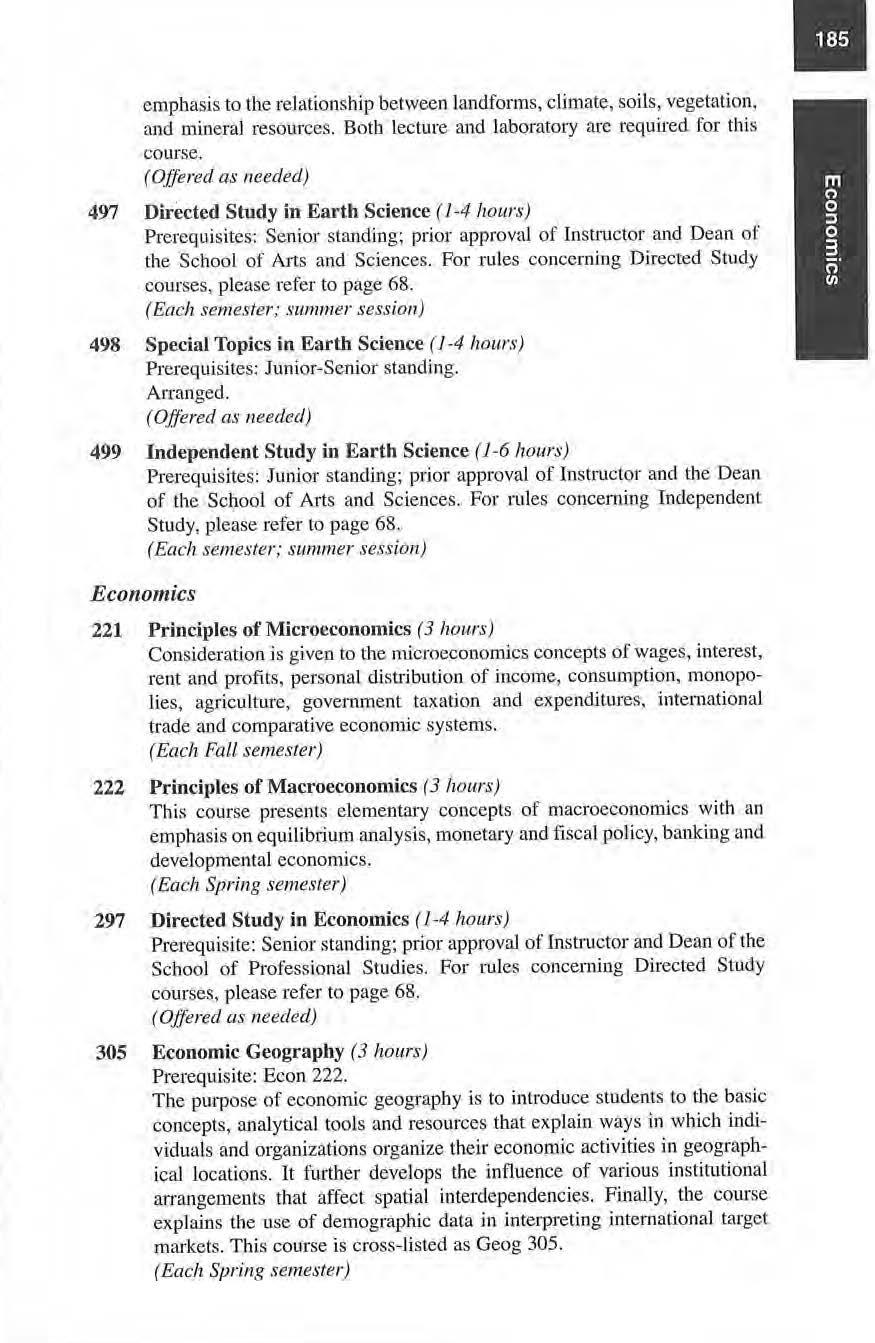
(Each semester; summer session)
Economics
221 Principles of Microeconomics (3 hours)
Consideration is g iven to the microeconomics conc epts of wages, interest, rent and profits, personal distribution of income, consumption, monopo1ies, agriculture, government taxation and expenditures, international trade and comparative economic systems.
(Each Fall semeste r )
222 Principles of Macroeconomics (3 hours)
This course presents elementary concepts of macroeconomics with an emp hasis on equi librium analysis, monetary and fiscal policy, banking and developmental economics.
(Each Spring semester)
297 Directed Study in Economics ( l -4 hours)
Prerequisite: Senior standing; prior approval of Instructor and D ean of the Schoo l of Profess io nal Studies. For ru.lcs co11ceming Directed Study courses, please refer to page 68.
(Offered as neede d)
305 Economic Geography (3 hours)
Prerequisite: Econ 222.
The purpose of econo1nic geography is to introdu ce students to the basic concepts, analytical tools and resources that explain ways in which individuals and organizations organize their econom ic activities in geographical locations It fiu-tber develops the influence of v:u"ious in st itutional an-angemen1s that affect spatial interdependenci es. Fhrnlly, the course explains the use of demographic data in interpretin g international target markets. This co urse i s cross-li sted as Geog 305.
(Each Spring semeste1)
320 Macroeconomics for Managers (3 hours)
Prerequjsite: Econ 222.
This cow-se presents advanced concepts of macroeconomics with an emphasis in the application of theory to practical problems faced by managers.
(Offered a,t n eeded)
497 Directed Study in Economics (1-4 hours)
Prerequisite: Senior standing; prior approval of Instructor and Dean of the School of Professional Studies. For rules concerning Directed Study courses, please refer to page 68.
(Offered as n eeded)
498 Special Topics in Econ omics (1-4 hours)
Prerequisite: Junior-Senior standing.
(Offered m· needed)
499 Ind ependent Study i n Economics ( 1 -3 lwurs)
Prerequisite: Junior standing; prior approval of In structor and D ean of the Sch ool of Profess ional studies. FO!· rules concerning Independeut Study courses, please refer to page 68.
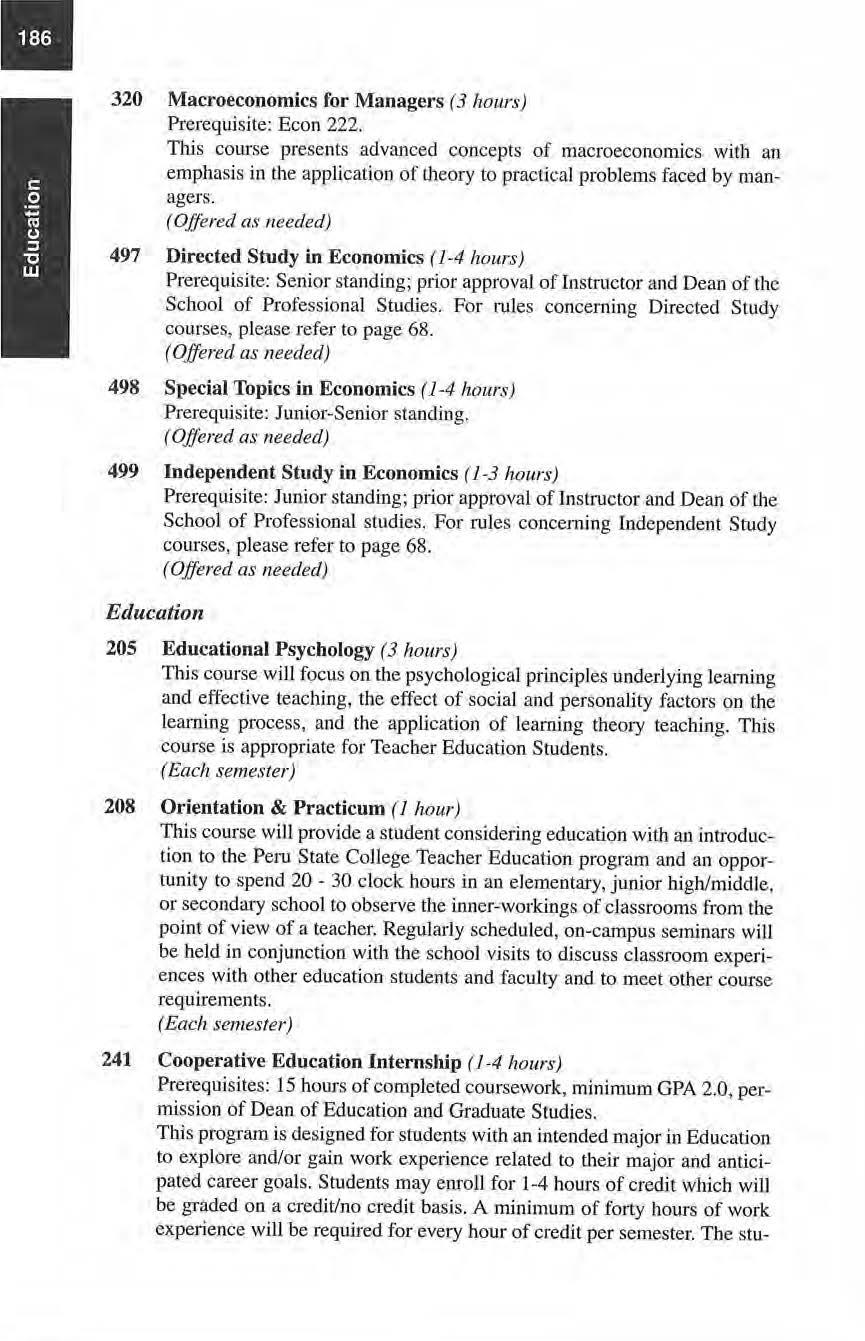
(Offered as needed)
Education
205 Educational Psychology (3 hours)
This course will focus on th e psycho logical princ ipleS underlying learning and effective teaching, the effect of social and personality factors on the learning process, and the application of learning theory teaching. This course is appropriate for Teacher Education Students.
(Each semester)
208 Orientation & Practicum ( 1 hour)
This cou rse will provide a student considering education with an introduction to the Pern State College Teacher Education program and an opportunity to spend 20 - 30 c l ock hours in au e lementary, junior high/ middle, or secondary school to observe the inner-workings of classrooms from the point of view o f a teacher. Regularly scheduled, on-campus seminars will be held in conjunction with the school visits to discuss classroom experiences with other education students and faculty and to meet other course requirements.
(Each semester)
241 Cooperative Education Int ernship ( 1 -4 hours)
Prerequ isites: 15 hours of completed coursework, minimum GPA 2.0, perm iss ion of D ean of Education an d Graduate Srudies. This program is des ig ned for studen ts with an intended major in Education to exp lore and/or gain work experience related to their major and anticipat ed career goals. Students may enroll for 1-4 hours of credjt which will be graded on a ct·edit/no cred it basis. A minimum of fo rty hours of work experience will be required for every hour of credit per semester. The stu-
dent w ill compl ete necessary paperwork with employer and the office of the D ean of Education a nd Graduate S tudi es. The s tudent's work will be s upervised by the Schoo l of Education and Graduate S tudies staff. A final paper will be prepared a t the conclusion of the inte rn shi p
( Each semester; summer sess ion )
297 Directed Study in Education (1-4 hours)
P rerequisi te: Seni o r s t a nding; prior approval of lo structo r and Dean of Sc hool of Education and Graduate Studies. For rules concerning Directed Study courses, please refer to page 68.

( Offered as needed)
298 Special Topics in Education ( 1-4 hours)
Pre requ is i te: Freshman-Sophomore standin g.
( Offered as needed)
300 Classroom Management & Effective Teaching (2 ho ur.1)
Prerequis ite : Admission t o Teac he r Education.
Thi s course is inte nded t o provide prospective teacher education candid ates the opportunity to discuss the re l ationships between classroom management an d effective teaching, to researc h and di scuss c urre nt theory, research , and practice in classroom management an d effective t eaching, discuss a nd practice lesson and uni t planning and c urric ulum desi gn, and to discuss individual management styles and plans for their o wn classrooms.
( Each semester)
301 Practicum - Social Studies and Language Arts ( 1 h our)
Prereq uis ites: Admission t o Teacher Education; Conc urre nt e nrollment in Educ 325 & 326.
This co urse provides field expedence in e l ementary or middle scho ol s for students e nrolled in Soc ial Studies and L a n_guage Arts Methods courses.
(Each semeste r )
302 Practicum - Math & Science ( 1 hour)
Prerequisites: Admission to Teacl1er Education; Con c uITent enro llme n t in Educ 327 & 328.
This course provides field experience in e lementary or m iddle sch oo l s foe students e n ro ll e d i.n Math and Science Met hod s courses.
(Each semest er)
304 Elementary/Middle Grades Practicunl (1 -2 hours)
Prerequisite: Admission to Teacher Educatio n.
This course pro vides pr actic a l expeiie nce for th ose who need field work at the elementary or middle level s either in addition to the hours required in the e lementary or secondary programs or for endorsement programs which need to provide field work for certification.
( Each semester)
305 Principles of Early C hildhood Ed ucation (3 hours)
Pre requisite: Admission to Teache r Education.
Thi s course is designed to give students the theory and practice necessa ry for teaching a nd carin g for c hildre n from infa ncy through age e ig ht. It i s
an introduction to the professional preparation needed for preschools and child care.
(Each Fall semester)
308 Early Childhood Practicum (2 hours)
Prerequisites: Admission to Teacher Education; ConcuJTent enrollment in Educ 402.
This course is designed ito provide s tudents an opportunity to observe the spec ific methods being studied in the m ethods class and to begin to pract ice th ose meth ods. May be repeated to a total of four (4) hours.
(Eac h Spring semester)
309 Secondary Practicum (2 hours)
Prereq ui sites: Ad rui ssio1; to Teacher Education ; Concurren t enro llment in Educ 310 (or subject area methods).
Th is course is designed to provide stude nts an opportunity to observe the specilic methods being studied in methods classes and to begin to practice those methods.
( Each semester)
310 Secoi\dary Sch ool Teaching Methods (3 hours)
Prerequisites: Admission to Teacher Educatio n: Co ncmTent e nJol lment in Educ 309.
T h is course provjdes educat ion majors with opportunities to study, dis~ cuss. and practice instructional methods spec ifica lly for middle and high schoo l students and to examine these school env ironments.
( Each semester)
317 Test s and Measurements (2 hours)
Prerequisite: Admissio n to Teacher Education.
The co urse emph asizes the procedures fu r constructing tests , analyzi ng teacher made tests, a nd applying the results of testing to grading and repo1ting of pupil progress. The cou rse also presents tbe basic statistics which are used in the anal ys is, interpretation, a nd use of test results.
( Each semeste r)
325 Teaching Language Arts in the Elementary/Midd le School (3 hours)
Prerequisites: Admission to Teacher Educatio n ; Concurren t enrollinent in Educ 301 & 326.
This course investigates goa ls, methods, materials , and eval uat ion techniques in the area of e le m entary/midd le grades language arts.
(Each semester)
326 Teaching Social Studies in the E lementary/Middle School (J hours)
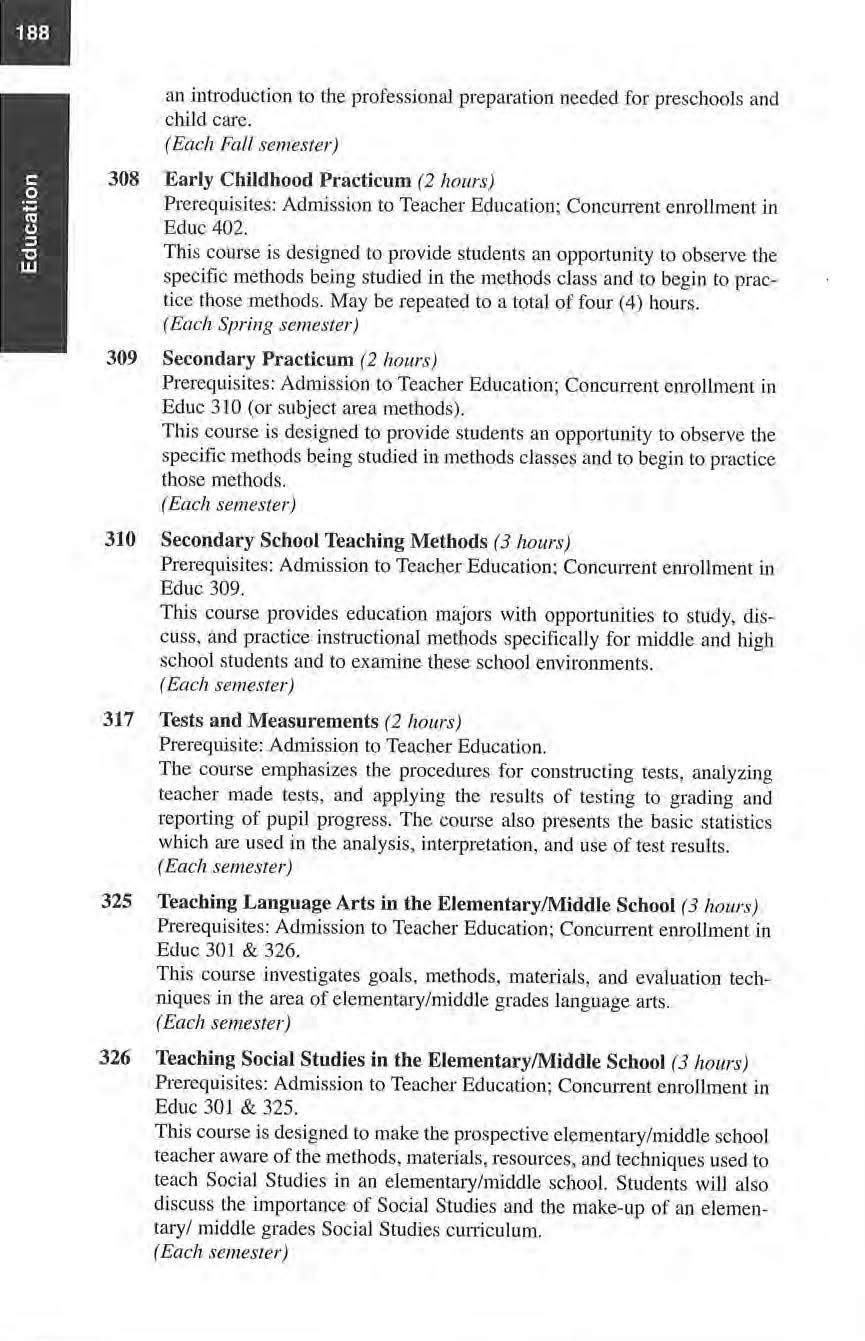
Pre requ isites: Admission to Teac her Education ; Concurrent enro llm ent in Educ 301 & 325.
Thi s couJse .is designed to make tbe prospective e lementary/m iddle school teacher aware of the methods, materials, resources , and techn iques used to teac h Socia l Studies in an eleme nt a r y/nticldl e school. Students will also d iscuss Lhe importance of Soci a l Studies and the make-up of an elementary/ middle grades Socia l Studies cunicu lum.
(Each se111es1er)
.
327 Teaching Math in the Elementary/Middle School (3 hours)
Prerequisites: Admission to Teacher Education: Concurrent enrnllment in Educ 302, 328; and Math 110 or equivalent. This course introduces and gives practice to students in the philosophical basis, techniques, instructional methods, organization, and learning activities of teaching elementary/midd le grades Mathematics.
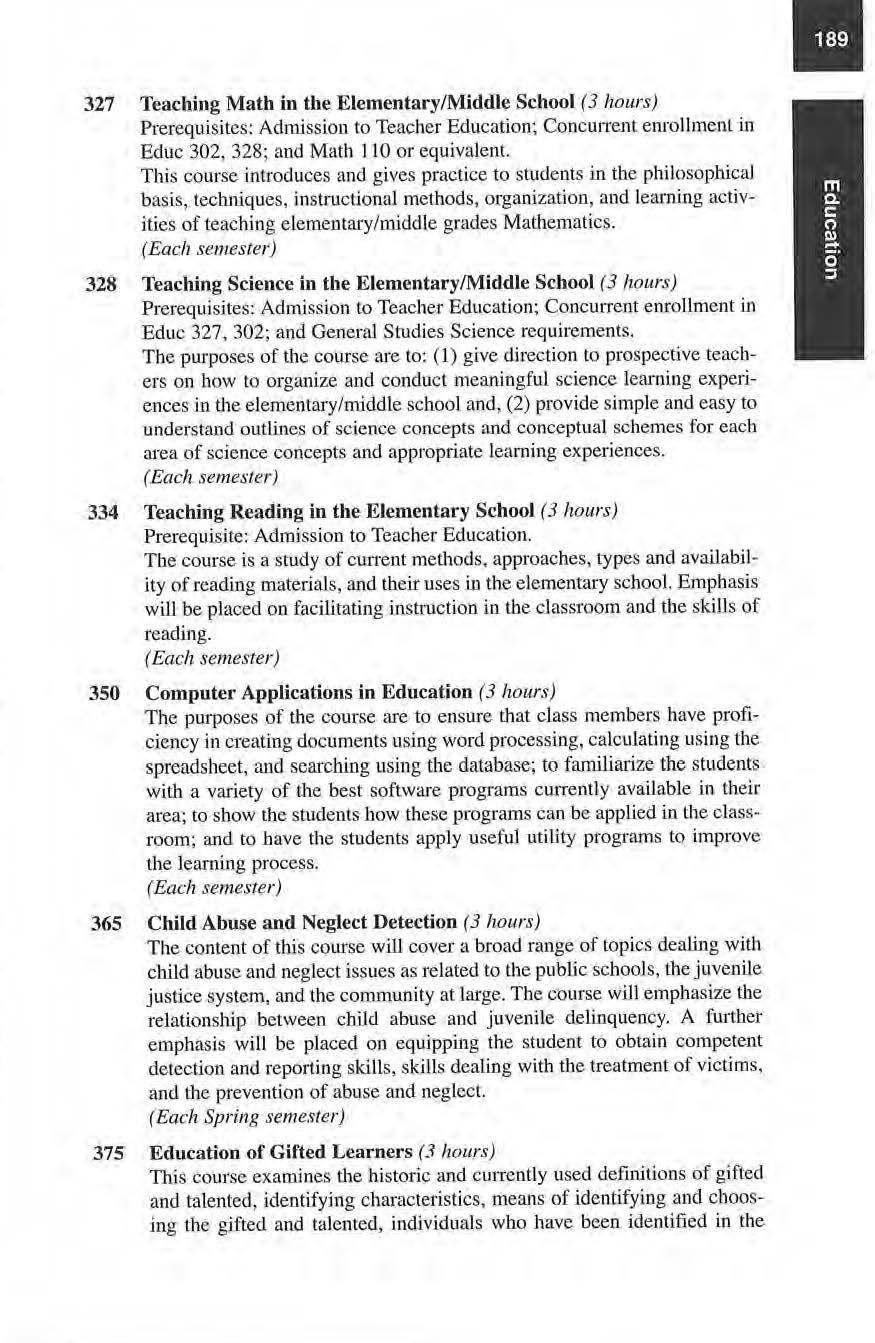
( Each semester)
328 Teaching Science in the Elementary/Middle School (3 hours)
Prerequisites: Admiss ion to Teacher Education; Concurrent enrollment in Educ 327, 302; and General Studies Science requirements. The purposes of the course ate to: (1) give direction to prospective teachers on how to organize and conduct meaningful science learning experiences in the elementary/rn.iddle school and, (2) provide simp le and easy to understand outlines of science concepts and conceptual schemes for each area of science concepts and appropriate learning experiences.
(Each semester)
334 Teaching Reading in the Elementary School (3 hours)
Prerequisite: Admission to Teacher Education.
Tbe course is a study of current methods, approaches, types and availability of reading materials, and tbeir uses mthe elementary school. Emphasis will be placed oo facilitating instmction in tbe cJassroom and the skills of reading.
( Each semester)
350 Computer Applications in Education (3 hours)
The purposes of the course are to ensure that class members have proficiency in creating documents using word processing, calculating using the spreadsheet, and searching using the database; to familiarize the students with a variety of the best software programs cu.tTent ly available in their area; to show the students bow these programs ca n be applied in the classroom; and to have the studen ts apply useful utility programs to im prove the learning process.
(Each semester)
365 Child Abuse and Neglect Detection (3 hours)
The content of this course will cover a broad range of topics dealing with child abuse and neglect issues as related to the public schooJs, the juvenile justice system, and the commun ity at large. The course will emphasize the relationship between child abuse and juvenile delinquency. A further emphasis will be placed on equipping the student to obtain competent detection and reporting skills, sk.i11 s dealing with the treatment of victims, and the prevention of abuse and neglect.
(Each Spn'ng semester)
375 Education of Gifted Learners (3 hours)
This coul'se examines the historic and curre ntl y used definitions of gifted and talented, identifying characterist ics, means of identifying and chooslng the gifted and talented, individuals who have been identified in the
present and past, and techniques for teaching gifted and talented students in the regular classroom.
(Each Spring semester)
400 Philosophical Fo unda tions of Education (3 hours)
Prerequisites: Taken immed iately preceding Student Teaching; Admission to Teacher Education.
Philosophical Foundations of Education is a capstone course designed to assist the prospective teacher entering studen t teaching and, ultimately, the teaching profession So that all stude nts can draw on previously learned informatiou when discussing the various objectives of the course, all students will take this course during the semes ter prior to student teachjng.
(Each semester)
401 Emergent Literacy (2 hours)

Prerequisites: Admission to Teacher Education and Psyc 250.
This course is designed to provide the learner with a background in the developmeut of language, com muni cation and reading. Methods facilitating these skills will be addressed in a developmental approach.
(Spring semeste1; odd years)
402 Methods in Early Childhood Education (3 hours)
Prerequisites: Admission to Teacher Education; Concurrent enrollment in Educ 308.
This course deals with curri culum, program planning, materials, and iodjvidualization in Early Childhood Education.
(Each Spring semester)
403 Diagnostic aod Remed ia l Reading (3 hours)
Prerequisites: Admission to Teache r Education; Educ 334 or 434, Tilis course is designed for s tudents and practicing teachers wbo want to broaden their knowledge and skill in diagnostic and remedial reading techniques , Thi s course will include the administration and interpretation of diagnostic instruments, the causes of reading problems, remedial techniques, and admi1tistrative procedures with which reading teachers s hould become familiar.
(Each semester)
4 05 D iagnostic a nd Remed ial Mathematics (3 hours)
Prerequisites: Admission to Teacher Educati on ; SpEd 200, Educ 327 or approval of Ins tructor.
Thi s course is designed to p rovide a foundation for working with stu dents who have special needs in the area of mathematics. Learning theory and general techniques for dealing with instruction of students with special mathematics needs will be emphasized.
( Each Fall semester)
409 Recertification Student Teaching (3-4 hours)
Prerequisite: Must have held a Nebraska Initial Standard or Professional Teacrung Ce1i ificate or its equivalent from anotber state
This course is designed for those persons whose teaching certificate has
'
expired for longer than five (5) years. The course wiH provide the oppornmity for the person to spend a minimum of three weeks in a K-12 classroom to become reacquainted with students and classroom, procedures. Educ 409 will fulfill the State Department of Education Practicum requirement for renewal of an expired certificate.
(Each semester)
410 Elementary Student Teaching (8-16 hours)
Prerequisite: Admission to Student Teaching. This is a practical application of the principles of learning in the classroom with a progressive introduction into foll teaching responsibilities at the elementary level. Students teach full-time for eight- sixteen weeks.
(Each semester)
411 Seconda ry Student Teaching (8-16 hours)
Prerequisite: Admission to Student Teaching. This is a practical application of learning princip les in the classroom with a progressive introduction into full teaching responsibilit ies at the secondary level. Student s teaoh full-time fo r e ig ht-sixteen weeks.
(Each semester)
412 Early Childhood Student Teaching (8-16 hours)
Prerequisite: Admission to Student Teaching. This provides observations, laboratory and teaching experience in directing the learning activities of chi ldren in Pre-kindergarten through grade three (3) . During the s tudent teaching experience, the student applies the theories and principles of learning an d in struction, Studen ts teach fulltime for eight -s ixteen weeks.
(Each semester)
413 Middle Grades Student Teaching (8-16 hours)
Prerequis ite: Admission to Student Teaching. This is practical applica tion of learning principles in the classroom witb a progressive introduction into full teachlng responsibility at the middle grades level. Studen ts teach full-time for eight-sixteen weeks
(Each semester)
415 Drug Use and Abuse (2 hours)
This course is a study of the different types of drugs that are prevalent in our American soc iety. Emph asis will be placed on the origins of drug-taking behavior, the problems that d rugs create -in soc iety, and the allure th at drugs have in American culture today
( Spring semester)
425 Teaching in the Middl e Grades (3 hours)
Prerequisite: Admission to Teacher Education; taken semester immediately preceding student teaching. T his course is designed to provide studen ts with a backgl'Ound in the curriculum, history, and philosophy of the middle school. It will also i nvestigate the organizational structure, team planning and coll aboration techni ques, and teacher-student advisin g siniations that are unique to the middle grades.
(Spring semester)

434 Secondary Reading and Writing Across the Curriculum (3 hours)
Prerequisite: Admission to Teacher Education.
The coui•se wil I be a study of the current trends and practices in reading in t'he secondary schoo ls. Emphasis will be placed on ways for teachers to improve reading skills for students as we ll as ways to use those skills to improve learning. Tile rending/writing relationship will be explored and students will be introduced to the process method of writing instruction. Ways to incorporate this method of writing into content area classrooms will be presented as well a s other composition methods that can be used in the conteut areas.
(Fall semester)
438 Professional Collaboration With Parents and Families ( 3 hours)
T his course is designed to help prepare f uture teachers to wo rk with parents and fami li es of multiple cultures in educational, comm uni ty and other professional environments . The course will focus upon theories and techniques of establishing effective communication, collaboration., and basic counseling relationships with both traditional and non-traditional family units. Srndents will explore the changing nature and definition of the American family, bow cul ture influences familia l interactions and values , ru1d the ethics of bet-ping relationships.
( Fall Semester)
441 Cooperative Education Intern ship (1-12 hours)
Prerequisites: Upper-class standing. permission of the Dean of the Sch ool of Education and Graduate Studies.
This course is designed for any student majoring in an y discipline listed within the School of E ducat ion and is to be taken near the end of the formal coUege course requirements. Students may enroll for 1-12 hours of credit upon approval of the Dean of the School of Education tmd Graduate Studies. The l earning s ituation will be organized a nd supervised by the Dean of the School of Education and Graduate Studies. A minimum of forty hours of work experience will be required for each hour of credit for which the student enroll s. This is not in Lieu of the required teacher education practicums or studen t teaching, (Each semester; summe r session)
497 Directed Study in Education (1-4 hours)
Prerequisite: Seni()r standing; prior approva l of lnslructor and Dean of tbe School of Education and Grad'uate Studies. For rules concerning Directed Study courses, please refer ro page 68.
(Offered as needed)
498 Special Topics in Education ( 1-4 hours)
Prerequisite: Junior-Senior standing
(Offered as needed)
499 Independent Study in Education ( 1-3 hours)
Prerequisite: Junior standing; prior approval of In s tructor a nd tbe D ean of the School oJ Education and Graduate Studies. For rules concerning Independent Study courses, please refer to page 68.
(Offered as rweded)
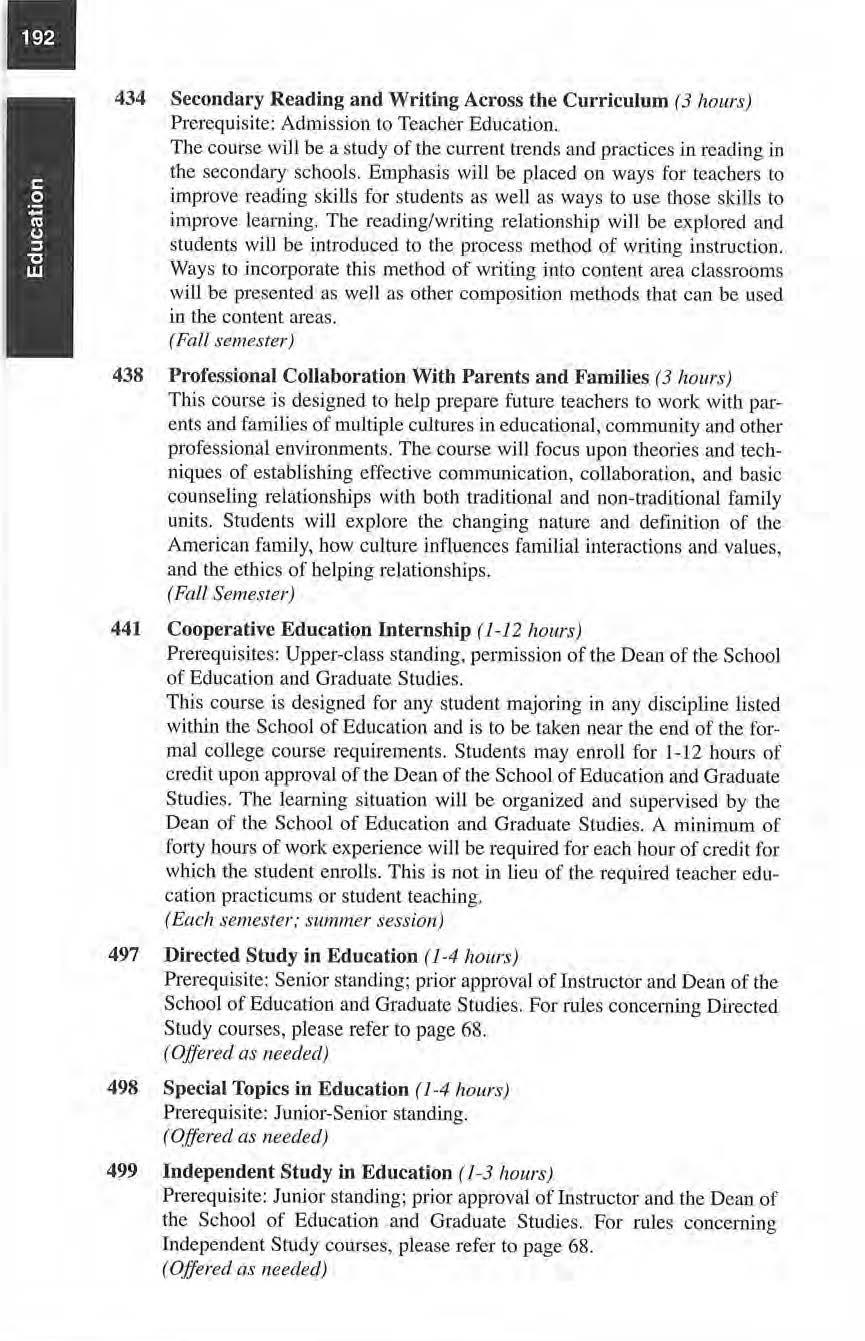
English
100 Ele me nts of C ompositio n (3 hours)
English LOO is designed to belp s t udents who need additional assistance with composition (as determined by either an individual student's decision, by ACT score, o r by the Computer P laceme nt Test) to acq uire the requisite writing skills to pass Engli s h 10 I . Stude nts enro lle d in E l e ments of Composition will w r ite essays; in addition, thi s class places specia l emphasis on organization, grammar, sen tence s tructure and those other e l ement s that co nstitu te effecti ve prose. Th is co u rse earns st udents insti tutional credit b ut does not fulfiJ I G e ne ral S t udies re qLtirements.

( Each semester)
101 E nglis h Compos ition (3 hours)
Tb is cow se is a study of the princip les of clear a nd effective exp ress ion as applied to the sentence , paragrap h, and tbc who le compositio n A review of g rammar, mechanics, and con-ect usage. T raining in organ ization, and the writing of short and long pape rs. Required course for all fres hmen. Each sem es ter the department will offer at least o ne special focus coui·se b ut no more than two. (Note: Students who rank at t he 85th percenti le or higher on the Engli s h portion o f tbe ACT may be excused from Englis h 10 l.)
( Each semester)
201 Advanced En g lish Compos ition (3 hours)
Prerequisite: English lO I.
This course p rovides advanced training in writing a variety of types of papers w ith emphasis placed on writing that requires the student to think cri ticall y, su pp o rt ge ne r a l iza ti o ns, and approp r iatel y acknow ledge sources of information.
( Each semester)
202 Appreciation of Literature (3 hours)
T h is course meet s a ge neral educatio n requirem en t desig11ed lo increase tbe s tudent 's appreciat ion of literature with an emp hasis on modem literary forms.
( Each semeste r )
203 Literature for Children throug h Adole scen ce (3 hours)
Th is course provides a survey of ljterature for children through adolescence with an emphas is o n applying the principles of valuation to se lected book.~ from bo th trad itional and modern picture books, poems, and s tories.
(Each Spring semester)
22 2 World Lite rature to 1500 (3 hours )
This course serves as an int roduction to classical. and medieva l tradition s in Western l iteranire.
(Spring semeste 1; even yea rs)
225 S hort S tory (3 hours)
T he major emphasis of this course is on the development of the short story in Ame rican literatu re.
( Fall sem ester, even years)
297 Directed Study in English ( 1-4 hours)

Pre requ isite: Se ni or standing; prior approval of In structor and Dean of the School of Arts and Sc iences. For rules concerning D i:rected Stu dy cou rses, please refer to page 68.
( Offe red as needed.)
298 Special To pics in E n gl is h (1-4 holiJ·s )
P re requis ite : Fres hman-So phomore s tanding.
(Offered as needed)
3 01 Traditional Grammar (3 hours)
The emph as is of this course is on a n in-depth analysis of sentence s tructure.
(Sp ring semester, o dd years)
3 05 Practicum in Composition (3 ho urs)
This course is an investigation of current practices, research , iss ues, and theories about teac hing composi tion to see how they apply to classroom teaching .
(Fall semester, even years)
3 06 Nebraska Literature (3 hours)
Prerequisite: Consent of the in structo r.
Tl1i s course provides an introduction to the works of Nebraska writers and literature about Nebraska .
(Spr ing semesre1; even years)
307 Seminar in tbe Modero Nove l (3 hou rs )
This course is a s tudy of modem fiction as it mi.tTors the phllosophicaJ . soc iolog ical, psychological, and scientific thought of the twentieth cen tury.
(Fall semeste1; odd years)
309 Creative Writing (3 hours)
Thi s course allows for experimentation with writi ng poetry, sh o rt fiction , and creat ive nonfi ction in a w1iting workshop setting.
( Each Fall semester)
322 British Literature (3 hours)
This course includes an historical s urvey of Britis h Literature from Old and Middle Engli sh literan1re to the present. M ajor writers receive chief emphasis.
( Fall semester, even years)
326 American Literature (3 hours)
An hi sto rical su rvey of s ignificant American writing from the Colonial Period to the presen t era. Major writers receive c hi ef emphas is .
( Each Spring semester )
330 Modern Poetry and Drama ( 3 hours)
This course will focus on major American and British poets and dramatists of the 20th and 21" centuries. Thi s cou rse wiU prov ide the student th e o pportunity to follow the growth of modern poetic and dramatic tec h -
niques in th e western world and to make the stude nt aware o f his or h er rece nt heritage of dramati c and poetic literature.
( Fall semester, odd years )
335 Non-Western Literature (3 hours)
Thi s course is a o examinatio n of significant literary works o f Africa , the Middle East , Asia. Ocea nia , the Americas, and the Caribbean.
(Eac h semester)
357 Interpretive Re ading (3 h o urs)
Tbis course is d es igned to emphasize oral reading of worthwnilc literature i n group settings. It in cl udes the c lose. critical analysis of practice se lectio ns as well as the s tu dy and praclice of basic delivery tec hni ques. Th is course is d ual listed with Speh 357.
(Each Spring semester)
375 Film Study (3 hours)
An introduction to fi lm studies with emphas is o n critical analysis, hi s to rical deve lopment, c ultural significance, and cinematic techni que is provided in this course.
( Each Spring semester)
418 Shakespeare (3 hours)
This course provid es a s tudy of re prese nta tive plays a nd so nn ets.
(Spr ing semeste1; even years)
440 History of th e Engli sh Language (3 hours)
This course is a study of the growth of modem English through examination of changes in th e so unds, form s, a nd syntax that have occ urre d in the la nguage and the development of vocabulary.
(Fall semester, odd years)
450 Englis h Seminar (3 hours)
Th e capsto ne c lass for L anguage Art and En g li sh Maj or s. E ng lish 450 is a research-direc ted semi nar which focuses o n various issues, authors, a nd topics in literatu re (Women's Literature, Literary T heory, Major Authors) cu rrently being discussed and debated nation all y or inte rn ationa ll y.
(Si1 ring semester, even years)
461 Literature Fights and Re-fights the C ivil War (3 hours)
'flus course is an i nterdiscipl inary literature/history course that examin es how the Civi l War and Reco nstruction and the events and issues leadi ng up to aod ari sing from them h ave been portrayed i n American literatul'e. The course will include a fie ld trip to a battlefield site i n Mi sso uri. Du allisted as H ist 461.
(Spring semester, eve11 years)
497 Directed Study in English (1-4 hours)

Prerequi site: Senior stand i ng; prior approval of Instructor and Dean of t be Sc hool of Arts and Sc iences. For rules concerning Directed Study courses, please refer to page 68.
(Offered as needed.)
498 Special Topics jn English (1-4 hours)
Prerequisite: Junior-Senio r standing.
( Offe r ed as n eeded)
499 Independen t Study i n English ( 1-3 hour~')
Prerequisite: Junior standing; prior approval of In structor and the Dean o f the School of Arts and Sciences. For rules concerning Independen t Study co urses, please refer to page 68.

( Offered as nee ded)
General Science
241 Cooperative Edu cation Internship ( 1-4 hours)
Prerequi site: 15 bours of completed coursework, minimum GPA 2.0, permission of tbe Dean of the School of Arts and Sciences. This prog ram is desi gned for s tudents with an intended major in th e Science and Technology to explore and/or gain work experience related to their major and anti cipated career goa ls. Students may enroll for 1-4 hours of credit which will be graded on a c redit/no c redit basis. A minimum of forty hours of work expe ri ence wi ll be required foe every hour of credit per semester. The s tude nt will complete necessary paperwo rk with the employer and the Dean of the Schoo l of Arts and Sciences. Th e student's work will be sup e rvi sed by the Dean of the School of Arts and Sciences. A final pape r wi11 be pre pared at th e conclusioo of the internsh ip.
( Each semesrer; summer session)
441 Cooperative E du ca ti o n Internsh ip (1 - 12 fzours)
Prerequisite: 45 hours of co mple ted course work , minimum 2.0 GPA, permission of the Dean of th e School of Arts and Sciences. This program is desi g ned for s tudents with a major in Science o r Technology to gain work experieuce related to their major and career goals. Students may enroll for 1-12 hours of graded credit. A minimum of forty hours of work experience will be required for every ho ur of credit per semester. The student will complete necessary paperwork wi th th e e mployer and the Dean of th e School of Arts and Sciences. The student's work wilJ be superv ised by the Dean of the School of Arts and Sciences. A final paper will be prepared at the conclusion of th e inte rns hip.
(Ead1 semester; summer session )
Geography
101 Principl es of P hysica l Geography (3 hours )
This course is the introdu ctory study of th e re lati o ns hip of ma n and environment, w ith an emphasis placed upon c limate regions of the world.
( Fall semeste1; odd years)
103 Human Geography (3 hours)
Human G eog raphy is th e s tudy of the human elements of tl1e e nvironme nc w ith empha sis on the orig in s of culture, population trends, wo rld cultures, eco nomies of man, and urban and political syste ms.
(Sprin g se111este1; odd years)
297 Dit·ected Study in Geog r a phy ( 1-4 hours)
Pre requisite: Senior standi ng; prior approval of Instructor and Dean of t he Scho ol of Arts and Sciences. For rules co ncerning Direc ted Study courses, p lease refer to page 68.
( Offered as needed)
30 5 Econo mic Geography (3 hours)
Prerequis i tes: Econ 220 .
The purpose of economic geography is to introduce the sLuden t to th e basic co ncepts, analytical too ls and resources t hat ex plain ways in which indiv idual s and organizarions org ani ze the ir economi c activ iti es in geogmph ical locations. I t further develops the .influence of va riou s institutional arrangements that affect s pati a l interdepende ncies. Finally, the course explains the use of demographic data in interpreting international target markets. This course is cross-listed us Econ 305.
(Spring semeste,; even years)
326 Co nservation of Na tura l Resources (3 hours)
Thi s cou rse is an evaluation of soil, wate r, rnim:ra.l , forestry, fish, air, a nd recrea tion resources in order to develop an apprec iation of their importance and the seriou s ness of environmental problems.
(Offered as needed)
497 D irec ted S tudy in Geography ( 1-4 h ours)
Prerequi s ite: Senior standfog; prior approval of Instructor and Dean of the School of Arts and Sciences. For rul es concerning Directed Study courses, please refer to page 68.

(Offered as needed)
498 Special Topics in Geog raphy ( 1-4 hours)
Prerequisi te: Juni or-Senior standing.
( Offered us needed)
Geo logy
2 01 Physi cal Geology (4 hours)
Thi s co urse is an introductio n to the theories of the earth's ori g in and the study of the earth 's structure and materials with a special emphasis on rock, minerals, landfonns , oceanography and environmental studies. Both lecture and laborato ry are required for thi s course.
(Offered as needed)
202 Rocks a nd Mi nerals (3 hours)
This course is an introduction to the s tudy of the physical prope rties of rocks and minerals s tressing field work a l mineral and rock localities in Southeast Nebraska. Both lectu re and l abo ratory are required for this course.
(Offe red as needed)
20 3 Introduc tion to Fossils (3 hours)
Prerequjs i tcs: None.
This cou rse provides an introduction to the methods of interpreting the
foss il record through actual field work at fossil locatio ns in Southeast Nebraska. Both lec ture and laboratory are required for th is course.
( Offe red as n eeded)
297 Di rected S tudy in Geology ( 1-4 hours)
Prerequisi tes: Senior s tanding ; prior approval of Instructo r and Dea n o f the School of A.Its and Sciences. For mies concernin g Directed Study courses, please refer to p age 68.
( Offered as needed)
298 Sp ecia l To pics in Geo logy (1-4 hours)
Prerequi s ites: F reshman-Sophomore standin g . Arranged .
( Offe re d as needed)
301 Histo rical Geo logy (4 hours)
Pre requis ites: None.
Thi s cou rse introduces the geological history of the earth and tbe evolution of its a nim a l and pl an t in h abitants. It includ es wor k at fossil loca lities in So uth easte rn Nebraska utilizing stratigraphi c methods Both lecture and laborato ry are required for this course.
( Offered as n eeded)
497 Directed S tudy in Geo logy (1-4 hours)
Pre re quis i tes: Senior standing; pri o r ap pmval of ln structor and Dea n of the Schoo l of Arts a nd Sciences. For rules co ncerning Directed Study courses, pJease refe r to page 68.
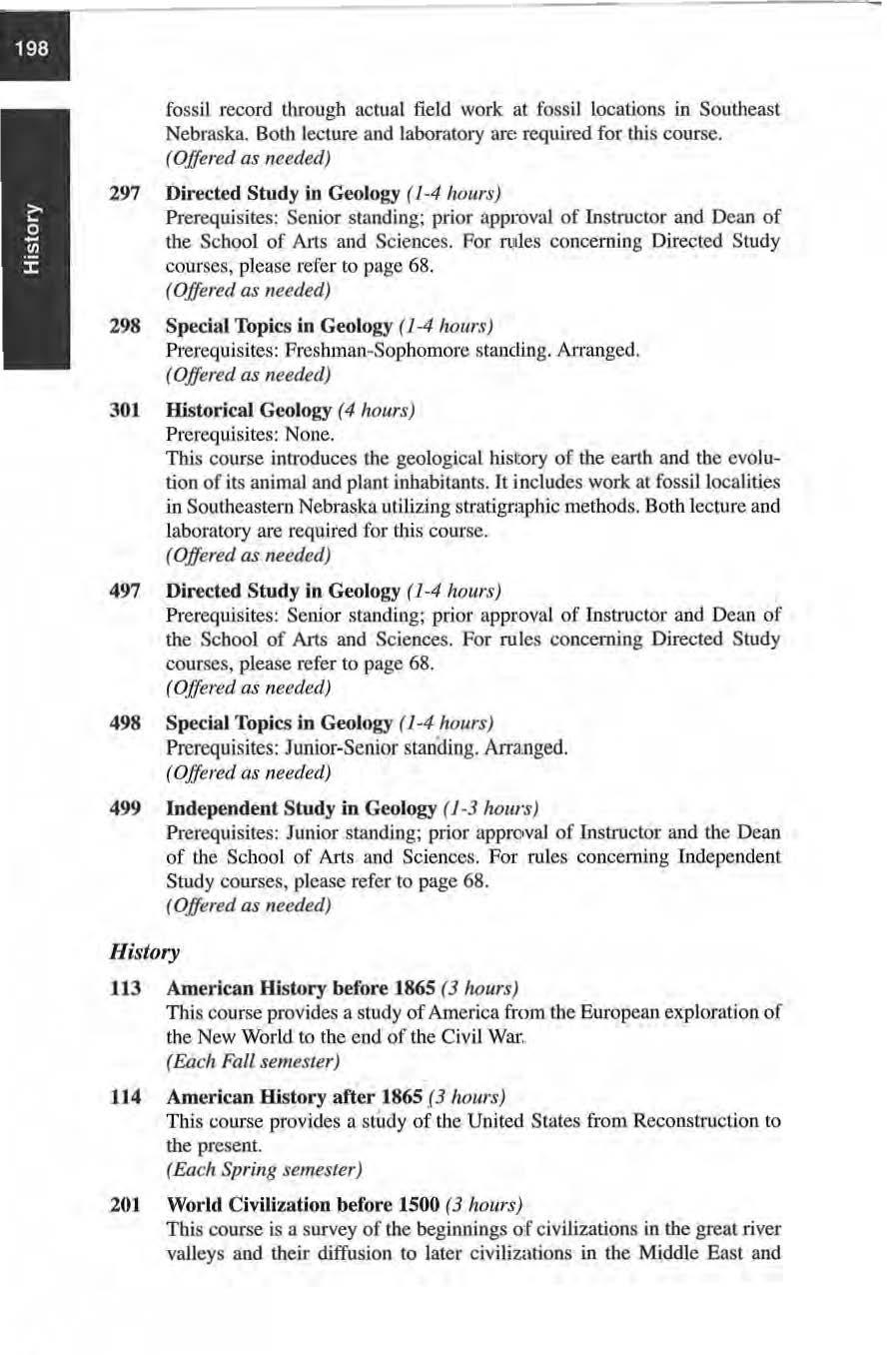
(Offe r e d as n eeded)
498 S pecia l To p ics in Geology ( 1-4 hours)
P rerequ isites: Junior-S enior stanrung. Arranged.
(Offe red as n eeded)
499 In dependen t Study in Geology ( J -3 hours)
Pr e req ui sites: Junior standing; prior ap prova l of Instructor and th e Dean o f the Schoo l of Art s a nd Sciences. For ru les concerning Independent Study co urses , please refer to page 68.
( Offered as needed)
His t ory
11 3 American Histo ry before 1865 (3 hours)
Thi s course provides a study of America from the European expl or atio n of the New World to the e nd of the Civil War.
(Each Fall semester )
1 14 Amer ican History after 1865 J3 ho urs)
T hls course pro vides a study of the Unite d S tates from Reconstruction to the present.
(Each Spring semester)
2 01 World C i viliza ti on before 1500 (3 hours)
This course is a s urvey of the beg innings of c ivil izations in the great river valleys a nd their diffusion to late r c ivili zation s in the Middl e East and
Europe. Particular attention will be given to the cultural and po l itical i nstitution s of the West that furni s h our own culturaJ hedtage.
( Each Fall semester)
202 Wo rld C i vi lization after 15 00 (3 hours)
In this course tile ri se and decline of European predominance will be analyzed with emphasis u pon the major social , politi cal, and economic ideo l ogies and institutions t h at evol veu.
( Each Spri11g semester)
297 Directed Study in H istory (J-4 hours)
Prerequi si te: Senior standing; prior approval of Jnstrucror and Dean of U1e School of Arts and Sciences. For rnles concerning Directed Study courses, please refer to page 68.

(Offered as needed)
2 98 S pecia l Topics in Hi story (1 - 4 hours)
Prerequi s ite: Freshman-Sophomore standing.
( Offered as needed)
30 1 C olonia l Am erica (3 hours)
P rerequjsites: Hi s tory 113 or instructo r 's peimiss ion
T hi s course is a study of co lo nial rivalry between the Spanish, French , Eng li sh, an d Dutch in North America ; the Revolution ; and U .S. History to 1800.
(Offered as needed)
302 T he C ivil War and R eco ns truction (3 hours )
This course is a s t udy of tbe U.S. from J 800 t hrougli 1876 describing the causes and conseque nces of the Civil War.
( Fall semester, even years)
30 3 U.S. in th e Twe nt ieth Century (3 hours)
Prerequisi te: History l 14 or instru c tor's permiss ion.
T his course is a study of the U .S. in modem times with an emphasis upon the changing social and economic theories of t he period and the internal fo rces that influenced t heir development.
(Spr ing semeste ,; odd years)
304 African Am e rica n His tory (3 hours)
T his course provides a survey of African American Life and culture in America from 1619 to the p resent.
(Fall semeste1; odd years)
3 05 A m e rican L ea dership ( 3 hours)
Prereq u isite: PSci 20 1
This course uses the wor ks of his torians and political sc ientis ts to examine leadership i n its many facets - leading organizations, fostering change, winning elec tions, creating movemen ts, and shaping publ ic opinion. Dual listed as PS c i 305.
(Spring semester. even years)
329 H is to ry of Ne braska (3 hours)
Thi s course is a s urvey of the politica l, economjc, social, and constitutional development of Nebras ka from prehistOJic times to the prese nt.
(Sp ring semest e1: eve11 years)
3 45 Mod ern E urope (3 hours)
Prerequi s ite: History 202 or in s truc tor's p ermi ssion. This course offers a co mp arative his torical a na ly sis of the ongoing process of modemizatiou in Europe. The e mphasi s is on move ments an d in s titutions s uch as Liberali s m , Con se rvatism , R oman t icism , Soc iali s m, Imperia lis m, a nd Totalitarianism from 1815 lo the prese nt.
(Sp ring semeste,; even years)
351 Modern Africa (3 h ours)
M ode m Africa prese n ts the history of sub-Saharan Africa, concentrating o n the e ve nts of the last three centuries a nd prov iding compar isons with European and American hi story.
(Each Fall semester)
411 Americ an Fronti er (3 hours)
Prerequisite: H istory 11 3 or instructor's permission.
This course is a s tudy of the importa nce of the fronti e r in Am e rica from colonia l times to the pres e nt.
( Sprin g semeste,; odd yea rs)
425 Se mina r in Ame rican His tory (3 h o urs)
Prerequisite: Senior s tandin g
This course describes the major fields and periods of American history, the co utribulions of le ading historians. and the conflicting interpretations of major iss ues in Ame rican h.is tory. This course is the capsto ne course a nd senior co mpetency for the Social S c ience major.
( Each Fall semeste r )
4 26 Am erica n C onstitution a l L aw (3 hours)
Pre requisi te: PSc i 201.
T hi s co ur se is a study of the histori cal and political co n text of co nstitutional d octrine through major decis io ns. Th e e mpha sis is on con stitutio na l growth as it relates to th e fundame ntal s t111cture of American government and t he social order. Dual-lis ted as P Sci 426.
( Each Spring semester )
461 L iterature Figh ts and R e- fig hts the C ivil War (3 ho urs)
This course is an interdisciplinary lite rature/ hi s tory co urse that examines how the Civil War and R econstruct io n and the events and issues leadin g up to and arising from them have been port rayed in America n literature. The course will i11clude a field tr ip to a batt le field s ite in Mi sso uri. D u a llis ted as Eng 461.
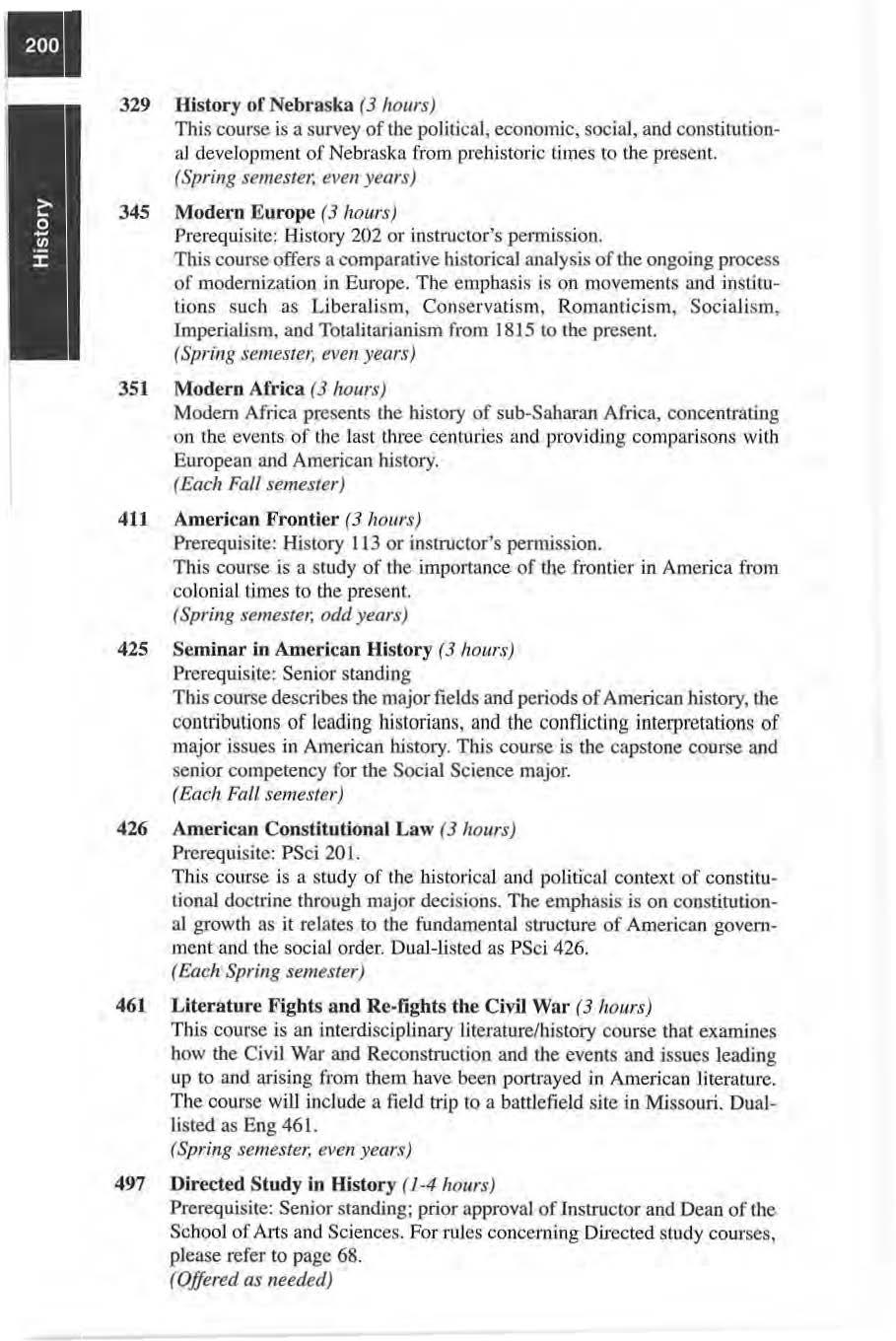
(Spring sem ester. even years)
497 Directed S tudy in History (1- 4 hours)
Prerequisi te: Senjor s ta ndin g; prior approva l o f I nstructo r and Dean of the School of A rts a nd Sciences . For ru les concerning Direc ted study co urses, please refer to page 68.
(Offered as needed)
498 Special Topics in History (l-4 hours)
Prerequisite: Junior-Seni.ot standing.
(Offered us needed)
499 Independent Study in History ( 1-3 hours)
Prereqttisite: Junior standing; prior approval of Instructor and Dean of the School of Arts and Sciences For rules concerning Independent Study courses, please refer to page 68.

(Offe red as needed)
Humanities
241 Cooperative Education bltemsbip (1-4 hours)
P rerequisite: 15 hours of completed cow-sework, minimum GPA 2.0 , permission of the Dean of the School of Arts and Sciences. The program is designed for s tudents with an intended major in tbe Humanities Department to ex.plore and/or gain work experience related to their major and anticipated career goals. Students may enroll for 1-4 hours of credit which will be graded on a credit/no credit basis. A minimum of forty hours of work experience will be required fo r every hour of credit per semester. The student will complete necessary paperwork with the employer and Dean's office. The student's work will be supervised by Dean of the School of Arts & Sciences. A final paper will be prepared at the conclusion of the intemship.
(Each semester)
441 Cooperative Education Internship (1-12 hours)
PrereqUi$lte: Approva l from the Dean of the School of Arts and Sciences. Tb.is course is designed for any student majoring in any discipline listed within the School of Arts and Sciences. A minimum of forty hours of work experience will be required for each hour of credit for which the student enrolls Tbe student will complete necessary paperwork with tbe employer and Dean ' s office. The student's work will be supervised by Dean of the School of Arts & Sciences. A final paper will be prepared at the conclus ion of the internship. If any hours from tbe internship are to be applied toward the completion of a major' s requirements, approval to do so must be obtained in writing from the Dean prior to the time of registration. Not more tbau three (3) how-s may be applied toward the completion of a major's requirements.
( Each semester)
442 Cooperative Education Internship ( 1 - 12 hours)
Prerequisite: Approval from tbe Dean of the School of Arts and Sciences. This course has tbe same requirements as Humanities 441. Students should enroll in this course to establi sh a second, and completely differelll, inte mshjp experience than has been fulfilled from the first internship completed in Humanities 441.
( Eac/z semester)
100 Introduction to Mass Communications (3 hoitrs)
This course presents the nature, function, and responsibilities of communications agencies, including newspapers, radio and television, film, and advertising; the services tbat the mass media perform for society.
(Spring semeste1; odd years)
234 Beginning Journalism ( 3 hours)
Prerequisite: Eng 10 L, ability to type.
The fundamental principles of gathering and w1iting news: practice in reporting camp us news; a nd work on the Peru Sta t e Times, the college newspaper. This cours e fulfills GeneraJ E duca ti o n requ:irem ents for English 201. Advanced Composition.
( Each Fall semester)
235 Newspaper Ed iting (3 hours)
Prerequi s ite: Joum 234 or permission of instructor.
This is a n intensive course in journalistic desk work that includes copy p reparatio n , headline writing, page l ayout; extensive work o n the Peru State Tim es desk. Credit not to exceed a total of six (6) hours.
(Each Falt sem este r)
297 Directed Study in Jou rnalism ( I -4 hours)
Prereq ui si te : Senior standing ; prior approval of Instructor and Dean of the School of Arts and Sciences. For rule s co ncern ing Directed Study colll·ses, please re fe r to p age 68.
( Offered as needed)
298 Special Topics in Journalism (J-4 hours)
Prerequisite: Freshman-Sophomore standing; Journalism 234 or permiss ion of instructor.
Tbis co urse presents the fundamental prin ciples of designing, organizing and publishing a college publica tion will be e xperienced in tbis class through work on college projects.
(Offered as needed)
40 1 Journalism Practicum ( I hour)
Prereq uisite: Journalism 234.
Prac ticum s tude nts will b e i_nvolved in th e production of tbe college newsp a per and/or college yearbook. Credit not to exceed one (l) credit hour each se mes te r. May be repeated for up to six (6) hours credit.
(Each semester)
497 Directed Study iu Journalism ( 1-4 hours)
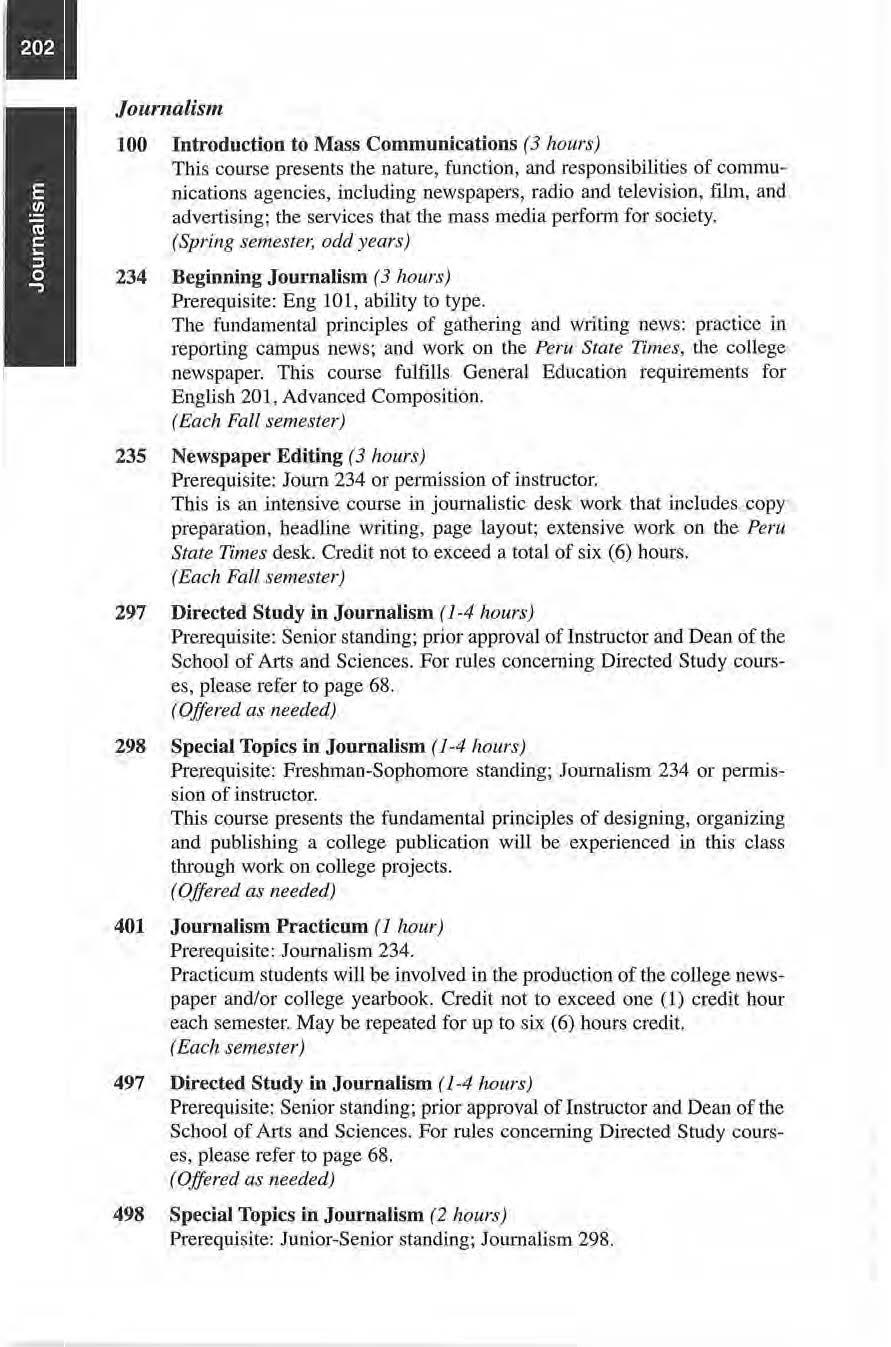
Prerequisite: Senior sta nding; prior approval of Instructor and Dean of the School of Arts and Sciences. For tules concerning Directed Study courses, please refer to page 68.
(Offe red as needed)
498 Special Topics in Journa lism (2 hours)
Prerequi s ite: Junior-S enior standing; Journalism 298.
Journalism
A continuation of Journalism 298 invo lving advanced techniques in layout and design.
(Offered as needed)
499 1ndependent Study in Journalism ( 1-4 hours)
Prerequisite: Junior standing; prior approval of Instructor and the Dean of the School of Arts and Sciences. For rules concemi ng I ndepeodent Study courses, please refer to page 68.
(Offered CJ$ needed)
Math ematics
100 Elementary Algebra (3 hours)
Thi s co urse is an introduction to the effective algebra and graphing skills which can be used to promote academic success in college (as determined by either an individual student's tlecision, by ACT sco re, or by the Computer PJacement Test) Units to be covered include real numbers, linear equat ions, polynomials, rational expressions, exponents and radicals and quadratic equations. Each topic is also applied to word problems This course earns students institutional credit but does not fulfill General Studies requirements. Math 100 is open to all students who have not successfully completed a higher level mathematics class.

(Offered each semester)
110 E leme nts of Mathematics (3 hours)
Thi$ course is designed to give the non-mathematical studen t the opp01tunity to use basic operations, succeed jn mathematical modeling and understand deductive and inductive reasoning. The general concepts covered will include sets, logic, the number system (natural numbers tbtough the reals), equations, inequalities, problem sol ving, graphs, functions and geometry.
( Each semester)
112 College Algebra (3 hours)
Prerequisite: One year of high school algebra. This course is for students who specifically need algebra io certain preprofessional programs. lt covers algebraic principles and processes and is not to be taken for credit by students who have completed Math 113 or Math 120.
(Each semester)
113 Co llege Algebra and 'l)·igonom etry (3 hours)
Pre requisite: 1\vo years of coUege preparatory mathematics or M ath 112. This course is in tended for students who plan to pursue a college program requiring a substantial amount of training in mathematics. The course will build from basic knowledge of algebra and geometry towards a so]jd understanding of the modem approach to both doing mathematics and app l ying mathematics, especially in the areas of technology and conn ections between branches of mathematics. Course topics include functions, rates of change, fractal geometry, trigonometric functions, pol ar coordi-
nates, vectors, co mplex numbers. linear tran sfomiat io n~, matrices a nd gro ups of motions. Application s from many a reas of scie nce are included.
(Each Fall sem este r )
120 Finite Mathematics (3 hou rs)
Prerequ is ite: Two years of co ll ege preparatory mathemati cs or Matb 112.
Thi s course is d es igned to g ive the non-mathemati cal s tude nt mathematical skills necessary for success in today 's world. Empha sis is placed Oil a pplications. The concepts covered w.ill include linear, quadratic. ex ponential and logar ithmic equati o ns, function s and graph s, rates of c hange.. lin ea r algebra. linear programming, seque nces and series.
( Each sem est er)
225 Calculus with Analytic Geometry I (5 hours)
Prerequis ite: Math l l 3 or eq uivalent.
Thi s co w·se includes the study of analytic geo metry, functions, limits , continuity, re lated rates, d iffe rentiation , m ax im a and minima, hig her order derivati ves, techniques of graphing, and basic integrat io n theo ry with application.
(Each Fall semester)
226 Ca lculus with Analytic Geometry TI (5 '1 0 11,rs)
Prerequ isite: Math 225 or equivalent.
Thi s cou rse includes tl1e study of th e differentiati on of logarithmic and exponential func tions, antide rivatives and th e de:fi.njte i ntegra l, integration , inverses aud related topics.
(Eac h Spring semester)
230 Foundations of Mathematical Thought (3 hoiws)
P r:erequisite: M ath 225 or equivalent. This course is a n in trodu ctio n to the theoretical aspects of mathematics. Students will e xplore axiomatic foundations of sets, functions and l ogic. Variou s method s and styles of proofs will be d.iscussed. Students will learn to write proofs of various types us ing proper miltl1e m a ti ca l style an d proper writing s tyle.
( Each Spring semester)
240 E lements of Statistics (3 ho urs)
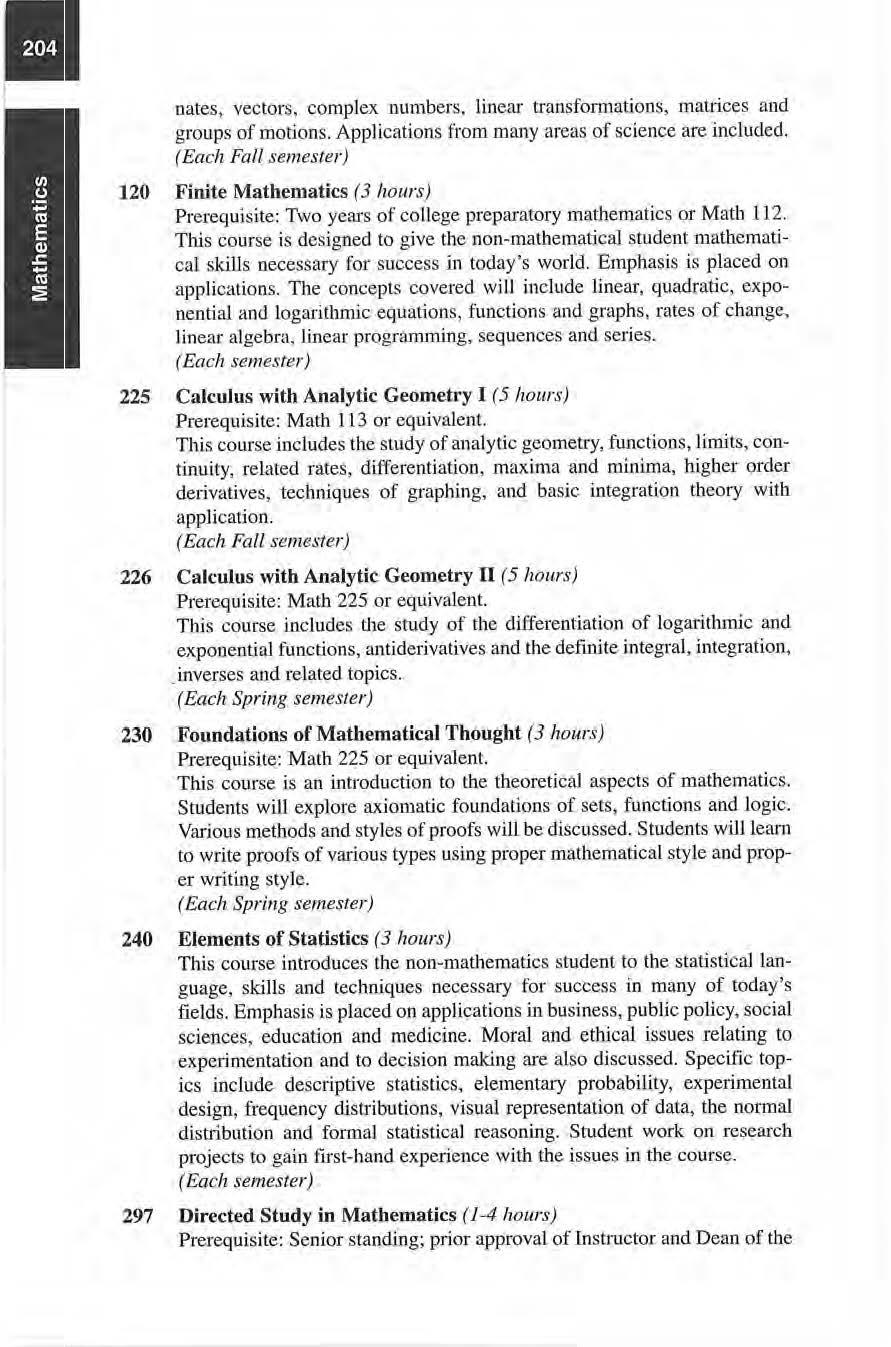
Thi s course introd uces th e non-mathematics stu dent to the statistical lang u age, skills and techniqu es necessary for su ccess i n many of today's field s. Emphasis is placed on applica tions in bus iness, p ublic policy, so cial sciences, education a ud medicine. Mo ral and ethical issu es relating to experimentation and to d ecis ion making are also di sc ussed. Specific topi cs include descriptive s tati s tics , e lementary probability, experimental design , frequency distribution s, visual representation of data, the normal distrib utio n and fo1mal s tati st ical reaso ning. SLudent work on research projects to ga in first-hand experience with the issues in the course.
( Each semester)
297 Directed Study in Mathematics ( 1 -4 h ours)
Prerequi s ite: Senior s tanding; prior approval of Ins tructor and Dean of the
School of Arti; and Sciences. For rules concerning Direc ted St11cly co urses, pl ease refer to page 68.
(Offered as needed)
298 Special Topics in Mathematics (1-4 hours)
Prerequi s it e: Fres h man-Sophomore standin g (Offered as needed)
304 Modern Geometry (3 hours)
Prerequi s ite: Math 230.
This co urse covers the modern approach to geo m e tric concepts witb e mph as is in both the axiomat ic approach to geometry and the u se of m odem technology to work w ith geometric concepts. Topics covered will include fin i te geometries, geometric transformations, synthe ti c geometry. geomet ric co ns twct ions and non-Euclidean geometries. ( Fall semesre, ; eve1 i years)
306 Modern Algebra (3 hours)
Pre requisites: Math 230.
Thi s course is a s tudy of the various a l gebraic syste ms arising in mo de rn m a th e m atical co mputat ion s Emphasis i s placed on the axiomatic approach to algebra and the u se of modern technology to work with algebraic concepts. Topi cs covered will inc lud e sets , mapp in gs and operations, relations, g roups, rings, domains, development of the r eal number sys tem and development of the complex number sys tem
(Spr ing semeste r; even years)
327 Calculus with Analytic Geometry UI (3 h ours)
Prerequisites : Math 225 and 226 o r e quivalent.
Thi s course includes the study of further technique s in integration, infinite limits, improper integrals , pol a r equations, an introduction to vector calcu lus, and an introduction lo multivariable calcu lu s.

(Fa ll semester, odd year s)
328 Differential Equations (3 hours)
Pre requis ites: Math 327 or equiv ale nt. This co urse wi ll rev iew differe ntiatio n an d integration. SolULions a nd methods for so lving first and second order ordinary differential e qua ti on will be disc ussed and applied.
(Spr ing semeste1; even. yea rs)
340 Statistics (3 hours)
A stud y of th e m e thods of s ummariz in g a nd interpreting d ata, e lementary probability, and its relation to distributions. The meanings , impo11a nce, and application of t he normal a nd binomial distri butions and the methods of random sampling, testing of hy potheses, analysis of paired data, a nd inte rpretation of sta nd a rd ized test scores are covered . Students work o n independent researc h projects to ga in firs t - hand experie nce with the issues of the course.
(Each semester)
404 Mathematical Modeling (3 !tours)
Prerequisite: Math 225 or equivalent.
This course covers a variety of mathematical topics ranging from graphs and networks to linear programming. The emphas is of the course is on modeling process used to set up and so lve problems in these topic areas. Strengths and limitations of the mathematica l modeling technique will be discussed. A11alysis and critique of liadjtional word problems will also be discussed.
( Fall semestet; even years)
418 Linear Algebra ( 3 lwurs)
Prerequisite: Math 230
This cou~se presents systems of linear equations, determinants, vector spaces, inner product spaces, linear transformations., eigenvalues and eigenvectors with moderate emph asis on proof. Applications of these concepts are also covered.
( Fat! semester. odd years)
420 Advanced Calculus (3 hours)
Prerequisite: Math 230 and Math 226. This course provides a theoretical fouodatiou for the concepts of elementary calculus. Topics include real number sys tem, topology of the real !me, limits, continuity, differentiation, integration, converge nce and uniform convergence of infinite series, and improper integrals.
( Fall semest er, odd years)
430 Discrete Structures (3 hours)
Prerequisites: Matb 113 or Math 120, and Math 230. A study of some of the mathematical concepts useful to the computer sciences including number systems, logic, truth tables, sets and relations, boolean algebra, logic circu its , vectors, matrices, determinants, graphs , dil.'ected graphs, finite machines, aud automata.
(Sprirrg semeste1; odd years)
440 Ad vanced Statistics (3 hours)
Prerequisite: Math 340
This course continues the study of methods of summarizing and interpreting data , with specia l emphasis on non-normaUy distributed stati stics, hypotheses testing, multivariate analysis and non -linear analysis of data.
(Spring setnesier, odd years)
441 Internship in Mathematics (1-I2 /wurs)

Prerequi s ite: Permission of Department Internship Coordinator. This program allows mathematics students to gain relevant work experience and establish professional relationships i n mathematics. Students may enroll for 1-12 hours of graded credit. A minimum of forty hours of work experience will be required for every hour of credit per semester. The st udent will comp lete necessary paper work with employer and the Deau of the School of Arts and Science. T he student's work will b e s upervised and evaluated by the Mathematics Internship Coordinator i n cooperation with the employer.
( Each semester)
490 Seminar in Mathematical Research (1 hour)
Prerequisite: Senior Standing in Mathematics, P e rmission. Tbjs course co11sists of a review of cun-ent research trends in mathematics. Each student will revjew current literature and select and pursue a topic of individual study. Mathematics faculty will mentor and grade th e participants in the course. This cow·se is to be taken during the student's last year of study a t Peru State College. This course i s the capstone course and senior competency for tbe Mathematics major.
(Offered as needed)
497 Directed Study in Mathematics (1-4 hours)
Prerequisite: Senior stanrung; prior approval of Instructor and Dean of the School of Arts and Sciences. For rules conceming D irected Study courses, please refer to page 68.
(
Offered a s needed)
498 Special To{)icS in Mathematics (1-4 hours)
Prerequisite: Junior-Senior standi ng.
(Offered as needed)
499 Independent Study in Mathematics ( 1-3 hours)
Prerequisite: Junior standing; prior approval Instructor and D ean of the School of Arts and Sciences. For rules concerning Independent Study in Mathematics, p lease refer to page 68.
(Offered as needed)
Military Sciellce
Program Requirements - Students enrolled in Military Science for eventual commissioning as a 2 nd Lieuten a nt must complete the Basic Course (M1L 101 , 102, 211, 212 plus MIL 100) and the Advanced Course (MIL 301 ,302,351,401,402 , plus MlL 100). Credit for aJJ or a portion of the Bas i c Course may be awarded for active or reserve military s ervice, MIL 205 , or for high school Junior ROTC.

100 Leadership Laboratory (1 hour)
Leadership Laboratory provides initial and advanced military leadership instruction in military courtesy, first aid, and practical field training exercises. Function s and responsibilities ofleadersh ip positions are developed through cadet command a11d staff positions.
(Offered as nee ded)
101 Introduction to Officer Professionalism I(/ hour)
Examination of the role of the commissioned officer in the United States anny. Discussion focuses upon officer career opportunities, role of the officer, respons ibilities of and basis for the armed forces, and sources of officer commissioning.
(Offered as needed)
102 Introduction to Officer Professionalism II (1 hour)
Continuation of MIL IO l. Further examines the role of the commiss ion ed office r in the U.S. Army. Focuses on customs of the serv ice; role of the
Army, Army Reserve, and Army National Guard; organization of the Army; branches of the Army; and leadership principles for the junior officer.
(Ojj'ered as needed)
200 Leadership Laboratory IT (0 hours)
This second-year leadership laboratory parallels MIL 211/212 classroom instruction, reinforcing concepts learned in class with practical hands-on traini ng exercises and act ivities. Training is focused on more advanced individual and collective small uail ski lls s uch as small unit leadership and tactics doctrine , land navigation, basic rifle marksmanship. drill and ceremonies. Reqwred with enrollment in MIL 211 and MIL 212. May be repeated one (1) time.
(As needed)
202 United States Military History (3 hours)
A study of the theory and practice of war beginning in co lonial times through the military engagements and peace keeping operations of the l 990's. Emphasis is on Uni ted States participation in these mi litary operations.
(Offered as needed)
203 Military Art of the Modern Army (3 /iours)
A study and application of U.S . Am1_y doctrine based on the Army's keys tone field manual FM.-100-5 Operations. Students learn doctrinal definitions and the fundamentals that are common to all Army, joint and combined Operations. Specia l emphasis is on learning the staff functions alld the introduction to the military decision-making process ,
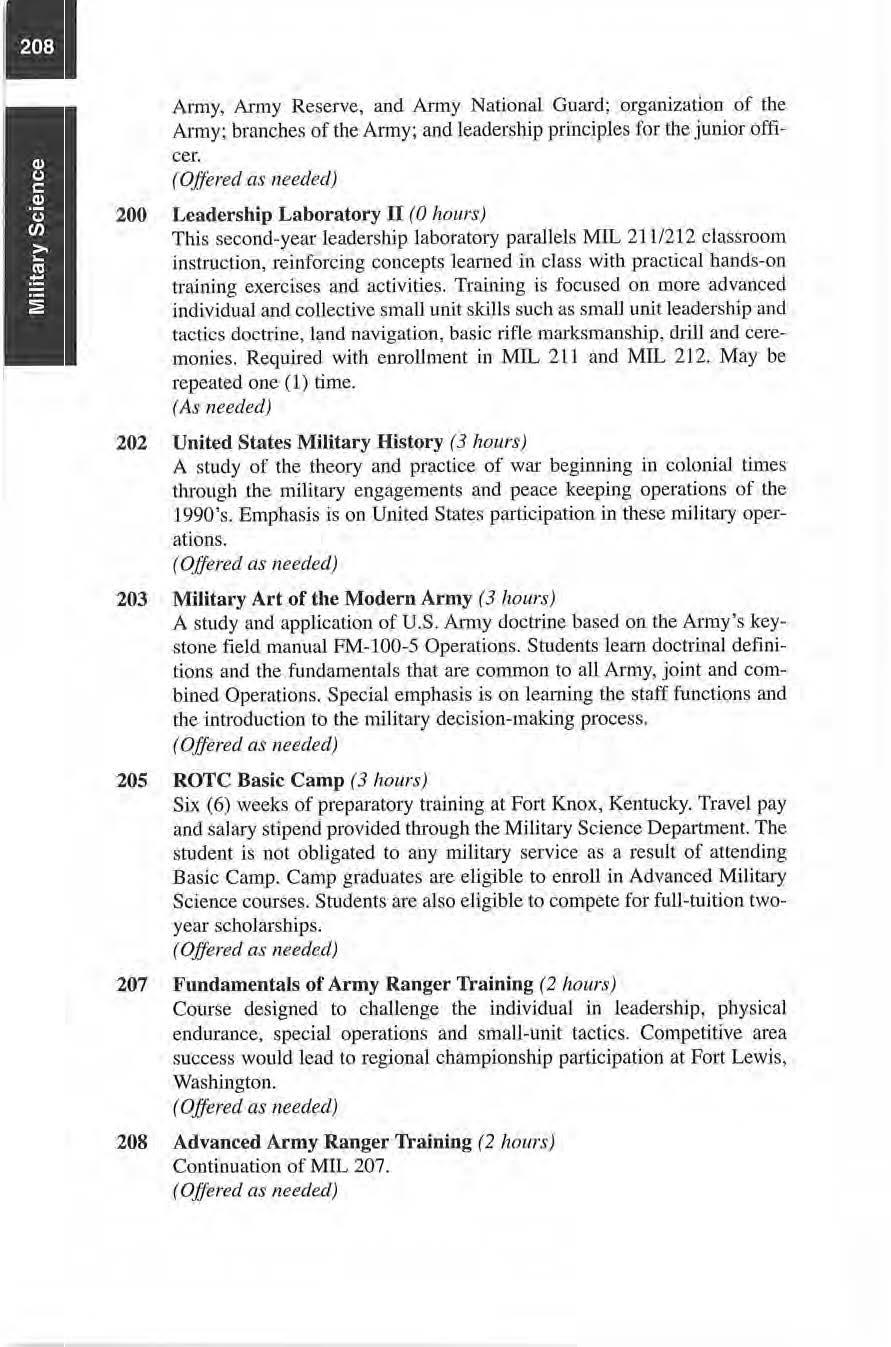
(Offered as needed)
205 ROTC Basic Camp (3 hours)
Six (6) weeks of preparatory training at Fort Knox, Kentucky. Travel pay and sa lary stipe nd provided through the Military Science Department. The student is not obligated to any military service as a resul t of auending Basic Camp. Camp grad uates are eligible to enroll in Advanced Military Scie nce courses. Students are also eligible to compete for full-tuition twoyear scholarships.
(Offered as n eeded)
207 Fundamenta ls of Army Ranger Training (2 hours)
CoUJse designed to challenge the individual in l eadership, physical end urance, special operations and small-unit tactics. Competitive area s uccess would lead to regjonal championship participation at Fort Lewis, Washington.
(Offered as needed)
208 Advanced Army Ranger Training (2 hours)
Continuation of M[L 207.
(Offered as needed)
211 Basic Individual Leadership Techniques ( 1 hour)
Prerequjsite: M1L 101, 102 or DC.
Course designed to develop student leadership and critical individual skills. Training is basic in nature and includes leadership techniques, written at1d oral comm uni cation , rifle marksmanship, fundamentals of land navigation, and physical fitness.
(Offered as needed)
212 Basic Individual Leadership Techniques ( I hour)
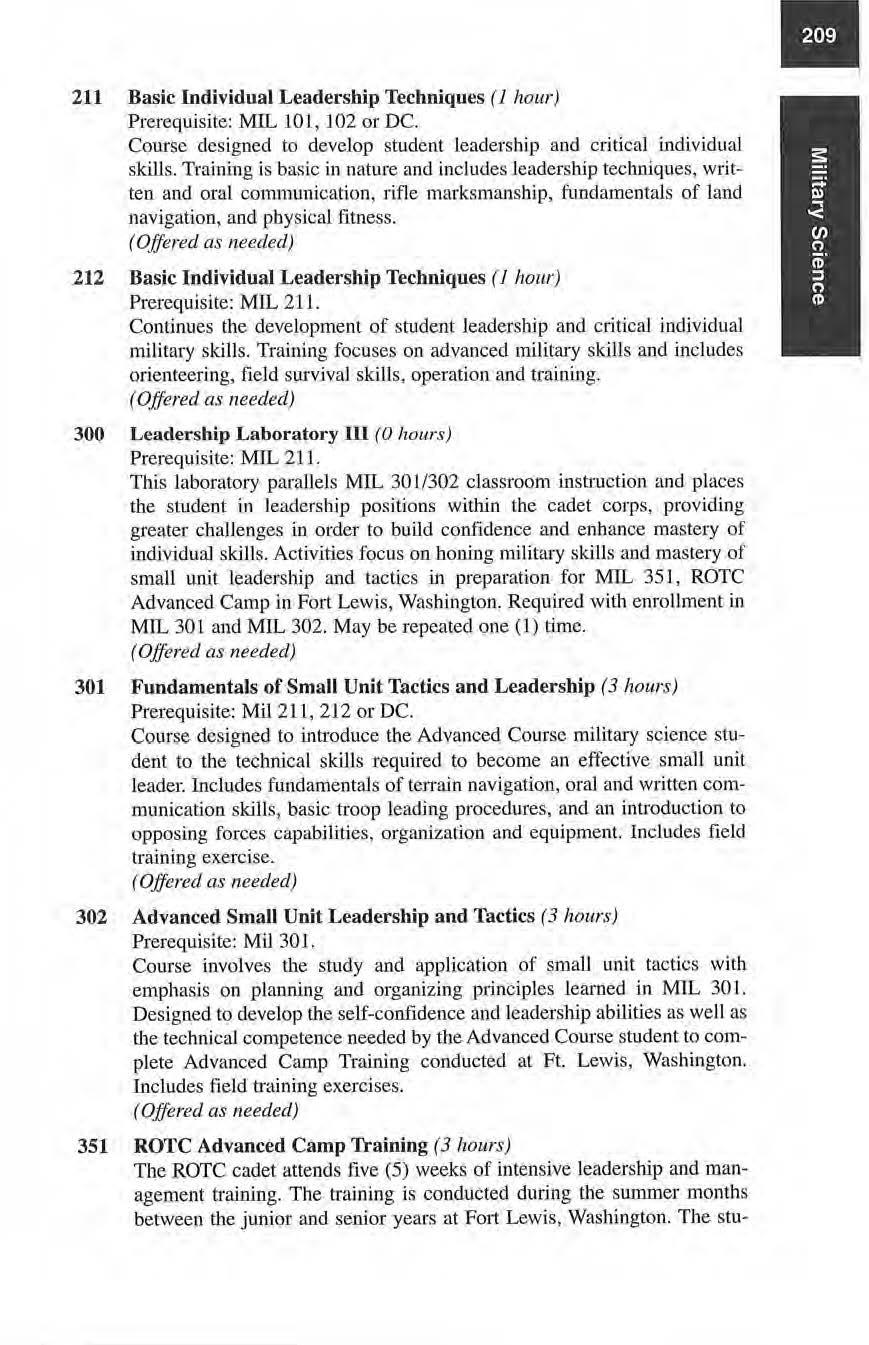
Prerequisite: MIL 211.
Continues the development of student leadership and criticaJ individual military skills. T ra ining focuses on advanced military skills a nd includes orienteering, field survival skills, operation and training.
(
Offered as needed)
300 Leadership Laboratory Ill (0 hours)
PrerequisiJe: MIL 21 J.
This laboratory parallels MJL 30 I/302 classroom instruction and places tbe student in leadership positions w ithin the cadet corps, providing greater challenges in order to build confidence and enhance mastery of individual skills. Activities focus on boning military ski ll s and mastery of small llilit leadership and tactics in preparation for MTL 3 51, ROTC Advanced Camp in Fort Lewis, Washington. Required with enro llment in MTL 30 I and MIL 302. May be repeated oue (I) time.
(Ojfere d as needed)
301 Fund amentals of Small Unit Tactics and Leadership (3 hours)
Prerequisite: Mil 211, 2 12 or DC.
Cour~e designed to introduce the Advanced Course military science st1.1dent to the technical skills requ ired to become an effective small unit leader. Includes fundamentals of tenain navigation, oral and written communication skills, basic troop leading procedures, and an introduction to opposing forces capabi liti es , organizarion and equipment. Includes field training exercise.
(Offered as needed)
302 Advanced Small Unit Leadership and Tactics (3 hours)
Prerequisite: Mil 301.
Course involves the stl.ldy and application of small unit tactics with emphasis on planning and organizing principles learned in MlL 30 I. Designed to develop the self-confidence and leadership abiliti es as wel I as the technical competence needed by the Advanced Course student to complete Advanced Camp Training conducted at Ft. L ewis, Washington. Includes field training exercises .
(Offered as needed)
351 ROTC Advanced Camp Training (3 hours)
The ROTC cadet attends five (5) weeks of intensive leadership and management training. The training is conducted during the summer months between the junior and senior years at Fort Lewis, Washington. The stu-
dent's abibty to lead his or her unit and to plan and conduct military small unit operations is thoroughly evaJuated. Travel pay and salary stipend provided through the Department of Military Science.
(Offered as needed)
400 Leadership Laboratory IV (0 hours)
Laboratory designed to a ll ow senior cadets to demonstrate mastery of leadership and tactical skills developed throughout the_ir cadet career in preparation for becoming commissioned Army officers. The cadet battalion staff plans, resources , and executes training for the MIL 100, 200 and 300 labs. Additionally charged with the leadership development and assessment of the underclassman, with focus on the junior class in preparation for Advanced Camp at Fort Lewis, Washington in the summer. Required with enrollment in MIL 401 and MIL 402. May be repeated one ( I) time.
(Ojf-ered as needed)
401 Military Professionalism and Ethics (2 hours)
Prerequisites: MIL 30 l , 302 or DC.
Seminar on contemporary problems facing junior officers dealing wi th ethics and military professionalism. Standards of conduct are explained and applied to practical simulations utilizing the ethical decision-making process.
(Offered as needed)
402 Military Management Seminar (2 hours)
Prerequisites: MIL 401.
Seminar on contemporary problems facing junior officers dealing with ethics and military professionalism. Standards of conduct are explained and applied to practical sim ul ations utilizing the ethical decision-making process.
(Offered as needed)
493 Directed Independent Readings (2 hours)
Prerequisites: DC.
Directed readings course designed to consider an issue or field of interest to society in general and the military i.n particular.

(Offered as 11eeded)
494 Directed Independent Study and Seminar I (2 hours)
Prerequisites: DC.
Directed study course designed to consider an issue or field of interest to society in general and the military in particular.
(Offered as needed)
495 Directed Independent Study and Seminar I (2 hours)
Prerequisites: DC.
Directed s tudy in Military Science to meet the individual needs of the students. Course focuses on developing practical application of special interest subjects in a student-initiated project.
(Offered as needed)
100 Recital Attendance (0 hours)
All st udents in musjc are requfred to register for this course each semester on a crerut/uo c rerut. basis for the appropriate number of semesters indica ted in their se lected program. Attendance at a nun imum of eighty percent (80%) of aH recitals each semester is required.

(Each semester)
101 College Band (1 hour)
College Band is a performance class open to aU students who have prior experience playing an instnunent and readin g m usic, or with the consen t of the lnstructor. An emphasis is placed on the s tudy and performance of traditional and contemporary conceit band literatu re in a variety of idioms and sty les. Co ncerts are performed on and off campus.
(Each semester)
102 College Choir (1 hour)
Open to all s tudents w ith the co nsent of th e director. An em phasis on th e study and performance of representative choral works of all perio ds . Three days attendance weekly.
( Each semester)
103 Jazz Ensem ble (1 /lour)
Open to all students by audition and the con sent of the instructo r. An emphasis is placed on the study and performance of music in all popular id ioms. J azz ensemble performs concerts on and off campus.
(Each semester)
104 Show Choir (1 hour)
Open to all students by audition and consent of the in structor. An emphasis is placed upon the study and performance of vocal music in all popul ar iruoms and concerts are performed on and off campus.
(Each semester)
105 Brass Ensemble (1 hour)
Op en to all students with the consen t of the .instruc to r. An emphas is is placed upon .the study and performance of brass lite rature in all the chamber music idioms and conceits are performed on and off campus.
(Offered as needed)
106 Woodwind Ensemble (1 hour)
Open to a ll students with the consent of the instrnctor. An emphasis is placed upon the study and performance of wood wind literature in alJ the chamber music idio ms and conceits are performed on a nd off the campus.
(Offered as needed)
107 Madrigal Singers (1 hour)
Open to all students with the con sen t of tbe i nstructor. An emph asis is placed upon the study and perfonnance of vocal literature i n all chamber music idioms. Concerts are performed oil and off campu s.
( Each semester)
Mu.sic
108 Percussion Ensemble (1 hour)
Open to all students with the co nsent of tbe instructor. An emphasis is placed upon the s tudy and pe1formance of percuss ion ensemble literature in a variety of chamber music idiom s. Concerts are pe rformed on and off campus.
( Offered as needed)
112 Beginning Class Piano ( I hour)
Beginning instrnction on the piano. (Each Fall semester)
113 Beginning C lass G uitar ( 1 how )
An introduction to th e basic cl10rds, melodies, note r eading , runing, and styles of performance for the beginning g uitarist. (Offered as needed)
120 Applied Music ( l hour)
Thi s course provides private music instrnction for voice, inst:rnments, or piano on the Frnshman level. May be repeated for credit. (Bach semester)
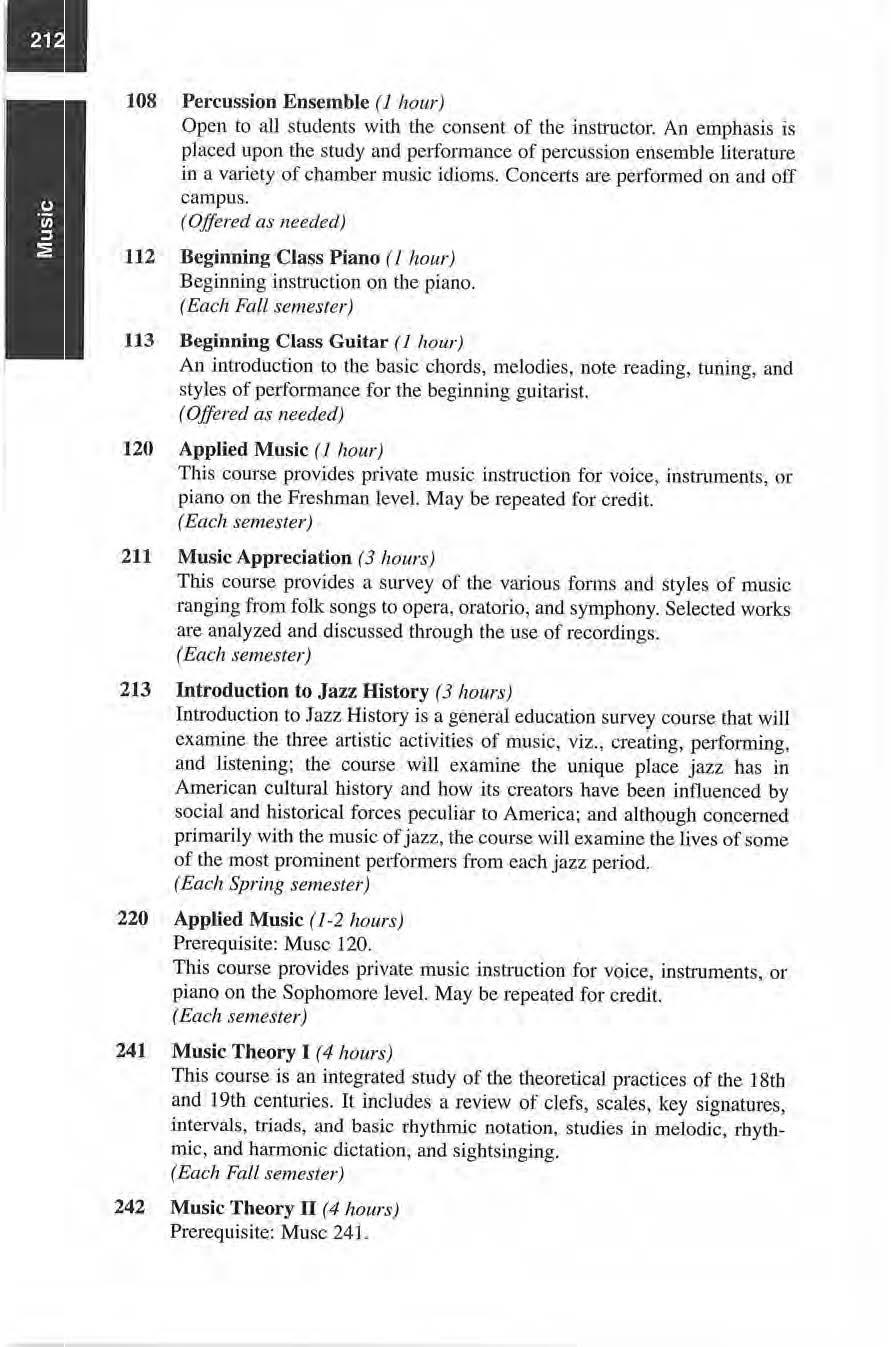
211 Music Appreciation (3 hours)
This course provides a survey of the various fom1s and styles of mus ic ranging from folk songs to opera, matorio, and symphony. Selected works are analyzed and discussed tbroug,h the use of recordings.
(Each semesrer)
213 Introduction to Jazz History (3 how·s)
Introduction to Jazz History is a general education survey course that will examine the three artistic activit ies of music, viz , c..Teating, performing , and listening; the course wi ll examine the unique place jazz has in American cu ltural history and how its creators have been influenced by social and hi s tOJical forces peculiar to America; and alth ough concerned primarily with tl1e music ofjazz, the course will examine the lives of some of the mos t promine nt pe 1formers from each jazz period.
(Each Spring semester)
220 Applied Music (1-2 hours)
Prerequisite: Muse 120.
This course provides private music instruction for voice, instruments, or piano on the Sophomore level. May be repeated for credit.
( Eac h semester)
241 Music Theory I (4 hours)
This course is an integrated study of tl1e tl1eoreticaJ practices of the 18th and 19th centuries. It includes a review of clefs, scales, key sig natures, intervals, triads , <1nd bas ic rhythmic 11otalion, studies in melodic, rhythmic , a nd harmonic dictation , and sightsinging.
(Each Fall semester)
242 Music Theory II (4 hours)
Prerequisite: Muse 24L
This course is an integrated study of the theoretical practices of the 18th and 19th centuries. It includes the study of secondary triads , six-four chords, dominant and supertonic sevenths, elementary modulation, s tudies in melodic, rhythmic and harmonic dictation , and sightsinging.
(Each Spring semester)
251 Elementary Music Methods (3 hours)
This cou rse is a s tudy of modern teaching techniques for c hildren's music literat11re.
( Offered each seme.~ter)
297 Directed Study in Music ( 1-4 /tours)
Prerequisite: Senior standing; prior approval of Instructor and Dean of the School of Arts and Sciences. For rules concerning Directed Study courses, please refer to page 68.

(OJ/ered as needed)
298 Special Topics in Music (1-4 hours )
Prerequisite: Freshman-Sophomore standing. (Offered as needed)
310 World Musics (3 hours)
World Musics is an introduction to ethnomusicol ogy in which the studen t will leam to experience and understand music in the coote,>."1. of human life.. Students will experien ce and analyze the musics of Africa, Native America, Black Ameri ca, Asia, the Near East, the Pacific, and Eastern Europe. This course will also provid e the s tudent the tool s with which to discover the meanings of music in the life of aay society.
(Each Fall semester)
320 Applied Music {1-2 hours)
Prerequisite: Muse 220. This course provides private music instruction for voice , instruments, or piano on the Junior leve l. May be repeated for credit. (Each semester)
321 C horal Techniques (2 hours)
This co urse provides a study of vocal materials and vocaJ conducting as presented in secondary sc ho ols.
(Spring semeste1; odd years)
322 Band Techniques (2 how·s)
Prerequisite; Sophomore stand in g.
This course is an introductory study of Organizationa l skills and pedagogical techniques for the concert band , jazz band, elementaiy band, middle school band, and marching band. (Spring semeste1; even years)
340 Junior Recital ( 1 hour)
f>rereq11isite: Muse 320.
Thi s course includes selection , preparation, direction and rehearsal of a recital of music for voice, instruments, or piano cuhninating in a thirty-
minute performance, Students must be concurrently enrnlled for applied music during the semester they are enrolled for the junior recital.
( Each semester)
341 Music Theory lJI (3 hours)

Prerequisite: Muse 242.
This course is an integrated study of the theoretical practices of the 18th and t 9th centuries. It includes a detailed study of the chromatic halJllonic practices of the 19th century, a survey of the 20th century theoretical practices, studies in melodic, rhythmic, and haimonic dictation, and sight singing.
(Fall se111este1; even years)
342 Arranging (3 hours)
Prerequisite: Muse 242.
This is a course in practical scoring and mrnnging for band and orchestra and voices.
(Spring semesre,; even years)
351 Brass Methods (2 hours)
This course is a study of brass instruments and brass pedagogical techniques with actual playing experience.
(Spring semeste1; odd years)
352 Woodw ind Methods (2 hours)
This course is a study of woodwind instruments and woodwind pedagogical techniques with actual playing experience.
(Fall semester, odd years)
361 String Methods (2 hours)
This course is a study of stringed instruments, including the guitar, and stringed pedagogical techniques with actual playing experience. (Offered as needed)
362 Percuss ion Methods (2 hours)
This course is a study of percussion instrnments and percussion pedagogical techniques with actual playing experience. (Fall semeste1; even years)
363 Music Business (3 hours)
Music Business is an introduction to music as it functions i11 the business world in the United States, focusing on tl1e music industry and related fields. Basic theories and processes will be stressed, histories and musical trends of particular fields will be explored, various contracts and co ntract law and the role of the music industry attorney, and an examination of the ways in which music is encountered in our daily lives will be taken into account.
(Spring semester, odd years)
420 Applied Music ( 1-2 hou,-s)
Prerequisite: Muse 320.
This course provides private music instruction for voice. instruments. or piano on the Senior level. Ma.y be repeated for c redit. (Each semester)
440 Senior Recital (1 hour)
Prerequisite: Muse 320 or higher.
This course includes selection, preparation, direction, and rehearsal of a recital of music for voice, instruments, or piano culminating in a sixtyminute performance. Students must be concurrently enrolled for applied music during the semester they are enrolled for the senior recital. This course is the capstone course and senior competency for the Music major. (Each semester )
441 Music History l (Antiquity to 1750) (3 hours)
This course is a study of the development of music from antiquity through the end of the Baroque period with stylistic analysis of musical examples. (Fall semeste1; odd years)
442 Music History II (1750 - present) (3 hours)
This course is a study of the deve lopment of music from the beginning of the Classical period to the present with stylistic analysis of musical examples.
(Spring semester, even years)
462 Conducting ( 3 hours)
Pre.requisite: Muse 242
T he knowledge of baton techniques , reading and interpreting a musical score, and the presentation of techniques of rehearsing instrumental organizations are stressed in this course.
(Fall semeste1; odd years)
497 Di.rected Study in Music (1-4 hours)
Prerequisite: Senior standing; prior approval of Instructor and Dean of the Schoo l of Arts and Sciences. For rules concerning Directed Study courses, please refer to page 68.
( Offered as needed)
498 Special Topics in Music ( 1-4 hours)
Prerequisite: Ju n1or-Senior standing, (Offered as needed)
499 Independent Study in Music ( 1-3 hours)
Prerequisite: Junior standing; prior approval of Instro.ctor and Dean of the Sc hool of Arts and Sciences. For rules concerning Independent Study courses, please refer to page 68.

(Offered as needed)
Philosophy
201 Introduction to Philosophy (3 hours)
This course is an introduction to the main fields in philosophy, with special attention to theory of knowledge, ethics, political theory, and aesthetics. Major thinkers in tb e Western tradition will be discussed. (Each Fall semester)
Physical Education
Physical Education activities courses require two hours of attendance. In fulfill111eut of the General Studies requirements, each student \vill be required to enroll in PB 10 I Wellness. It. will be followed by an additional credit in physical education - an activity course or PE 215 First Aid.
101 Wellness (2 hours)
This course is designed to acquaint students with the philosophy, knowledge., and techniques nece ssary to write a personali zed Ji fe-tirne fitness a nd wellness program. T he course will include both theory and practical application in the study of phys ica l fitness and wellness.
(Each semester)
104 Golf and Tennis-Maintenance (1 hour)
Prere quisite: PE 101.
Th is cou rse is designed to interest the s tude nt in go lf and tennis. Emphasis w ill be p laced on fundamental tecbniques of the game, ru.les of the game a n d etiquette.
(Each semester)
106 Racquet S ports-Ma intenance ( 1 hour)
Prerequisite: PE IO l
T hi s course is de signed to introduce students to a variety ofracq uel sports. Emphasis will be placed on fundamental skills, rules and tcclmjgues of play.
(Eath Fall semester)
112 'BegianiJ1 g Swimming-Developmental ( I hour)
Prerequi s ite: PE IOL
Thi s cou rse ts designed to introduce t he sn.1denr to the basic fundamental s of swimming. Emphasis will be placed on development of basic strokes and rhythm ic breathing.
( Each Spring semester)
116 Volleyball and Basketball-Maintena nce ( I hour)
Prerequisite : PE IO I .
This course jg desig ned to introduce the student to the basic fundamentals of volleyball and baske tball. Emphasis wjJI be placed on skills, rul es and s trateg ies of tb e games.
(Each Fall semester)
117 Strength Tra inin g- Developmental ( I hour)
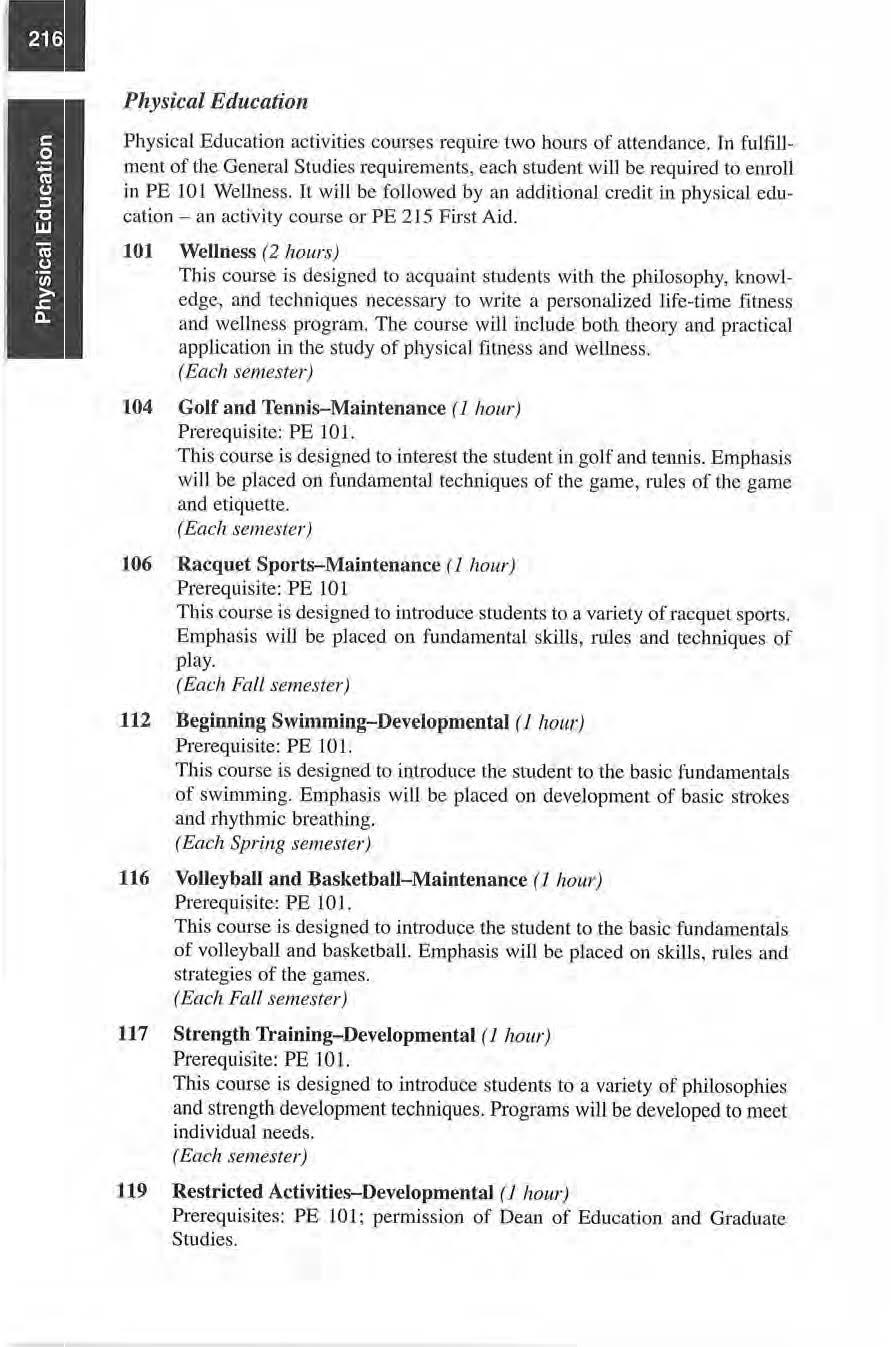
Prereq ujsite: PE IO 1.
This course is designed to introduce s tudents to a variety of philosophies and strength development techniques. Programs will be developed to meet indi vid ual needs.
(Each sem ester)
119 Restricted Act ivities-Development.a] ( 1 hour)
Prerequis ites: PE 101; per mission of Dean of Educatio n and Graduate Sniclies.
This course is designed to meet the n eeds of students who are unable, because of medical reasons, to take general physical education activity courses. The class is conducted on an ind ivjdual basis in order to meet the personul fitness needs of the student.
(Offered as needed)
121 Aerob ic Dance-Developmental ( 1 //(lur)
Prerequisite: PE IO I.
This course is designed to introduce the snident to a variety of aerobic conditioning activities and techniques. Emphasis is on modes of n·aining, aerobic capacity, fitness development and program design to meet individual needs and demands.
(Each Spring semester)
122 Wa lkin g, Jogging and Conditionin g-Developmental (1 hour)
Prerequisite: PB 101.
This course is designed to introduce the student to aerobic conditioning, Emphasis is on modes of 1raining, aerobic capacity, fitnes s development and program de s ign to meet individual needs and abilities.
( Each semester)
123 Aquatic Fitness-Developmental ( 1 hour)
Prerequisite: PE 10 I.
This course is designed to introduce the student to a variety of aquatic fitness activities and techniques. Emphasis is on aerobi c capacity, fitness development and program design to meet individual needs and abilities.
( Each Fall semester)
131 Folk, S qu are and S ocial Dance-Maintenance ( 1 hour)
Prerequisite: PE 101.
Thi s course is designed to introduce students to dance as a recreational and physical education activity. Dance elemen ts and social responsibilities associated with dancing will be discu ssed. Various social. folk, and square dance patterns wi11 be introduced.
(Each Spring semester)
190 Varsity Sports ( 1 hour)
Requires successful participation in a varsity sport. (A maximum of four (4) hours may be applied to the degree requireme nts.) Th.i s course does not fulfill the General Studies PE acti vities requirement.
(Each semester)
201 P rinciples of Physical Educatio n (3 hours)
Students wilt s t udy the development of the field of Physical Ed ucation and its relationship to modem educational theory including the hi s tory and principles of Ph ysical Education as furnished by the basic sciences and the philosophies of Physical Education.
( Each Fall semester)
208 Theory of Football and Wrest1ing (3 hours)
This course examines the theory and methodology of coaching footbalJ a nd wrestling. Emphas is is placed ou offensive and defensive sty les of
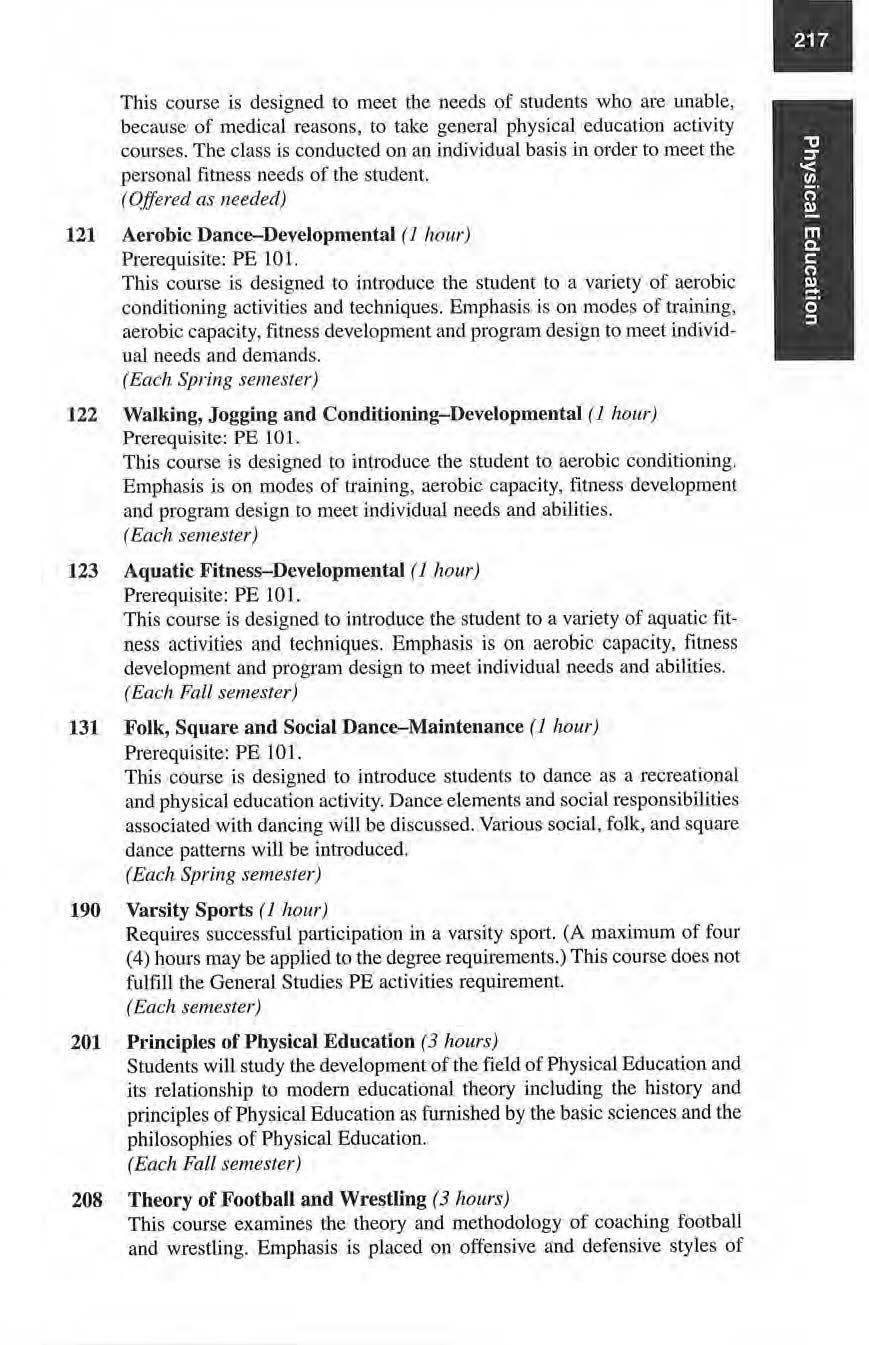
footbaJ I and all basic techniques of wresding, organization of praclice pe1iods, scheduJing, budgeting, pre- and post-game or match management, and rules interpretation.
(Eac h Fall semester)
209 T heo ry of Basketball and Ba se ball (3 hours)
This course examines tbe theory and methodology of coaching basketba ll and baseball. En1phasis is pl aced on offensive and defensive styles of basketball a nd baseball, o rganization of practice periods, scheduli ng. budgeting, pre- and post-game management, and rules interpretation.
(Ea ch Fall semester)
210 Theory of Track and Field and C ross Country (3 hours)
This course examines the theory and metbodology of coaching aJ I the standard track and field events and cross country. E mphasis is placed on orga nization of practice periods, scheduling, budgeting, management of aerobic capacity, fitness development and program design to mee t individual needs and abiliti es.
(Each Spring semester)
211 Theory of Women 's Basketball and Softball (3 hours)
T bi s course examines the t heory an d methodology of coaching women 's basketball and softbal l. The course will address gende r differences in select ion of ac ti vities in basketball and softba ll. The psychologicaJ app roach to the game and spec ial concerns a coach must be aware of wh en dealing with fema le atJ1letes will also be addressed. This course \¥ill address the d ifferences between women's and men 's sports. Emphasis is placed o n organization of practice periods, schedu ling, budgeting, p reand post-game management and rules interpretation.
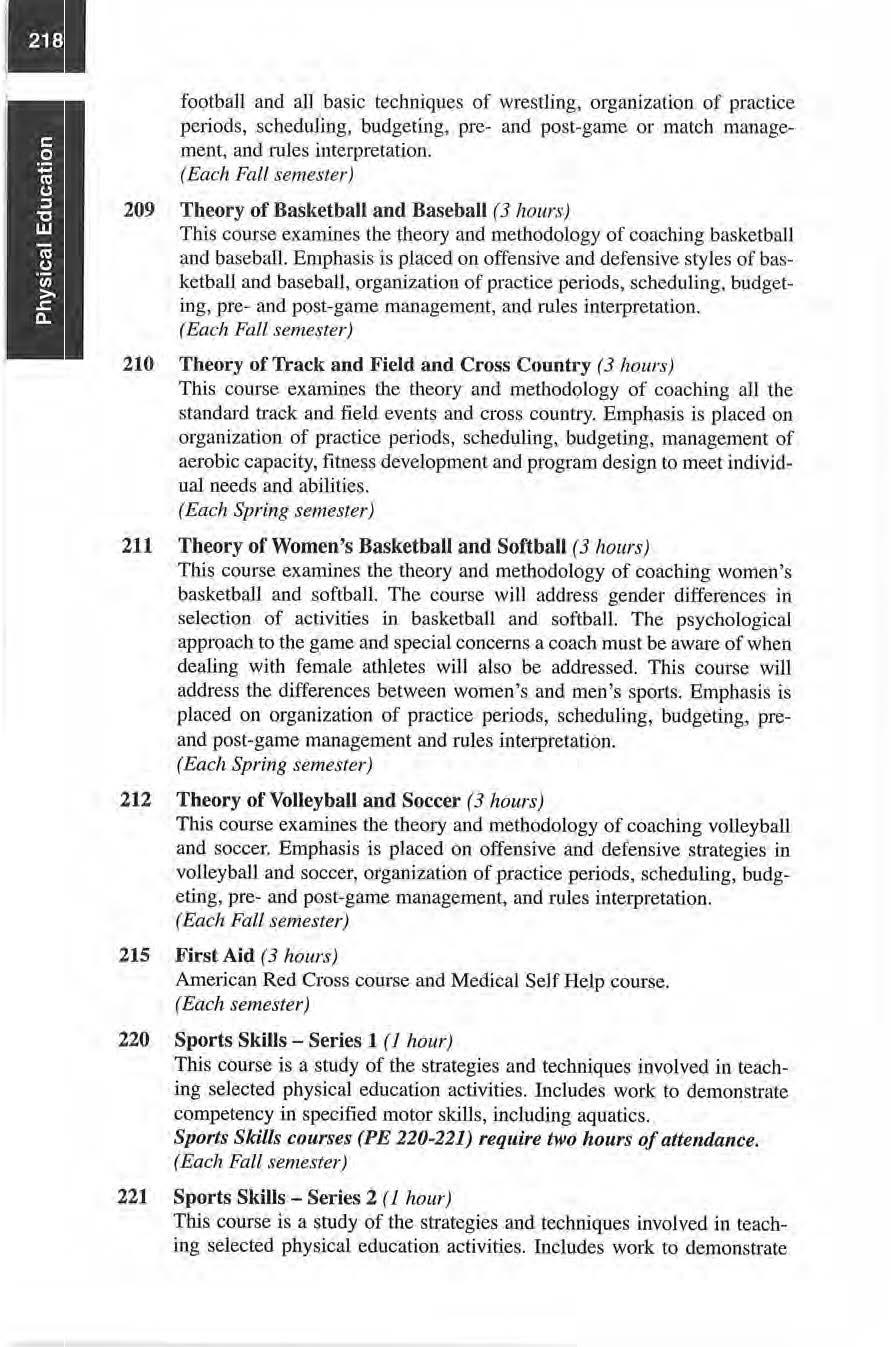
(Ea ch Spring semesrer)
2 12 Theory of Volley ball and Soccer (3 hours)
This course examines the theory and methodology of coachin g volleyball an d soccer. Empbasis is placed o n offensive and defensive strategies in volleyball and soccer, organization o f practice periods, scheduling, budgeting, pre- and post-game management, and rules in terpretation.
(Each Fall semester)
215 F irst Aid (3 hours)
American Red Cross course and Medical Self H elp course.
(Each semester)
220 Sp orts Skills - Series J ( 1 hour)
Th.is course is a study of the strategies a nd techniq ues involved in teaching selected physical education activi ties lncludes work to demonstrat e competency in specified motor skills, i ncluding aquatics.
S ports Skills courses (PE 220-221) reqllire two hours of attendance.
(Each Fall semester)
221 Sports Skills - Series 2 ( 1 hour)
This course is a study of the strateg ies and techniques invo l ved in teaching selected physical education ac tivities In cludes work to demonstrate
competency in specified motor ski lls, including gymnas tics Sporls Skills courses (PE 220-221) require two hours of attendance. (Each Spring semester)
230 l{hythms and Dance for Elementary School (3 hours)
This course is an exploration of the concepts and rel ation s hips of movement, broadening the concept of self-education through the experience of basic rhythms and dance acti vities at the elem entary l evel.
(Each Spring semester )
241 I nte-.:nship in Sport Management (3 hours)
Prerequisite: Permission of D ean of Education a nd Graduate Studies. Thi s cou rse is designed for a.oy stude nt majoring in the Sport Management option and is to be taken early in the formal college program. Th e learning s ituation will be organized an d s upe rv ised by the School of Educati on and G raduate Studies s taff. A minimum of forty hours of work experience will be required for each hour of credit (m inim um total of 120 hours).

(Offered as needed)
297 Directed Study in Physical Education ( 1-4 hours)
Prerequisite: Senior standing; prior approval of Ins tru ct or and Dean of the Sc hoo l of Education. For ruJes concerni ng Directed Study course s, please refer to page 68 . ( Offered as needed)
298 Special Topics in Pllysical Education (1 -4 hours)
Prerequisite: Freshman-Sophomore s tanding. (Qffered as needed)
300 Prevention and Care of Sports Injuries (3 hours)
Prerequisite: PE 3 12
This co urse exa mines th e nature and ca use of injuries re lated to the physical activities of childre n and a th1etes.
(Each Fall se m ester)
309 Organization, Administration and Curriculum of Physical EducationSecondary (3 lw urs)
This course examines the genera l princip1es of admini s tra tive tecJ1niques and responsibilities in Ph ys ical Educatio n (Each Spring semester)
312 Muscular Anatomy and Kinesiology (3 hours)
Thi s course will provide the student with an understanding of the ana tomi cal and mechanical fundamen tals of human motion. The stu dent wiJI l earn a sy stematic approach to tbe a n aly s i s of human motion and will be ab le to apply a n a to mi cal and mechanical a na lysis t o the l earning and improvement of a broad s pectrum of movement activities.
( Each Fall sem ester)
313 Elementary/Middle School Phys ical Education (3 hours)
Pre requ i s ite: Junior standin g or permission of th e Dean of Education and Graduate Studies.
This course examines U1e se lectio n and organization of materials and tecbniques of instruction focusi ng 011 human movement a nd its signifi c,mce in the development of the lives of chi ldren K-8.
(Each Fall semester)
360 Phys iology of Exercise (3 hours)
This course will provide students with a working understanclfog of how exercise affects the different. systems of U1e body.
(Eaclz Spring semester)
415 Motor Learning (3 hours)
T hi s course will provide an introduction to tho field of motor learn in g , The focus of the course is on skill acquisition with primary co ns iderat ion given to the teaming process, tJ1e cognitive and motor processes underlying the learnin g of skills and factors that influence skill leamiog.
( Each Fall semester)
416 Tests and Measurements in Physical Education (3 hours)
The purpose of this co urse is to provide an understand in g of esse ntial statistical tec hniqu es, relevant measurement theo ry, and available tests to enable the s tudent to develop val id methods of eval uation .
(Each Spring sem esfer)
417 Adaptive Physical Education (3 hours )
Prerequisites: Psych 250 and PE 3 12. This course provides a study of philosophy, procedures and practices in adapted physical education.
(Each Spring semeste r )
441 Internship in Sport Management (3 hours)
Prerequisites: Permiss ion of Dea n of Educati on and Graduate S tudies; Completion of PE 241 .
This course is desi gned fo r any student majoring in the sport manage ment op ti on and is to be ta ken n ear the completion of U1e foni1a l co llege program. Sn,dents may e nro ll for this course npon the approval of the D e an of Education a nd Graduate Studies. The Learning situation will be organi zed and supervised by the D ean of the School of Education and Graduate Studies. A minimum of forty hours of work experience wi ll be requi red for each hour of c redit (minimum total of 120 hours).
(Offe red as needed)
433 Seminar in Physical Education (2 hours)
Thi s course is designed to expl ore issues and challenges i n physical educa ti on. As a capstm)e course, it should be take n near the completion of all Phys ical Education coursework.
(Each Spring semester)
497 Directed Study in Phys ical E ducation ( I -4 hours)
Prereq ui site: Senio r s tandin g Pri or approval oflnstnictor and Dean of the School of Educ ation an d Graduate Studies. For rules concerning Directed Study courses, please refer to page 68.
( Offe r ed ns needed)
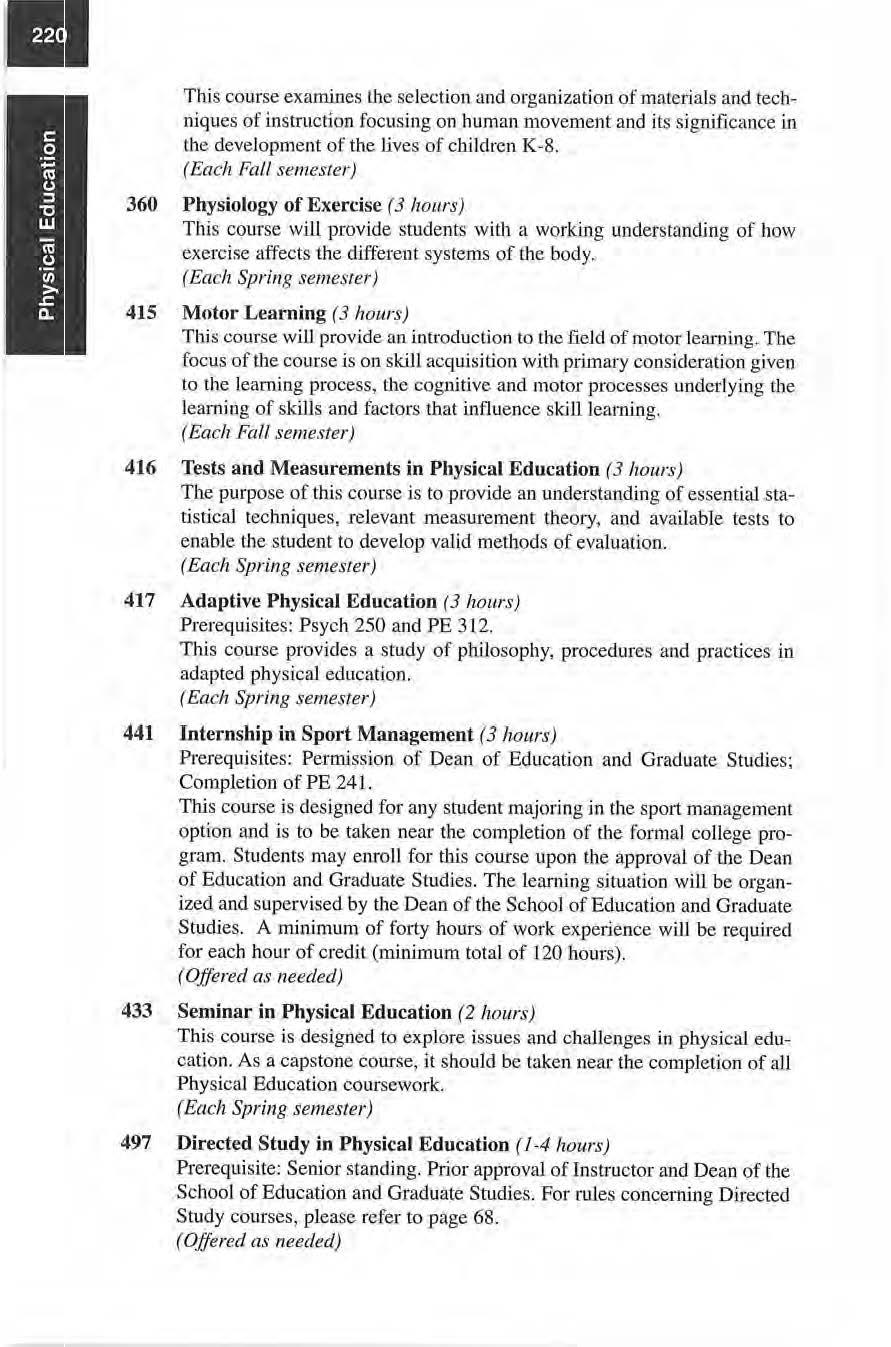
498 S p ecial Topics in Physical Education ( 1-4 hours)
Prerequisite: Junior s tanding.
(Offered as nee ded)
499 lndependeut Study in Physical Education ( 1-3 houn1)
Prerequisite: Junior standing ; prior approval of Instructor and the Dean of the School of Education. F o r rules concerning Independent Study courses , please refer to page 68.
(Each semester)
Physics
100 lnltoductory Physics (5 hours )
Thi s is a condensed comprehensive survey of Newtonian and Modern Phy sics. Topi cal focus includes energy, mechanics, heat, electricity, sound, Jjgbt, atomic structure and re lali vjt)'. Th is class inc ludes required lectures , recit ation , and laboratory components
(Fall semeste,; even yeaJ·s as n eeded)
201 General Physics (5 hours)
Prerequisites: Math 130 or equivalent. The topics of mechanics , sound, and heat are included i.n this mathematically-based physics course. This class includes required lectures, recitation, and laboratory components.
(Fall semeste,; odd years as needed)
202 General Physics (5 fwur.v)
Prerequisites: Physics 201 or permission. The topics of li ght, electricity, and magnetism are included in this mathematically-based physics class. This clas s includes re quire d lectures, recitation, and laboratory compo nents.
(Spring semeste1; even years as Meded)
297 Directed Study in Physics ( 1-4 hours)
Prerequisites: Senior standing; prior approval of the Instructor and Dean of the School of Alts and Sciences. For rules concerning Directed Study courses, please refer to page 68.

( Offered as nee ded)
298 Special Topics in Phys ics ( 1-4 fwurs)
Prerequisites: Freshman-Sophomore standing Arranged. (Offered as needed)
306 Astronomy (3 hours)
A basic COl,.IISe dealing with a study of the heavenly bodies, the solar system , and the universe. Tele scopic observation is a part of thi s course. Three (3) hours lecture, telescopic observation ananged. Cross-listed as ESci 306.
(Spring semesre,; odd yea rs as needed)
495 Concepts in Modern Physics (4 ho urs)
Prerequisites: Jun ior-Seruor Stand ing and Permission of Instructor
Tbjs course provides a conceptual ,introduction to 20th Century physics including relativity, quantum mechanics, atomic, nuclear, and particulate physics. This class includes requi.red lectures , recitation, and laboratory components.
(Offered as needed)
497 Directed Study in Physics ( 1~4 hours)
Prerequisites: Senior standing; prior approval of Instructor and Dean of the School of Arts and Sciences. For rules concerning Di.rected Study courses, please refer to page 68.
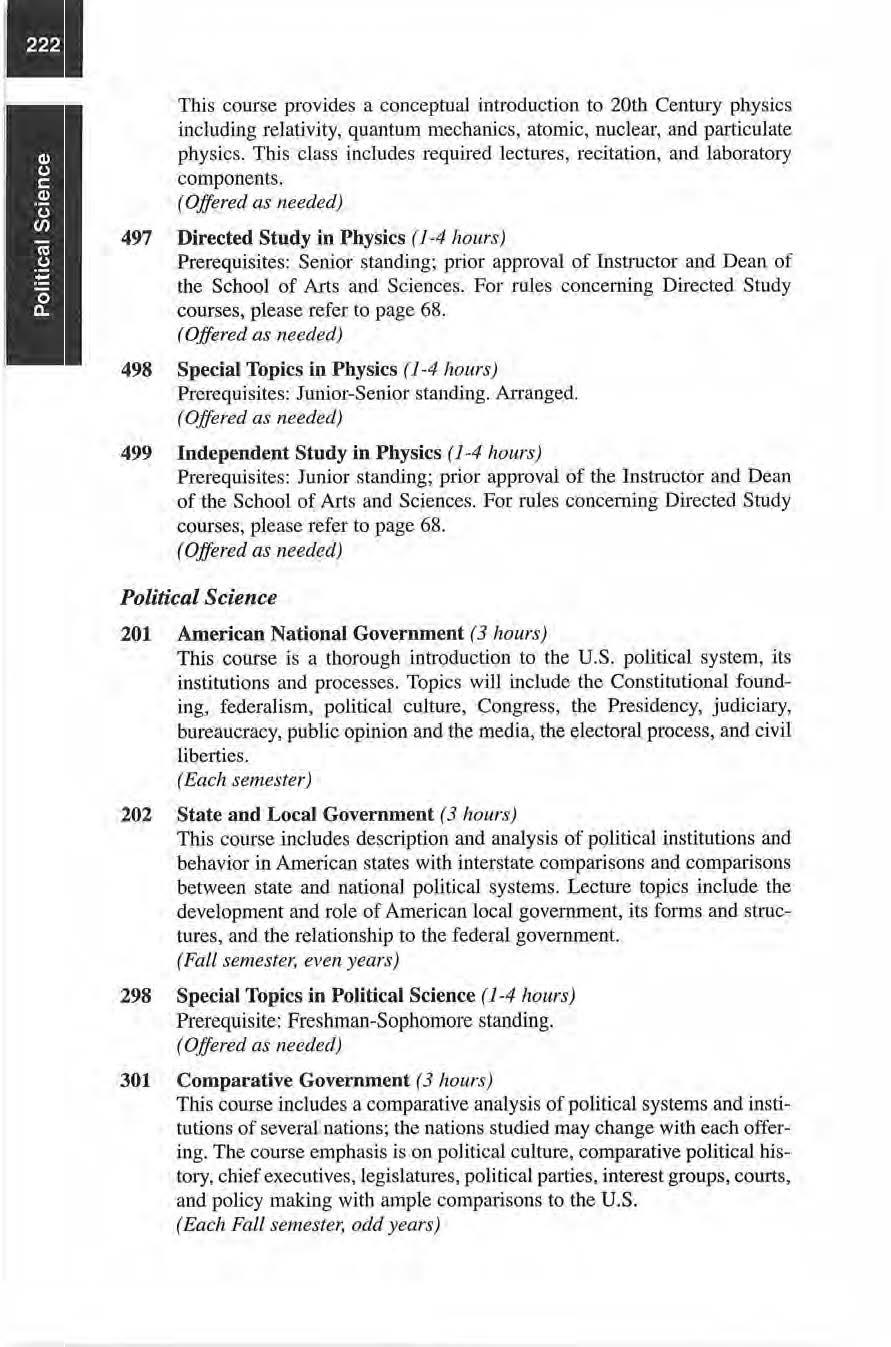
( Offered as needed)
498 Special Topics in Physics (1-4 hours)
Prerequ isites: JUllior-Senior standing. Arranged.
(Offered as needed)
499 Independent Study in Physics (1-4 hours)
Prerequisites: Junior standing; prior approval of the Instructor and Dem, of the School of Arts and Scie nces For rules concerning Directed Study courses, please refer to page 68.
( Offered as needed)
Political Science
201 American Natioi1al Government (3 hours)
Thi s course is a thorough introduction to the U.S. political system, its institutions and processes. Topics wilJ include the Constitutional founding, federalism , political culture, Congress, the Presidency, judiciary, boreaucracy, public opinion and the media, the electoral process, and civil liberties.
( Each semester)
202 State and Local Government (3 hours)
Thjs course includes description and analysis of political institutions a,nd behavior in American states with interstate comparisons and comparisons between state and national political systems. Lectw·e topics jnclude the development and role of American local government, i ts forms and structures, and the relationship to the federal government.
(Fall semester, even years)
298 Special Topics in Political Science (1-4 hours)
Prerequisite: Freshman-Sophomore standing.
(Offered as needed)
301 Comparative Government (3 hours)
Th.is course includes a comparative analysis of political systems and institutions of several nations; the nat ions studied may change with each offering. The course emphasis is on political culture, comparative political history, chief executives, legislatures, pol iti ca l parties, interes t groups, courts, and policy making with ample comparisons to the U.S.
(Each Fall semester. odd years)
305 American Leadership (3 hours)
Prerequisite: PSci 201.
This course uses the works of historians and political scientists to examine leadership in its many facets - leading mganizations, fostering change, winning elections, cteating movements , and shaping public opinion. Dual listed as Hist 305.
(Spring semester, eve/l years)
426 American Constitutional Law (3 hours)
Prerequisite: PSci 201.
A study of the historical and political context of constitutional doctrine through major decisions. The emphasis is on constitutional growth as it relates to the fundamental structure of Ame1ican government and the socia.1 order. Dual-listed as Hist 426.
( Each Spring semest er)
468 Public Administration (3 hours)
Prerequisite: PSci 201.
Students will study a range of topics involved in the administration of public agencies. Topics will include the history of America's public service, the development of intergovernmental relations, bureaucracies, public personnel , budgeting, decision making, evaluation procedures, and regulatory administration . This class will encourage students to investigate tbe role of public administration in the past and today, as well as to conjecture tbe possibilities for the future. Dual-listed as Bus 468.
(Spring semester, odd years)
497 Directed Study in Political Science (1-4 hours)
Prerequisite: Senior stancllng; prior approval of Instructor and Dean of the School of Arts and Sciences. For rules concerning Directed Study courses, please refer to page 68.
(Offered as needed)
498 Special Topics in Political Science ( 1-4 hours)
Prerequisite: Junior-Senior standing.
(Offered as needed)
499 Independent Study in Political Science (1 -3 hours)
Prereqwsite: Junior standing; prior a pproval of lnstructor and Dean of the School of Arts and Sciences. For rules concernin g independent Study couJses, please refer to page 68.
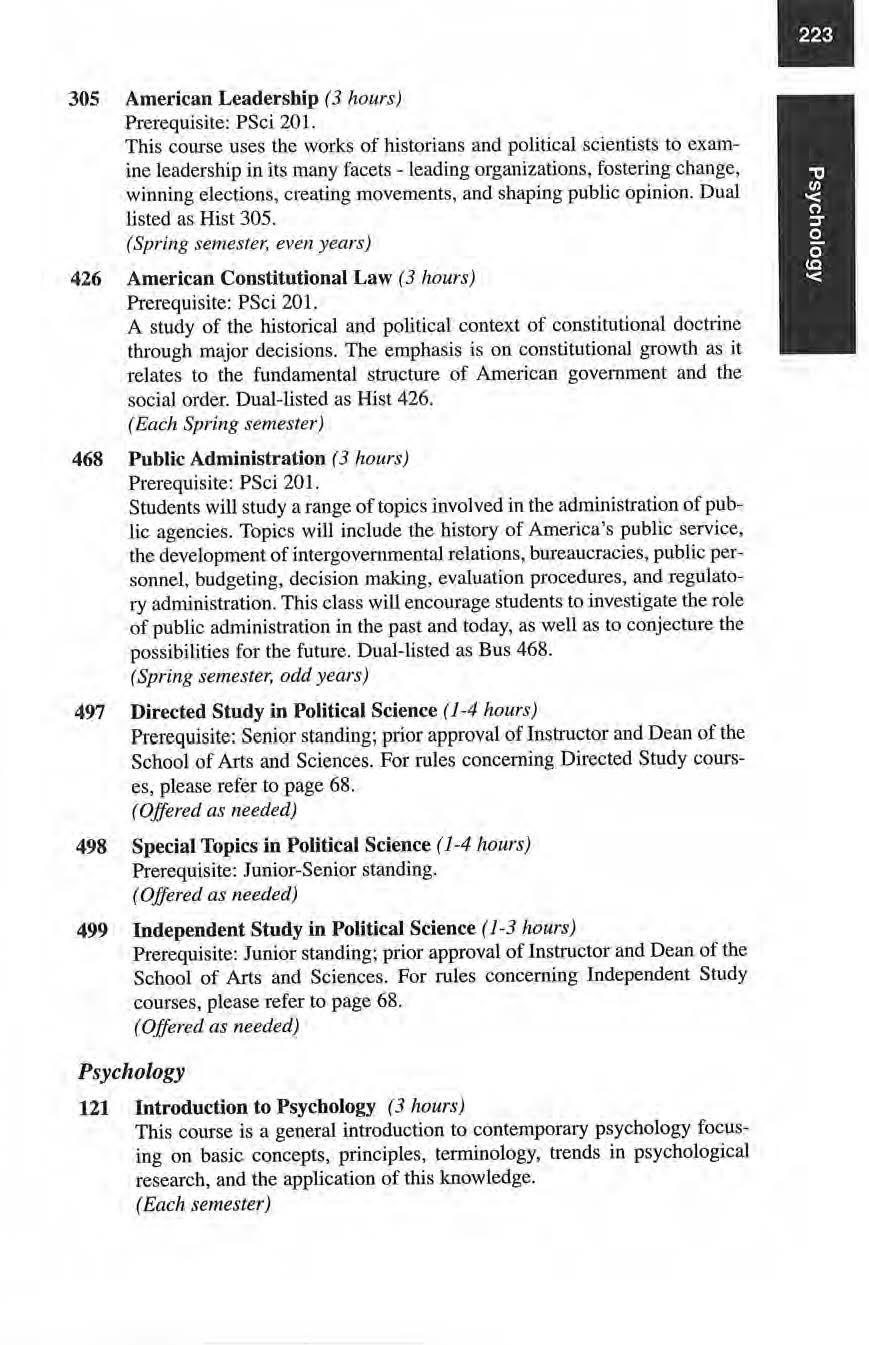
(Offered as needed)
Psychology
121 Introduction to Psychology (3 hours)
This course is a general introduction to contemporary psychology focu sing on basic concepts, principles, terminology, trends in psychological research, a nd the application of this knowledge.
(Each semester)
250 Human Growth a nd Development (3 hours)
This course will focus on the physical , cognitive, social and emotional aspects of growth from biith through old age. In addition , factors thought to influence this growth will also be examined. CADAC certificatioin approved December 2001 through December 2005
(Each semester)
255 Diversity Issues (3 hours)
Students will study issues of sensitivity to biases, perpetuation of biases in the use of langLLage, critical examination of text books and other printed material for biases, cont1ibutions to our culture which have accompanied changes in demographic composition of the nation and leadership issues related to multi-cultural issues and appreciation of diversity of values, cu stoms and styles, and personal interaction. This course meets the multicultural and gender issues requirements for Teacher Education students.
( Eac h sem e ster)
297 Dii·ected Study in Psycho logy ( /-4 hours)
Prerequisite: Senior standing; prior approval of Instructor and Dean of the School of Professional Studies. For rules con cerning Directed Study courses, please refer to page 68.

(Offered as needed)
298 Special Top ics in Psychology (1-3 hours)
Prerequisite: Freshman-Sophomore standing.
(Offered as needed)
305 Socia l Psychology (3 hours)
Prerequisite: Psyc 121 or Soc 201.
This course will focus on the effects of culture, soc iety, social institutions, and social Jeaming on the soc.ial attitudes and behavior of individuals wit hin groups.
(Spring semeste1; odd years)
310 Psycho logy of Spor ts and Physica l Activities (3 hours)
Prerequisite: Psyc 121,.
This course examines the place of psychology in physical education and sports. I t includes personality, attention and arousal, anxiety and intervention , theories of m.otivation, and social psychology of sports aggression, audience effects, team cohesion, and leadership in sports.
( Fall semester; e ven y ears)
320 Psychol ogy o f Learning (3 hours)
Prerequis ite: Psyc 121.
This course will provide students with a broad, eclectic coverage of the field of learning and memory by addressing the wide range of issues and problems within the field from stimulus-response to cognjtive psychology. (Spring semeste1; odd years)
330 R esearch Meth ods ( 3 hours)
Prerequisite: Psyc J21.
This is an introductory course that concentrates on research methods and
designs and s tati stical ana lysis procedures used in research projects. This course demonstrates how resem·ch methods arc utilized in the soc ia l and behavioral science. This course is cross-listed as CJ us 330.
(Each Fall semester)
345 Psychology of Personality (3 hours)
This course will focus on the process of personality growth and adjustment. Throu g h an examination of elected theoretical systems, different interpretations of this process will be presented. Non-Western and multicultural co nsiderations of personality theory are included.
(Falt semester, odd years)
380 Adolescent Psyc hology (3 hours)
Prerequisite: Psyc L21.
This course examines the cogniti ve and psycho-social aspects of adolescence. lt examines age appropriate developmental events, ban-icrs to progress, and development facilitation.
(Fall semcste1: odd years)
4 10 Experimental Psychology (3 hours)
Prerequjsi te: Psyc 121 ; P syc 330.
Thls course is designed to assist stud e nts in the com prehe nsion and use of experimental methods and literan1re. Research exercises are provided to illustrate c~mrse co ntent.
(Spring semester; even years)
431 Psychological Tests a nd Measurements (3 hours)
Prerequisites: Psyc J 21.
The course will focus on the issues and problems surrou ndin g psychological testing. Topics to be ruscussed include reliability, valiruty, cons true,. tion, administrntion, norms, and interpretation as well as a survey of current psychological tests.
(Fall semesre,; eve11 years)
441 Psychology Internship ( 1-12 hours)
Prerequisites: Junior-Senior standing; permission of U1e Dean of the School of Pro fess ional Sturues.
This program is designed fo r s tud ents with a major in Psychology to gain work experience related to the ir major and career goals. Students may enroll for 1-12 hours of g raded credit. A minjmum of forty (40) hours of wo rk experience will be required for every hour of crcdit per semester. The s l udent will co mp1 e tc necessary paperwork wit h the employer and the Schoo l of Professional Studjcs office. Th e student's work will be supervised and monitored by the Dean of the School of Professional Studies. (Each semester)
442 Psychology Internship (1- 12 hours)

Prerequisite: Junjor-Senior s taorung; permission of the Dean of the School of Professional Studies.
This program is designed for .students wit h a major in Psychology to complete a second internship. Students may enroll for 1-12 hours of graded
credit. A minimum of forty (40) hours of work experien ce will be required for every hour of c redit per semester. Tbe student will complete necessary paperwork with the employer and the Schoo l of Profe ss ional Studies office, The stu dent's work will b e supervised and moni tored by the D ean of t h e School of Professional Studies. A fina l paper w ill be prepared at the co nclus ion of the internship. (Each semester)
450 Abnormal Psychology (3 hours)
Prerequisites: P syc 121, Psyc 250 and junior stan ding .
Focusing on personality d isorders, sc hizop hrenia and bipolar disorder, tlii s course will deal exten sively with c tme nt DSM categories of a bnorm al psychology.
(Sp ring semest er, odd years)
460 Psychology of At-Risk Youth and Corrections (3 hours)
Prerequisite: Junjor s tandin g, co rrections employment or in struc tor peruiission .
This cour se app Lies cultural influe nces on behavior, multicultural considerations, cou nseling and treatment tec hniques, educat ion and therapy skills appropriate fo r at-ri sk youth, and under-ed uc ated correctional populations. The co urse incorporates learnin g s tyles, alcohol and dru g use/abuse, domes tic violence education and preventi o.n , cooperative teaming, conflict management, and social literacy and leadership skill s developed in acti ve learnin g
(Spring semester; even years)
465 Psychology Practicum (3 h o urs)
Prerequisites: Psyc 460, Ma th 240 or Mat h 340.
As a companion course of Psychology 460, this course is a supervised field-based skill development expe1ience
(E ach semester)
495 Seminar in Psychology (3 hours)
Prerequ isite : Senior s tanding; Psyc hology major.
This senior-level seminar is meant to b e a capstone ex peri ence, utilizing indivi dual r esearch , drawing upon intern or pract icum ex periences, in corporat in g cooperative learning for group assignments in whjch each student will demonstrate mas tery of verbal and written expression of major, broad psychologi cal concepts, concerns, and perspectives, and their iu corporation into real world experiences, needs, and oppo,tunities.
(Each Spr i n g semester)
497 Directed Study in Psyc hology (1 -4 hours)
Prerequi s ite: Senior standing; prior approval of Instructor and D ean of the School of Profe ss ion al Studies. For rul es co ncerning Direc ted Study courses, please refer to page 68.

(Offered as needed)
498 Special Topics in Psychology (1-4 hours)
Prerequi site: Junior-Senior s tanding.
( Offered as n eeded)
499 Independent Study in Psychology ( 1-3 hours)
Prerequis ite: Junior standing; prior approval of Instructor and Dean of the School of Professional Studies. For mles con cerning Independent Study courses, please refer to page 68.
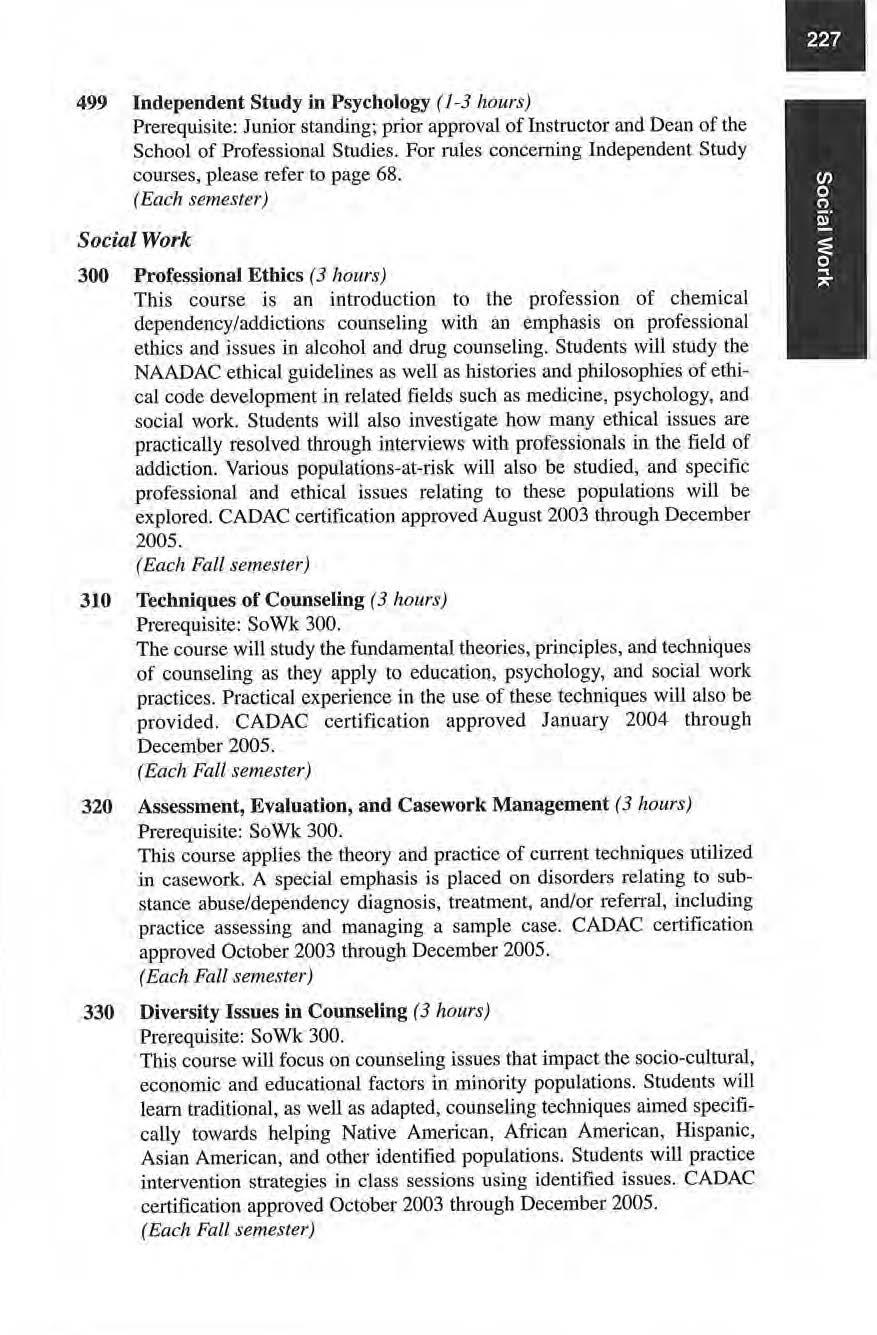
(Each semester)
Social Work
300 Professional Ethics (3 hours)
This cou rse is an introduction to the profession of chemical depe ndency/ad dictions counseling with an emphasis on profes s ional ethics and issues in alcohol and drug counseling. Students will study the NAADAC ethical guidelines as welJ as histories and philosophies of ethical code development in related fields such as medicine, psychology, and social work. Students will a lso investigate how many ethical issues are practically resolved through interview s with professionals in the field of addiction. Various populations-at-risk will also be s tudied, and specific profe ssional and ethical issues relating to these populations will be explo red. CADAC certification approved August 2003 through December 2005.
( Each Fall semester)
310 Techniques of Counseling (3 hours)
Prerequisite: SoWk 300.
The course will study the fundamental theories, principles, and techniques of counseling as they apply to education , psychology, and social work practices. Practi cal experience in th e use of these techniques will a lso be provided. CA DAC certification approved January 2004 through December 2005.
(Each Fall semester)
320 Assessment, Evaluation, and Casework Management (3 hours)
Prerequisite: So Wk 300.
Thi s course applies the theory and practice of current techniques utilized in casework. A special emphasis is placed on disorders relating to s ubstance abuse/dependency diagnosis, treatment, and/or refenal, including practice assessing and managing a sample case. CADAC certification approved October 2003 through D ecember 2005
( Each Fall semester)
330 Diversity Issues in Counseling (3 hours)
Prerequisi te: SoWk 300.
This course will focus on coun seling issues that impact the socio-cultural , economic and educatio nal factors in minority populations. Students will learn tradit ional, as well as adapted, counseling techniques aimed specifically towards helping Native American , African American, Hispanic, Asian American, and other identified populations, Students will prac tice intervention strategies in class sessions using identified issues. CADAC certification approved October 2003 through D ecember 2005.
(Each Fall semester)
390 Group Work (3 hours)
Prerequisite: SoWk 300.
Group Work focuses on the theories and dynamics of group counselli1g. The course wiU focus on th e deve lopment of s pecific skills that can enhance group leadership s uch as: understanding the group process, g roup development , bow to ser, up groHp s, choosing group members, the different types of group s, and the leadership skills needed for group work. Students will facilitate an experie ntial group process to practice the ski ll s CADAC certification approved December 2001 thmugh December 2005, ( Each Spring semester)
410 Addictfons (3 hours)
P rerequisite: SoWk 300,
Thi s cow·se surveys the physiological, psychological , and soc iologicaJ aspects of a variety of populations that are at-ri sk for addictions, co mpuls ions , and dependence , patticu]arly focusing on alcohol and drugs. The etiological, behavioral , culturnl, and demographic conditions and belief systems of vario us addictions are ex plored. CADAC certification approved January 2004 through December 2005.
(Each Spring semester)
420 Medical and Treatment Issues in Chemical Dependency (3 hours )
Prerequi site : SoWk 300.
This t:ourse studies medical and trnatment trend s and iss ues associated with alcohol/drug disorders , ph ysi cal and mental di sorders, generational u se/a buse/dependence on alcohol and/or drugs, drug treatment theories , practices and programs, and unique or special population s. CADAC certification approved October 2003 through December 2005.
(Eac h Spring semester)
430 Field Work Practicum (J-12 hours)
Prerequi site: Nine (9) hours of Social Work and permission of th e P sychology/Criminal Justice Head.

Thi s course will provide an opportunity for supervised training in social work that includ es a formal and s ys tematic process that focuses on skill development a nd integration of knowledge Thi s exper ience will be at a site approved by the College.
( Offe red as needed)
497 Directed Study in Social Work ( 1•4 hours )
.Prere quisite : Senior s tanding; prior approval of ln s trut:tor and Dean of the School of Profe ss ion al S tudies. For r ules concerning Directed Study courses, please refer to page 68.
(Offered as needed)
498 Specia l Topics in Social Wo rk (l -4 h ours)
Prerequi site: Junior-Senior s tanding.
(Offered as needed)
499 Independent Study in Social Work {l-3 hours )
Prerequis ites: Junior standing; ptior approval of Ins tructor and D ean of the
School of Professional Studies. Por rules concerning Independent Study courses, please refor to page 68.
(Offered as needed)
Sociology
201 Principles of Sociology ( 3 hours )
This course is an introductory study of group and social dynamics, cultures, social problems, social instinitions, intergroup relationships, and the impact of socia l policies .
(Each semester)
300 Contempol'ary Social Problems (3 lwiu·s)
Th.is course is an introduction to the causes, treatment. and prevention of selected social problem s with particu lar emphasis on the problems of conflict and inequality.
(0,[fered as n eeded)
340 The Family (3 hours)
Prerequisite: Soc 201.
This course provides an exam.i oation of the role of the family in conte mporary society with an emphasi s on t:he factors influencing the fam.ily structure, functions, and roles, and their impli ca tions for both the community and individuals at varying stages of the family life cycle.
(Offered as needed)
497 Directed Study in Sociology (J-4 hours)
Prerequisite: Senior s tandin g; prior approval of lnstructor aod Dean of th e School of Arts and Sciences . For rules concerning Directe.d St.udy COUl'S• es , please refer to page 68.
498 Special Topics in Sociology (1-4 hours)
Prerequisite: Junior-Senior standing
(Offered as needed)
499 Independent Study in Sociology (1-3 hours)
Prerequisite: Junior standing; prior approval of instructor and the D ean of the School of Arts and Sciences. For rules concerning Independent Study courses, please refer to page 68.

(0.ffe red as needed)
Spanish
101 Introductory Spanish (S hours)
This is an introductory cou rse in Spanish deaJjng with grammar, reading, writing, and conversing.
(Each Fall semester as needed)
102 Spanish 11 (5 hours)
Prerequisite: Span 101.
Spanish Il emphasizes increased proficiency in conversational situations , grammar, reading, and writing.
(Each Spring semester as needed)
Special Education
200 lntroduc.tion to Special Education (3 hours)
Thi s course is designed to provide a historical , political and sociological survey of the areas of exceptiona li ly in the field of special education. The course will identify significant changes which have occurred in the education of exceptional populations and provide an introductory experience concernjng U1e various disability groupings.
(Each semester)
290 Education of Learners with Mental Disabilities (2 hours)
Prerequisi te: SpEd 200 or concurrent enrollment. This cow·se is designed to provide a sw:vey of the characteristics, abilities, needs, the psychological and environmental and cultural factors which contribute to retardation.
(Each Fall semester)
297 Directed Study in Special Education (1-4 hours)
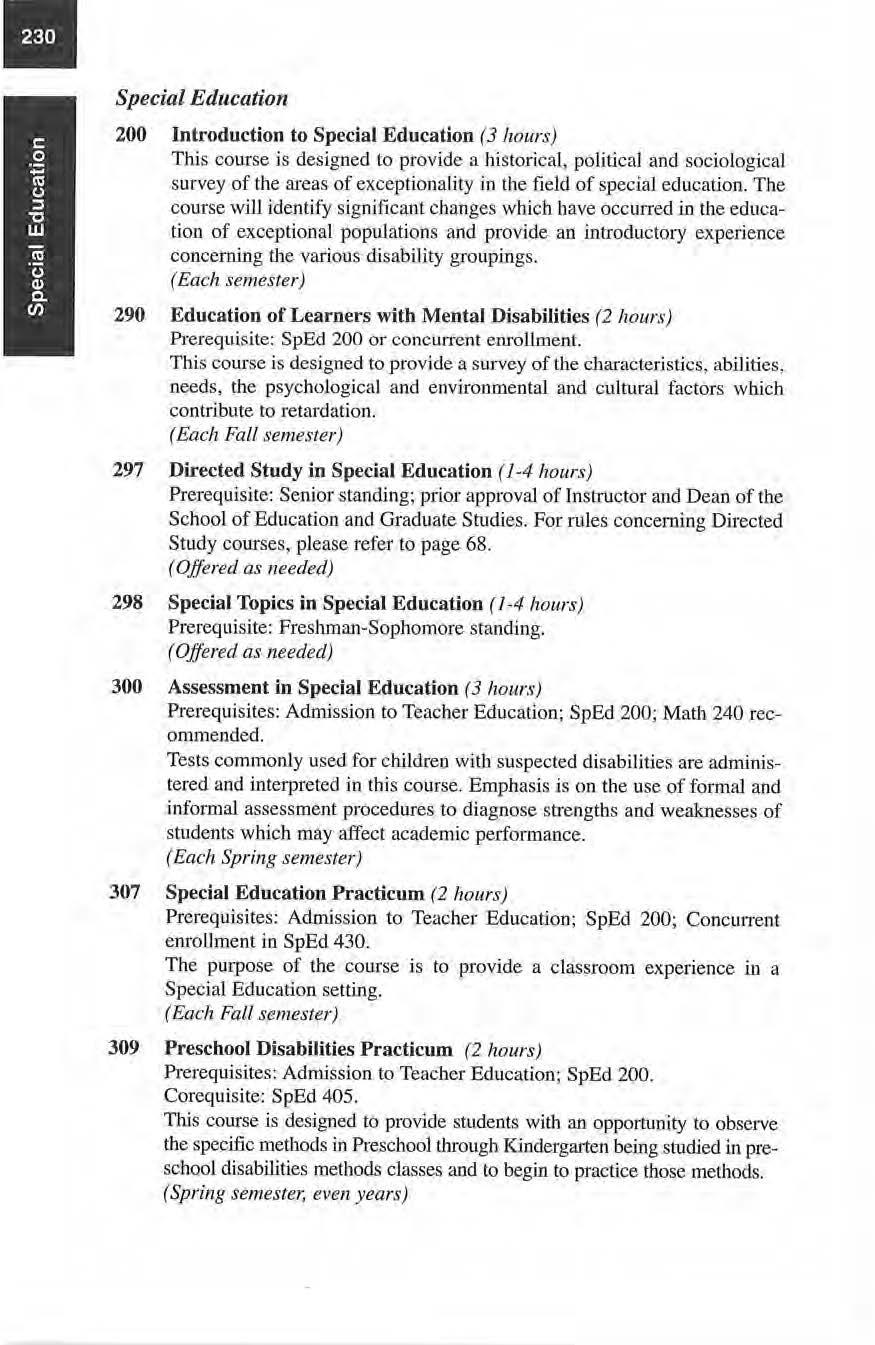
Prerequisite: Senior s tanding; prior appt·oval of JnsLructor and Dean of the School of Education and Graduate Studi es. For mies concerning Directed Study courses, please refer to page 68.
(Offered as needed)
298 Special Topics in Special Education (l -4 hours)
Prerequisite: Freshman-Sophomore standing
(Offe red as needed)
300 Assessment in Special Education (3 hours)
P rerequisites: Admission to Teacher Education; SpEd 200; Math 240 recommended.
Tes ts commonly ui;ed for childreu with suspected disabilities are admjnistered and interpreted in this course. Emphasis is on the use of formal and inform al assessment procedures to diagnose s trengths and weaknesses of students which rnay affect academic performance.
( Each Spring semester)
307 Special Education Practicum (2 hours)
Prerequisites: Ad.mission to Teacher Education; SpEd 200; Concurrent enrollment in SpEd 430.
The purpose of the course is to provide a classroom exper ience in a Special Education setting.
(Each Fall semester)
309 Preschool Disabilities Practicum (2 hours)
Prerequisites: Admission to Teacher Education; SpEd 200.
Corequisite: SpEd 405.
This course js designed to provide students with an opportunity to observe the specific methods in Preschool Lhrough Kindergarten bejng studied in presc hool disabilities methods classes and to begin to practice those methods.
(Spring semester, even years)
385 Education of Students With Learning Disabilities (2 hours)
Prerequ isites: Admission to Teacher Edu cation ; SpEd 200 or Concunent emollment.
This course has been designe d to prepare the prospective teacher with the ability to diagnose deficit areas and areas of strength s, and to be abl e to know and implement various instructional procedures and appropriate educati,onaJ mate1ials of stu dents with learning di sabilities.
(Each Spring semester)
405 Special Education/Early Childhood Characteristics & Methods (3 how·s)
Prerequisites: Admission to Teacher Education; SpEd 200
Corequisite: SpEd 309.
Th.is course is designed to enable the student to master the knowledge of the pu.rposes, unique features, service delivery and issues in the field of eai"ly childhood special education. Basic information about the foundations of early childhood special education programs and sources of cunent research about this rapidly growing field will be s tudied . Current best practice instructional m e thods will be a major focus of this course.
(Spring semeste1; even years)
421 Preschool Disabilities Student Teaching (8-16 hours)
Prerequi site: Admi ssion to Student Teaching. Observation, laboratory and practical application of teaming _p1iociples in Pre school through .Kindergruten settings. Students teach full-time for eight-sixteen weeks.
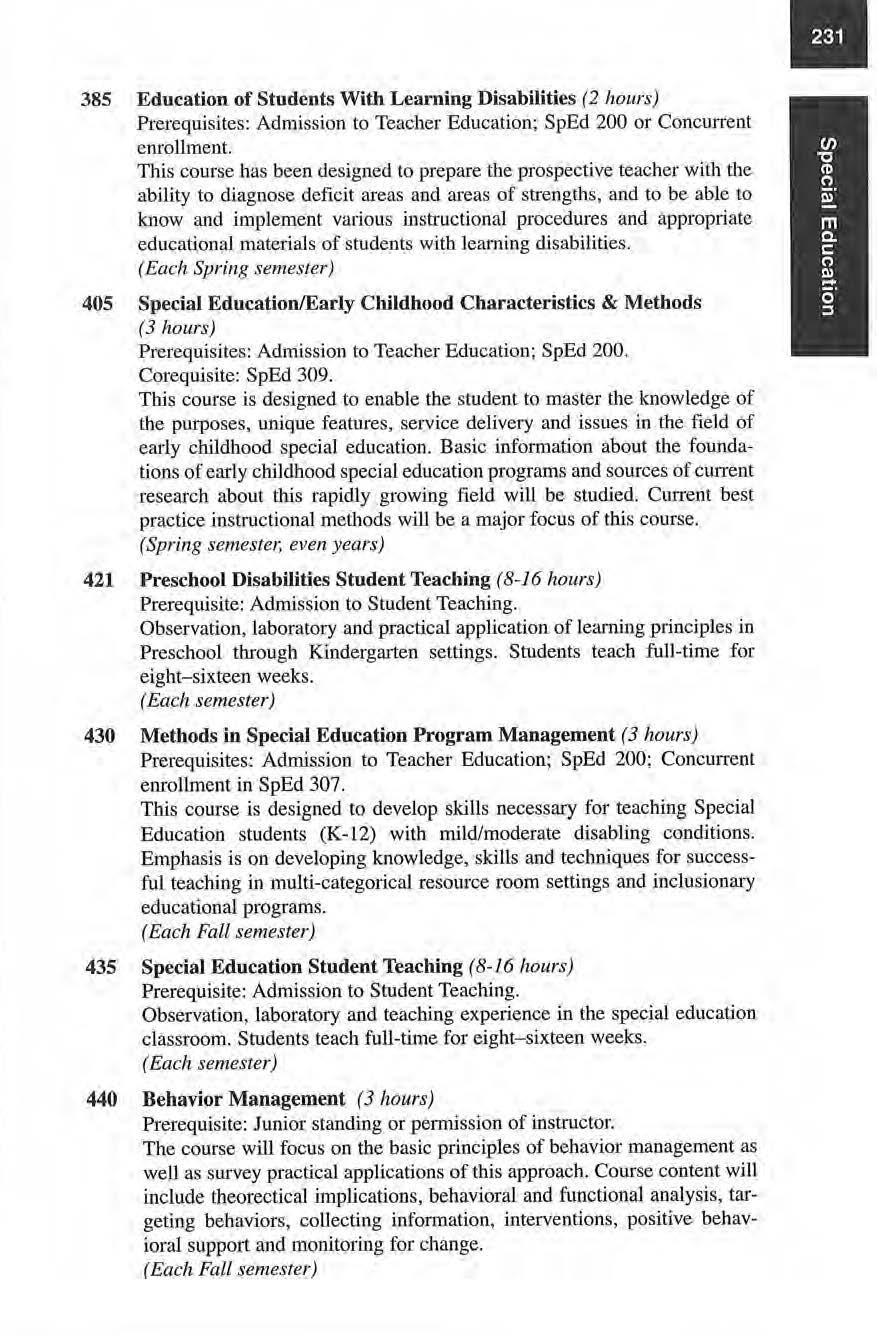
(Each semester)
430 Methods in Special Education Program Management (3 hours)
Prerequisites; Admission to Teac her Education; SpEd 200; Concurre nt eurollment in SpEd 307.
This course is de s igned to develop skills necess ary for teaching Special Education students (K-12) with mild/moderate disabling conditions. Emphasis is on developing knowledge, skills and techniques for s uccessful teaching in multi-categorical resource room settings and inclus ionary educational programs.
(Each Fall semester)
435 Special Education Student TeacWng (8-16 hours)
Prerequisite: Admission to Student Teaching
Observa tion , laboratory and teaching ex perience in the s pecial education classroom. Students teach full-time for eight~sixteen weeks.
(Each sem ester )
440 Behavior Management (3 hours)
Prerequisite: Junior standing or permission of instructor. The course will focus on the basic principles of behavior management as wel.1 as s urvey p ractical applications of this approach. Course content will include theorectical implications, behavioral and functional analysis, targeting b e haviors, collecting infonnation , interventions, positive behavioral support a11d monitoring for c hange.
(Each Fall semester)
460 Career & Vocational E du catio n for Students with Disabilities (2 Jzours)
Prerequisites: Admission to Teache r Education; SpEd 200. The c urri culum is designed to provide background information in vocat ional/career education for the m il d/moderately disabl ed. Vocational services, vocational evaluation, vocational counseling, work-study progtams, job placement and follow-up, lesson p lans and c urrent models a11d materials used are included in tJ1e curriculum.
(Eac h Spring semester)
465 Education of Students Wi th E motional/Behavioral Disorders (2 hours)
Prerequisites; Admjssion to Teacher Education; SpEd 200. This course i s designed to in vestigate tJ1e e tiology , c lassification, and treatment for child ren and adolescents with emot ional, social and behavioral impairments. It examines the historical a nd phi losophical contex ts, major theoretical p e rspectives, and in structional altematives Cu1i-en t best practice and research related to the topic will be explored.
( Each Spring semester)
497 Directed Study in Special Eclucation (1-4 hours)
Prerequisite: Sen ior s tandin g; prior approval of Ins tructor and Dean of the School of Education and Graduate Studies. Fo r rules concerning Directed Sn1dy courses, please refer to page 68.
(Offered as needed)
498 Sp ecial Topics in Special Education (1-4 hours)
Prerequisite: Junior-Senior standing. Prior approval of the D ean of the Schoo l of Educat ion and Graduate Studies,
(Offered as needed )
499 Independent Study in Special Ed ucation ( 1-3 h o urs)
Prerequisite: Junior standing; prior approval ofTnstructor and Dean of the School of Educa t ion and Graduate Stuclies. For mies concernin g Indepe nde nt Study courses, please refer to page 68.

(Each semester)
Speech and Drama
152 Fundamentals of Speech (3 hours)
Thi s course i s a study of the principles of speec h with an emphas i s on t he deve lopment of oral ski ll s. Class emphasizes methods of organiza t ion and delivery for add ressin g var ious audiences.
(Each sem ester)
232 Jntroduction to Theatre (3 hnurs)
This course is an introd uction to all forms of drama and styles of theatrical presentation a nd prod uction as a means of developing the s tudent's critical appreciation of the theatre arts.
(Offered as needed)
254 Public Speaking (3 hou rs)
This course is a study of the forms of aclch-ess, speech organizat ion, composition, delivery, and parliamenhu-y rules with practice required in var1ous public speaking situations including public meetings and group discussions, radio and television broadcasting, interviewing, role-playing and debate.
(Spring se mester. even yea rs)
297 Directed Study in Speech and Drama ( J -4 hours)
Prerequisite: Senior standing ; prior approval of In structor and Dean of the School of Arts and Sciences. For rules concerning Directed Study courses, please refer to page 68
(Offered as needed)
298 Special Topics in Speech and Drama (1--4 honrs)
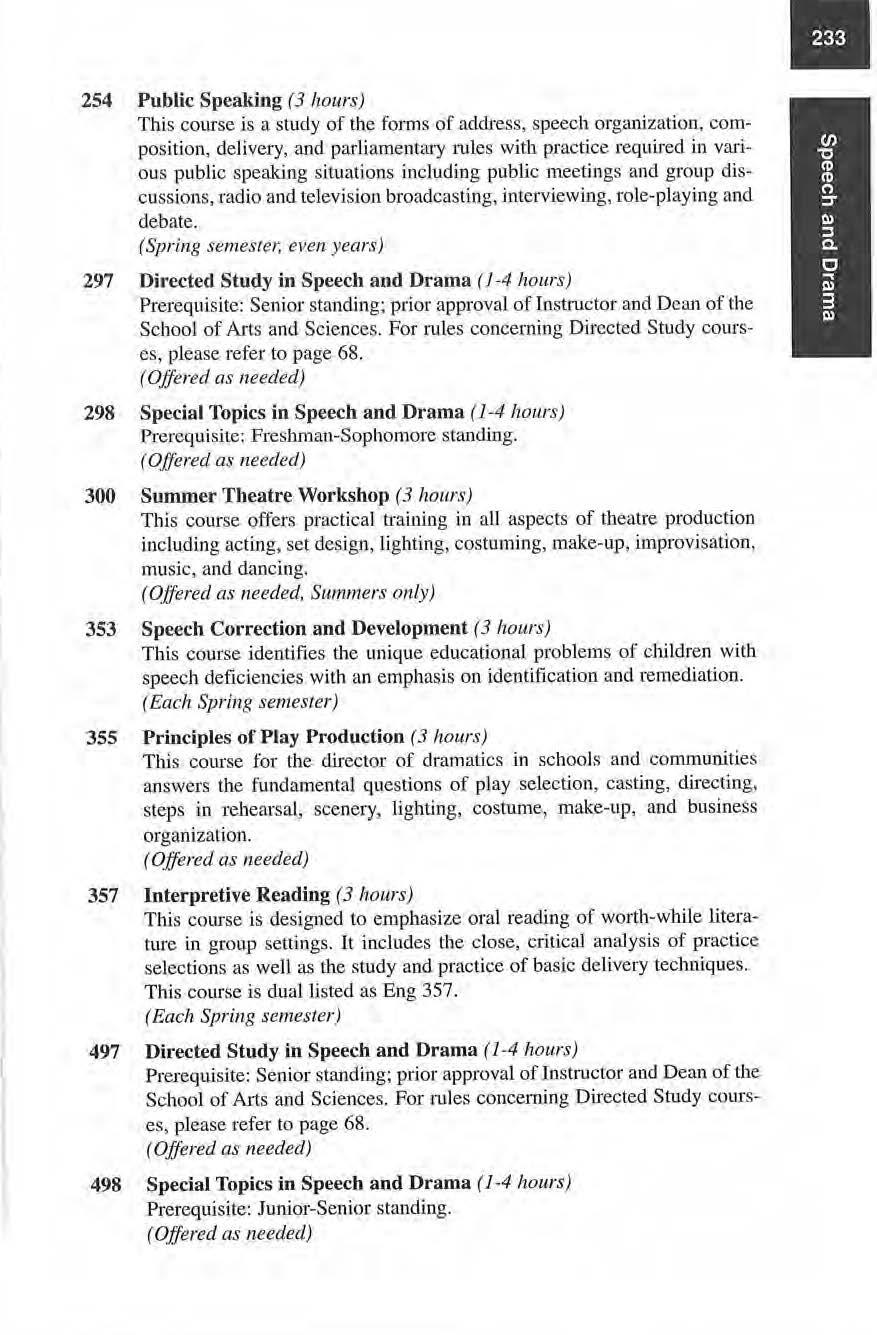
P rerequ isite: Freshman-Sophomore standing.
( Offered as 11eeded)
300 Summer Theatre Workshop (3 hours)
This course offers practical training in all aspects of theatre production including acting, set design, lighting, costum in g, make-up , improvi sation , music, and danciug.
(0.lfered as needed, Summers only)
353 Speech Correction and Development (3 hours)
This course identifies the unique educational prob lems of children with speech deficiencies with an emphasis on identification and remediation.
(Each Sprhig semester)
355 Principles of P lay Production ( 3 hours)
This course for the director of dramatics in schoo ls and communities answers the fundamental questions of play selection, casting, directing, s teps in rehearsal, scenery, lighting, costume, make-up, and business organization.
( Offered as 11.eeded)
357 Interpretive Reading (3 hours)
Thi s co urse is designed Lo emphasize ora l reading of wo rth -while literature in group setti ngs. lt includes the close, critical analysis of prnctice selections as well as the study and practice of basic delivery techniques. This cou rse is dual listed as Eng 357.
( Each Spring semester)
497 Directed Study in Speech and Drama (l -4 hours)
Prerequisite: Sen ior standing; prior approval of In structor and Dean of Lhe School of Alts and Sciences. For rules concerning Disected Study cousses, please rnfer to page 68.
(Offered as needed)
498 Special Topics in Speech and Drama (1-4 hours )
Prerequis ite: Junior-Senior standing.
(Offered as needed)
499 Independent Study in Speech and Drama (1-3 hours)

Prerequisites: Junior stand ing; prior approval of Instructor and Dean of the School of Arts and Sciences. For rules concerning Independent Study courses, please refer to page 68.
(Offered as needed)
Faculty
(Dare indicates year in which se rvice at Pern State began.)
Kenneth Anderso n ( 1984) Professnr ofArt
B.G.S., B.F.A., M.F.A., University of Nebrnska-Omaha
Kelly Asmussen ( 1994) Associate Professor ofCriminal Jimice
B.S University ofNebraska-LiQ.coln; M.Ed. Colorado S tnte; Ph.D , University of Nebraska-Lincoln
Mkh ael Barger (2001) 1\ssis1m1t Professor ofBiology
B.S., M.S., University of Ne braska-Lincoln; Ph.D., Wake Fore.~t University
Bruce Batter son (2000) Assistalll Professor ofBusiness
B.A. , Ripon College; J.D., Univel'$ity of Minnesota Law School, M.B.A., Univer~ily of Nebraska-Omaha
M11rk Beischel (2000) Ass1;u;iote Pmfessor of Psychology
B.A., University of Dayton; B.A. , C11thollc Univerijity of America; M.A., U ni versity of Detroit; Ed.D., lndjana University
Anthony C itrin (J 986) Professor of Ed11catio11
B. A , M.A University of Kentucky; Ed.S., Centr!II Mtchigaa University; Ecl.D. , Western Michigan Unive.rsity
William C l emen te ( 1993) Profes.~or of E11g/is/, B.A., Sm1 Diego State U ni versity; M A., Ph.D., University of Oregon
Richard C l opton ( 1995) Associate Professor ofBlolo11y
B.S., M.S. , Ph.D., U niversity of Nebraska-Lincoln
Sarn Crook (1993) Professor of Histo1y
B.S., M.A. , Ph.D .. lfniversity or Nebraska -Lincoln
Spen cer Davis (1983) Professor of/1.isrory
B.A., Brown Universi t y; M.A., University ofNebrnska-Lincol n ; Ph.D University ofToronlo
Druann Du rbin 0,001) Assista111 Professor of English
B.A., Northeast Lou isiana University; M.A., University ~r Southwestern Louisinna: Ph.D., University ofLoulsiana-utfayctle
T h omas Ediger ( 1979) P1'0/esso r of Music
AB., University of Nebraska-LlncoJJ1; M.A., D.A., University of Nonhern Colorado
David E dris {1974) Profe.ysor of Musi c
B.M.E., M.M., University of Tulsa; D.M A ., University of tvfasour'i-Kansas Ci!y
Kelly Gat ewo od (2002) As sisttmt Professor of Educatio11
RS .. University of Nebmskn,Omuha; M.S., University of Nebraska-Lincoln
Judy Grotrian ( 1998) Assistam Professor of Business
B.S., Peru State College; M.Bd, Ph D., University of Nebraska-Lincoln
John Haney (2002) Assistant P1'Qfessor of Educati011
B.A , M.A, Ph.D., University or Texas-Austin
Charles Harper (1978) Professor of Speech/Theatre
B.A., Tar kio College; M.A ., Ph.D., University of Ncbraska-Lincolo
Eric Hertzel (2003) lnstructor of Computer a11d Mont.1ge111e111 l riformntion Systems
B.S., Peru State College; M.B.A., Washburn University
Pa ul Hinrichs (1990) Assisto,11 Professor ofScience/Teclmology

B S., Concordia College; M.S., Ph.D., University of Nebraska-Lincol n
John & ida ( 1999) Assistant Profesmr ofBiology
B.S., Arizona State Unlvccsity; M.S., Universi ty of Wisconsin -Milwnukce; Ph.D., University of New Mexico
Onn Holtz(] 987) Profi•.,sor of Ens/1,,/J
B.A., Kearney State College; M.S , Chadron State College; Ed.D., University of No11hc111 Colorndo
R h o nda Johnson (2002) /lssi.,u1111 Professor of Ed11caJio11
B.S., M.S. , Ed ,S., For t Hay s S tale Univer~ity; Ed . D.. Wichit:1 State University
E I Ui e K unke l (2003) Assista11t Profe.1·.1-or of Physical Et/111:111/1111
B.S., M.S. , Central M issouri State University: Ed .S., Midd le Ten nessee Slate University
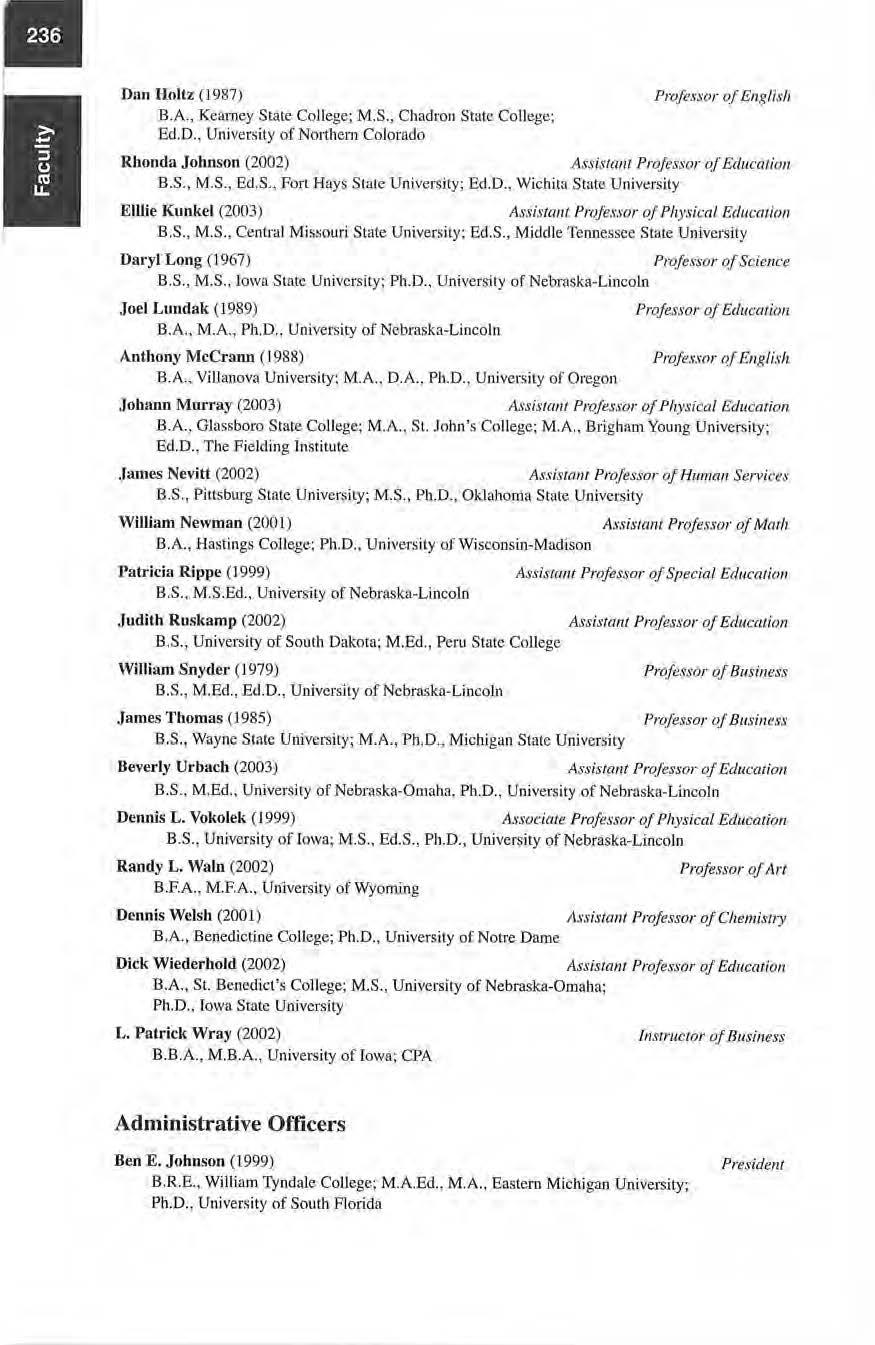
Dar y l Lon g (1967) Ptofessor ofScience
.B.S., M.S ! own Stale University; Ph.D., University of Nebrnska-Lincoln
,Joel Luud ak ( 1989) Professor of Etl11cmi1111
13.A M.A., Ph.D. , Universi ty of Nebraska-Lincoln
Anthony Mc Crann ( 1988) Profes 1·11r rif £ 11g/i.1·h
RA... ViUauov~ U niversity: M.A .. D.A. , Ph.D. , Un iversity of Oregon
,Jo hann Murray (2003 ) Assista111 Professor of Pliysical IM11cario11
B.A., Glassboro State College; M.A., St. .lnhn's Co llege; M.A., Brigham Young University; Ecl.D. , The Field in g In stitute
.James Nev itt (1002) Assis1a111 Pl'ojessor of Hffma11 Servicl!s
B.S., Pirtsbtu·g State Un iversity; M.S., Ph.D ., Oklahoma State Univc(si ty
William Newman (200 I ) Assis/am Professor of Mnrh
B.A., Hastings Coll~gc: Ph D University of Wiscons in-Madison
l 'a trkia Rip{le (1999) Assisrc111t Professor ofSpecial Ed11catio 11
B.S .• M.S .Ed., Un iversity o fN ebraska-Llncoln
.Judith Ruskamp (2002) Assisw111 Professor of Education
RS. , Un iversity of South Dakma: M.Ed. , Peru State College
William Sn y d e r ( 1979) Pr0/l! ~60r of Business
B.S., M.Ecl., Etl.D , Un ivcrs1ly of Ncbrnskll- Lincol n
James Thomas (1985) Professor of Business
B.S., Wayne State University; M .A., Ph , D.., Mic tiiga n State University
Be ver ly U rbach (2003) A$sisro 111 Professor of Ed11caiio11
B.S.. M.Ed., University of Nebraska-Omaha. Ph .D., University of Nebmskll- Lincoln
Dennis L . Vokolek ( 1999) As.l'Ocir1te Professor ofPhysical Ed,u:iatio11
B.S. , U ni versity of Iowa; M.S., Ed.S , Ph.D., Uni versity of Nebrasl(a-Linco l n
Randy L. W!tln (2002) Profesmr of Art
B.F.A. , M.F.A., Unlversity of Wyorning
De nnis Welsh (2001 ) Msislanl Professor ofChemis11y
13.A., Benedictine College; Ph.D , University of Notre Dame
Dick Wiederho ld 0002) Assis/am Professor of Educnr;on
Il.A., St. Bened ict's Coll ege; M.S ., University of Nebraska -Omaha; Ph.D .. Iowa State University
I,, Patrick Wray (2002) ltmmttor ofR11si11ess
B.B .A , M .B.A., University of Iowa; CPA
Adm ini strative O fficers
B en E John son (1999)
-8.R.E. , Wi lli am Ty nda le College; M.A.Ed M.A Eastern Mi c hi gan Un i versi ty;
Ph.D. , Uni versi ty of South Florida
Preside11t
Lind a C Jucobscn ( 1996)
B.A., M.A. , C h adron State Co llege
Korinne Tande (2000)
B.S., M.Ed., Ed.D., Univer,;ity of Montana
Academic Deans
Todd Drew ( 1999)
Vi ce Presidem for Adm i11is tra1ion and Finan ce
Vice Preside111for Academic a nd S111de11t Affairs

D ean of the School of Profession al Studies
B.S., B.A. , M.B.A., Ohio Stale U ni verSi ty; M.I¼, Univer~i ty of Maine
S tephen G. Sy l vester (2002) DeaJL of the School ofAns a11d Sci en ces
B.A., New Mexico State U n iversity; M .A.. O.A., U ni vers.ity of Nort h Dakota
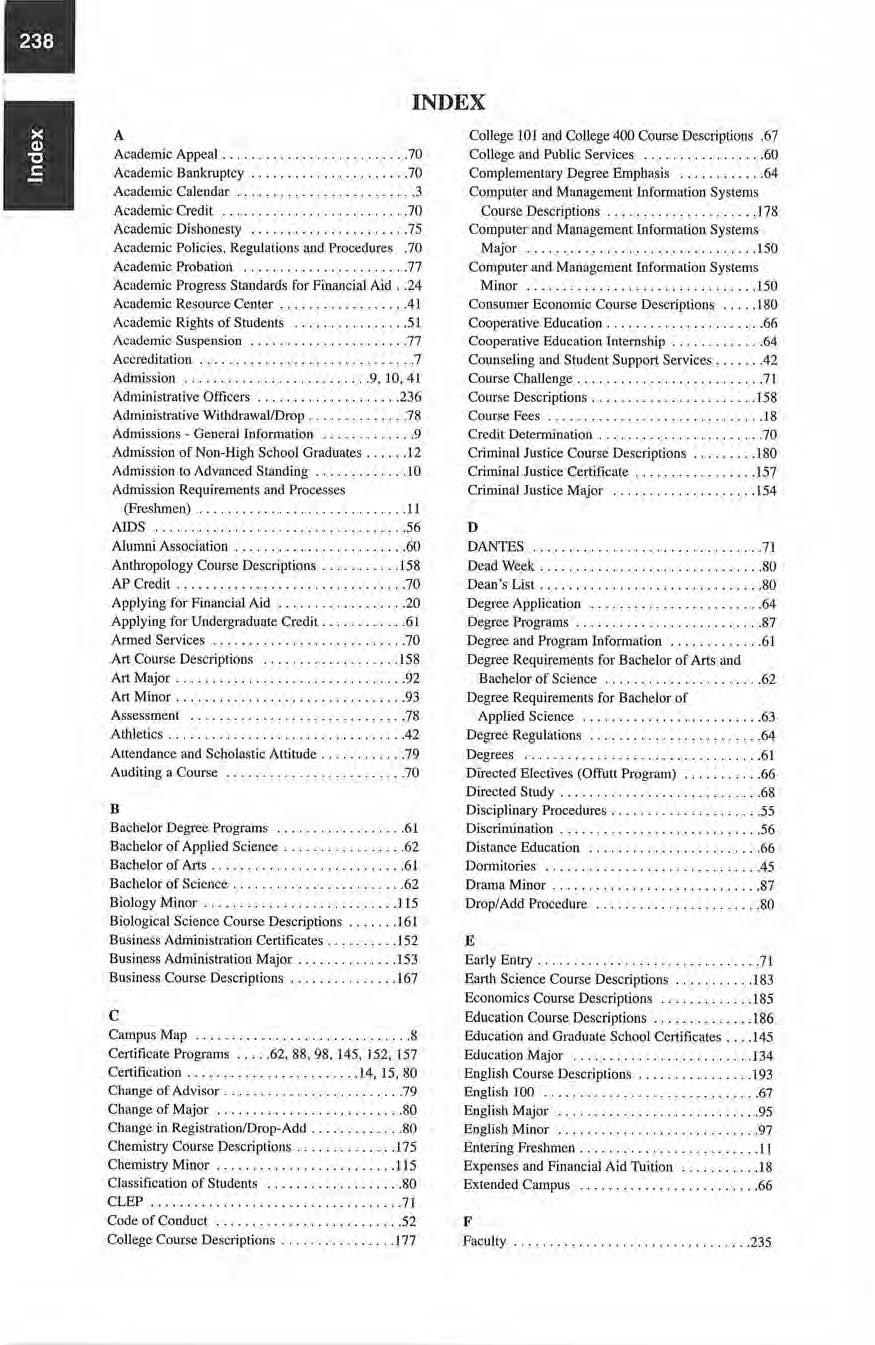
I INDEX A Academic Appeal , 70 Academic 8ank.rup1cy • • 70 Academic Calendar , , • , '" , 3 Academic Credit . ..... . ..... . ..........70 Academic Dishones1y 75 Academic Polic1cs, Regulations aml Prooedure• ,70 Academic Probation 77 Academic Progress Standards fo r Pioanci:il Aid , .24 Academic Resource Center , .•.• , •.41 Academic Rights of Srudellls , 51 A\!adcrnic Suspensi on , , .., , 77 Accredhatiou .... ..... . ... ... 1 • • • .7 Admission ., 9, 10, 41 Adm inistrative Officers .236 Administrative Withdrawal/Drop ..•. • 78 Admissions • Ce_ocral £nformadon , ,9 Admission of Non- High School Graduaies 12 Admission lo Advanced SIBnd iog JO Admission Require ments and Processes (Freshmen) • II AIDS ,56 Alumni Association . . . . . . . . . . . ..60 Anthropology Course Descriptions , I 58 AP C redit , •... 70 Applying for P inancial Aid • 20 Apply ing toF Undergrndume Credit. 61 Armed Services . ....•................ . ....70 Art Course Descriptions ..... . ...... .. ..... 158 Art Major 92 Art Mino r • • • 93 Assessmenl .._ , , , _; 78 Athletics 42 A 1rendance and Scholastic All'it11dc 79 Aud iting a Course ..... • .... . . . .. ....... , ..70 B Bnchelor Degree Progrnms Bachelor of Applied Science Bachelor of Arts , , 61 62 ....61 'Bachelor of Science 62 Biology Minor , .11 S Biological Science Course Descriptions l 61 Bus iness Administration Ccrtifica,tes . • . • . . I52 Busi ness Adminislration Major • 153 Business Course Descriptions •. •... 167 C Campus Mup • 8 CcnifkateProgrnms 6'2, 88 ,98. 145, 152,157 Cenifica lion , , , 14, 15, 80 Chungc of Advis()r , • , • 79 Ch~ngc of Major 80 Change in Regi!lralion/Drop-Add •. 80 Chemistry Course Descrip1i o11s • 175 Chemistry M inor , 115 Classification of Students • • 80 CLEP , , , , .7 1 Code of Couducl 52 College Courte Descrip lions I77 College JOI and College400 Course Descriptious ,6 7 College and Public Services 60 Complcmeolary Degree Emphasis , , 64 Co111pu1cr and Munage111cnt Information Systems Course Descriptions ..... . . . .. .. . . .. . .. . . 178 Computer and Management lnfom1at.io11 Systems Major , 150 Computer .a.net Monngemenl [nfonnaliou Systems Minor , , 150 Consumer Economic Course Description s 180 Coope1-:11ive Educalion •. 66 Coopern tive Education Internship , 64 Counseling and Student Support Services • 42 Course Chall enge , , 71 Course Descriptions ..•.. •. • • • • , I58 Couroe Fees • , ., 18 Credit Determination 70 Criminal Jus1ice Course Descriptions • 180 Criminal Justice Cert.ificaie , .. . .. •• . ........157 Criminal Justice Major • 154 0 DANTES • ,7 1 Dead Week . . .. , . . . . . • . . . . . . . • . . • . . . • . . . .80 Dean ·s List .. . . .. ......... . . . .... .. . •. ... ,80 Degree Appl icarlon , , , 64 Degree Progr~ms 87 Degree and Progrnm fn form&tion ..•.61 Degree Requirements for Bachelor of Arts and Bachelor of Science .......... . . . . . . • .62 Degree Requiremcms for Bachelor of Applied Science , 63 Degree Regu lations , 64 Degrees , 61 Directed Electives (Olfun Program) , 66 Dfrected Study ................... ... .. .. ..68 Disciplinary Procedures , , , , ..55 Disctimi na!.lon , • , •... • ..• 56 Distance Education , •. , 66 Donnilories .............. , .• , •. , .•.• . •.. .45 Drama Minor . . . .. ...... , . ... , .. • . • , , . , .. .87 Drop/Add P,occdure ... ...... .... . . , . . . • . .,80 E Early Einlry • • 7 L &nit Science Course Descriptions .183 Economics Course Descriptions , 185 Education Course Descrip1jons . ... •.. , . . . . , .186 Education and Graduate Schoo l Ccrtifi c;tte.s • 145 Education Major 134 English Course Dcscriplions • , 193 English l 00 67 English Mujor • , 95 English Minor 97 Entering Frc.~hmen , . 11 Ex.penses and Financial Aid To il.ion • 18 Extended Campus ..•. , 66 F flacuhy , .• •. •. ..•235
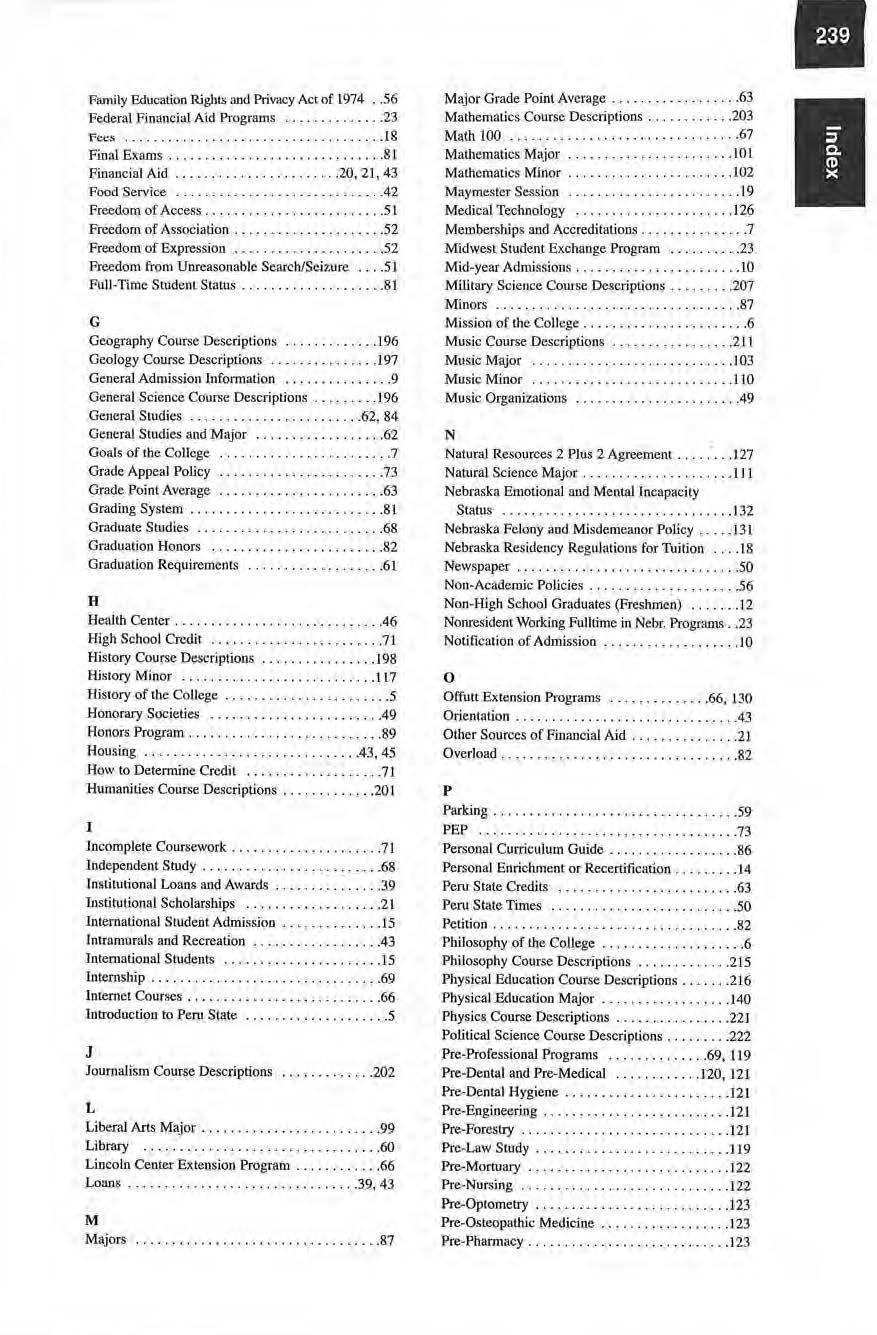
Flunily Education Rights an<l Privacy Act of 1974 ..56 Federal Finnnci aJ Aid Programs • • 23 r-c.,,, . 18 Fiaal Bxams . . ... . .. ...... .. ...... , . . , .. ..81 Pinancial Aid , • 20, 21, 43 Food Service .42 Freedom ofAccess .. . , . .. . . , . . , ... . ...... , .51 Fn.'Cdom of Associatio n , , , .52 Freedom of Expression "_. A 52 Freedotn &om Unreasonable Search/Seizure 51 Pu ll-Time S llldent Status 81 G Geography Course Descriptions ..•. 196 Geology Course Descriptions • • , , , , I97 Goneral Admission lnformnlion . , ... • , .. , .. , . .9 Gencrol Science Course Descr iptions , 196 General S tudies • , .•. 62, 84 General Studies and Major ....•. • , , , , 62 Goa.ls of the College , , ? Grade Appeal PoHcy , 73 Grade Poinl Average , 63 Grading System .. , ... . . . .... ........ . .... .81 Graduate Studies , • , 68 Graduation Honors , • , , • , 82 Graduation Requirements .... . ..... • .. • .. , . .61 H Helllth Center , , , , , , .46 High School Credit , ,71 History Course Dl'>(:riptions , , , • , • , , 198 History Minor 117 History of the College , 5 Honorary SQCieties , , , .49 Honors Program , , , , • , 89 Housit\g , .43, 45 How to Detem1ine Credit , 7 I Humanities Course Descriptions , , 20 I I lncomplete Coursework , , , • , 71 lndependellt Study , 68 lnslilutional Loans and Awards • • 39 In.stitutional Scholarships , , , 21 Internation al Student Admission • •. • , J 5 Jnttoruunlls and Recreation , 43 lnleruatioual Students , 15 lutemship , 69 Internet Courses , 66 Introduction to Peru State • , 5 J Journalism Uiurse Description.• . . , , . • .•. .. . . 202 L Liberal Arts Majo, , , , , .99 Library , • • , , • , .60 Lincoln Center l':x.tension Program , , , 66 Lonn• •. • , , , 39, 43 M Majors • , , 87 Major Grade Point Average , 63 Mathematics Course Descript ions , 203 Math too ... .. ...........................67 MaO,ematics Major , , , • • • 101 Mathematics Minor , 102 Maymcste r Session , 19 Medical Technology ... . ... , .......... . .. .126 Memberships and Accreditations , • 7 Midwest StudeJll Exchange Program 23 Mid-year Admis~ions , 10 Military Science Cowse Descriptions • .• , , • .207 Minors , , , , 87 Mis.sion or the College 6 Music Course Dcscri,ptions , • , , , , , ,2 1l Mu~ic Major , l 03 Music Minor , , 110 Music Organizations ... .. . . , .. . .... . ... ... .49 N Natur~J Resources 2 Plus 2 Agreement , ,127 Natural Science Major , • I I 1 Nebraska Emotional and Mental Incapacity Status •.. , , , , , .132 Nebr;;ska Felony aod Misdemeru10r Pol.icy , ... . 1.3 1 Nebraska Residency Regufo liong for Tuition 18 Newspaper 50 Non-Academic PoHcies . , .... . .. . .. • . , . . . • . .56 Non-High Sc),ool Graduates (Freshmen) , 12 NonreS'ident Working Fulllime in Nebr. Progmms 23 Notification of Admission , , • , JO 0 Offutt Ex tension Programs , •. , 66, 13(1 Orientation , , .4.3 Other Sources of Financial Aid , • , .21 Overload , , , .82 p P'.irking , , , , , , ••. , .• .59 PEP ,, , , , 73 Personal Curriculum Guide , 86 Persona l Enrichment or Recertificauon .• . • ..... 14 Peru Srate Credits , , , , , 63 Peru S~ue Times .50 Petition , .... ..... . .. . • .. • . . • . • .. • .. , ... ..82 Philosophy of the College , , 6 Philosophy Course Descriptions , 2 15 Physical Education Course Descriptions • 216 Physical .Education Major , • , , 140 Physics Course Descriptions • , 221 Political Science Course Descriptions 222 Pre-Professional Programs .. . . . . . . , . . , ..69, 119 Pre-Dental and Pre-Medical , , 120, 121 Pre-Dental Hygiene 121 Pre-Enginee ring .. ....... , . . . . .. . . .. , . . , .. 121 Pre-Forestry 121 Pre, Law Study , I I 9 Pre-Monuary ........... . . ... , . . . ... .. , .. 122 Pre-Nuroing •.• 122 Pre-Optometry , , i 23 Pre-Osteopathic Medicine , , 123 Pre-Pharmacy , , , • 123 II I

I Pre-Physical TI1erapy ,, J24 Pre-Physician Assis tant , , , 124 Pre -Podiatric Medic ine , • I 24 Prc- RadiatiM Science Tec hnology , ..... , .. , .1 2S Pre-Resp iratory Thenipy , .• , •. •.. , 125 Pre-Veterinary Med icine • •. ., •. 125 Proba tion , , , , 82 Professional and Social Organizations .48 Professional School Residence Credits • .. • . •. , .63 Psychological l'mb lcms Policy . . . , ..... . ... . ,57 Psychology Coucsc .Descriptions •... , 223 Psychology Major , , 156 Public Health Services , , .47 Purposes of the College ., , , , 6 R Readmission , • , •.• .• , , 14 Recertification • • , I4 Refu nd Policy . . . . .... , . . , . .... .. , .. , .. 18. 19 Repeal Courses , _ ., 73 Re4uireme11 ts for Financial Aid., , , 2l Residence Halls and Living Accommodations , .43 Residenc-e Hall Regu lations •.. 55 Residcucy Req uire ments • • , 18 Residen t Cred its , , • .63 Room and Board Cont racts , • ..•..... 20 Roo m and Board Refunds •.20 ROTC Course Descriptions 207 s S at isfactory Ac:ld cmic Progress .....2'1 Scholarships , , , 26. 39 Schoo l of Alis nnd Sc iences •. .• , • , 90 School of&J ucalion and Grad unleStudiC$. 128 Sch ool of Professional Stu1lic.~ a • •• • • ••.•••• 146 Seamless Trnnsfcr , , , , , , 11 Second Undergraduate Dcgretl •. • • 65 Selecting a Major , 82 Sen ior Com petencies ....•... , 78 Sexu,1I Assault ond Sexu• I (-lo,·u.ssmem , 57, 5X Social Science M~j or •. ,. .•.. • 116 SQCia l Science Minor . , .. , .. . . . .... . , ..•. ,. 118 Socia l W ork Course Descriptions .227 Sociology Comse Descriptions , • .•.. 22 9 Spanish Course Dcscrip lions , • •• , 229 Special Acad emic Programs , .66 Special Educat ion Course Dcsorip1ions .. , ..... 230 Speech and Drama Course Descrip tions 232 Speech Minor , , 87 Sports Skill s Course Descriptio ns :218 Standards for F immcial Aid , , , , ,24 S1andard ized Examin ation .•. • , • , 73 S1ate,.Fundcd Programs • .• • , .•.•24 SL11c Gra nt Programs , , , • , 24 Student Gr~de Appeal , .•. , 73 Student Services Mission Stotcmon! A I Student Handbook . . . .. , ... . . • . .46 Studcnl 1-lcallh Services . , Stmlenl Govcm mc,ll " .46 50 Studem Grievance Proce du res , , 55 Studenl Organ izations , , , , , .47 S1uden1 Pa11icipation in lns1itu1io11al Government 5~ Student P lanner , , , .46 Student Programs anu S1udc11t Lifo , • , 47 S111denL Publi c;Hions , ,50 Stu<lu111s Rights, f'rocdonts, and Responsibilities ,5 1 Students Seeking an llndorseme111 or Cert ification , , ..•. , , 15 Sludcm Serv.ices , , • , .4l S1uden1 S upport Services , .42 S111dc1i t Teaching , ..... , ...... .. .. .. , ... .. 133 Students with Disabilities , , 58 Summer Session , , , •. 69 Suspension , •. , , , 77. 82 T Table of Conte nrs 2 Te"cher Ed11cn1ion , , I 28. 130, 134 Tcohnical Degree 8n1ph~sis , .64 Total Degree Mours . ... ........ . .... . . .. . ..62 Transcripts • , • •. 82 Transfer of Credit 10. 75 Transfer Swdc111s • .•... , 12 Trnnsient Studenls , • , , , 14 Tuilion , 18 1\1i1iou/Fees . ....... . ... . .. . ... .. , . . .. . . . . 18 Tuition Refunds .J8 1\vcuty-Oue Hour Ru ic , , , 77 u Undergradu ate Degree a nd Program Information , , , 61. 65 Upper Division Credit .. , . •. .... . , .63 V Variable Credit Courses • ••. • •. .• • 75 Varsi ty Spo11s Cred its , • , • 64 Vehicle Registration snd Parking 59 w Walvc r • Academic Appeal , • • 83 Withdrawal from Class . . ... , .. , .... ..... 19. 83 Withdrnwa l from College .•.. l 9, 83 Wit hdrawa l from Reg ul a r Seme,;te.r I9 Withdrawal from Maymcstcr/Summer Session 19 Wlthdrmval from Workshops und Other No n•S tandard Academic Te rms .• .• 19






















































































































































































































































